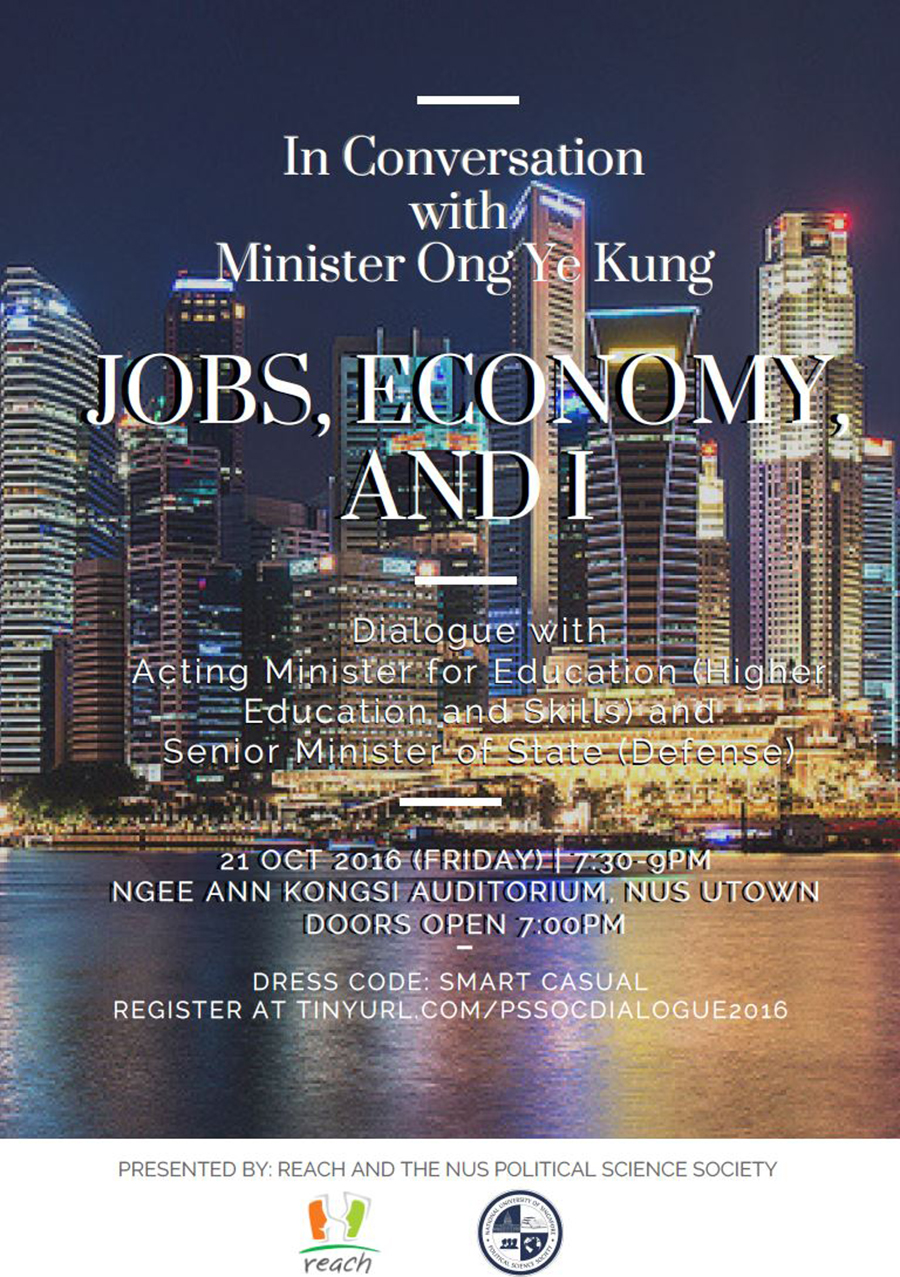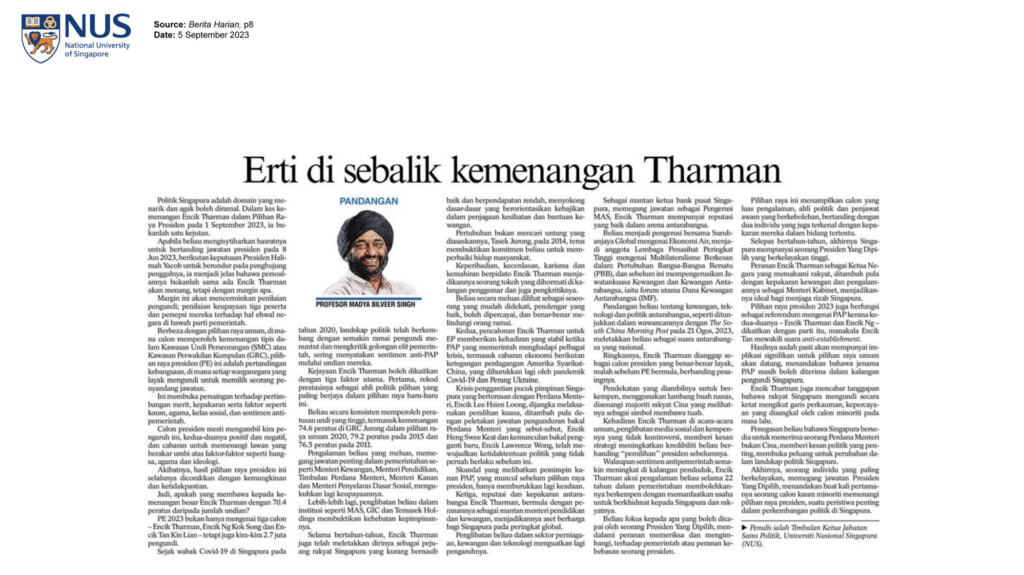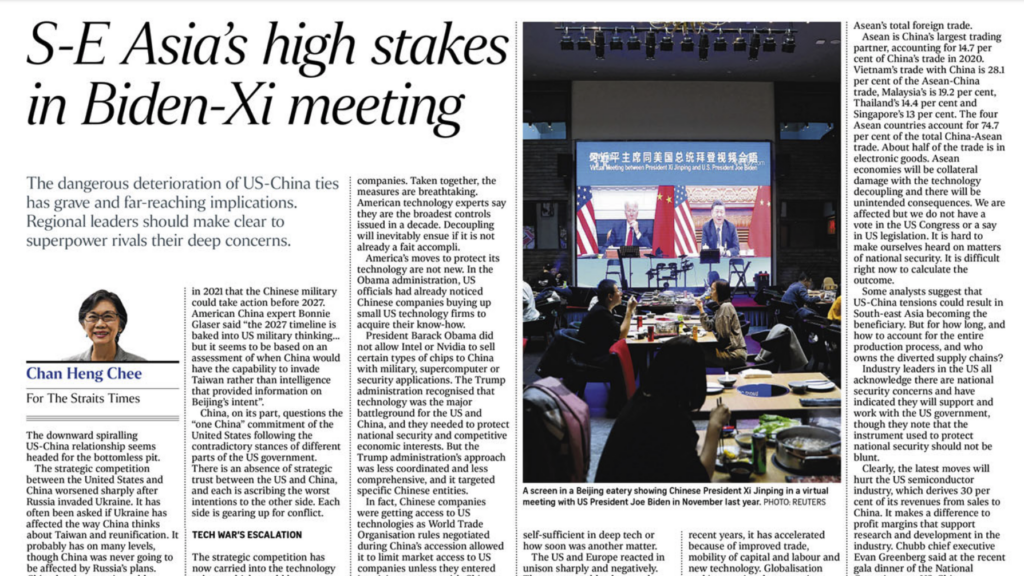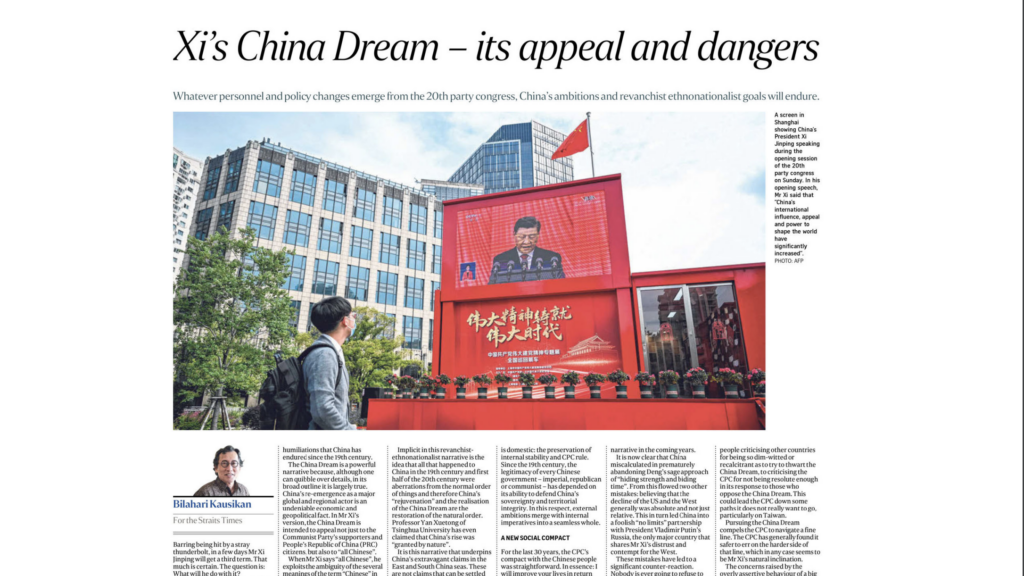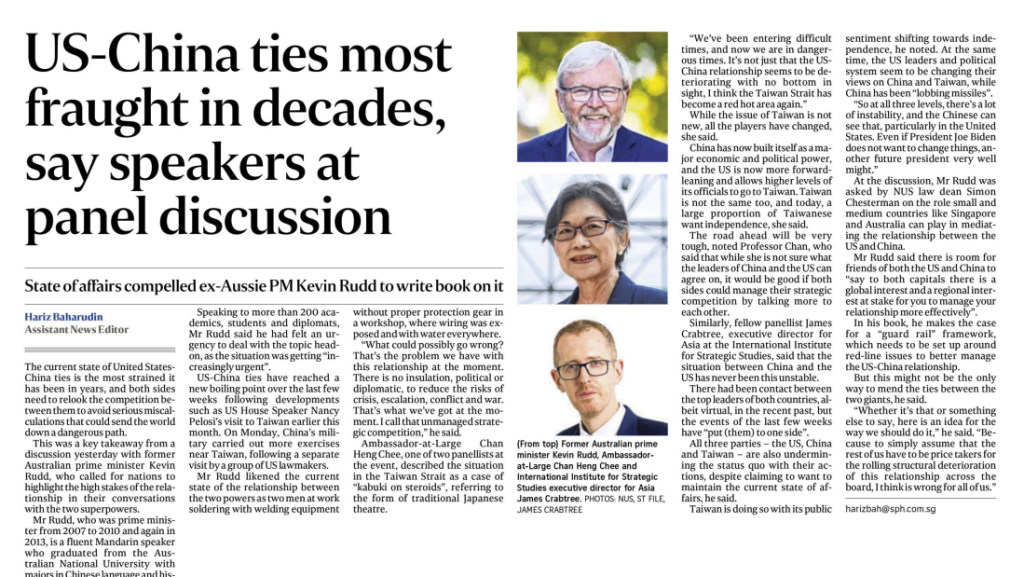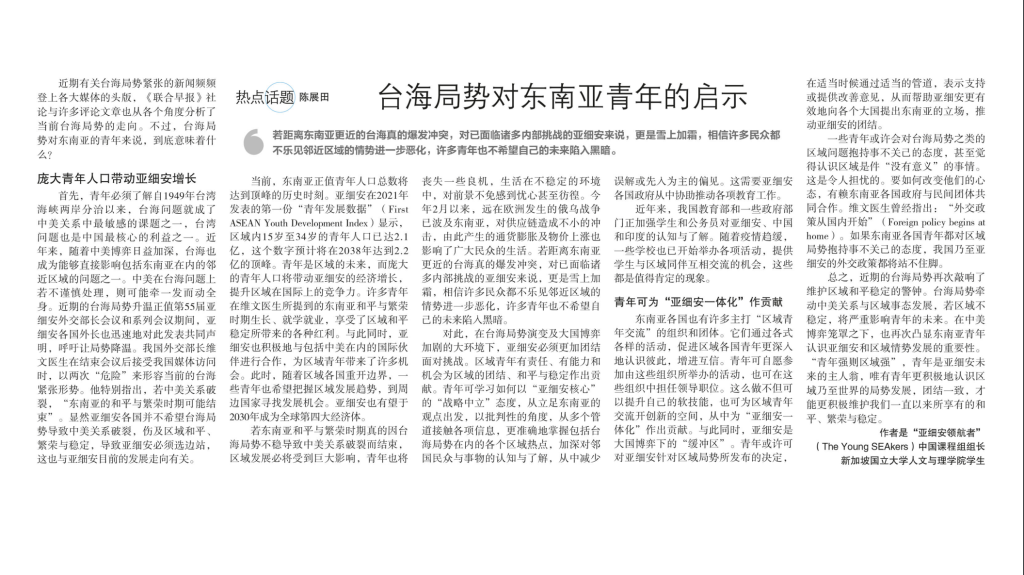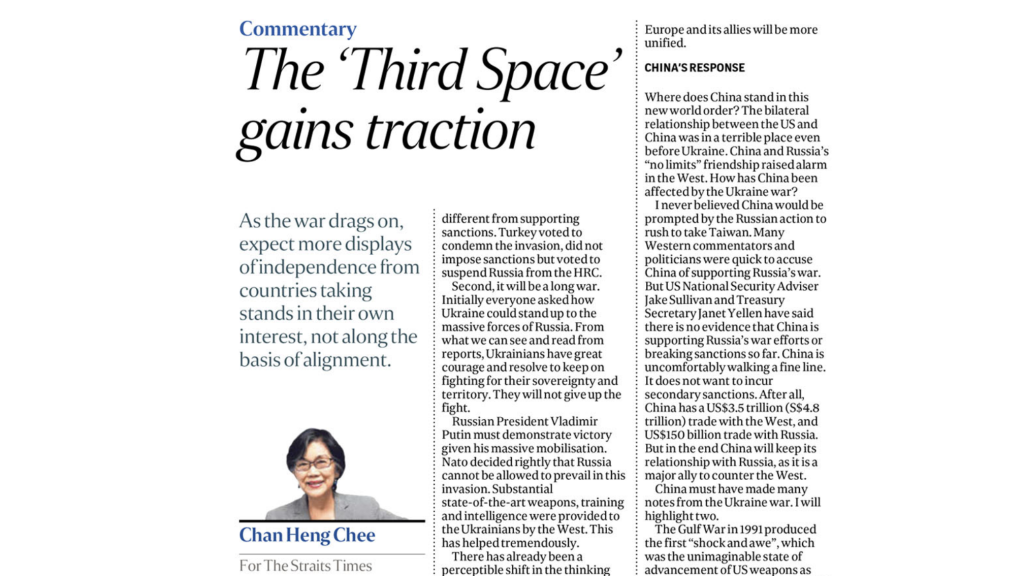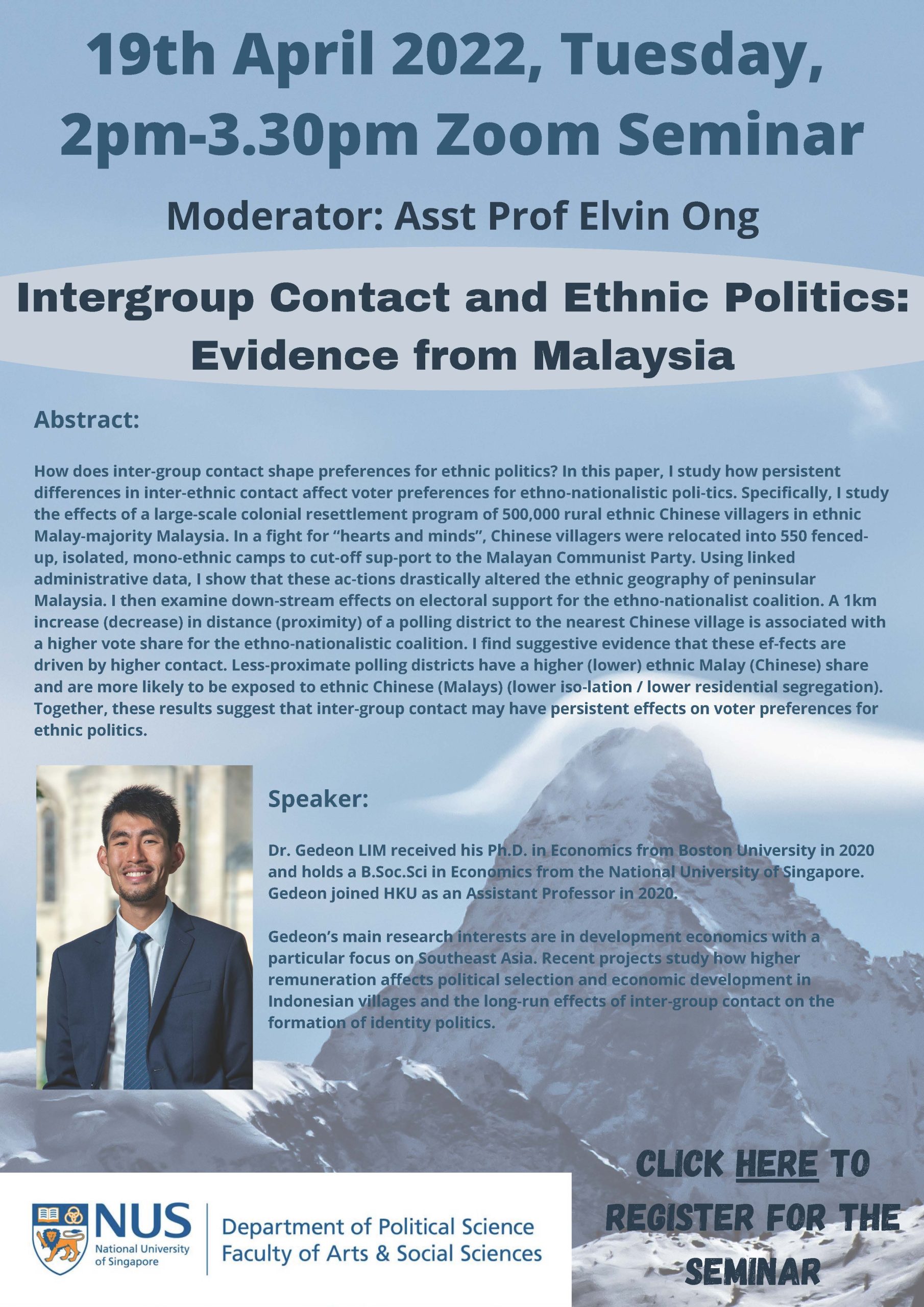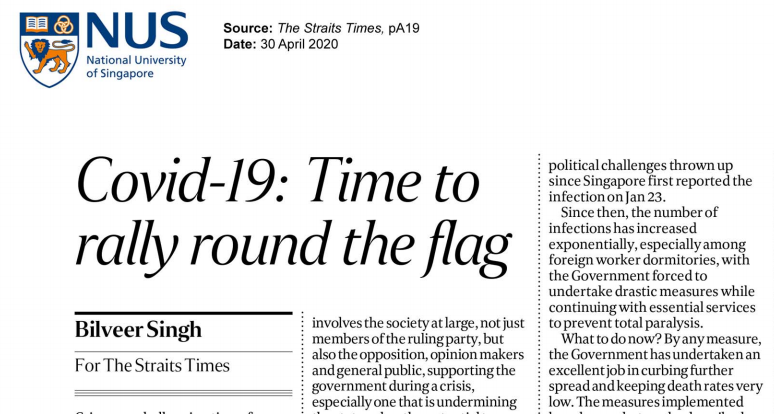News
Portraits of NUS life: Stories behind the NUS120 Photo Exhibition
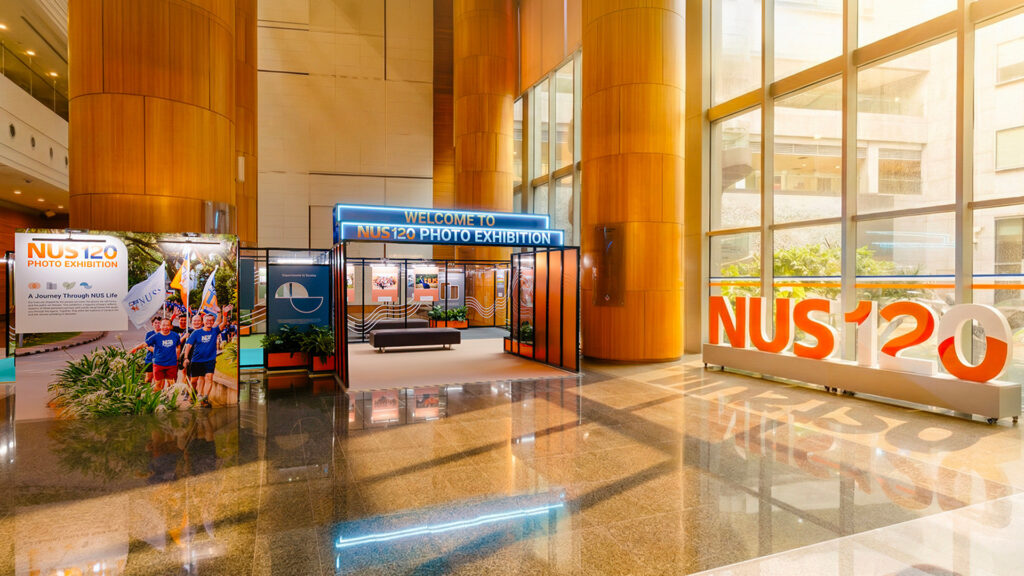
From the friendships forged and the breakthroughs made in the lab, to the iconic spaces that shape our memories and the quiet moments with nature. These are the scenes of campus life brought into focus at the NUS120 Photo Exhibition now on display in the lobby of the Lee Kong Chian Wing at University Hall until 31 March 2026.
Curated by the Office of University Communications from hundreds of photos submitted by the University community, the visual showcase of 46 images is among the highlights of the extended celebrations for NUS' 120th anniversary. Organised into four themes - ranging from human connection (Humans of NUS) to scientific discovery (Experiments to Eureka), campus architecture (Places That Shaped Us), and flora and fauna (Whispers of Nature) - it gathers not just the striking portraits and candid moments, but the personal stories behind them. To complement the exhibition, a digital collection of 120 photos, including those featured in the exhibition, has now been published.
Four of the photo contributors share the memories behind the moments they chose to capture.
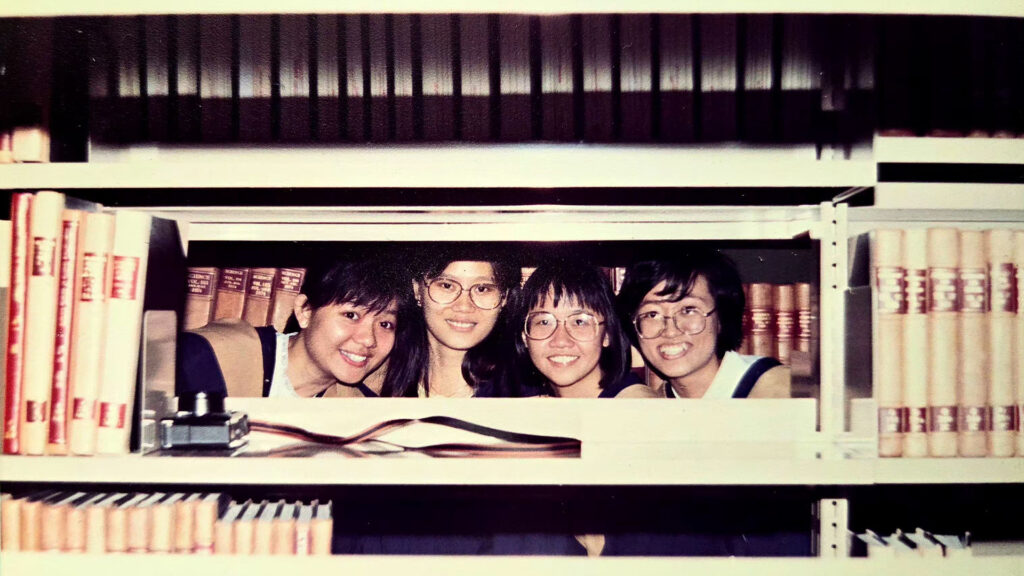
Building bonds through biochemistry
As groups of graduates headed for the picturesque spots on campus to take their celebratory photos, Ms Neoh Chong Eng, then a fresh graduate from the Faculty of Science, and her friends chose a more unusual backdrop: the shelves of the old Science Library. Smiling as they stood in the gaps between rows of periodicals, that image from 1987 now serves as a time capsule of their friendship.
The library was a fitting location: a vital resource back when internet access was not freely available, Ms Neoh explained. "As Biochemistry was a common subject among the four of us, the library was a place we frequented, both to study, and very often, to look up journal articles…Since these Science journals had been a source of our knowledge and information, we thought it apt to frame our convocation with these sources of knowledge." Though the old Science library was only opened in their final year, the Medical Library had been their primary haunt, as Biochemistry was offered by the Faculty of Medicine, now known as the Yong Loo Lin School of Medicine.
Their bond was forged during the demanding sessions at the Biochemistry lab, the meals they shared while waiting for experiment results and the countless conversations that filled their days. "These long hours of waiting for the collection of experiment data also became time for us to chat, get to know each other better and form a deeper friendship," she shared.
While time and the absence of instant messaging and social media have meant that only two of the four friends have remained in touch, those hours in the lab and libraries left an indelible mark. For Ms Neoh, it led to a career as a Chemistry teacher. Now retired, and turning 60 this month, she still cherishes the lifelong memories from those formative years immersed in Biochemistry, or as Ms Neoh puts it, "the chemistry of life".
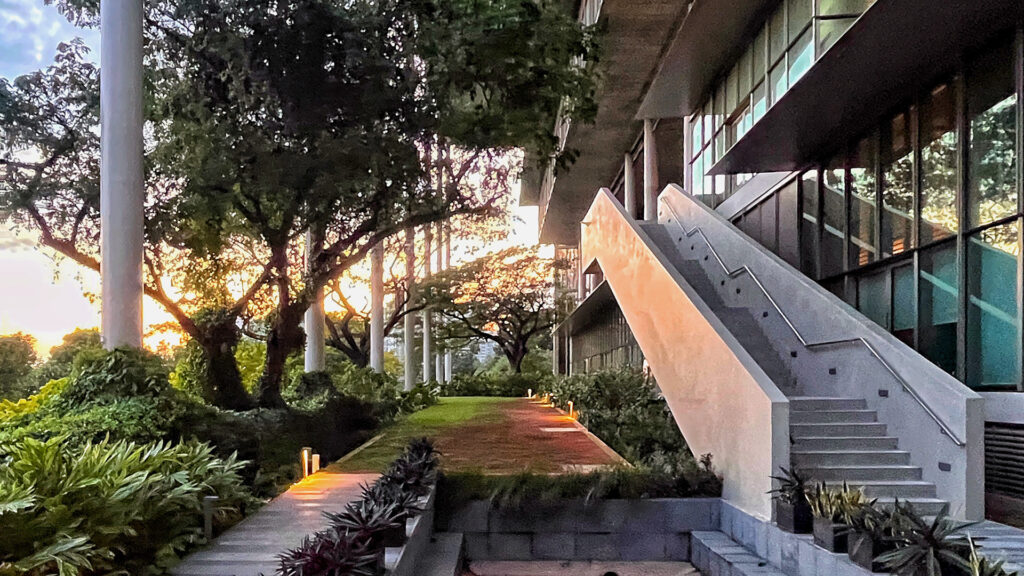
A moment of quiet poetry
Sunset filters through the trees, casting an orange glow across the glass façade of SDE4 and the concrete staircase leading down to a garden. For Ms Riya Kumari, who graduated from the College of Design and Engineering (CDE) in 2025, that image instantly brings back the sound of birds chirping and the faint traffic noise in the distance.
"To reach this spot, one has to walk up a beautiful staircase framed by trees before entering the building," Ms Kumari said, of the photo she took one evening in early September 2024 on her walk from the Central Library towards the SDE4 building. "Although it is technically the back entrance of SDE4, I always found it far more peaceful and visually calming than the main front entry."
While pursuing her Master of Science in Integrated Sustainable Design, Ms Kumari found in this tranquil spot a daily reminder for her and her groupmates to pause amid intense deadlines and back-to-back assignments. "Many days started early in the morning and stretched late into the night. During those intense periods, we developed a habit of taking a short sunset break," she recalled.
Revisiting this memory immediately transports her back to those evenings. "There was something deeply grounding about that combination of nature, structure, and stillness." Today, as a Project Architect at Aikyam Design Studio, a multidisciplinary architecture and interior design practice based in the Delhi region of India, she continues to draw inspiration from those moments. "As I move forward in my professional journey, I carry with me the habit of consciously slowing down, observing my surroundings, and finding meaning in everyday spaces. That mindset continues to shape how I approach design, creativity, and life beyond university."
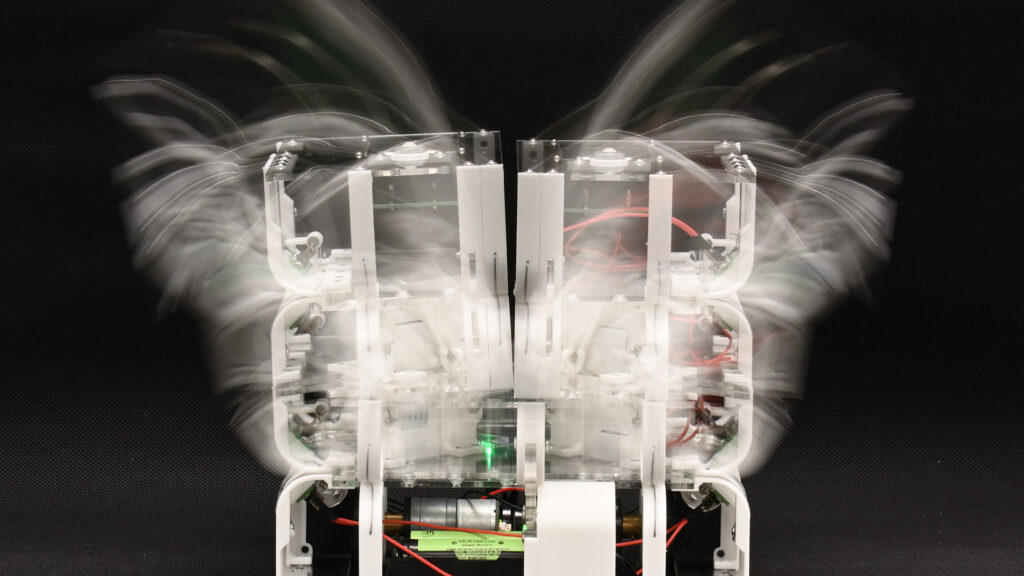
Engineering the perfect fold
As the side panels of the robot folded swiftly upwards, transforming it into a compact cube, Fan Zirui noticed that its shape-changing motion resembled a bird flapping its wings. This striking vision prompted the PhD student from the CDE's Department of Mechanical Engineering to capture the moment.
Developed in 2023 under the supervision of Dr Zhang Hongying from the Compliant Robotics and Engineering (CORE) Lab at NUS, OSCAR (Origami-inspired Shape-Changing Autonomous Robot) was Zirui's Bachelor of Engineering (Mechanical Engineering) final-year project. Designed to tackle ground coverage tasks, such as floor cleaning, it addresses a key limitation of conventional robots: navigating wide-open spaces and cramped corners alike. The Japanese art of paper-folding was a natural choice for the robot's structure because it offered "strong potential for achieving large, reversible shape changes," he explained.
Through its seven distinct configurations, OSCAR is capable of contracting to just one-third of its original width to access tight gaps and expanding in open areas for maximum coverage. Translating this flexibility to the robot's thick and rigid panels, however, was the biggest challenge - a problem he solved by designing an innovative, low-profile hinge mechanism driven by a single motor. "The 'eureka' moment was during the first successful folding test…Seeing the mechanism operate smoothly for the first time was both thrilling and a major relief," he recounted.
While the prototype is currently remotely controlled, Zirui and his team are developing the robot's perception and navigation capabilities for a fully autonomous operation. For Zirui, the project was a pivotal moment in shaping his career path. "It introduced me to the beauty and potential of origami-based structures and motivated me to pursue academic research."
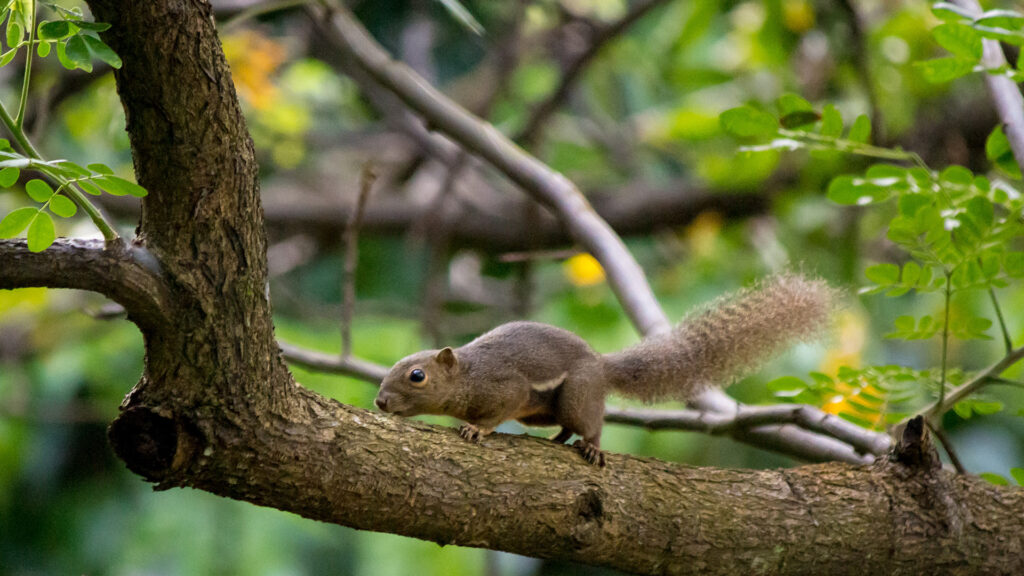
Moments in the wild
Unlike many perfectly-timed photographs that begin with a captivating sight, it was a familiar sound that made Mr Athanasius Koh, an Assistant Manager at NUS Giving, stop and take a closer look one morning in 2021. "A rustling in the trees piqued my interest," Mr Koh recalled, describing the scene just before he snapped the spontaneous shot of a plantain squirrel scurrying across a tree branch.
Then a Management Trainee at the Dean's Office in the Faculty of Arts and Social Sciences (FASS), he was on his morning walk to the office, passing the stretch of greenery between the AS4 and AS5 buildings, when he heard the rustling from the canopy and instinctively reached for his camera.
An FASS alumnus and passionate nature enthusiast, Mr Koh's interest in documenting the campus flora and fauna began when he was a Political Science undergraduate. "I've always been a fan of nature photography and NUS has always presented opportunities to spot new and interesting species thanks to its abundant greenery," he shared. He counts the collared kingfisher, red junglefowl, rose-ringed parakeet and changeable lizard among the diverse array of campus wildlife he has been fortunate to encounter and photograph.
Today, Mr Koh's lifelong passion for nature and wildlife finds greater significance through his professional work. In his role at NUS Giving, the University's philanthropic arm, he is part of the team raising funds and awareness for initiatives like the Plant-It-Forward Challenge, which plants a tree on campus for every S$1,000 raised for student financial aid, and the NUS CatCafé, a student group which cares for the community cats on campus. Through these efforts, he hopes to nurture and protect the natural spaces that have shaped his journey at NUS. "It's comforting to see that our green spaces remain vibrant enough for a wide variety of animals to truly call them home," he reflected.
This story first appeared in NUSnews on 21 January 2026.
ALUMNI STORIES | Keeping NUS’ Heritage Alive
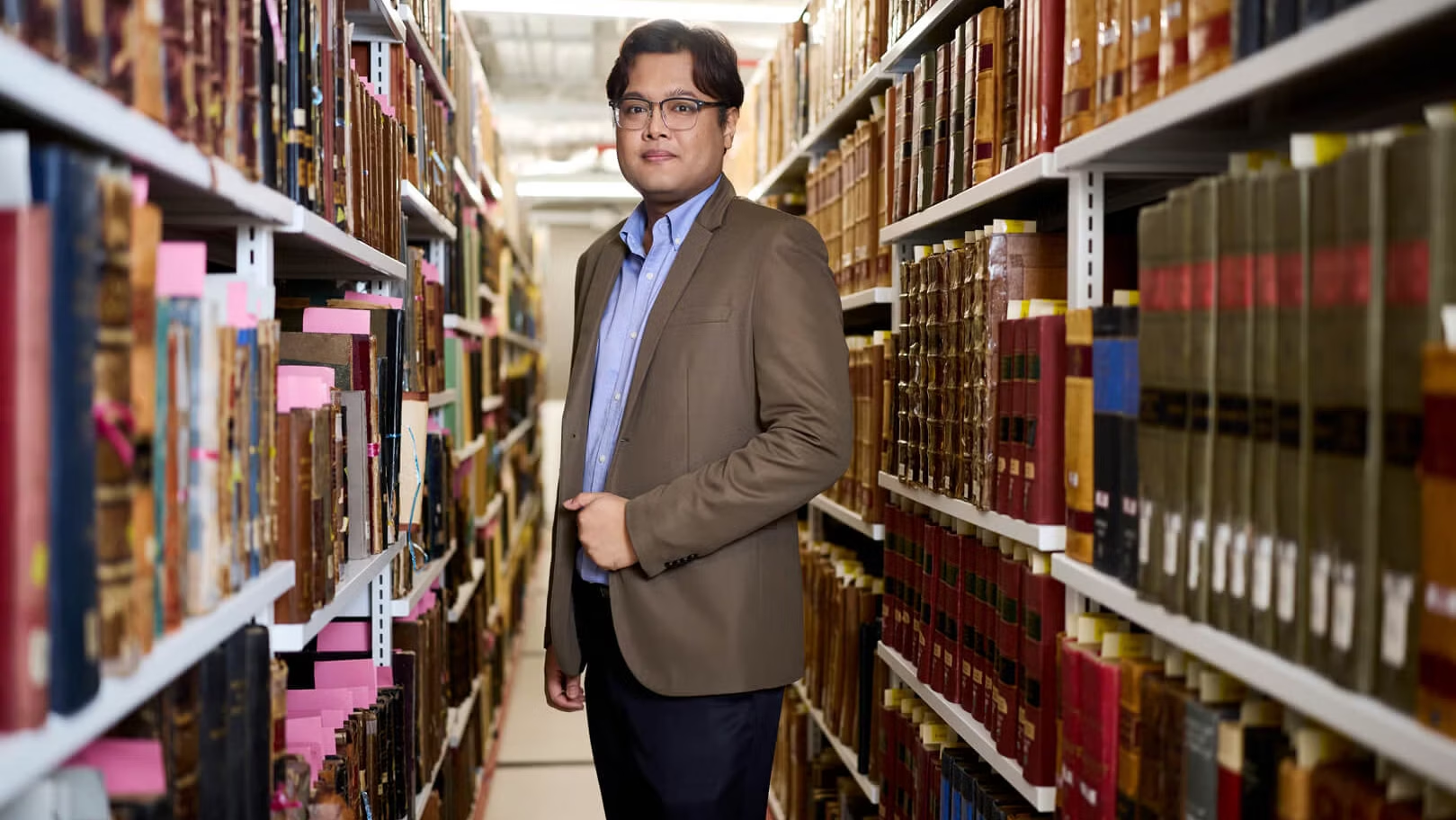
When Mr Herman Felani bin Md Yunos first stepped onto the NUS campus as a political science major, he never imagined that two decades later, he would still be here - not as a student, but as a key guardian of its legacy.
Now 42, Mr Herman is the Associate University Librarian and Head of Archives & Digital Preservation. But his love for libraries began much earlier. "I was a library club member in primary school and later became president of my library club in junior college," he recalled. "While most kids loved the fiction section, my favourite was the reference section - I loved reading encyclopaedias, maps and atlases." This early passion for information and preservation paved the way for a fulfilling career at NUS Central Library, which he joined in 2008 after a brief stint at the Ministry of Education.
Building on the Work of PioneersMuch of Mr Herman's work today builds on the foundation laid by mentors like Mr Tim Yap Fuan, a senior librarian who was instrumental in building the Singapore-Malaysia Collection. "Mr Tim joined the university in the mid-1980s and had a wealth of knowledge about our collections," Mr Herman said. "I'm still learning from the work he left behind."
Thanks to the efforts of Mr Tim and others, NUS Central Library houses rare treasures such as old Chinese newspapers like Lat Pau (1887-1932) and Sin Chung Jit Poh (1935-1940) - materials not even found in the National Library - as well as the Yeap Chor Ee Collection, donated by the prominent Chinese banker who began his career as a barber in Penang. The collection includes items such as the share certificate of Ban Hin Lee Bank Pte Ltd - Penang's first local bank founded by Mr Yeap - and the Estate of Yeap Chor Ee Endowment Trust Ledger, 1952-1958.
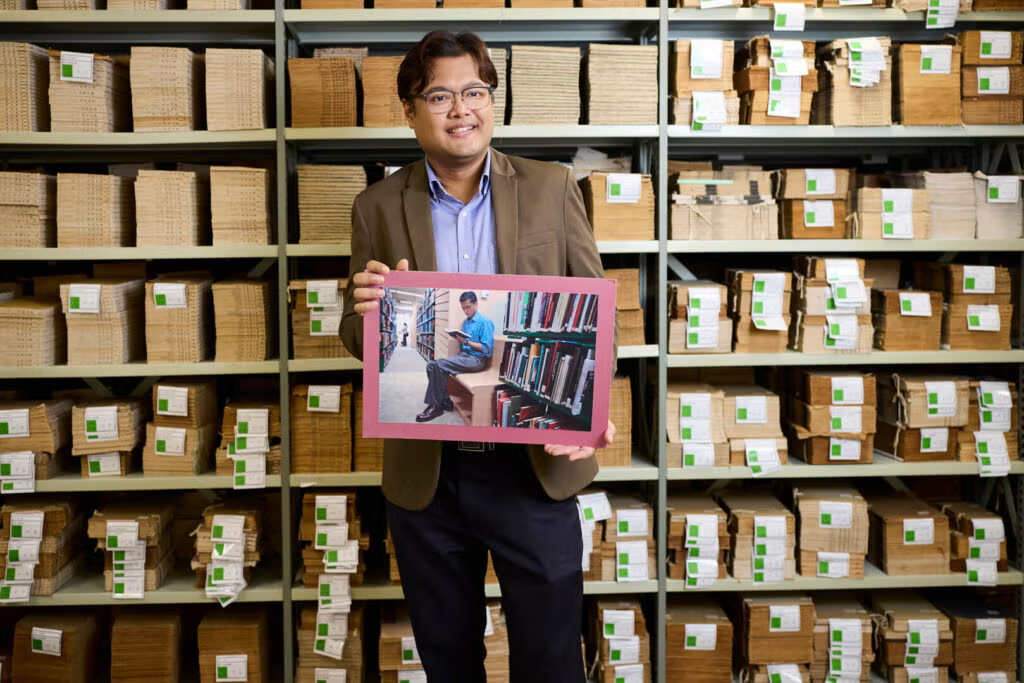 Making History Accessible - and Visible
Making History Accessible - and VisibleMr Herman wears many hats. His team not only collects, digitises and catalogues materials but also ensures they are accessible to researchers, students and the public. "Materials need to be described so that they can be searched easily by the public," he explained. "Text is still the main way people search for things." Digitisation has opened up new opportunities - NUS Central Library's 500 rare Southeast Asian materials, including the Edwin Thumboo Private Papers, Chinese Newspapers of Southeast Asia and books on Singapore's history and heritage, can now be accessed by researchers worldwide via platforms like Digital Gems. However, Mr Herman remains mindful of the challenges. "Digitisation is resource-intensive," he admitted. "We can't digitise everything. Data centres consume a lot of power, so we have to make careful decisions about what to preserve." Beyond books, the team is also digitising photographs, old posters and cassette recordings of prominent campus lectures.
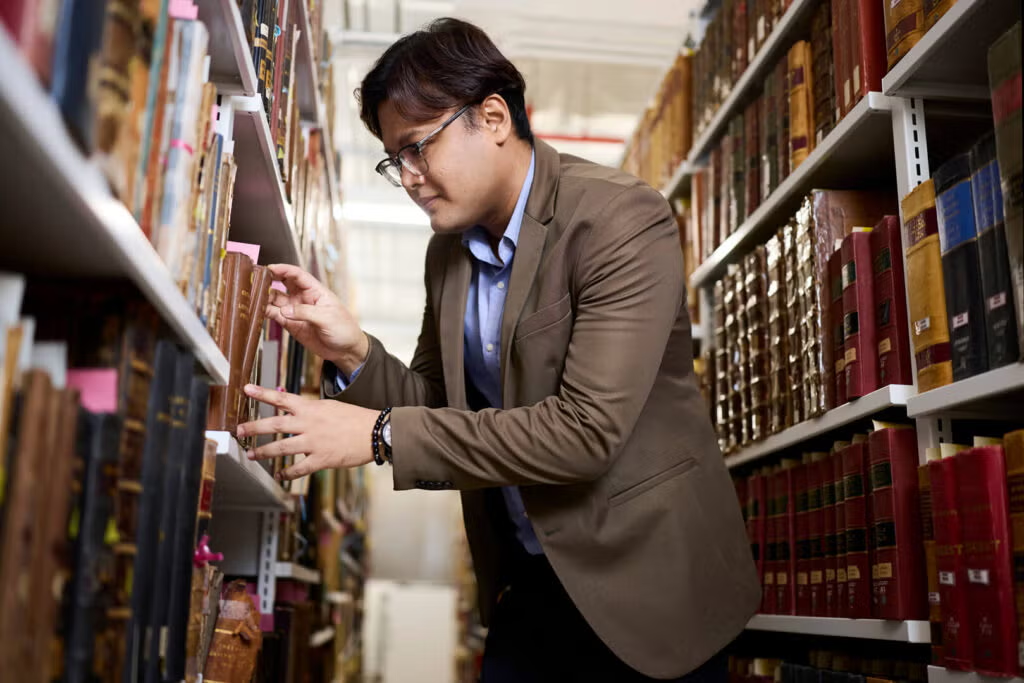
Some recent additions to the library archives are particularly fascinating. Two of Mr Herman's colleagues travelled to Sulawesi, Indonesia, to digitise Bugis materials - including the Keris instruction from the 7th century and a ship captain's log dated to the 1820s - which offer rare insights into early maritime trade in the region. Another meaningful contribution came from Ms Fenella Madoc-Davis, an Englishwoman who donated her late father's hand-drawn book on birds - created while he was imprisoned in Singapore during the Japanese Occupation. "It's not just the drawings but the story behind how he made the book under difficult conditions that makes it special," said Mr Herman. The library recently hosted a talk and exhibition around these bird drawings, engaging both the public and natural history enthusiasts.
To mark NUS' 120th anniversary, Mr Herman's team curated an exhibition for the University's gala dinner last July, featuring alumni-created creative works and commentaries, vintage student production posters, nostalgic campus photographs used as photobooth backdrops and in virtual reality and augmented reality challenges, as well as trivia quizzes.
Curating for TomorrowAs part of NUS' 120th anniversary celebrations this past July, Mr Herman and his team curated an exhibition for the NUS120 Gala Dinner. They showcased vintage posters from student productions and old photographs of campus life, offering alumni a nostalgic glimpse of their student days. A trivia quiz and possible virtual reality elements also added an interactive twist. "We want to make history more interesting and interactive," said Mr Herman. "We hope alumni can see how learning and campus life have evolved."

A Personal Homecoming
For Mr Herman, working at NUS feels like a full-circle moment. "I've basically never left the campus," he said with a laugh. "The library was one of the spots I was frequently in. Even during vacations, I'd come down just to do personal research." He has a longstanding interest in vexillology - the study of flags - and heraldry, which focuses on coats of arms and armorial bearings. As an undergraduate, these hobbies often led him deep into the library's Singapore-Malaysia Collection.
Today, one of the aspects of his job he treasures most is helping students. He fondly recalled assisting a student to print her exam cheat sheet before library hours and guiding another struggling polytechnic graduate on how to tackle university-level research - a simple conversation that led to a heartfelt postcard from the student when he travelled to South Korea. "Helping others, I think, is the best joy one can receive," Mr Herman said with a smile.
Inspiring the Next GenerationAs the library expands its digital footprint, Mr Herman remains committed to balancing technology with a human touch. By making history accessible, he hopes to not only preserve NUS's past but also inspire future generations to explore, discover and continue the journey of learning. "Hopefully, those down the road in the future will find these things useful when they reach their milestones - like NUS200," he said.
This story by Audrina Gan first appeared in The AlumNUS on =2 September 2025.
Discipline over Exceptionalism: Singapore-Based Scholars, Regional Sensitivities, and the Appeal of Anglophone International Relations Approaches
International Relations (IR) scholarship has long grappled with its Western-centric roots, often sidelining regional insights that could enrich the global discourse. In Southeast Asia, particularly in Singapore, there is significant potential for theoretical contributions given the region’s rich history of colonialism, state-building, and economic development. However, the balance between addressing local experiences and conforming to dominant Anglophone norms remains a challenge. From pressures to publishing international standards represented by the Anglophone world and academic freedom concerns, the study of IR in Singapore tends to follow academic norms that are typically established in North America. This tension reflects broader global debates on the need for more inclusive and pluralistic approaches in IR theory. In ‘Discipline over Exceptionalism: Singapore-Based Scholars, Regional Sensitivities, and the Appeal of Anglophone International Relations Approaches’ (Global International Relations in Southeast Asia, 2024), Associate Professor Ja Ian Chong (NUS Political Science) examines how scholars navigate between two main pressures: 1) aligning with international academic standards for legitimacy and to gain academic visibility, and 2) addressing local and regional sensitivities to remain contextually relevant. Through a survey conducted among Singapore-based IR scholars, A/P Chong finds a strong preference from the scholars to conform to global frameworks and trends. This tendency is shaped by institutional incentives and the global intellectual hierarchy, which prioritise North American-dominated Anglophone academic norms, often at the expense of engaging with debates and exchanges beyond the North American Anglophone sphere. Despite awareness of ‘non-Western’ IR approaches, their adoption remains limited among Singapore-based scholars due to institutional pressures, the dominance of Anglophone academia, professional incentives tied to established paradigms, and a focus on practical, policy-oriented research over theoretical innovation. Many respondents emphasise empirical research over theoretical innovation, often relying on established frameworks to interpret local phenomena. Furthermore, while some scholars express interest in promoting indigenous perspectives that challenge established norms, their integration into mainstream IR theory has been inconsistent, reflecting a broader ambivalence toward globalising the field of IR. As A/P Chong notes, the dominance of Western paradigms in Singapore’s IR scholarship not only limits intellectual diversity but also perpetuates the marginalisation of alternative perspectives. To address this, he advocates for a more inclusive approach that bridges local insights with global debates. This shift would not only enrich IR theory but also position Singapore as a key player in advancing a truly globalized understanding of international relations. Read the article here.
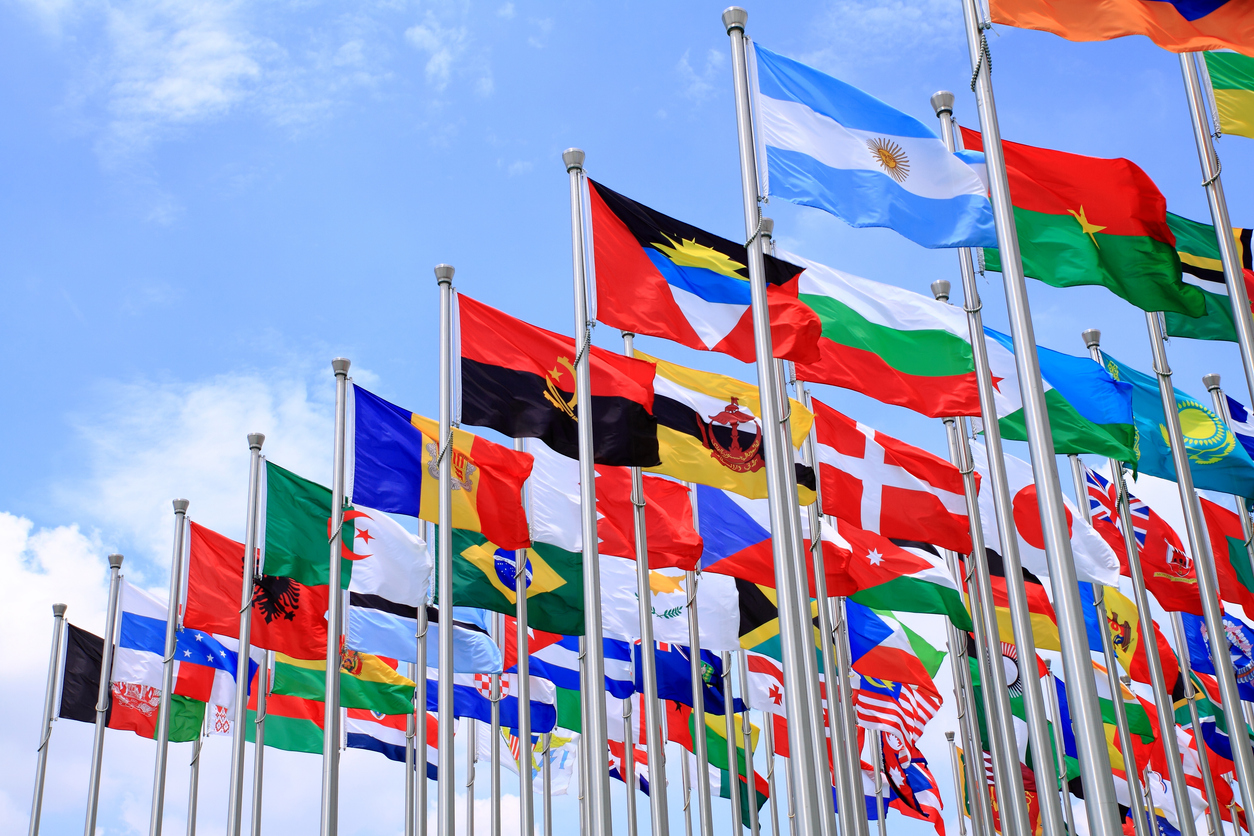
After 60 years of Singapore's nationhood, multiculturalism has become its defining trait - but not without some house rules
IN BRIEF | 10 min read
- Dr Rebecca Grace Tan (NUS Political Science) and NUS colleagues from the Institute of Policy Studies, Lee Kuan Yew School of Public Policy discuss multiculturalism and the Singaporean identity.
Click through image below to read this piece.
This story first appeared in The Straits Times and on NUSNews on 1 November 2025.
ALUMNI STORIES | Soaring Ambitions

A beautiful princess is held captive by an evil queen until a fisherman - washed up on the shores of this magical kingdom - comes to the rescue, braving great heights and deep waters. Since late August, audiences of House of Dancing Water at City of Dreams in Macau have been watching Singaporean performer Ms Megan Lau in the lead female swing role of Princess Aani.
In April, Ms Lau was conferred a Bachelor of Arts (Honours) degree with Distinction. But her life at present hardly fits the conventional narrative of a young graduate's path. While her peers may be busy with internships or new jobs, the 24-year-old is a performer in House of Dancing Water, a circus spectacle that features breathtaking acrobatics and dance performed in and over water.
"We watched the show in 2014 and 2016, and I absolutely loved it," she said. As a 13-year-old, she declared to her mother that she wanted to be a 'water princess'. When she saw the casting call for the show in June last year, it was like a dream come true. Ms Lau sent off her show reel - "I was trying my luck" - and quickly got a callback. By September 2024, she had been offered a role - she would train to be the water princess she wanted to be all those years ago.
The fact that she was considering moving abroad for this job drew concern from her otherwise supportive mother. She recalled: "My mum said, 'Megan, don't be crazy. Why do you want to hang and fly left and right?' Her hesitation came from a place of love and worry, but on the other hand, I don't think it came as a surprise to her that I wanted to do something like this."

Although the prospect was exciting, Ms Lau admitted it was a tough decision to make. "In Singapore, we're sort of ingrained to follow this road map of success," she said. "To veer off this road, you have to be willing to put in the hard work and be determined to lean into that fear - to not be afraid to find success in something less conventional."
Once she made up her mind, there was no stopping Ms Lau. She joined the 80-person cast in October last year as an aerialist perched some 20 metres in the air. Although she had been a dancer all her life, there was a lot of learning and training to be done to perform in and out of water for the 100-minute show. To add to the challenge, Ms Lau had a fear of heights - one she quickly overcame.
Halfway through the semester in her Honours year, Ms Lau was on a plane to Macau. In an Instagram reel, she explained how she calculated every possibility: whether to graduate without honours, whether she could complete a thesis instead of modules. By "sheer grit or a miracle", she made it work: She dialled in for classes from her hotel room in Macau, corresponded regularly with her professors by email, flew back for classes on her days off and for her exams - all without breaking pace at her new job. This level of tenacity is what sets Ms Lau apart. And today, her mother and older brother, reassured of her safety, remain her biggest supporters. They flew to Macau for the premiere of her lead role.
UNIVERSITY IN THE TIME OF COVID"I was in the COVID batch of undergraduates; I enrolled in 2020," said Ms Lau. "For the first semester, we didn't step foot in university at all. All our lessons were online." This was challenging for a young woman who, by her own admission, "cannot sit still". However, being a resident of Temasek Hall made all the difference. "At least I could make friends and be on campus. Though there were COVID restrictions, it made hall life and university life enjoyable," she shared. Ms Lau counts among her best memories of university the time in-person lessons resumed. "Transitioning to real-life lessons was great," she recalled. "We had done all our intro classes online, and I was finally seeing my friends in person."
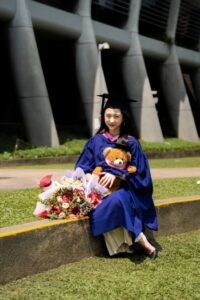 Ms Lau was in the fourth cohort of the PPE department (Philosophy, Political Science and Economics) at FASS, which she chose because "I wanted to do something in economics - it was my best subject." Prof Loy Hui Chieh (Arts & Social Sciences '98, MA '00), the head of PPE, was "a figure any PPE student could turn to. He was on Telegram and in all our group chats," she remembered. "If I ran into any problem, he would respond with help."
Ms Lau was in the fourth cohort of the PPE department (Philosophy, Political Science and Economics) at FASS, which she chose because "I wanted to do something in economics - it was my best subject." Prof Loy Hui Chieh (Arts & Social Sciences '98, MA '00), the head of PPE, was "a figure any PPE student could turn to. He was on Telegram and in all our group chats," she remembered. "If I ran into any problem, he would respond with help."
Being in a hall of residence fulfilled Ms Lau's other interests beyond academics. She credits Master of Temasek Hall Mr Victor Tan (Science '87, MSc '91) and Resident Fellow Mr Nisar Keshvani for creating "a lovely community."
Ms Lau was in the Temasek Hall dance club and its swimming team. She was also involved in the hall's yearly theatre production. "I'm someone who operates on a tight schedule," she admitted. "Being in hall and part of all the activities has shaped me in a way I didn't expect."
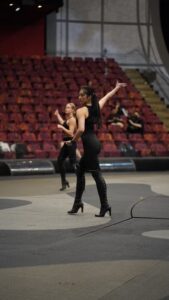 FOLLOWING THE FLOW
FOLLOWING THE FLOW
That Ms Lau performs in a world-class aquatic show seems only natural if one were to take a peek into her background. She began dancing at the age of 5, when she passed by a ballet school in a shopping mall and asked her mother to sign her up for classes. She pursued ballet all the way through secondary school, before exploring other areas of dance like jazz and contemporary dance. She also took rhythmic gymnastics in primary school. "During university, I worked as a freelance dancer. In 2021, I picked up aerial - to me it was a very natural flow," she added.
Ms Lau is cognisant of the fact that this is not a long-term job. "Being an aerialist or doing any kind of physical job, you definitely can't do it forever, right? But for now, I'm just really enjoying my time here in Macau. A lot of my fellow cast members have done other big shows, and I'm really enjoying training and learning from the people around me."
She added that she has been very lucky that no one has really commented that she has 'wasted' her degree. "I don't think it's a waste at all," she stated. "I think university is more like a whole package: going to school, building friendships, gaining education - these are like building systems I will take with me through life. It's essentially an experience that I will always carry with me. A degree is something that has shaped me - it's about the journey of learning."
This story by Theresa Tan first appeared in The AlumNUS on 30 October 2025.
NUS Faculty of Arts and Social Sciences rolls out its first alumni-to-alumni mentoring initiative
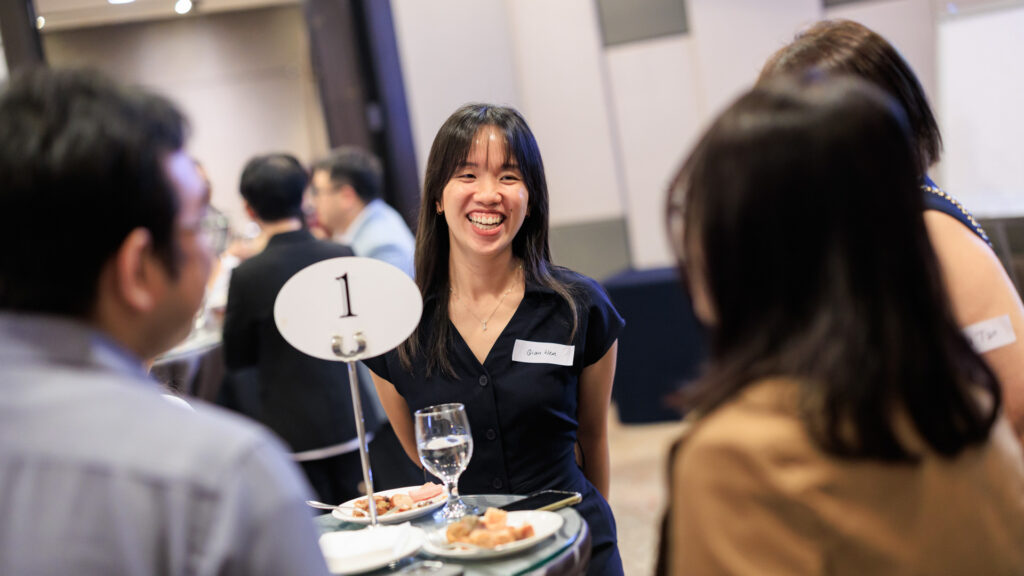
The NUS Faculty of Arts and Social Sciences (FASS) marked a new chapter for its alumni community with the launch of its very first alumni-to-alumni mentoring initiative - the FASS Alumni Mentoring (FAM) programme on 20 August 2025. The programme aims to connect senior and junior alumni to discuss career and industry insights, skills development and networking opportunities.
The launch was marked by an inaugural networking session that brought together over 35 alumni - experienced alumni mentors as well as young working alumni mentees who have graduated from NUS within the past 15 years - for an engaging evening themed around the art of networking.
A community built on shared growth
The FAM programme was created to nurture a supportive, intergenerational network, empowering participants to share knowledge, offer advice, and inspire one another with their insights and experiences. Recognising the demands of work and family life and a growing preference for short-term, targeted mentoring over traditional long-term programmes, the programme emphasises short-term, session-based mentoring to allow alumni to connect meaningfully without the pressure of long-term commitments. The FAM programme will be conducted twice a year.
FASS Dean Professor Lionel Wee noted how the FAM programme reflects the spirit of the FASS community, where alumni look out for one another, share experiences generously, and create opportunities for growth across generations. He said, "My hope is that FAM will become a cornerstone of our alumni network, sustaining our graduates through every stage of their personal and professional journeys."
From contacts to connections: FASS alumni Mr Soh Yi Da on the art of networkingMr Soh Yi Da, Singtel Director of Strategic Government and Institutional Relations and an alumnus from FASS Political Science and the former NUS University Scholars Programme delivered his compelling keynote speech on "From contacts to connections: The art of relationship cultivation in networking."
Mr Soh drew on Social Network Theory to illustrate the value of cultivating meaningful connections. The theory highlights how people are linked through networks of relationships, and how these ties shape the flow of information, opportunities and influence.
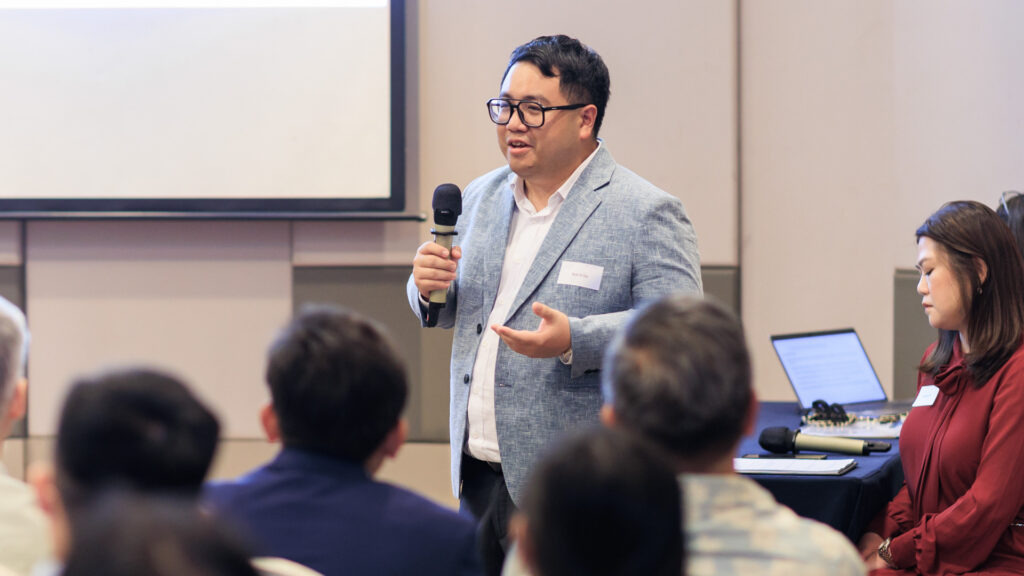
He emphasised the importance of both strong ties (such as with family and close friends) and weak ties (looser connections such as acquaintances or contacts from different fields), and the value of bridging gaps between different groups. He encouraged alumni to go beyond transactional networking, invest in genuine relationships, and find common ground to build trust - reminding them that while a tribe - a close‑knit group bound by shared identity, values, and mutual support - provides support, networks built on meaningful connections fuel growth and innovation.
Mr Soh praised the FAM programme as a meaningful new platform for fellow FASS alumni to connect and learn from one another.
He reflected, "It was a privilege for me to share my personal reflections on nurturing authentic relationships and growing a lasting network that truly matters. What was most rewarding was the immediate impact afterwards - I received numerous LinkedIn connection requests, and attendees reached out for deeper follow-up conversations. It was an affirmation that effective mentoring occurs when people feel empowered to take action right away."
The quick and active application of the discussion's insights by participants, he noted, was clear evidence of the programme's immediate impact.
Mentoring in action: Lively exchanges
The rest of the evening saw lively, candid exchanges between mentors and mentees in smaller groups. Mentors shared their insights and personal approaches to building professional relationships. These included Ms Yeap Su Phing, Political Science '06, Principal Speechwriter, Singapore Management University; Ms Carolyn Lim, History '05, Head of Corporate Communications, Musim Mas Group; Mr Chua Ching Hock, Political Science '08, General Manager of Seletar Airport, Changi Airport Group; and Mr Edwin Koh, Economics and Sociology '91, CEO of Centrum Global Tech Pte Ltd. Together, the mentors underscored Mr Soh's point - that authentic networking can open doors, strengthen communities and provide enduring support throughout one's career.
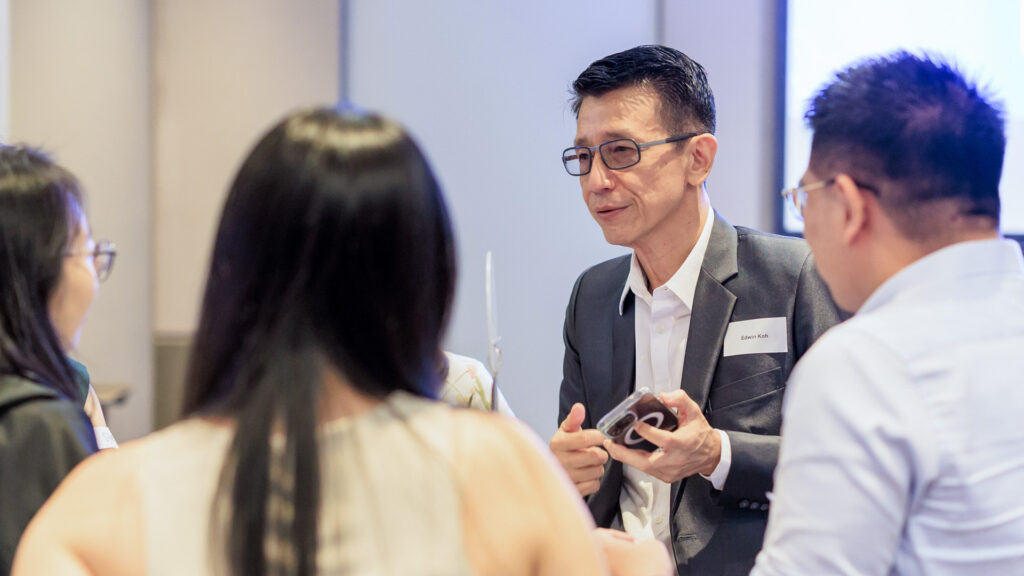
Ms Joelle Ngooi, a Communications and New Media '25 alumna, remarked, "These mentor-speakers have a wealth of experience in their respective fields and offered valuable insights into how they progressed in their careers, such as transitioning from being a specialist to being a generalist. I also had the chance to connect with people from the same industry, which was particularly meaningful as I step into the workforce. Additionally, I gained exposure to other industries, which broadened my perspective"
Building on the strong turnout and lively exchange at its debut, the FAM programme is set to become a meaningful part of the FASS alumni experience. The next session is slated for the second quarter of 2026. Announcements on the event will be made via the Faculty's website and social media channels.
This story by the NUS Faculty of Arts and Social Sciences (FASS) first appeared on NUSNews on 19 September 2025.
Reflecting on America’s Withdrawal From Afghanistan: The View From Southeast Asia
The September 11 terror attacks profoundly impacted international politics, leading to a 20-year-long War in Afghanistan that concluded with the U.S. withdrawal in August 2021. In ‘Reflecting on America’s Withdrawal From Afghanistan: The View From Southeast Asia’ (Armed Forces & Society, 2023), Associate Professor Terence Lee (NUS Political Science) delves into the implications of the war and the U.S.'s hasty exit on Southeast Asia. Assoc. Prof. Lee analyses the region's reactions to the initial U.S. military involvement and assesses America's evolving role in the Indo-Pacific’s security architecture post-Afghanistan.
In the early 21st century, a wave of terrorist attacks across Southeast Asia followed the September 11 attacks, pressuring regional governments to contribute to the U.S.-led Global War on Terrorism. This prompted a mixed response, as governments had to balance cooperation with the U.S. against domestic concerns, particularly from nationalist and Islamic groups. Countries like the Philippines and Singapore quickly supported the U.S. with military facilities and intelligence sharing, while Muslim-majority nations like Indonesia and Malaysia were more cautious, wary of framing counterterrorism as an attack on Islam.
Throughout the war, only three Southeast Asian militaries were physically deployed in support of Operation Enduring Freedom. Assoc. Prof. Lee attributes these differing responses to factors such as defence diplomacy and domestic policy considerations. For Singapore and Malaysia, participating in international peacekeeping and support missions was seen as a way to play an active role in global politics, enhance international ties, and reinforce deterrence. Thailand's deployment, on the other hand, reflected its longstanding security arrangements with the U.S., which included regular bilateral and multilateral military exercises.
Assoc. Prof. Lee concludes by suggesting that the Biden Administration's decision to withdraw from Afghanistan could benefit Southeast Asia and the broader Indo-Pacific region. He argues that this shift allows the U.S. to reallocate security resources to address strategic threats in the Indo-Pacific, particularly in response to China's growing assertiveness. This pivot is underscored by the creation of the AUKUS trilateral security partnership in 2021 and the revival of the Quadrilateral Security Dialogue, highlighting Biden's focus on prioritising Indo-Pacific security over prolonged conflicts in the Middle East. However, Lee notes that the durability of these commitments may be tested with future changes in U.S. leadership.
Read the article here.
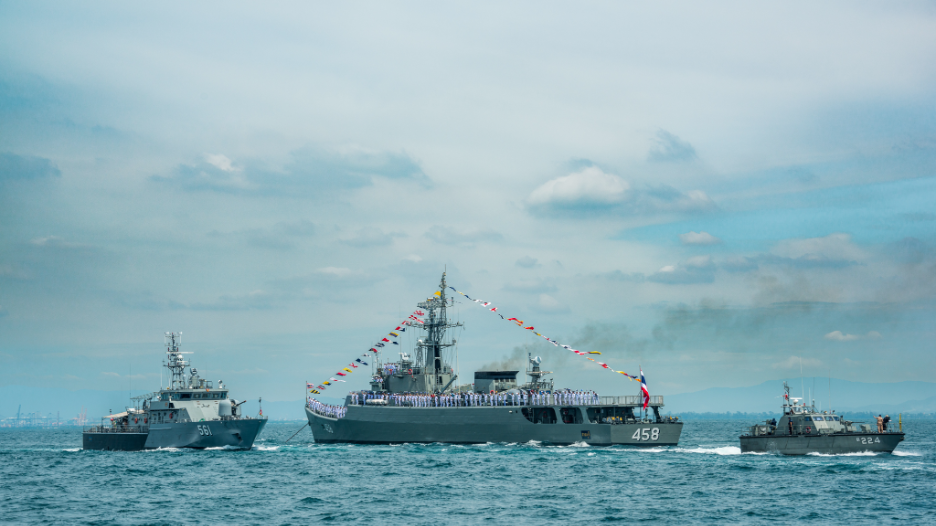
More than a simulation: SMUN 2025 prepares future leaders for global realities
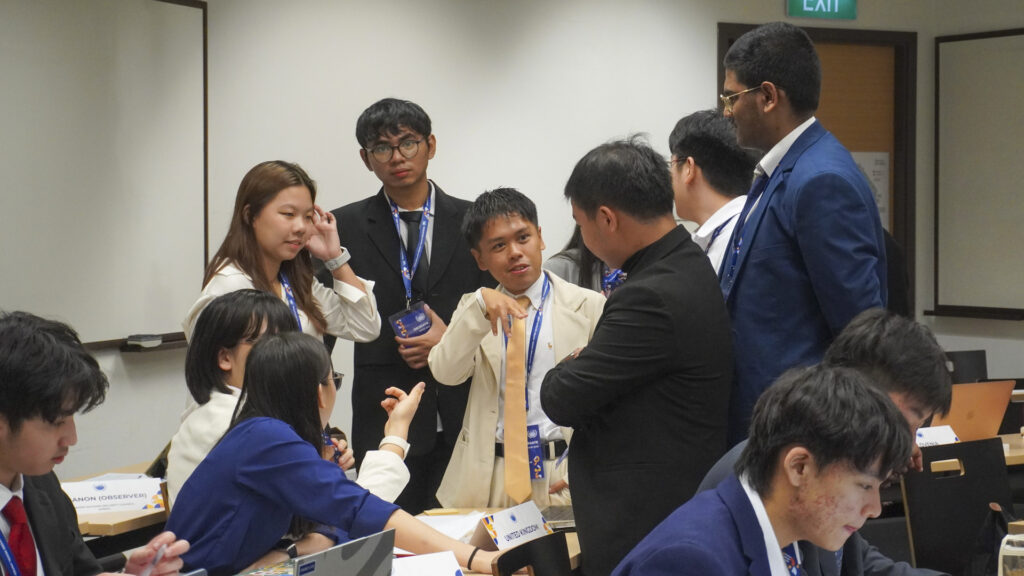
More than 400 students from over 20 pre-tertiary and tertiary institutions across Singapore and the Asia-Pacific region convened to debate critical global concerns at the 22nd Singapore Model United Nations (SMUN) conference that was organised by the NUS Political Science Society (NUS PSSOC) in June at NUS University Town (UTown).
Themed "Building a New Era of Diplomacy", SMUN 2025 provided an incisive lens through which young participants navigated the intricate complexities of global geopolitics by role-playing as UN delegates and members of international organisations such as the International Monetary Fund and the World Trade Organisation to discuss current issues such as digital currencies and tariffs.
A key highlight of the event was the thought-provoking keynote by distinguished diplomat and academic Mr Kishore Mahbubani, Distinguished Fellow at the NUS Asia Research Institute. In his address, Mr Mahbubani explored the shifting paradigms of global power and offered compelling insights into the current international order. He highlighted the remarkable success of ASEAN as a testament to effective regional cooperation and presented it as a model for navigating complex global challenges.
Mr Mahbubani also critically examined the structure of the UN, particularly the influence of the permanent members' veto powers. While acknowledging that the UN's effectiveness is often shaped by the interests of the major powers, he emphasised that it remains in the interest of small states to strengthen the multilateral system by "build[ing] upon a rules-based order and cooperat[ing] in issues of global importance such as climate change and denuclearisation." His remarks struck a chord with the young delegates, reinforcing their understanding of the importance of multilateralism and the pursuit of shared global interests to shape a more equitable world.
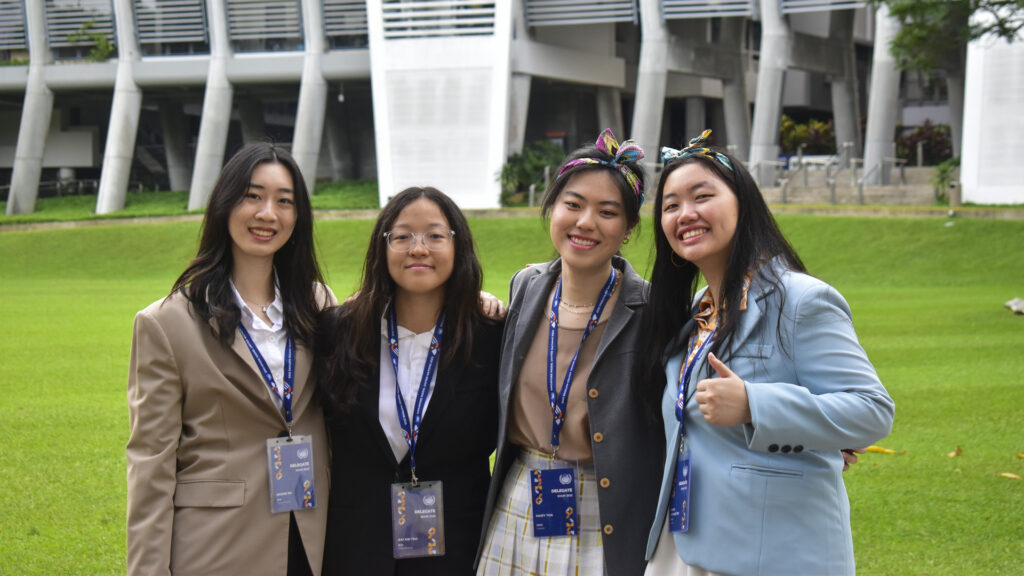
This year's conference featured delegates from 11 councils tackling a wide array of pertinent topics. In the United Nations Security Council, discussions centred on reforming peacekeeping operations - with delegates debating their effectiveness, future direction and the complexities of maintaining peace in conflicts such as the Syrian Civil War. The United Nations Economic Commission for Europe (UNECE) engaged in intricate negotiations on transboundary water treaties across the Pan-European region, a critical issue with far-reaching environmental and geopolitical implications. Meanwhile, the House of Commons (HOC) simulation offered a unique platform to examine the ongoing complexities and multifaceted consequences of Brexit, giving participants the opportunity to explore national political dynamics within an international context.
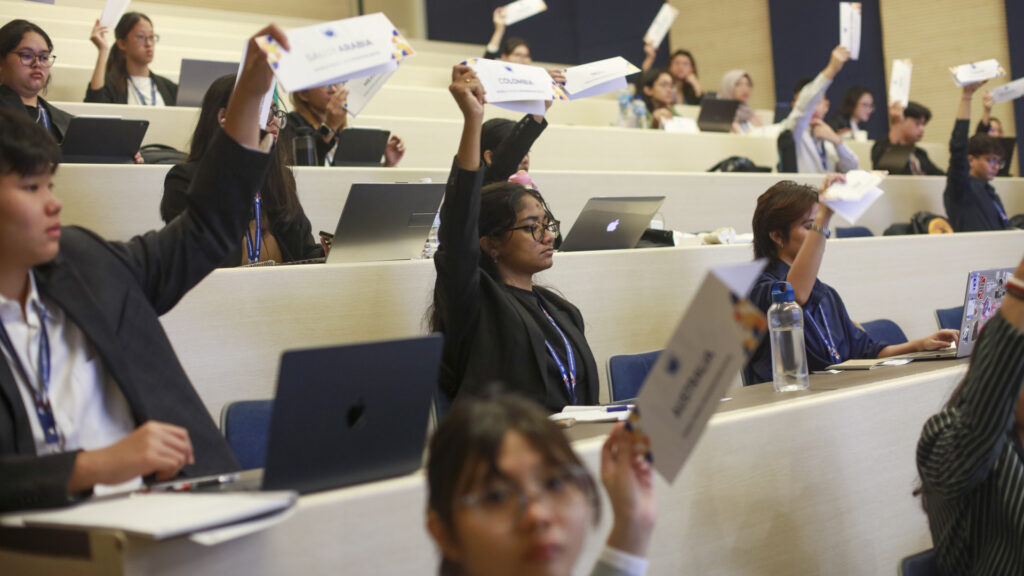
Through extensive research, preparation of detailed position papers, and the development of innovative policy proposals, delegates engaged in intense debates, striving to pass resolutions through collaborative effort and majority vote.
As with previous iterations, SMUN 2025 was meticulously designed to spur active participation and meaningful dialogue. Participants who demonstrated significant contributions throughout the conference were duly recognised with prestigious awards such as Best Delegate, Outstanding Delegate, Honourable Mentions, and Best Position Paper, celebrating their dedication and diplomatic acumen.
Mr Arav Taneja from Temasek Secondary School received an honourable mention award for his outstanding contributions in the House of Representatives of Japan (HRJ). Recounting his experience, he shared, "When I first walked into the House of Representatives Japan SMUN conference room, I felt like a small fish in a big lake. However, as we progressed through council sessions, I found my voice. I engaged in constructive debate with other delegates and worked on resolutions like it was second nature. I gained invaluable knowledge not only about Japan but also about global dynamics. However, I think the biggest takeaway was the connections and friendships I made along the way."
PSSOC President and Year 2 student from the NUS Faculty of Arts and Social Sciences Ms Irdina Duran, expressed her thanks to all involved for the success of SMUN 2025. "We are immensely grateful to Mr Mahbubani for his profound insights and to all the dedicated participants who made this year's conference an undeniable success."
SMUN 2025 Secretary-General and first-year student from the NUS Faculty of Law Mr Aditya Garladinne noted that this year's event has proven to be a vibrant crucible of intellect and diplomacy. Far more than a mere simulation, it is a testament to the boundless potential of our youth, he said.
"Witnessing these bright minds grappling with the world's most pressing challenges is not just inspiring; it is a profound reassurance that the future of global cooperation rests in exceptionally capable hands. This event truly exemplifies how experiential learning can cultivate not only future leaders but also compassionate and globally aware citizens."
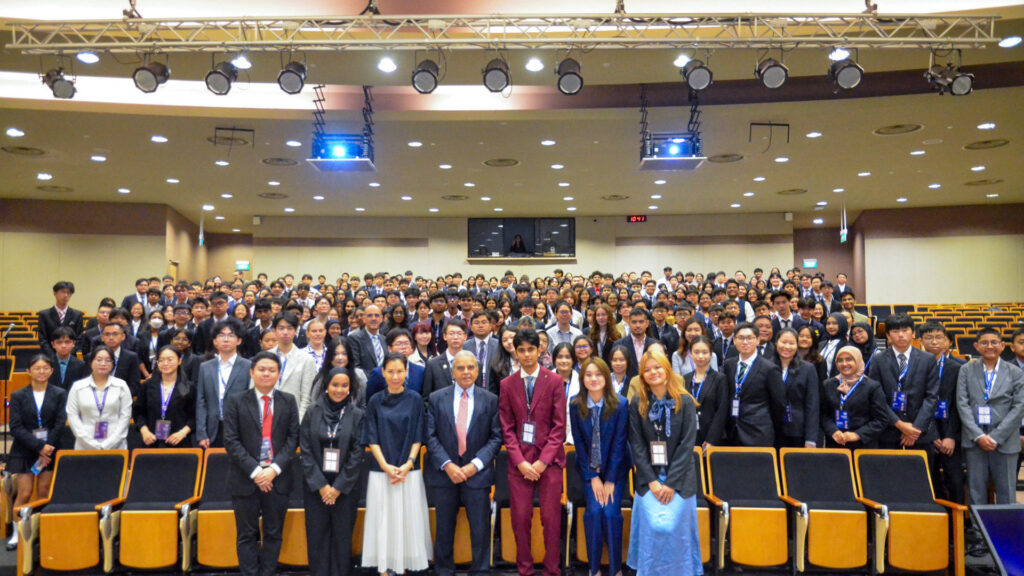
This story by the NUS Political Science Society first appeared on NUSNews on 30 July 2025.
Herding Cats: Coordination Challenges in ASEAN's Approach to China
The Association of Southeast Asian Nations (ASEAN) adheres to the ASEAN Way, a policy of mutual non-interference and consensus decision-making among its 10 member states. Despite their declarations of unity and unanimity, this consensus-driven approach often poses coordination challenges, particularly in managing their multifaceted relationship with the People's Republic of China (PRC). This is further complicated by the member states' desire to maintain neutrality between the PRC and the United States as global superpowers. In light of growing global tensions, Associate Professor Ja Ian Chong (NUS Political Science) explores this complexity in 'Herding Cats: Coordination Challenges in ASEAN's Approach to China' (China Review, 2023).
The author claims that in popular media, a popular descriptor of ASEAN policy towards Beijing is "hedging", which implies a coherent strategy that is primarily risk mitigatory by nature. For instance, most member states largely agree in extensive trade cooperation with the PRC, as exemplified by the success of the ASEAN-China Free Trade Area agreement and the initiation of the Regional Comprehensive Economic Partnership (RCEP). In other domains however, ASEAN's behaviour should be described as "ambivalent", since nation states tend to prioritise their own self interest and hence do not act as a collective. This haphazard approach is seen across key issues such as the South China Sea (SCS) conflict, where members differ on how strongly they wish to stake their claims and interests. There is hence a contradiction between ASEAN's stated statements and intentions and the actual actions of member states, when they tend to fall short on stated intentions.
Associate Professor Chong offers several reasons for ASEAN's varied approach in coordinating with the PRC. Some argue that current frictions in the South China Sea are merely teething problems that will eventually smooth out, similar to the improved relations seen in trade and security, such as during Vietnam's invasion and occupation of Cambodia. Additionally, ASEAN has shown greater success in issues where member states have shared focal points.
In a period marked by tense global relationships, such as the Russian-Ukraine war and the Israel-Palestine conflict, it is crucial for ASEAN member states to resolve their differences and develop a shared vision through a consensus model. This approach is necessary to avoid provocations with an increasingly assertive PRC in an ever-globalising world, and ensures that Southeast Asia remains a stable and secure region.
Read the article here.
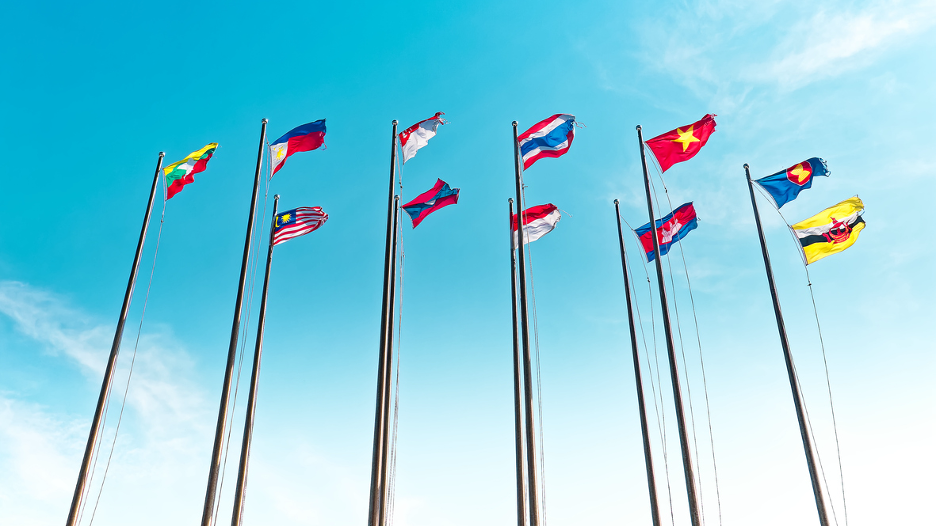
NUS confers Honorary Degrees on Ambassador Chan Heng Chee, Dr Noeleen Heyzer and Mr Wong Ngit Liong
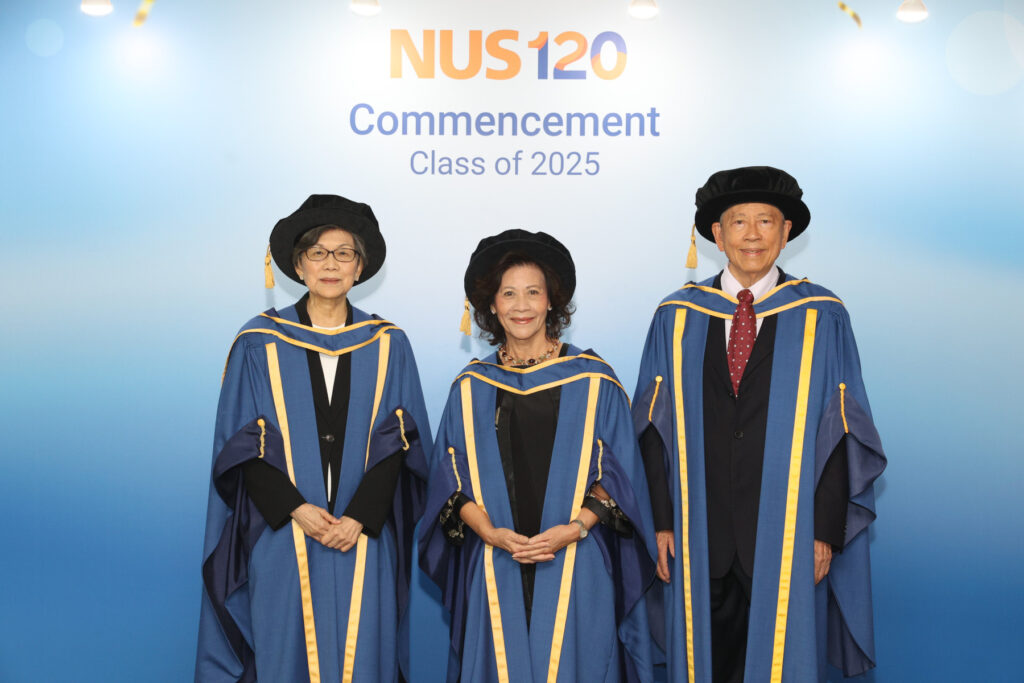
The National University of Singapore (NUS) has conferred the Honorary Degree of Doctor of Letters on three distinguished leaders: Ambassador-at-Large Chan Heng Chee with the Singapore Ministry of Foreign Affairs; social scientist Dr Noeleen Heyzer, former Under-Secretary-General of the United Nations and Rector of Ridge View Residential College, NUS; as well as global technology pioneer Mr Wong Ngit Liong, Executive Chairman and founder of Venture Corporation.
The honorary degrees were presented during a Special Ceremony, held as part of the NUS Commencement 2025, presided by Mr Desmond Lee, Minister for Education and Minister-in-Charge of Social Services Integration. The Honorary Degree is the University's highest form of recognition for outstanding individuals who have rendered distinguished service and have had a noteworthy impact in Singapore and globally.
This year's Commencement holds added significance as the University commemorates its 120th anniversary - celebrating a proud legacy of excellence, innovation, and service.
Ambassador Chan Heng Chee, an NUS alumna, was recognised for her distinguished work in policy studies, international relations and intellectual think-tanks, marking a lifetime of contributions to scholarship, diplomacy and civic life.
Dr Noeleen Heyzer, who is also an NUS alumna, was honoured for her visionary leadership in advancing the empowerment of women globally, raising Singapore's international profile and making global impact through her service at the United Nations (UN) and beyond.
Mr Wong Ngit Liong was lauded for his achievements as a leader and pioneer in the global technology industry, contributions to Singapore's higher education and national development, and dedication to public service through active involvement on national boards and committees.
The NUS Class of 2025 comprises 17,646 graduates: 7,948 students will receive Bachelor's degrees and 9,698 will receive graduate degrees. A total of 35 ceremonies will be held at the NUS University Cultural Centre over a period of 12 days, from 10 to 21 July 2025. NUS Commencement 2025 will conclude with the Commencement Dinner, which will be held on 22 July 2025.
NUS President Professor Tan Eng Chye said, "We are very proud to confer honorary degrees this year on three eminent leaders and visionaries - Ambassador Chan Heng Chee, Dr Noeleen Heyzer and Mr Wong Ngit Liong - all of whom have distinguished themselves through excellence and innovation in their fields, and elevated Singapore's standing on the international stage. Their profound accomplishments are a testament to their exceptional capabilities and steadfast commitment to the advancement of society and betterment of communities in Singapore and beyond. They have greatly inspired us with the journeys they have taken and we are celebrating the achievements of these outstanding individuals today."
This year, 268 students will be graduating as the pioneer cohort of 13 programmes:
- Master of Science (Behavioural and Implementation Sciences in Health)
- Master of Science (Precision Health and Medicine)
- Master of Science (Applied Biomedicine)
- Bachelor of Information Technology
- Master of Arts (Japanese Visual Cultures)
- Master of Science (Strategic Analysis and Innovation)
- Master of Science (Data Science for Sustainability)
- Master of Science (Biodiversity Conservation and Sustainability)
- Master of Science (Physics for Technology)
- Master of Pharmacy (Clinical Pharmacy)
- Master of Science (Semiconductor Technology and Operations)
- Bachelor of Engineering (Infrastructure and Project Management)
- Master of Design in Integrated Design
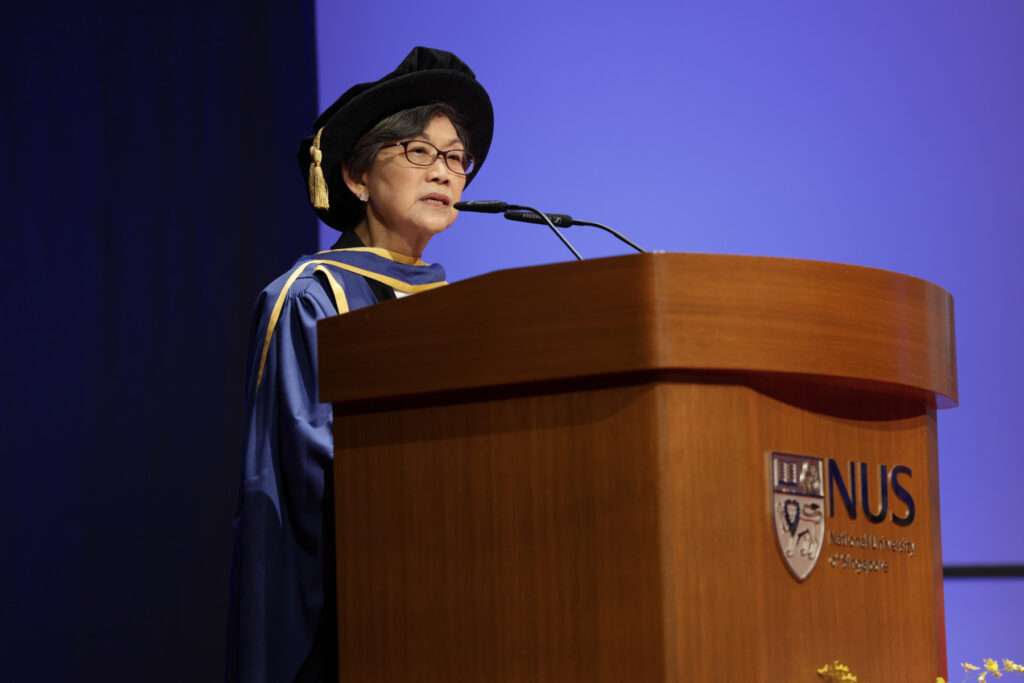
2025 Honorary Doctor of Letters Recipient - Ambassador Chan Heng Chee
Ambassador Chan Heng Chee began her career as a political scientist, graduating with First Class Honours in Political Science from the University of Singapore, a Master of Arts degree from Cornell University, and a PhD from the University of Singapore.
She taught at NUS and became the University's first female head of Political Science. Through award-winning books, she established herself as a leading voice on Singaporean politics, unafraid to ask discomfiting questions and bring clarity to complex issues. She was next appointed to lead the new Institute of Policy Studies, which remains an influential think tank.
In 1989, as Singapore's United Nations Representative and Ambassador to the United States of America, Ambassador Chan brought scholarly rigour as well as diplomatic finesse to the world stage. Her 16 years in Washington deepened ties, culminating in the US-Singapore Free Trade Agreement. Her contributions were honoured in Singapore and internationally.
Ambassador Chan has also made significant achievements as a public intellectual, joining the Council for Minority Rights and launching another think-tank: the Lee Kuan Yew Centre for Innovative Cities.
Throughout her career, Ambassador Chan, who also served as a member of the NUS Board of Trustees from 2012 to 2024, has helped shape how Singapore understands itself and how it is understood by the world - as an academic, a diplomat, and leading intellectual. She brings together a rare combination of intellectual independence, global experience, and a deep commitment to public service.
Please refer to Annex 1 for the Citation for Ambassador Chan Heng Chee.
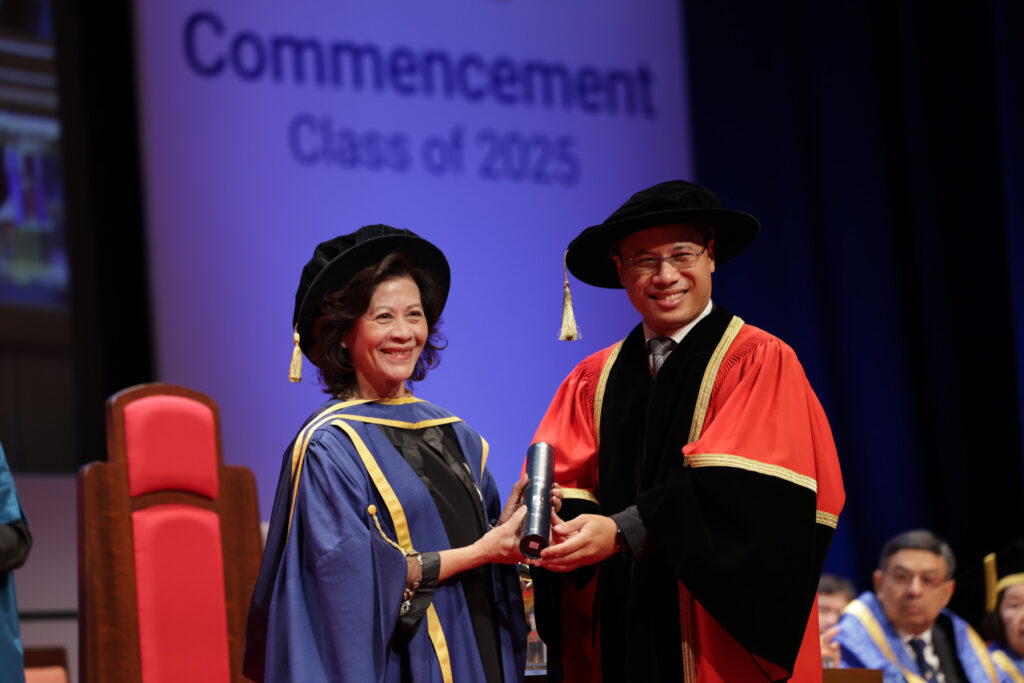
2025 Honorary Doctor of Letters Recipient - Dr Noeleen Heyzer
A trailblazer of women's empowerment across the world, Dr Noeleen Heyzer's leadership has redefined the nature of power itself - as a force for dignity, inclusion, and transformation. She has dedicated her life to building a more peaceful and sustainable world and raised Singapore's international profile during her career at the United Nations (UN) and beyond.
Dr Noeleen was the first woman from outside North America to head the United Nations Development Fund for Women (UNIFEM). During her tenure, she transformed UNIFEM from a small organisation into a leading powerhouse empowering woman globally. She was instrumental in securing the landmark UN Security Council Resolution 1325, which recognises women as essential to peace and security, and post-conflict recovery.
Dr Noeleen was the first woman to serve as the Executive Secretary of the United Nations Economic and Social Commission for Asia and the Pacific (ESCAP) since its founding in 1947. Under her leadership, ESCAP grew in profile and stature, advancing regional cooperation rooted in equity, resilience, and sustainable development.
Dr Noeleen's courage and clarity of purpose have shaped peacebuilding efforts in some of the world's most fragile contexts. As the UN Secretary-General's Special Adviser for Timor-Leste and later as Special Envoy on Myanmar, she worked closely with conflict-affected communities and leaders to forge paths toward peace.
Dr Noeleen has made global impact through her service in many local and international boards and committees, including UN Secretary-General's High-Level Advisory Board on Mediation. Dr Noeleen also served as a member of the NUS Board of Trustees from 2013 to 2018. She is also the Rector of NUS Ridge View Residential College, where she continues to inspire generations of young Singaporeans.
Please refer to Annex 2 for the Citation for Dr Noeleen.
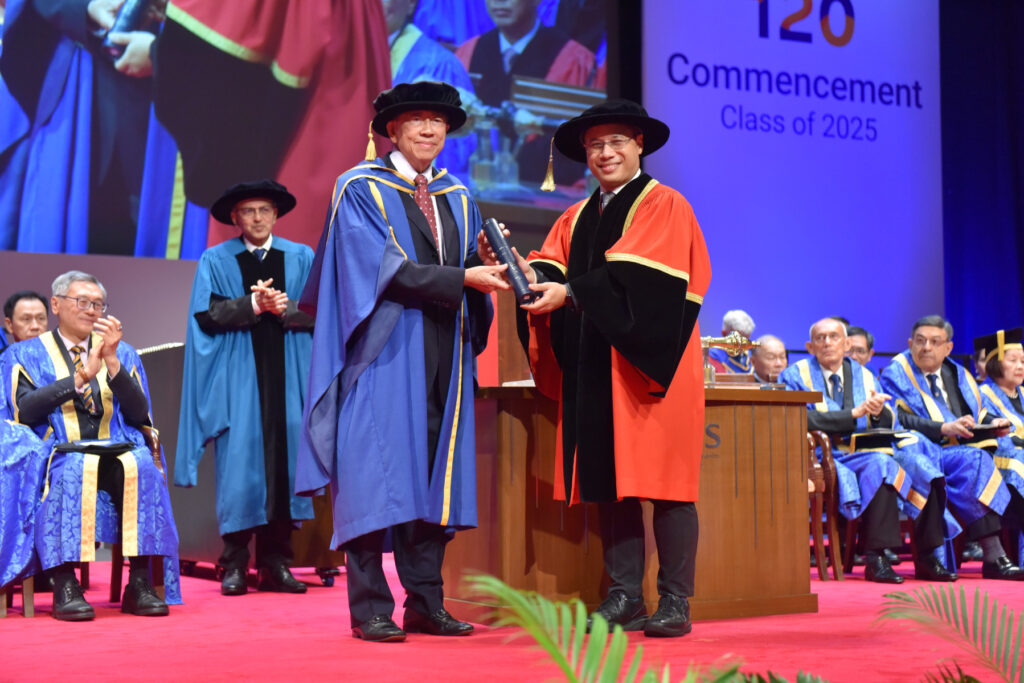
2025 Honorary Doctor of Letters Recipient - Mr Wong Ngit Liong
Mr Wong Ngit Liong is a distinguished leader and pioneer in the global technology industry. As Executive Chairman and founder of Venture Corporation, he has been instrumental in building the company into a leading provider of technology services, products, and solutions worldwide. Since its inception in 1984, Mr Wong has led Venture Corporation's evolution from a start-up in electronics manufacturing services into a globally recognised technology powerhouse, exemplifying visionary leadership and strategic foresight.
Mr Wong holds a Bachelor of Engineering (First Class Honours) in Electrical Engineering from the University of Malaya, a Master of Science in Electronics Engineering from the University of California, Berkeley (Fulbright Scholar), and a Master of Business Administration (with Distinction) from McGill University. His professional career began at Hewlett-Packard (HP), where he played a pivotal role in expanding HP's operations in Singapore and Malaysia.
In addition to his corporate leadership, Mr Wong has made lasting contributions to Singapore's higher education landscape and national development. As Chairman of the NUS Board of Trustees from 2004 to 2016, he was instrumental in driving major reforms that propelled NUS into the ranks of the world's top universities. His leadership was crucial in the corporatisation of the university and its structural transformation.
Mr Wong's dedication to public service is reflected in his active participation on numerous national boards and committees, including the Economic Development Board, the then-Trade Development Board, DBS Bank, Singapore Exchange, the Committee to Review Salaries of Political Appointment Holders, the Constitutional Commission to Review the Elected Presidency, and the 2002 Economic Review Committee. In recognition of his exceptional service and contributions to Singapore, Mr Wong has been conferred the Meritorious Service Medal and the Distinguished Service Order.
Please refer to Annex 3 for the Citation for Mr Wong.
This story first appeared on NUSNews on 14 July 2025.
Celebrating a legacy of growth and global impact
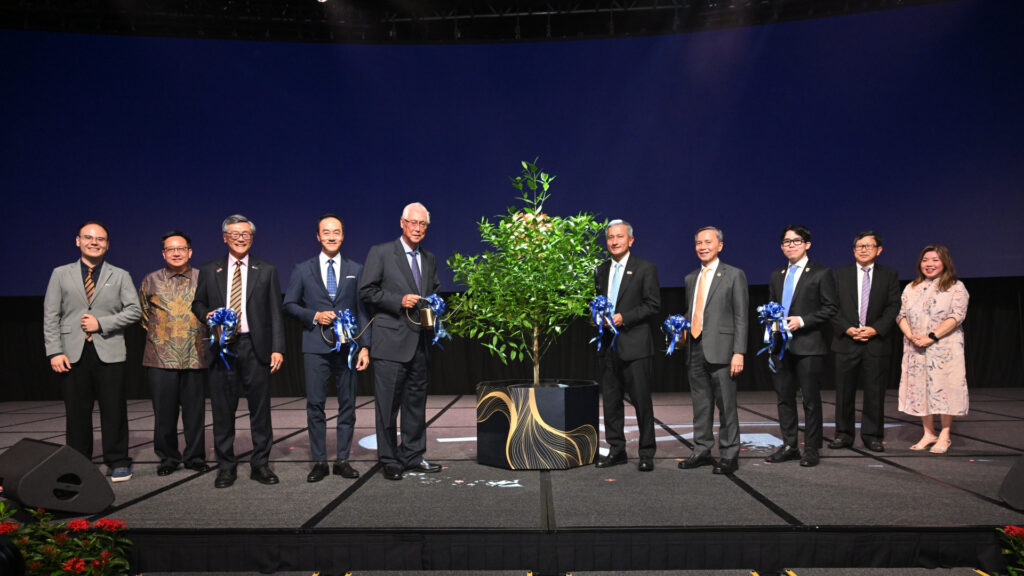
NUS marked its 120th anniversary with a grand gala dinner on 3 July 2025 at Marina Bay Sands, gathering close to 2,000 alumni, donors, partners and friends, including Guest-of-Honour Minister for Foreign Affairs Dr Vivian Balakrishnan (Medicine '85, MMed '91), Emeritus Senior Minister Goh Chok Tong (Economics '64, HonLLD '15), and Senior Minister of State for Health and Manpower Dr Koh Poh Koon (Medicine '96, MMed '03). The evening paid tribute to NUS' astounding journey of service, innovation and impact since its founding in 1905.
From its roots as the Straits Settlements and Federated Malay States Government Medical School with only 23 students, NUS has grown into a globally renowned institution spanning 15 colleges, faculties and schools across three campuses.
In his opening remarks, NUS President Professor Tan Eng Chye (Science '85) reflected on its founding purpose: "The Straits Settlements and Federated Malay States Government Medical School was the forerunner of the Yong Loo Lin School of Medicine, honouring a legacy of service from tending to the wounded in World War II to serving on the frontlines during the COVID-19 pandemic," he shared. "Today, the School of Medicine is pushing the frontiers of groundbreaking research discoveries such as developing life-saving CAR-T cell immunotherapy to treat leukaemia, and the world's first blood-based diagnostic test for early gastric cancer detection."
Prof Tan noted that this same spirit of service still drives NUS today, which now educates over 7,000 undergraduates each year, producing graduates who contribute across society - including more than half of today's Cabinet ministers.
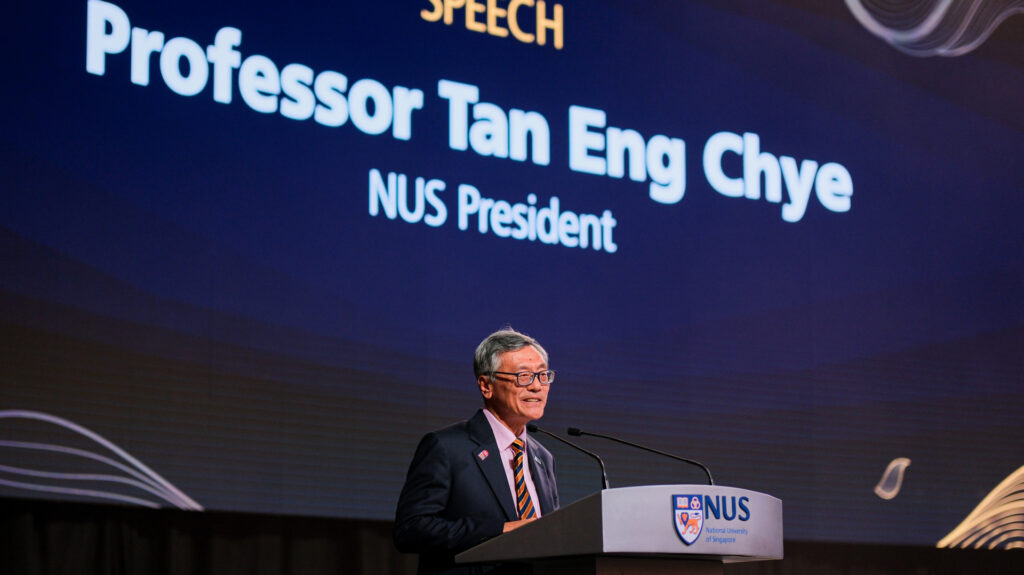
Relevance in a changing world
Yet Prof Tan was clear-eyed about the challenges ahead. Rapid technological disruption, shifting student expectations and geopolitical uncertainties will test the University's resilience and relevance. "To remain relevant, we must continuously adapt - renewing our value in each new generation, not only in how and what we teach, but how we lead and inspire," he emphasised.
Against this backdrop, Prof Tan reaffirmed the role of education as an intrinsic part of the Singapore social compact. "A significant number of our students and alumni are the first in their families to go to university. In providing opportunities to study at NUS, we are nurturing the best and brightest talents, uplifting families, and inspiring the next generation to realise their aspirations."
In the last financial year, NUS received S$233 million in philanthropic gifts, including S$26 million earmarked to support students from low-income families through the Enhanced Financial Aid Scheme, benefitting around 3,000 undergraduates annually.
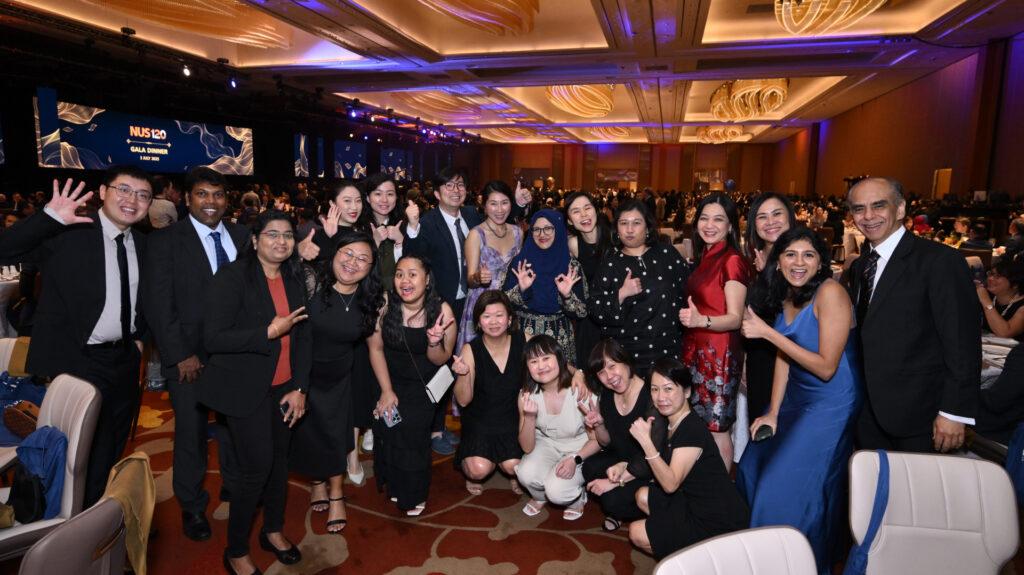
Addressing global health challenges
Next to address the guests was the Dean of NUS Medicine, Professor Chong Yap Seng (Medicine '88, MD '07), who highlighted how NUS' founding mission - to meet public health needs - is just as critical today. He described an increasingly complex health landscape marked by geopolitical instability, climate change, the promises and threats of artificial intelligence and misinformation spread on social media.
"A whole-of-society, whole-of-planet approach is required more urgently than ever," he said, adding that "the combined efforts of people with diverse skills, expertise and perspectives will be vital to creating a healthier and more sustainable future."
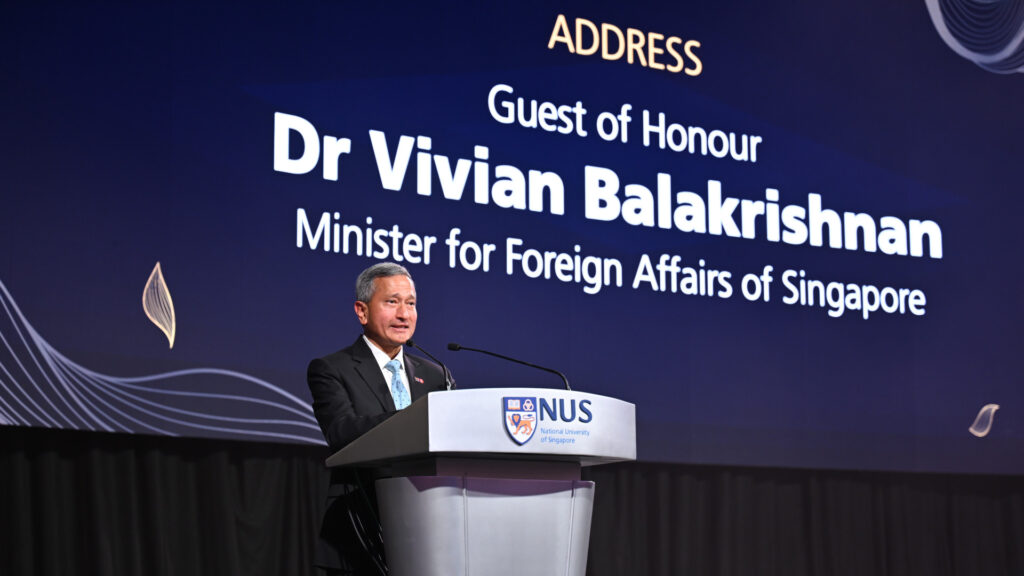
A citadel with open gates
Guest-of-Honour Dr Vivian Balakrishnan, a former president and chairman of the NUS Students' Union, spoke about how global volatility will inevitably affect academia and science, potentially leading to higher inflation, greater risks for smaller nations and a slowdown in innovation. He described NUS through three vivid metaphors: first, as a cradle nurturing Singapore's national identity and unity since 1905; second, as a citadel with open gates - strong yet welcoming to talent and ideas.
"NUS needs to have open gates, and we need to have our fair share of access to talent and ideas, while still remembering that this is the citadel based in Singapore, to protect Singapore," he explained.
Lastly, he urged NUS to be a launch pad for new technological breakthroughs, ensuring Singapore and Asia do not get left behind in a fast-changing world. His words echoed NUS' international outlook, which is supported by a global alumni network of nearly 390,000 across more than 100 countries.
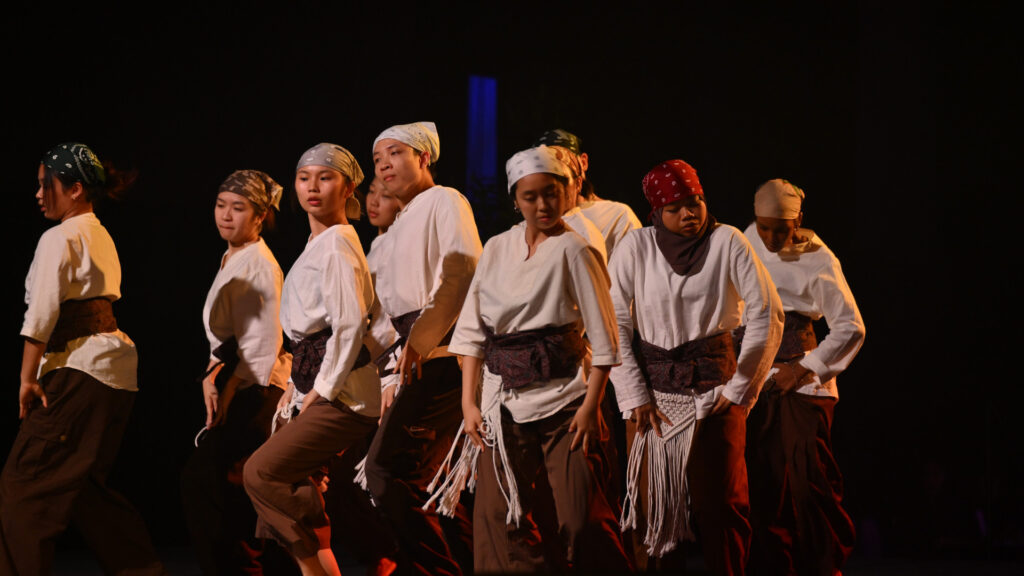
A night of joy, gratitude and pride
The gala dinner was a lively celebration of NUS spirit and camaraderie. Guests were welcomed by a candle-lined walkway and a playful photo wall with handheld props featuring messages like "I love NUS" and "Where I Found My Tribe." Student and alumni performances from NUS Dance Blast! and The Jazzlings provided entertainment during the dinner, while video segments highlighted NUS' incredible growth and brought celebratory greetings from alumni across the world. The occasion was also truly global, with alumni travelling to Singapore from cities such as Tokyo, Jakarta, Yangon, Vancouver, London, and Melbourne.
Interactive exhibits filled the foyer, from the AiSee assistive technology demonstration by NUS Computing to a showcase of Duke-NUS young alumni leading in innovation. NUS Libraries also delighted guests with a fun campus landmark quiz. In a meaningful gesture, Dr Balakrishnan, Prof Tan, Prof Chong and Chief Alumni Officer Ms Ovidia Lim-Rajaram (History and Political Science '89) unveiled and watered a Tembusu tree - a living symbol of resilience and growth.
"Tonight, we celebrate 120 years of NUS - but this evening is about so much more than a number. It's about the remarkable journey of a humble medical school that has grown into one of the world's leading universities," Ms Lim-Rajaram told the guests.
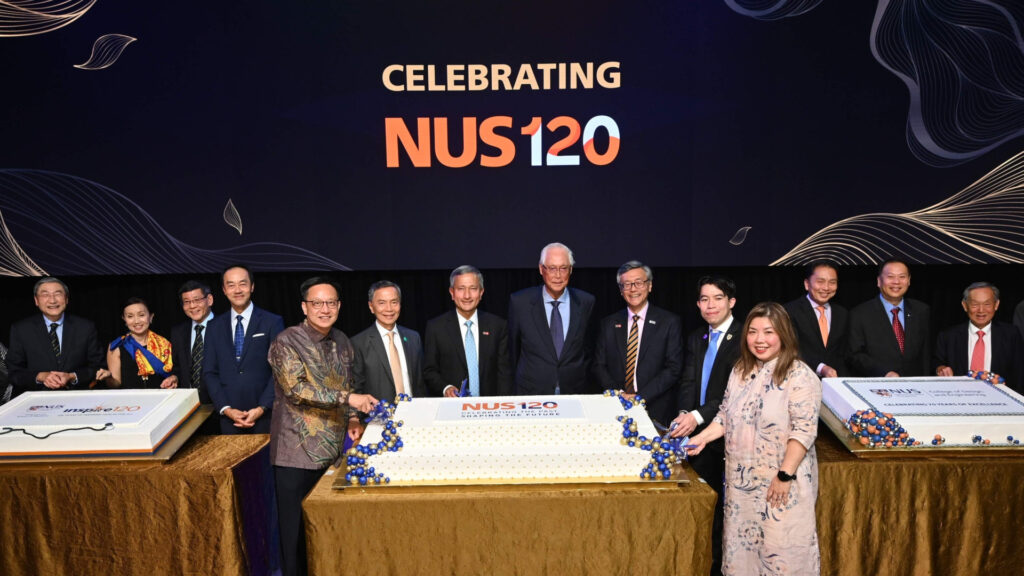
Celebrating milestones and a vision for tomorrow
The celebration also honoured key milestones across NUS' schools and faculties, including the 120th anniversary of the Yong Loo Lin School of Medicine, 70 years of NUS Engineering, 60 years of the NUS Business School, 50 years of NUS Computing, 45 years of Kent Ridge Hall, 20 years of Duke-NUS Medical School and NUS High School, and 15 years of Tembusu College.
As the evening concluded with a cake-cutting ceremony, guests looked forward to a year of commemorative events - from the NUS120 Homecoming at Bukit Timah Campus, the Distinguished Speaker Series, the #NUSLife Photo Exhibition, NUS120 SuperNova, to Rag and Flag - that will continue to connect past, present and future generations. As NUS looks ahead to its next 120 years, it stands ready to nurture bold thinkers, responsible leaders and a community grounded in service and shared purpose.
This story by the NUS Office of Alumni Relations first appeared on NUSNews on 10 July 2025.
Five Arts and Social Sciences alumni honoured for their service and contributions to society
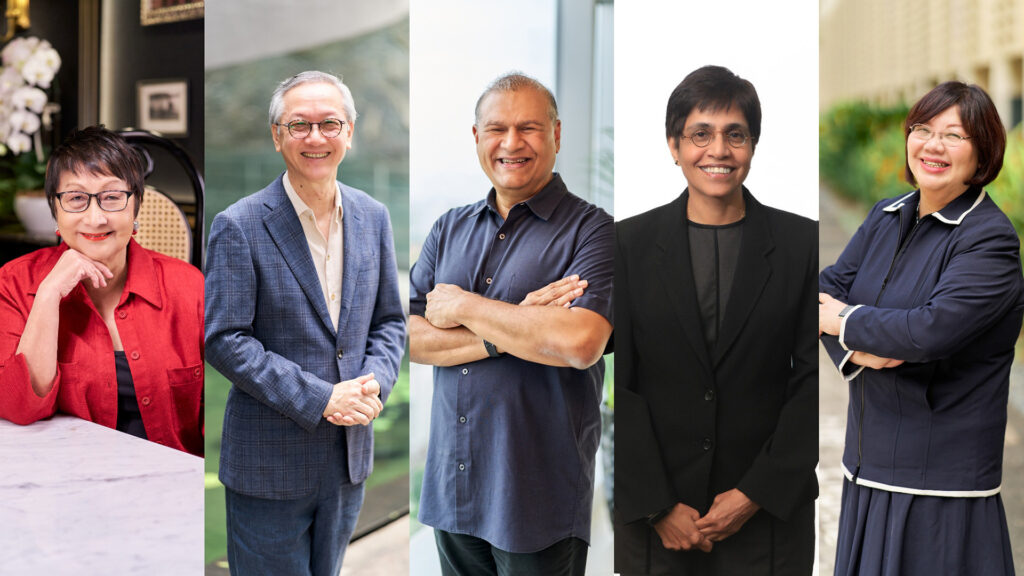
Five stellar alumni from the NUS Faculty of Arts and Social Sciences (FASS) were lauded with the FASS Distinguished Arts and Social Sciences Alumni Awards (DASSAA) on 10 July 2025 for their outstanding service and contributions to society.
Established in 2015, the DASSAA celebrates alumni who have made a meaningful impact on the University, the wider community, and Singapore, or who have advanced the arts and social sciences through their dedication and achievements locally or internationally.
This year's honourees are culinary curator and chef Ms Violet Oon; diplomat and former politician Mr Sam Tan Chin Siong; diplomat, Brigadier-General (Retd) and respected community leader Mr Ishak Ismail, pioneering social worker and advocate Dr Sudha Nair; as well as academic and innovator in education, Professor Low Ee Ling.
Changemakers shaping the aspirations of the next generation of FASS mindsFASS Dean Professor Lionel Wee underscored how the Faculty has long stood as a beacon of intellectual curiosity, cultural advancement, and social responsibility and that the vision has "always been to nurture not only thinkers and creators, but also compassionate leaders who use their knowledge for the greater good."
These recipients, he added, inspire current and future students not only to dream boldly but also to use their knowledge in the service of others. "In a time when the world needs thoughtful leadership more than ever, your examples inspire others. Your journeys remind us that success is not just measured by personal accolades, but by the positive impact we create in the lives of others," he said.
The event featured videos of the award recipients reflecting on their university days as they shared key moments in their professional journeys.
Mr Ishak fondly recalled his time at NUS, where he bonded with fellow Sheares Hall hostelites over sports and activities, and spent long hours studying with friends in the library after classes. It was also at NUS that he met his life partner.
When asked how her FASS education had shaped her career, Ms Oon shared that studying sociology and political science made a "world of difference" in how she approached food heritage and culture.
"So I don't interpret food as delicious or not - that is a given," she said. "What matters is what does it mean to a people? How do you judge the food? You have to learn about the culture and the proper techniques of cooking. That comes from studying, from checking. And if you take a subject like sociology, everything is based on facts and on research - I think that is so important."
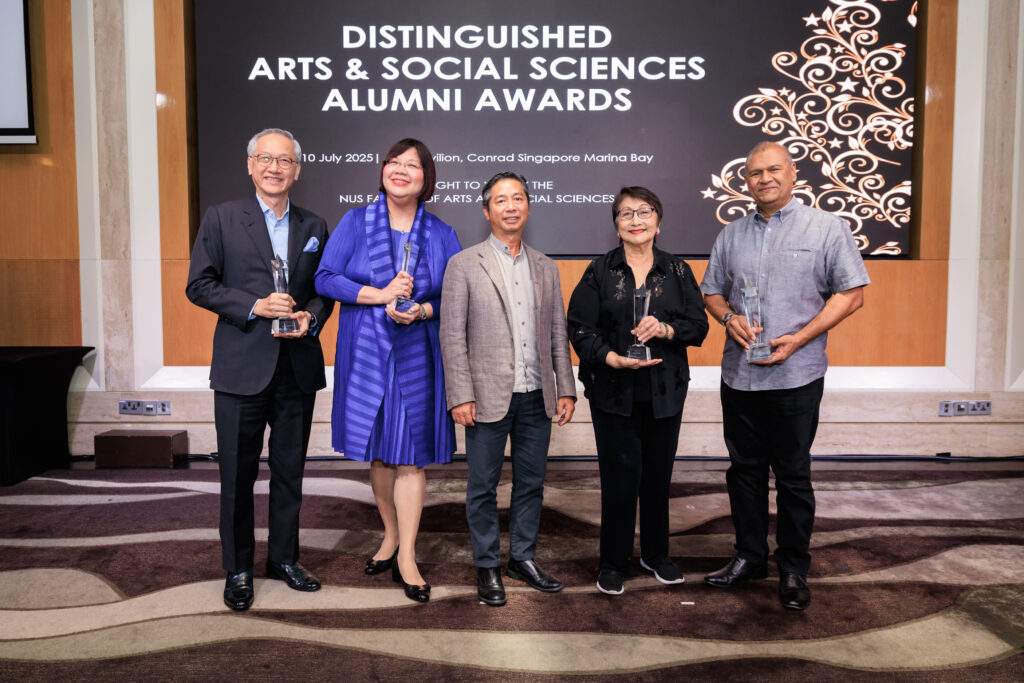
From food heritage to public leadership: FASS Alumni who left their mark on Singapore society
This year's award recipients have left their mark in areas ranging from Peranakan cuisine and diplomacy to family violence intervention and academic leadership.
Widely regarded as the grande dame of Singaporean cooking, Ms Oon began her career as an arts and music critic before pioneering a food column that launched her decades-long career as Singapore's leading food writer. She opened her first Peranakan restaurant in 1993, and today, the "Violet Oon Singapore" restaurant group is synonymous with heritage cuisine, with iconic outlets like Violet Oon Singapore at Jewel Changi Airport. As Singapore's food ambassador, she led national chef delegations at international culinary festivals and her accolades include being inducted into the Singapore Women's Hall of Fame (2016) and receiving the Singapore Tourism Board's Lifetime Achievement Award (2019).
Mr Tan is Singapore's Special Envoy for Arctic Affairs and Non-Resident High Commissioner to Canada. He has built a distinguished career in public service, diplomacy, and civic leadership. From 2009 to 2020, he served as Senior Parliamentary Secretary and Minister of State in several ministries, including the Ministry of Foreign Affairs and the Ministry of Culture, Community and Youth. He was also a Member of Parliament from 2006 to 2020. Mr Tan held key community and cultural leadership roles, including CEO of Business China (2007 to 2009), where he strengthened Singapore-China ties. For his longstanding service, he was awarded the Public Service Medal in 2002.
Mr Ishak served in the Singapore Armed Forces (SAF) for over 29 years, rising to the rank of Brigadier-General and playing a pivotal role in transforming SAF's training systems and leadership development. He later held senior roles in private firms that focused on defence solutions and regional growth. He is now Singapore's Non-Resident High Commissioner to Pakistan, and chairs both the Families for Life Council and the National Maritime Safety at Sea Council. He is also Principal Consultant at i-Grow Partners Pte Ltd, where he has been a certified coach appointed by the SAF to facilitate team leadership and development since 2016. He received the Public Administration Medal (Military) in 2008 and the Public Service Medal in 2023.
A social work veteran for over 30 years, Dr Nair began her career in 1987 at the Ang Mo Kio Family Service Centre (FSC), transforming it in 17 years into a model for other FSCs to follow. In 1999, she co-founded the Centre for Promoting Alternatives to Violence (PAVE), Singapore's first one-stop specialist centre for family violence, which now manages around 2,000 cases annually. Beyond frontline work, Dr Nair has nurtured future social workers through research and teaching at the NUS Department of Social Work, and has served on national bodies such as the Council of Presidential Advisers. Her many accolades include the Outstanding Social Worker Award (1998) and the Public Service Star (2022).
Prof Low is President's Chair Professor in Education (Applied Linguistics and Teacher Education) and Dean of Academic and Faculty Affairs at the National Institute of Education (NIE), Nanyang Technological University. A leading voice in teacher education, applied linguistics, and educational policy, she has shaped NIE's strategic directions through initiatives like "A Teacher Education Model for the 21st Century. For her dedication, she received the Public Administration Medal (Bronze) in 2012. Internationally, she was recognised for her exemplary scholarship by the Academy for Leadership in Teacher Education (ALiTE) at the University of Hong Kong in 2021, and has been selected as the President-Elect of the International Academy of Education (IAE) in 2024.
The recipients were presented with their awards at a simple ceremony at Conrad Singapore Marina Bay. Joining to celebrate the occasion with them were 56 family and friends of the honourees, as well as FASS staff and faculty.
Click here for more information on the award recipients.
This story first appeared on NUSNews on 11 July 2025.
NUS champions youth-led Regen Asia Summit to revitalise ecosystems and communities
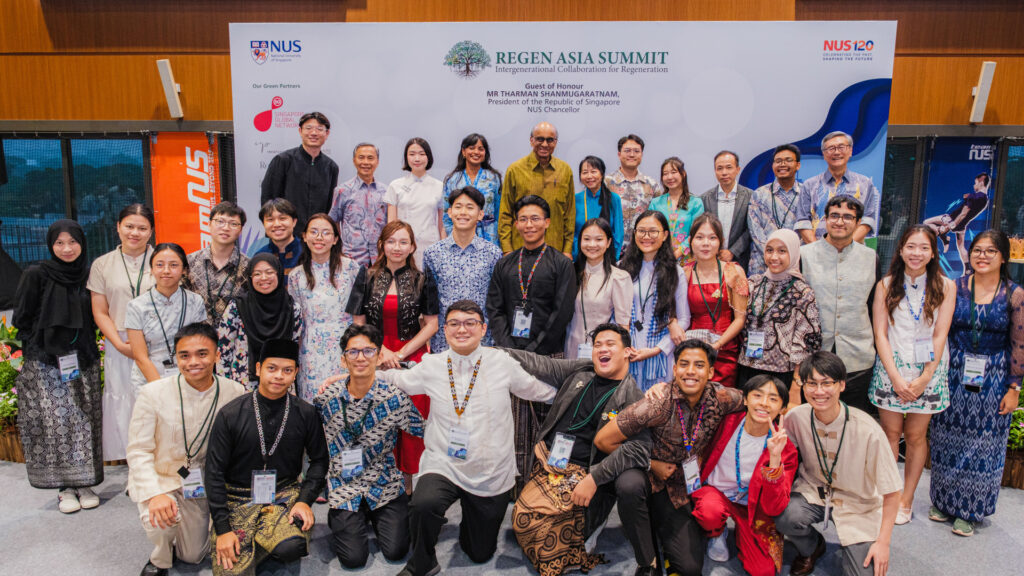
The two-day Regen Asia Summit (RAS) 2025, part of the National University of Singapore's (NUS) 120th anniversary celebrations, was launched on 4 July 2025 as a dynamic platform to address environmental and social concerns through regeneration, which focuses on healing current environmental degradation and strengthening social resilience by nurturing resilient ecosystems. A total of 600 bright young minds, including 31 student leaders from the ASEAN region, gathered at the Summit to discuss strategies for restoring, renewing and revitalising ecosystems.
The participants, together with around 100 impact leaders and innovators from around the world - including thought leaders from indigenous communities - discussed ways to use interdisciplinary frameworks to address socio-environmental problems and foster intergenerational solutions. By promoting meaningful dialogue and idea-sharing, RAS aims to empower youths to sharpen skills and build lasting intergenerational networks for regeneration.
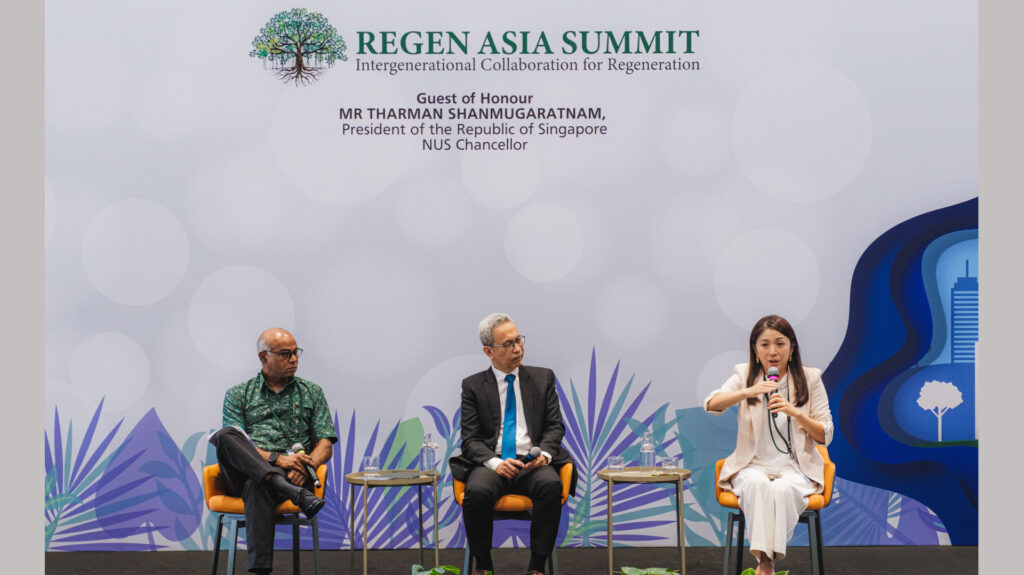
Held in connection with the NUS College (NUSC) course, Regeneration: Paradigm & Practice for Planetary Health, which equips students with the basic principles and concepts of regeneration, RAS embodies a bottom-up approach, with students leading the charge as conveners and creators of regional conversations. The Summit is fully organised by a team of 31 students from the ASEAN region, who make up the International Student Executive Committee. Led by NUS final-year students Misha Rajendran and Brendan Toh from NUS Political Science the Committee conceptualised and brought the Summit's vision to life, overseeing all aspects from programming and speaker outreach to logistics, sponsorship procurement, design, media, and engagement.
Ms Rajendran shared, "This Summit brought together young people from across Asia, united by a shared commitment to both people and the planet. Bringing this vision to life was only possible through the passion and creativity of the student leaders, supported every step of the way by dedicated staff. Leading this diverse team, spanning different geographies, disciplines, and lived experiences, was an incredible privilege. Together, we created a space where intergenerational voices and innovative ideas could flourish, inspiring holistic solutions to restore the health of our ecosystems and societies. This experience has shown me that when young people unite around a shared vision, there is truly no limit to what we can achieve."
Centred on the theme "Intergenerational Collaboration for Regeneration", RAS features fireside chats and close to 50 panel discussions, showcases and workshops exploring regeneration across six core domains - Culture & Society, Ecology, Economy, Governance & Civil Society, Built Environment, and Life & Wellbeing. RAS' innovative approach aims to move the conversation beyond sustaining the present to actively restoring, healing, and revitalising ecosystems and communities.
A highlight of RAS was a fireside chat featuring President of the Republic of Singapore Mr Tharman Shanmugaratnam, who inspired young leaders with valuable insights on the evening of July 4. President Tharman later joined participants at the Summit's Impact Leaders Dinner for further interaction.
President Tharman, who is also NUS Chancellor, shared, "The Regen Asia Summit is an important new platform for student leaders across the region. It enables them to envision paths to development that preserve societies' balance with nature, while advancing resilience and the well-being of vulnerable communities."
The Summit is the latest in a line-up of programmes and events to celebrate NUS' 120th anniversary this year, commemorating a legacy, forged over generations, of excellence, innovation and service. NUS President Tan Eng Chye said, "NUS is proud to host the inaugural Regen Asia Summit which brings together passionate students and thought leaders from around the world. This is a very impressive ground-up effort by a team of over 30 student leaders from the ASEAN region who collaborated across borders and joined hands to discuss environmental protection and social resilience. Their deep commitment to cross-cultural exchange will inspire more young people towards regional solidarity and youth-driven leadership in tackling pressing global challenges. We are confident the Summit will inspire positive change and grow into a powerful force for good - both in the region and beyond."
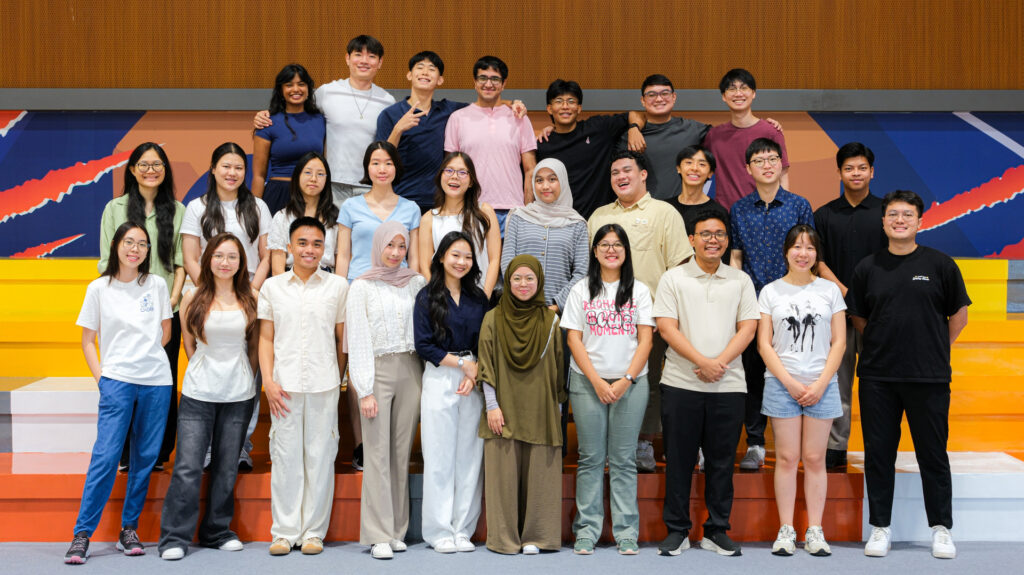
As a starting point to engage diverse stakeholders, encourage collaboration across Asia, advocate for action, and shape policy, RAS sets the stage for the upcoming Asian Undergraduate Symposium (AUS) 2025, where ideas are translated into impact projects for a chance to secure seed grants. Organised as the NUS-AUN (ASEAN University Network) Summer Camp, the annual AUS brings together 300 undergraduates from over 50 ASEAN partner universities each year and will take place between 7 and 19 July 2025 at NUS College.
This story first appeared on NUSNews on 4 July 2025.
Give more thought to lowering Singapore’s voting age to 18
IN BRIEF | 10 min read
- By Dr Elvin Ong, NUS Political Science.
Click through image below to read this piece.
This story first appeared in Lianhe Zaobao and on NUSNews on 6 June 2025.
Beyond the grades: What success means to a new generation
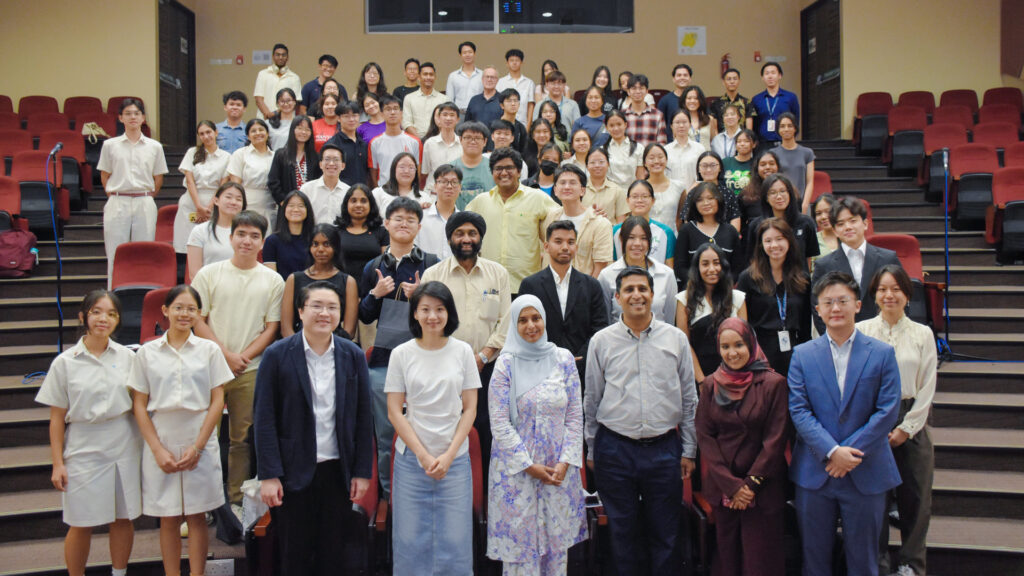
Traditionally, success in meritocratic Singapore has been closely tied to academic achievement, career advancement and wealth accumulation - think elite schools, top university degrees and high-paying jobs in coveted professional industries like finance and law. But is this definition too narrow? And should it be broadened to include other considerations to foster greater individual well-being and societal resilience?
These questions, which many young Singaporeans have been grappling with more openly in recent years, were central to discussions at the recent Insights Singapore Forum (ISF) themed "Redefining Success: Navigating One's Youth".
Organised by the NUS Political Science Society (PSSOC), this year's Forum gathered prominent speakers including Ms Sun Xueling, Senior Minister of State for National Development and Transport, Associate Professor Razwana Begum from the Singapore University of Social Sciences and Nominated Member of Parliament, and Dr Mathew Mathews, Principal Research Fellow and Head of the IPS Social Lab at the Institute of Policy Studies (IPS), for a dialogue with secondary- and tertiary-level students.
Speakers at the Forum weighed in on the themes of meritocracy, the reality of inherited privilege, and how peer pressure and social media can influence conventional ideas of success. While they emphasised the pivotal role of society and employers in recognising and valuing individuals who pursue less traditional career paths, they also stressed the need for individuals to align their purpose with market realities and evolving technologies, particularly with the advent of the Fourth Industrial Revolution that is fuelled by advances in artificial intelligence.
The discussion also touched on the topic of elitism and whether such attitudes can be fully overcome. A key point of consideration for participants was whether the issue could also stem from an unintended and unfortunate consequence of meritocracy. Speakers pointed out that the belief in success as solely being the result of hard work can lead individuals to assume that those who have not done as well simply did not try hard enough.
Participants also discussed how meritocracy, while intended to reward individual effort and ability, can unintentionally entrench intergenerational privilege. This is because those who have benefitted from the system are better positioned to support their children not only in education, but also in access to resources, networks, and opportunities. While government interventions can address these imbalances, there was a call among speakers and participants for a broader societal shift - one that moves the focus beyond individual success toward a more inclusive and multi-dimensional understanding of success within society.
Another point raised during the discussion was whether having a narrow definition of success, based solely on academic and career achievement, could lead to negative outcomes such as narcissism, mental health issues, and a distorted sense of what success truly means. Instead of narrowly pursuing rigid definitions, a better definition of success could involve recognising each individual's attributes and aspirations and celebrating achievements at different milestones, the speakers suggested.
Ultimately, more open conversations amongst policymakers, educators, parents and young people themselves would also be imperative to communicate and catalyse such a paradigm shift.
The dialogue was moderated by Mr Ng Chia Wee from the Department of Political Science at the NUS Faculty of Arts and Social Sciences (FASS). Noting that the idea of success is "never an easy topic to grapple with in our society", Mr Ng said he appreciated the speakers' candour at tackling the topic and expressed hope that participants will build on these insightful takeaways and "continue the conversation in their own ways".
One participant, Hwa Chong Institution's Ms Soh Jia Min, shared that it was interesting to hear different perspectives about how success in today's society no longer follows just a few conventional paths, and how there are structural efforts being made to support more diverse definitions of success.
Ms Irdina Duran, President of PSSOC and a Year 2 FASS student said: "We hope that attendees would have gained a clearer understanding of what success truly means: the steps we, as a society, need to take to get there, and the importance of embracing this mindset shift. We also hope that students managed to make meaningful connections with one another, and we truly appreciate their support and enthusiastic participation."
Formerly known as Ninety Percent, the ISF is an annual dialogue aimed at fostering vibrant academic discussions on Singapore's past, present and future to enhance political awareness among today's youth. Previous iterations of the Forum have witnessed the discussion of a host of engaging and topical issues, both local and international, such as the role of the People's Action Party in Singapore or political liberalisation in China. Past panellists have included prominent academics, members of parliament as well as representatives from civil society and non-governmental organisations.
This story by the NUS Political Science Society first appeared on NUSNews on 23 May 2025.
How NUS start-ups are driving sustainable change through green innovation
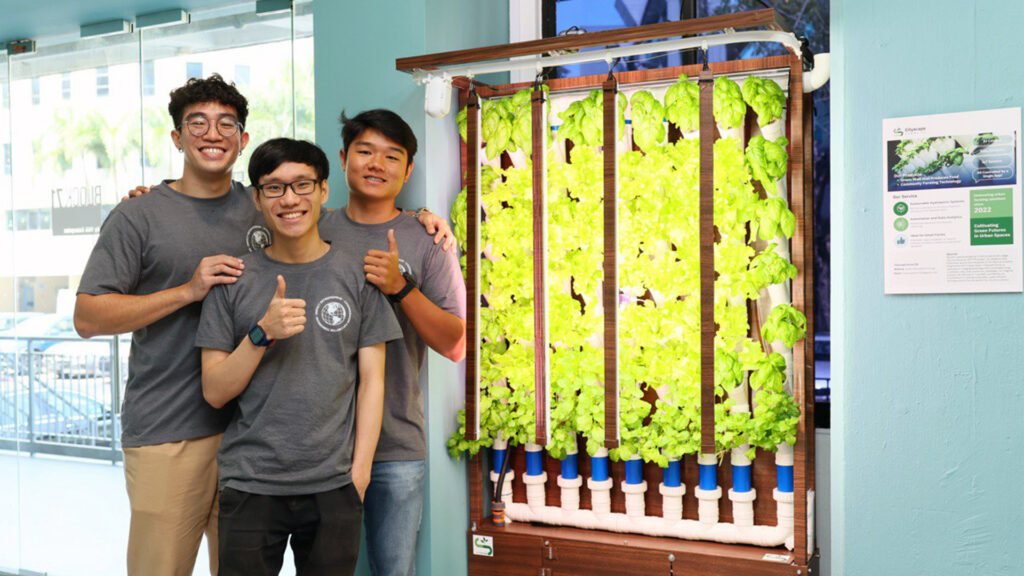
In the fight against climate change, a new generation of NUS student entrepreneurs is storming the sustainability frontier.
From reducing energy waste to reinventing urban agriculture, these eco-warriors have been tackling environmental challenges through viable business models. With support from programmes such as the NUS Overseas Colleges (NOC), BLOCK71 at THE HANGAR, BLOCK71 Social Impact Hub (SIH), and various initiatives by NUS Enterprise, they have shown how the University serves as a fertile ground for sustainability innovation, proving that environmental responsibility and entrepreneurial success can go hand in hand.
Here's how three promising NUS-supported start-ups are making a green mark.
EcoVolt
"Vampire energy" might sound like something out of a horror movie, but it's a real environmental menace that silently drains power and resources. This phenomenon - where devices continue to "suck" energy even when not in use - accounts for over 16 per cent of power consumption in homes and offices.
Enter EcoVolt, a start-up determined to drive a stake through the problem. Founded by four NUS students who met through the Sustainable Development Goals Open Hack @ NUS 2024, it has developed a two-pronged solution to monitor and eliminate such energy wastage.
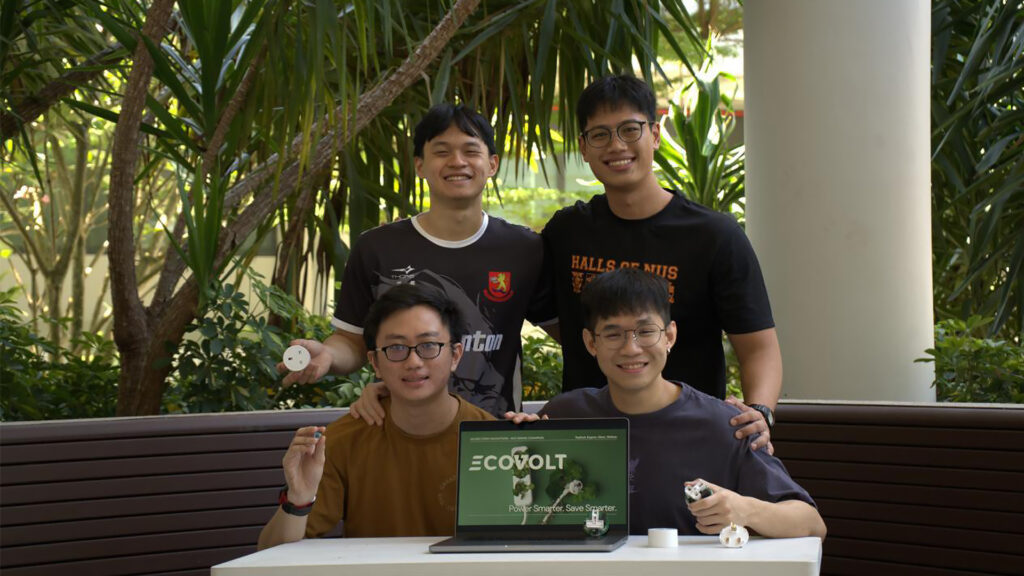
"We empower organisations to monitor, manage and eliminate plug load wastage," said the team, which comprises Year 5 Computer Science undergraduate Eugene Chia, Year 4 Business undergraduate Raphael Chew, Year 4 Information Systems undergraduate Glenn Quah and Year 4 Electrical Engineering undergraduate Ho Wei Hao. All four are participants of the NOC programme, through which they undertook internships at overseas tech start-ups.
By employing custom-designed adapters, socket plates, and extension cords, EcoVolt collects and transmits data to its proprietary software platform, enabling users to monitor and manage plug loads across multiple locations - from individual desks to entire building networks. This allows users to easily track and target idle plug loads, or electricity consumed by devices that remain plugged in but are not actively used.
Incubated under BLOCK71 SIH since April 2025, EcoVolt hopes its technology will be widely adopted. "This is really an 'every little bit counts' initiative," said the founders. "This is our only planet, so we need to find ways to stay on it."
Cityscape Farms
As urbanisation increases, so does the distance between people and their food sources. Cityscape Farms is addressing this disconnect with plug-and-play hydroponic systems designed specifically for Singapore's urban environment.
"Our mission is to bring sustainable farming to Singaporeans by integrating nature into homes, schools, and offices," said the team founded by College of Design and Engineering alumni Davian Chan Sze Peng and Manzel Joseph Seet, School of Computing and Faculty of Science alumnus Ho Hol Yin, and Year 3 undergraduate from the Faculty of Arts and Social Sciences Chew Chi Ying.
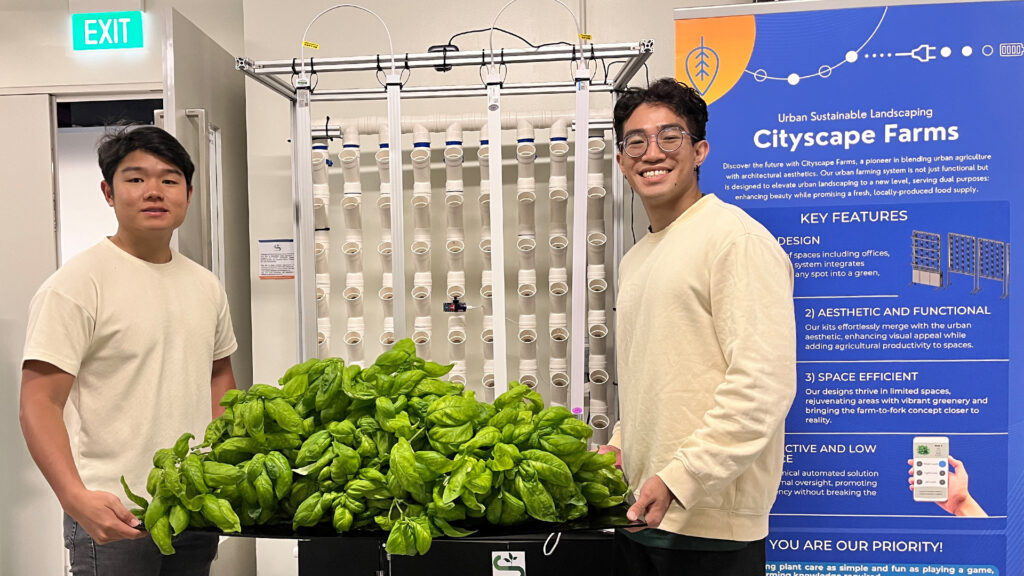
The start-up tackles two major sustainability challenges: urban food insecurity and inefficient use of space and resources in traditional farming methods. Their modular hydroponic systems, which are complemented by smart irrigation solutions, aim to reduce the reliance on traditional farming methods while promoting local food production with minimal waste.
After initially creating systems that were overly complex and costly, the team pivoted to a simplified design with a gamified app, making urban farming accessible to anyone, regardless of whether they have green fingers or experience in sustainable farming. The start-up aims to promote local food production, creating a win-win solution by reducing reliance on overseas imports and lowering the carbon footprint associated with them.
Currently incubated at the NUS Agritech Centre, the recipient of the NUS Enterprise Venture Initiation Programme - Impact Track is finalising its commercial products for corporate clients while expanding its outreach to schools, offices and even the broader Southeast Asian market.
PlasticTinkers
Over 900 million kg of plastic waste is generated annually in Singapore alone. Only a small fraction of this is recycled, while most end up in landfills or incinerators and contribute to pollution and carbon emissions.
PlasticTinkers tackles the growing plastic waste problem by giving discarded plastics a second life. The start-up collects and processes used plastic bottles, transforming them into filaments for 3D printing.
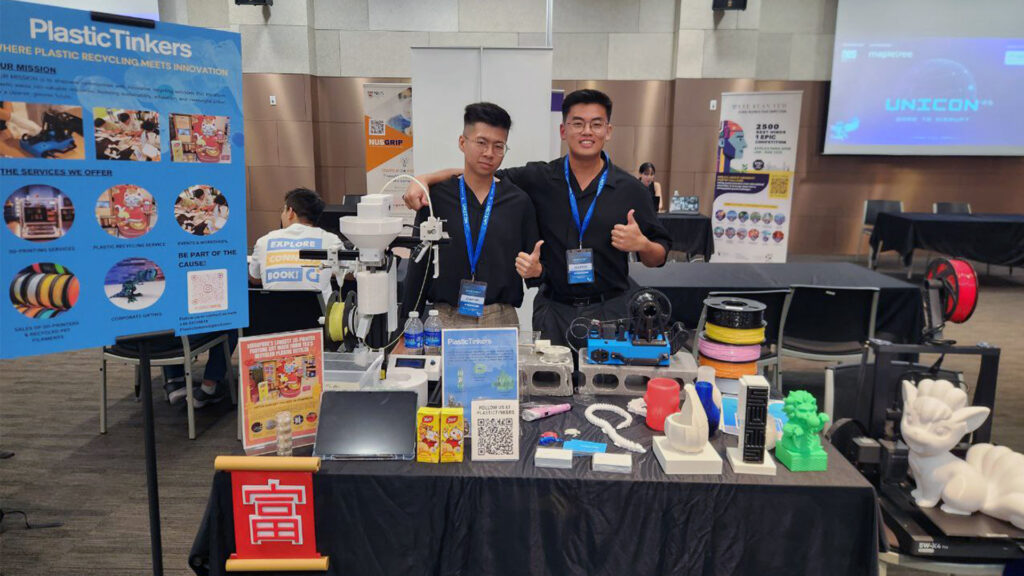
Co-founded by Edwin Lam, a Master of Architecture Year 5 student, the start-up consolidates the entire recycling process under one roof - from gathering waste plastic, converting it to usable filament, to producing functional products using 3D printing.
"We want to significantly increase the plastic recycling rate by empowering individuals and revolutionising the sustainability culture in Singapore," said Edwin, whose start-up was awarded a project grant from the NUS x Hult Prize 2025 and is currently incubated under BLOCK71 at THE HANGAR.

In addition to promoting environmental awareness through hands-on workshops and community collaborations, the start-up collaborated with Yeo's and other partners earlier this year to create Singapore's largest 3D-printed fortune cat, measuring 1.2 m by 0.8 m. The project earned a spot in the Singapore Book of Records as the largest 3D-printed model made from recycled plastic bottles.
Moving forward, the team aims to develop a compact recycling machine deployable in collaborative workspaces and educational institutions across Singapore to enable and empower communities to produce their own 3D printing filaments from plastic waste.
This story first appeared on NUSNews on 23 May 2025.
22 NUS programmes in global top 10 in QS World University Rankings by Subject 2025
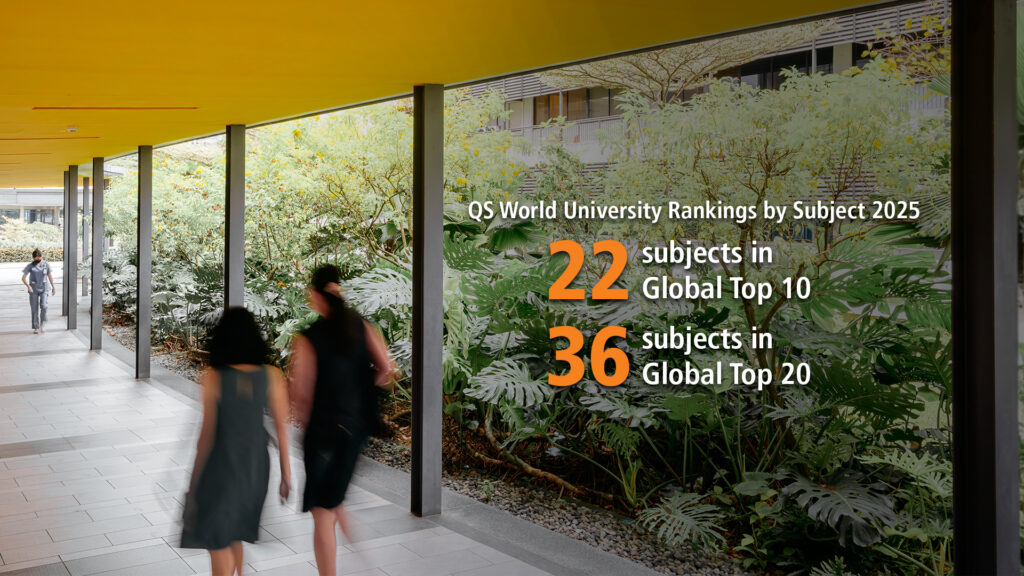
NUS has been placed among the global top 10 for 22 subjects and top 20 for 36 subjects, according to the latest Quacquarelli Symonds World University Rankings (QS WUR) by Subject 2025 released on 12 March 2025. This marks the highest-ever number of NUS subjects to be ranked among the global top 10.
Notably, NUS boasts six subjects ranking top five in the world. History of Art retained its global number two ranking, while Civil & Structural Engineering as well as Social Policy & Administration both climbed to third place worldwide, reaffirming NUS' excellence in these fields. Chemical Engineering, Computer Science & Information Systems and Electrical & Electronic Engineering secured fourth place globally.
Nursing made its debut in the global top 10, jumping 12 places to eighth. Pharmacy & Pharmacology also saw a significant improvement, advancing six places to share the eighth spot.
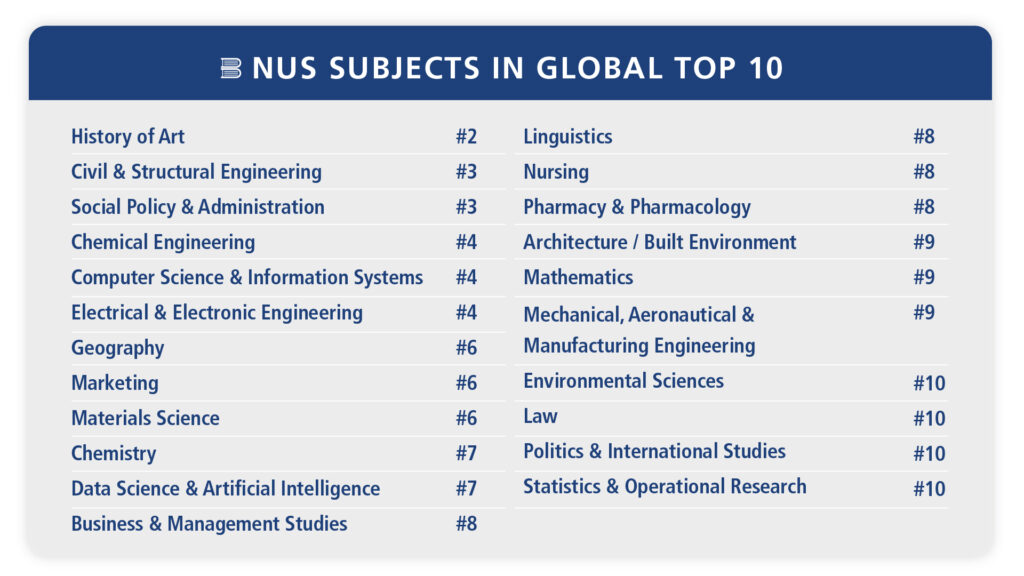
Steady improvements across the board
Among the five broad faculty areas, NUS has achieved a global top 10 position for Social Sciences and Management and a top 20 position for Engineering and Technology. Over the past three years, the University saw a consistent improvement in the rankings across all broad faculty areas, reflecting the University's strong interdisciplinary focus.
Professor Aaron Thean, Deputy President (Academic Affairs) and Provost, said: "We are immensely proud that NUS has achieved its best-ever performance this year in the QS World University Rankings by Subject, with 22 subjects in the global top 10, and 36 subjects in global top 20. The results reflect the University's consistent trajectory of excellence, with steady improvements in education and research across disciplines over the years.
In particular, our strong performance across STEM (Science, Technology, Engineering, and Mathematics) and Humanities subjects underscores the deep expertise and interdisciplinary approach that define NUS. This achievement is the result of the dedication and hard work of our faculty, staff, students, and alumni. As we continue to push boundaries in research, innovation, and education, we remain committed to nurturing future-ready graduates and contributing meaningfully to Singapore and the world."
NUS leads the pack locally, with three out of five entries from Singapore in world's top three
The QS WUR by Subject is an independent comparative analysis of the reputation and research output of more than 21,000 academic offerings across 55 subjects and five broad faculty areas. In the 2025 edition, 5,200 institutions from 148 locations were analysed with rankings published for 1,747 institutions.
Mr Ben Sowter, Senior Vice President at QS, said: "Singapore shines in the QS World University Rankings by Subject 2025, with four entries breaking into the global top three for the first time-highlighting the nation's rise as a leading hub for world-class education and research."
According to QS, nearly one-third (30 per cent) of Singapore's 114 ranked entries secured top 10 positions in their respective subjects-an unparalleled achievement that sets the nation apart from all other countries and territories.
"With just six universities contributing 114 ranked entries-including 12 in the broad faculty areas-Singapore consistently outperforms its scale. Despite its relatively small system, it competes at the highest level globally, delivering excellence in teaching, research, and graduate outcomes," Mr Sowter added.
Overall, NUS is represented in 41 subjects and five broad faculty areas, highlighting its extensive academic reach and strength in multidisciplinary education and research.
This story first appeared on NUSNews on 12 March 2025.
Cultivate the spirit of volunteerism in youth to contribute to society
IN BRIEF | 10 min read
- By Ms Humaira Safiya Mohd Helmi, student from NUS Political Science and Economics, and Mr Amirul Daniez, student in NTU.
Click through image below to read this piece.
This story first appeared in Berita Harian and NUSNews on 20 November 2024.
Touching the Lives of Those Young and Old, Through Community Service
IN BRIEF | 10 min read
- Embodying the University's spirit of service to country and society, members of the NUS Community Service Club (NUS CSC) have been key drivers of volunteerism among our student population over the past 22 years.
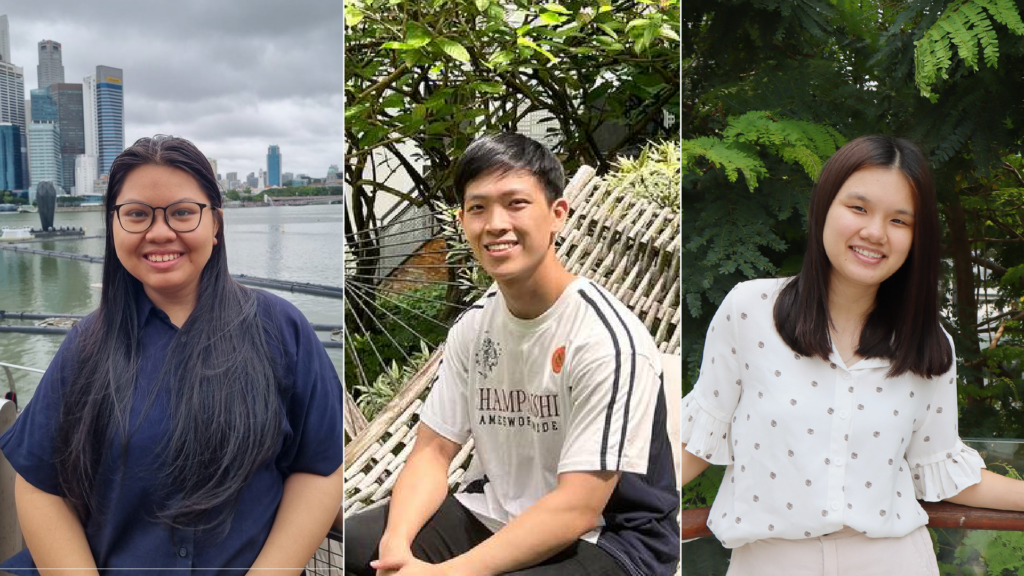
Whether it is providing academic support to vulnerable youth or befriending seniors living alone, heartwarming stories of NUS students working to uplift local and regional communities abound each year. Embodying the University's spirit of service to country and society, members of the NUS Community Service Club (NUS CSC) have been key drivers of volunteerism among our student population over the past 22 years.
Through NUS CSC programmes, more than 1,300 NUS students clocked close to 15,500 volunteer hours in the last academic year. Three of the club's members share what inspired their passion for service, the various ways they are making a difference in the community and how their efforts have enriched the lives of many - including their own.
Dewi Murni Bte Musa: Leading change through community service
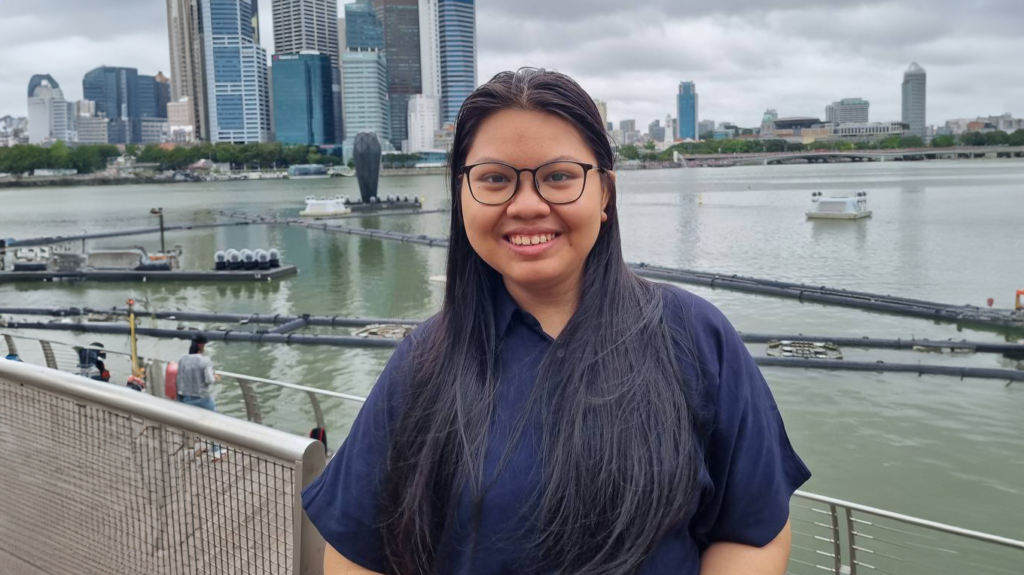
Dewi Murni Bte Musa, a Year 4 student at the NUS Faculty of Science, began volunteering at the age of 16. But it was a seemingly ordinary day chaperoning primary school students for a national education show in 2018, held in conjunction with Singapore's National Day Parade, that ignited her passion for community service.
At the end of the show, a primary schooler, beaming with excitement, thanked her for the day he had and told her that he aspired to be like her in the future. "It was a touching moment that made me realise the power of making someone's day," said Dewi, recalling that pivotal moment.
Since then, Dewi has dedicated herself to various community projects, both within and beyond Singapore. Now, in her fourth year at NUS CSC, Dewi has been elected the Club's president, and set her sights on making an even bigger impact.
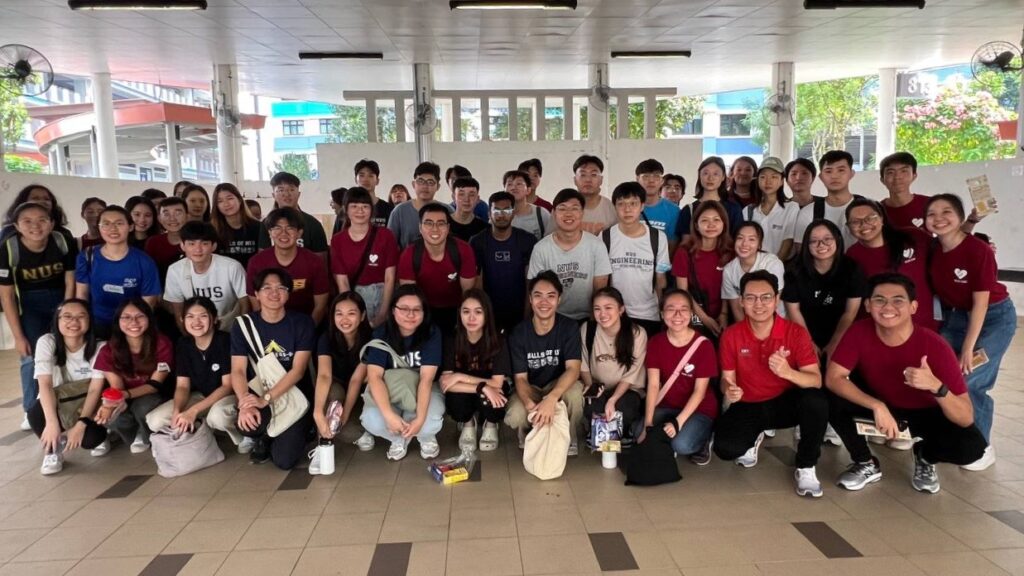
Reflecting on her time at NUS CSC, Dewi shared that her involvement in various programmes and projects played a significant role in her personal development. For example, as former Assistant Project Director, Dewi led a team of nearly 160 volunteers in Project C.A.N. XXI to prepare specially curated care packs containing food and essential items for low-income households in Choa Chu Kang and Tampines. The massive undertaking sharpened her organisational skills and taught her the importance of adaptability in team dynamics.
Yet, it was her moments of connection with community members at one NUS CSC Day that stood out most vividly to her. The annual event brings together NUS CSC's four main sectors - children and youth, persons with intellectual disabilities, the elderly and those with life-limiting illnesses and healthcare. As a game master for the day, Dewi met a secondary school student from one of their partner organisations who told her that it felt like a dream to come to NUS. Her words struck a chord with Dewi who was reminded of her own childhood, when a university education seemed like an unattainable dream. "I'm the first in my extended family to attend university, so growing up, I didn't really have anyone to talk to about getting a higher education," she said. "But I was so happy that through CSC Day, we were able to give this young girl that opportunity," she added.
Empowerment for youth and children is a cause that resonates with Dewi deeply, and she aspires to one day, build a passion project working with schools in rural areas, particularly in Indonesia, where she is fluent in the language and familiar with the culture.
As the incoming president of NUS CSC, Dewi envisions a club that not only mobilises volunteers but also fosters leadership and personal growth for its members. "We want to ensure that our volunteers are adequately prepared before they engage with community members and cultivate an environment where they can thrive as volunteer leaders," she said. "I also want to see our club evolve to meet the changing needs of both our volunteers and the community."
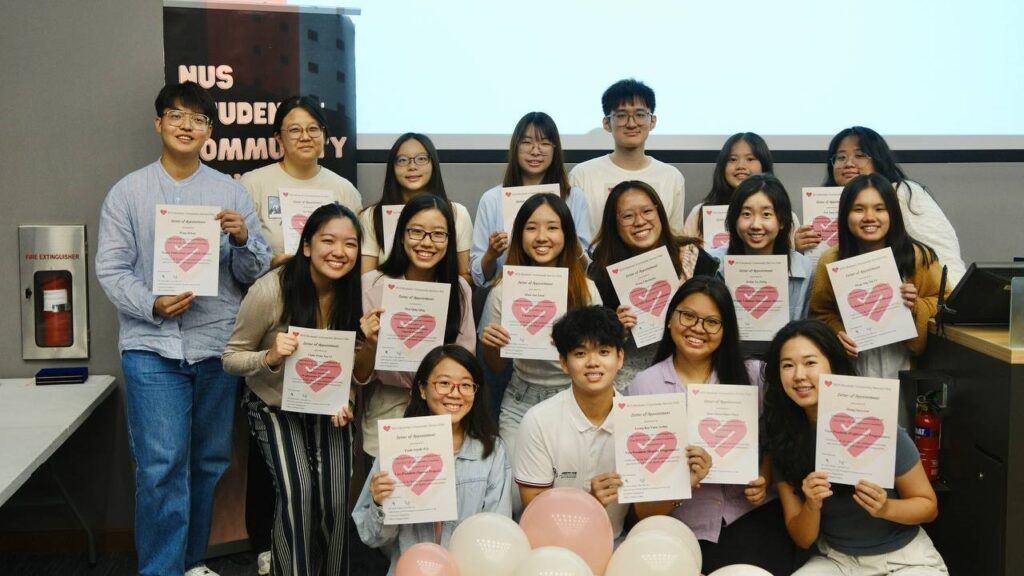
For those considering joining NUS CSC, Dewi encourages them to embrace the experience with an open mind and a willingness to learn. "It's all about stepping out of your comfort zone and discovering the impact you can make," she says, inviting new volunteers to share in the transformative power of community service.
Lim Si En: Painting lives, one home at a time
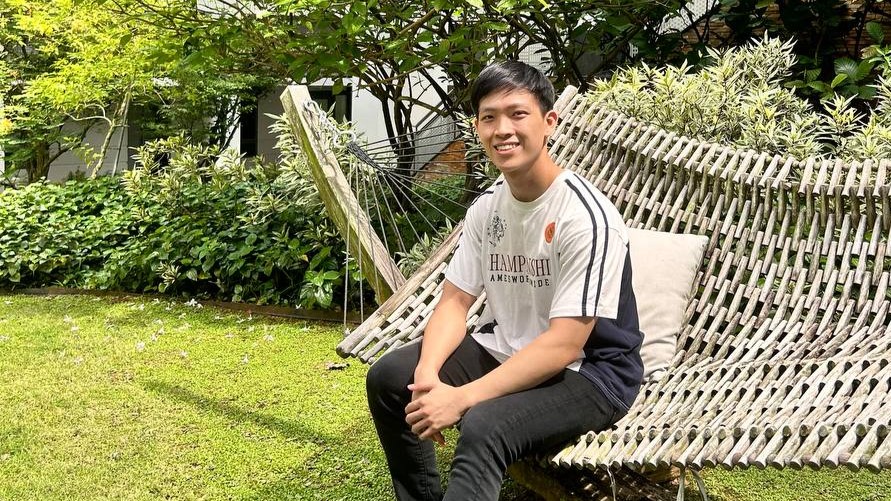
Like Dewi, Lim Si En, a Year 3 student at the NUS Faculty of Arts and Social Sciences (FASS), began his volunteering journey in junior college, tutoring primary school students and volunteering his time at national events like the National Day Parade. His passion for service led him to join NUS CSC in his first year at NUS. "Volunteering called out to me more than other CCAs," he recalled, highlighting the breadth and accessibility of projects that resonate with his desire to help others.
In his second year, Si En took on the role of Project Director for NUS CSC's annual Paint-A-Home initiative, pouring his heart into every detail of the six-month-long project, from recruiting committee members to collaborating with partner organisations. "Seeing our labour pay off was incredibly fulfilling," he says, reflecting on the tangible improvements made in the homes they painted.

For Si En, the initiative was more than just applying a fresh coat of paint; it was about building relationships with community members to understand their needs and preferences, ensuring that his team's work truly reflected the desires of those they served.
"The initial visit helped break the ice and build rapport," he explained. This rapport was crucial, as many of the community members they assisted were elderly or from low-income families, facing various challenges. As Si En and most of his team members had no prior experience with painting, they contacted an organisation for painting lessons. The team also held a practice run, painting the multipurpose hall at the PERTAPIS Centre for Women and Girls, which kindly offered them use of the space for a trial session.
"Once we finished painting, the visible improvement felt great. We knew we made a difference," he shared, acknowledging that their work wasn't perfect but was heartfelt and impactful.
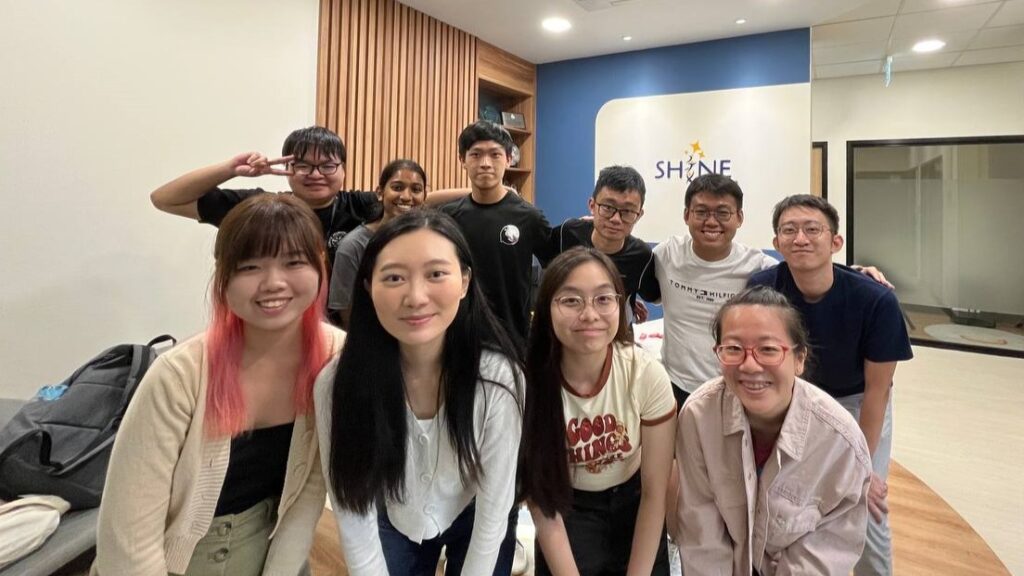
Si En's commitment to the community extends beyond NUS CSC. As a Volunteer Welfare Officer with the Ministry of Social and Family Development since 2023, he conducts check-ins with families at risk of child neglect. "It's an eye-opening experience," he admits. "Even as I help others, I learn so much about the challenges they face."
Hope Sng Xin Le: A heart for service

Taking over the reins from Si En at Clementi Youth Sparks this semester is Hope Sng Xin Le, a Year 2 NUS FASS student who embodies the spirit of service and compassion. Specialising in Social Work and Political Science, Hope's journey into the realm of social service is deeply rooted in her own experiences and the values instilled in her by her family.
Growing up, Hope faced some challenges in her childhood. "My grandparents helped me through that tough time," she recalled, citing this early experience as the spark that ignited her passion for social work.
Another source of inspiration was a documentary that highlighted how exposure to domestic violence can ripple through generations. "It's important to break the cycle of violence," she remarked.
Hope's academic pursuits complement her passion. Studying Political Science gives her insight into governmental structures and resource allocation, while her Social Work studies provide a ground-level perspective on societal issues. "Social work is where my calling is," she says, expressing a desire to join Child or Adult Protective Services upon graduation to safeguard vulnerable individuals and families.
Hope's commitment to volunteering blossomed at NUS, where she joined NUS CSC in her first year. At Ethelontêr, the NUS CSC's orientation camp for incoming NUS students, she was introduced to various volunteer opportunities, including Havenue, a programme supporting individuals with life-limiting illnesses. "Havenue is my happy place," she states with warmth, volunteering there two to three times a month.
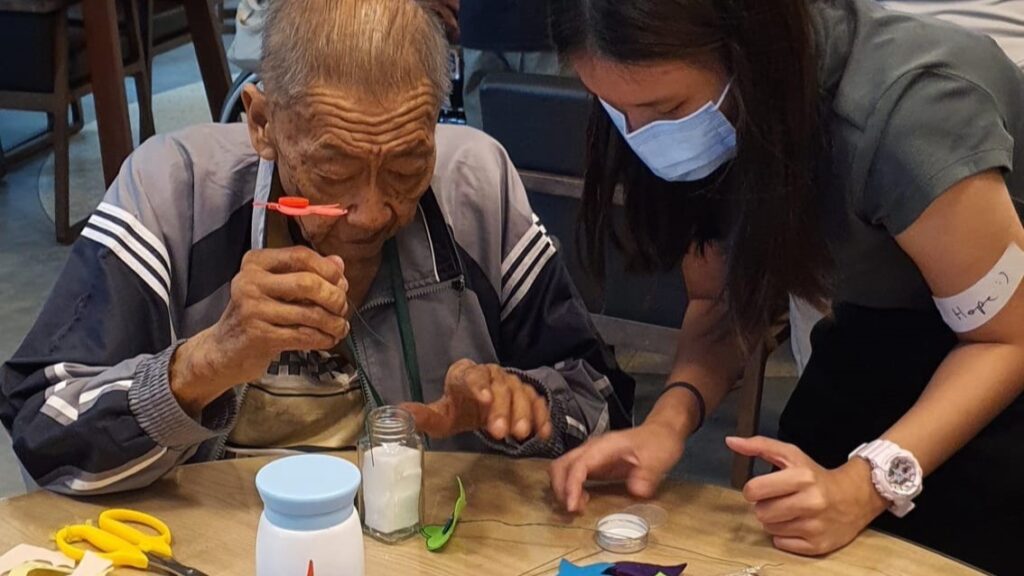
Her work at Havenue holds a profound significance for her. Engaging with the elderly patients has reshaped her perspective on life and death. One particularly poignant memory is of Uncle Chew, a vibrant 90-year-old she befriended during his last days. His passing, along with that of another patient, reminded her of life's fragility and the importance of cherishing every moment. "These experiences have shown me how precious life is," she reflects, prompting her to be more expressive of her love and appreciation for those around her.
In Academic Year 2023/2024, Hope served the highest number of volunteer hours among all NUS CSC volunteers, staggering her time between seven projects throughout the year. Pulling off the 2024 edition of Ethelontêr as Assistant Project Director is something she is particularly proud of and she expressed her deep appreciation for her fellow organising committee members for being a strong support system during the five-month project where things were 'fast and furious'.
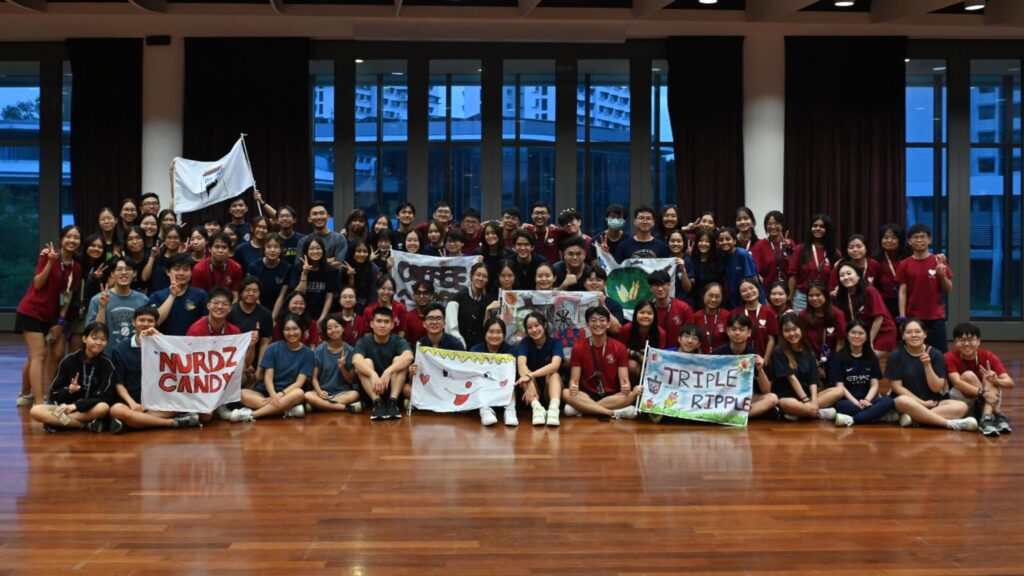
"Prior to university, I thought of volunteering as something that was part of the school requirements. But over the past year, I realised my deeper calling to serve the community. It has strengthened my desire to pursue social work as a major and has been a source of joy and meaning in my life," said Hope.
This story first appeared on NUSnews on 12 November 2024.
Moving beyond career success to serve with purpose, integrity and compassion
IN BRIEF | 10 min read
- Titled "Lessons from a Leadership Journey into the Private, Public and People Sector", the talk by Ms Denise Phua, Member of Parliament for Jalan Besar GRC and Mayor for Central Singapore District, at the Shaw Foundation Alumni House kicked off the new FASS Distinguished Speaker Series that was launched by the NUS Faculty of Arts and Social Sciences (FASS) in celebration of the Faculty's 95th anniversary.
"As you step into the world, may you step out to lead with purpose, with integrity, with compassion, not just for your career but for the greater good."
This was the clarion call sounded by Ms Denise Phua, Member of Parliament for Jalan Besar GRC and Mayor for Central Singapore District, to a 100-strong audience at a recent talk where she shared insights on career transitions and effective leadership.
Titled "Lessons from a Leadership Journey into the Private, Public and People Sector", the session at the Shaw Foundation Alumni House kicked off the new FASS Distinguished Speaker Series that was launched by the NUS Faculty of Arts and Social Sciences (FASS) in celebration of the Faculty's 95th anniversary. The series aims to inspire FASS students to excellence by showcasing alumni and their achievements.
The inaugural session, moderated by Professor Lionel Wee, Dean of FASS, was also attended by FASS staff and faculty.

Developing a leadership toolkit and other leadership goals
Ms Phua, who worked in the corporate, people (or social) and public sectors noted some differences in work culture and performance measurements in each of these sectors.
Performance in the private sector is typically measured in financial terms and is quantified with metrics such as market share, revenue growth, and shareholder values. The social sector values qualitative outcomes, with the focus shifting to doing good, creating societal impact, and accountability to beneficiaries, while the public sector operates within the frame of public service, governance, and accountability to the broader society.
Whichever sector one is in, it is essential to build a leadership toolkit comprising the four skills - personal mastery, interpersonal leadership, supervisory leadership and organisational leadership - in order to chart a meaningful and successful career path.
Ms Phua also emphasised the importance of having diverse experiences to remain relevant, and venturing outside one's comfort zone in a dynamic environment to keep this toolkit updated. Citing Pope Francis, who told Singaporean youths in a recent dialogue that a young person who stays in his own comfort becomes "fat", she urged young people to continually add skills to their toolkit and to go out there to take risks.
In her experience, having a purpose is also key as it helps to keep one's eye on the bigger picture and the important goals to work towards. She explained, "Having a clear purpose guides our decisions and keeps us focused on what truly matters. For me personally, my faith helps to anchor me."

Be fearless in the unknown
Another topic Ms Phua delved into was fear, something she learnt to overcome whenever she was thrust into unfamiliar situations and environments - whether it was having to work overseas with people of different backgrounds and cultures in China and the US, or having to establish new work processes or systems from scratch.
Sharing about her stint as a waitress in Palo Alto, driving alone in her twenties in the wilderness between small American towns for work, and working with people of vastly different cultures, accents and habits from her own, Ms Phua revealed that these intimidating early experiences eventually helped her overcome her fear of trying new things.
Raising a son with autism further bolstered her courage to pioneer new initiatives and projects, particularly in the area of advocacy and support for those with special needs. Stemming from a desire to create a more inclusive society where everyone can thrive, Ms Phua has made trailblazing contributions to the special needs advocacy space, which include the co-founding of Pathlight School - Singapore's first school that offers mainstream education for autistic children, The Purple Parade - a national platform that celebrates the abilities of persons with special needs, and The Purple Symphony, Singapore's largest inclusive orchestra set up by her and her team at the Central Singapore District Community Development Council (CDC).
She shared, "[Having the technical skills and soft skills] were really important for me in the private, people and public sector, but what was more significant was scaling the challenges I faced and overcoming the fears I had."
As a leader, Ms Phua stressed that it is also essential to find a "tribe" and surround oneself with like-minded people who share the same values, passions or vision, and who are able to challenge one another, as the success of any project is never dependent on a single individual. This is how she managed to ideate and execute the many initiatives across the three sectors she has been involved in.

Beyond building careers to serving society
Ms Phua's candid and personal sharing was followed by questions from students about how to choose career pathways, to make meaningful change in the community and tackle evolving social challenges in society.
Responding to a question on how she found her calling in the special needs advocacy space, Ms Phua shared that she did not identify it through any conventional career or personality quizzes. For her, she felt called to the special needs space in a rather dramatic fashion, after "God gave [her] a child who didn't speak nor socialise at three, like other typical children."
Referencing some of the other community initiatives and assistance schemes launched during her time as Mayor of the Central Singapore District, such as the 'Weekly Nurture' problem-solving and communications classes and the 'Ready for School' financial assistance scheme for children from low-income families, another student asked what Ms Phua considered key ingredients for success in these community projects.
Her response was simple - find the gaps, think of ways to make a difference, and then start tapping on one's network of resources to implement solutions.
"When looking at physical wellness for seniors for example, I will ask what physical wellness means to them. Together with my team, we then brainstorm, come up with programmes, such as our CDC's 'Silver Homes' and then look for resources to fund them," she added.
When asked more broadly how Singapore can address societal issues such as an ageing population and growing income disparity, Ms Phua observed that Singapore has become more complex in many ways since 2006 when she first entered politics, making tackling such issues more challenging. However, she encouraged students to look beyond their "pet passions" and serve in areas in society that have the most need, and to stay mission-focused to continue effecting real change.
She cited the 'power of one'. "If each of us is determined to bless other people with what we have…whether it's our talent, our gift, our networks, then organisations, nations and societies will all be for the better," said Ms Phua.
This story first appeared on NUSnews on 28 October 2024.
Mala Chongqing and Modernisation
IN BRIEF | 10 min read
- By Tan Zhan Tiam, a Year 3 student from NUS Chinese Studies and NUS Political Science.
Click through image below to read this piece.
This story first appeared in Lianhe Zaobao and NUSNews on 5 October 2024.
NUS University Awards 2024: Eight Exemplary Individuals Honoured For Their Relentless Drive Toward Excellence
IN BRIEF | 10 min read
- The prestigious Outstanding Service Award was conferred on Chairman of the Middle East Institute at NUS and former Singapore diplomat, Mr Bilahari Kausikan (FASS alumnus, NUS Political Science '76), and Professor Brenda Yeoh Saw Ai of NUS Geography was honoured with a University Research Recognition Award for groundbreaking research that has placed NUS at the forefront of her field.

Eight outstanding educators, researchers and professionals were lauded for their contributions to the University, Singapore and the global community at the NUS University Awards 2024. The annual Awards pay tribute to members of the NUS community who, through their consistently high performance and resolute commitment, raised the bar in the areas of education, research and service.
Speaking at the awards ceremony held at Conrad Singapore Orchard on 30 August, NUS President Professor Tan Eng Chye highlighted that excellence is an enduring core value at NUS. He hopes that this eye to excellence will continue to motivate members of the NUS community to think of how they as individuals can be quicker, better and more productive in their pursuits.
Noting how Artificial Intelligence (AI) is transforming every industry with great velocity, and our graduates will be moving on to jobs and sectors being changed and challenged with AI, Prof Tan said that we too must position ourselves strongly for AI. He added that this has prompted NUS to do two things in relation to its education mission, "First, we need to take a hard look at how AI will impact jobs and the industry sectors that our graduates will move on to, and the skills and knowledge they need to thrive. Are our courses building skills that are relevant? Do our students need exposure and engagement with AI, to work competently in a future which is AI-driven? Second, AI is disrupting various sectors of the knowledge economy. AI can process information and produce content almost instantly. How can we leverage on AI to 'superpower' teaching and learning?"
Top accolade - Outstanding Service Award
This year, the prestigious Outstanding Service Award was conferred on Mr Bilahari Kausikan, Chairman of the Middle East Institute at NUS and former Singapore diplomat, and Dr Teh Kok Peng, Chairman of the East Asian Institute at NUS and a veteran in Singapore's finance and economic development, in recognition of their inspiring leadership and dedicated service. Both are accomplished leaders who have made sustained contributions in selflessly serving the University and society.
Mr Bilahari Kausikan
As Chairman of the Middle East Institute (MEI) at NUS - an appointment he has held since 2017, Mr Kausikan has leveraged on his decades of diplomatic service experience, and wide global and national recognition, to drive the institute's impactful research, and enhanced its stature and reputation.
He has guided MEI's focus and publications towards what was relevant to its primary stakeholders in the Singapore government and relatable to the general public, while maintaining the highest standards of academic rigour. MEI is now well-known in East Asia, the Middle East, the US and Europe. Mr Kausikan will be retiring as MEI Chairman in end-August 2024, but he will remain associated with the institute as an Honorary Fellow.
During his 37-year career in the Ministry of Foreign Affairs, Mr Kausikan has contributed to steering Singapore's foreign relations in an increasingly complex and uncertain international environment. The veteran diplomat served in diverse appointments at home and abroad, including Ambassador to The Russian Federation and Permanent Representative to the United Nations in New York. He was appointed Deputy Secretary for Southeast Asia in 1998 and Second Permanent Secretary (Foreign Affairs) in 2001. He served as Permanent Secretary (Foreign Affairs) from 2010, before retiring in 2013, whereupon he was appointed Ambassador-at-Large, a position he held until 2018.
Known for his pragmatic and candid views, Mr Kausikan has written and spoken extensively on the complexities of diplomacy, nation-states and international politics, particularly the role of ASEAN vis-à-vis the global powers.
Delivering the citation for Mr Kausikan's conferment, Ms Michelle Teo, Executive Director, MEI, noted that the institute has benefitted from his wide global and national recognition. "Under Bilahari's watch, the stature and reputation of our Institute has been enhanced. He has been a true leader for the MEI team, always available to everyone, honest and insightful in his many discussions with the research team, and clear and precise in his guidance to the Board and the administrative team," said Ms Teo.
Sharing his thoughts on receiving the Outstanding Service Award, Mr Kausikan said, "I have only done as most of us have done, and that's what we could ― for our families, for the organisations we belonged to, for our country. Some of us are fortunate in that what we did attracted greater attention, but no contribution could have been possible without the contributions of all, whether recognised or not."
Watch this inspiring video on Mr Kausikan's dedicated contributions towards the University and society.

Dr Teh Kok Peng
Dr Teh Kok Peng has had a distinguished career in finance and economic development. He served as President of GIC Special Investments from April 1999 to June 2011, where he oversaw global investments in private equity, infrastructure and international venture funds. His early career at the World Bank and his roles as Deputy Managing Director of both the Monetary Authority of Singapore and GIC underscored his significant contributions to Singapore's financial and economic development.
In recognition of his service, Dr Teh has received numerous accolades, including the AVCJ (Asian Venture Capital Journal) Special Achievement Award in 2022 and the Public Administration Award (Gold) during Singapore's National Day Awards in 1992. His academic journey, with degrees from La Trobe University and the University of Oxford, laid the foundation for his lifelong pursuit of excellence.
Under his sterling stewardship as Chairman of EAI, the institute has undergone a strategic transformation that has significantly enhanced its capacity to conduct cutting-edge academic and policy-oriented research on East Asian development. Among his contributions are the initiation of a strategic review of the EAI Board. Following this, the Board was reconstituted to include members from the corporate sector, harnessing a more diverse range of relevant expertise in service of the institute's mission of promoting academic and policy-oriented research on East Asian development.
Dr Teh's contributions also encompassed the higher education sector, where he served on the boards of NUS, Lee Kuan Yew School of Public Policy, and Institute of Policy Studies. Delivering the citation for Dr Teh's conferment, Professor Alfred Schipke, Director, EAI, said "The nation and many esteemed institutions have greatly benefitted from his visionary leadership and profound expertise in finance, economic development, and higher education."
On his motivation to serve, Dr Teh shared, "As far back as I can remember, and perhaps instinctively, I've had the urge to combine the life of the mind with a life of action, and for a purpose greater than myself. I hope that I have succeeded, in my limited ways."
Watch this inspiring video on Dr Teh's dedicated contributions towards the University and society.
Inaugural Outstanding Graduate Mentor Award
This new award honours faculty members who have excelled in graduate mentoring through their dedication in developing students holistically, commitment in producing research leaders who excel globally, and have been identified by their colleagues and students as deserving of special recognition.
Beyond sustained and positive impact on graduate mentoring, recipients of the Outstanding Graduate Mentor Award will also strengthen graduate mentorship at the University by sharing their practice and providing guidance in this area. They will therefore be invited to give a public lecture and will further be called on to contribute to the University graduate community by advising initiatives aimed at enhancing graduate mentoring practice.
The University presented the inaugural Outstanding Graduate Mentor Award to Provost's Chair Professor Abhik Roychoudhury from the Department of Computer Science at NUS School of Computing.
Prof Roychoudhury has fostered a culture of holistic mentorship that emphasises collaboration and creativity over traditional supervision, encouraging imagination and original thought among his students. Through a distinct mentorship approach, he has opened the pathway for talent from around the world to become faculty members at highly ranked universities globally. He has nurtured research leaders who have excelled on the global stage, garnering international esteemed research awards and leadership recognition both during and beyond their PhD studies.

Trailblazers in education and research
NUS also honoured the achievements of five outstanding educators and researchers from the College of Design and Engineering (CDE), Duke-NUS Medical School, Faculty of Arts and Social Sciences (FASS), NUS College, and Saw Swee Hock School of Public Health.
University Research Recognition Award
Professor Wang Linfa from Duke-NUS Medical School, and Professor Brenda Yeoh Saw Ai from the Department of Geography, FASS, were both recognised for their groundbreaking research that has placed NUS at the forefront of their respective fields.
Internationally recognised for his stellar contributions to the field of emerging bat viruses and bat biology, Prof Wang has fuelled discoveries and biomedical innovations that have helped combat several viral outbreaks, from the Hendra virus in Australia to the global COVID-19 pandemic. He was featured in Clarivate's list of Highly Cited Researchers, which recognises researchers who have demonstrated significant and broad influence in their fields in 2022, 2023 and 2024.
Holding a joint appointment as research leader of the Asian Migration Research Cluster at the Asia Research Institute at NUS, Prof Yeoh is known for her outstanding research record and reputation in the field of migration and transnationalism studies in the context of Asia. She was recognised by election as Fellow (International) of the British Academy in 2022, and accorded the Vautrin Lud Prize, one of the highest international awards for outstanding achievements in Geography, in 2021.
Young Researcher Award
Two promising researchers were commended for conducting groundbreaking research with the potential to extend the frontiers of knowledge in their respective fields:
1) Assistant Professor Jasper Tromp from NUS Saw Swee Hock School of Public Health
Asst Prof Tromp is a distinguished researcher who focuses on heart failure, artificial intelligence, and health systems research. His pioneering work in leveraging machine learning algorithms to enhance the detection and management of heart failure has profound implications for the field of cardiology.
2) Assistant Professor Wang Xinchao from the Department of Electrical and Computer Engineering, College of Design and Engineering at NUS
Asst Professor Wang is known internationally for his work on efficient and trustworthy machine learning for applications, including computer vision and natural language processing. He invented the world's most popular structural pruning approach, DepGraph, for pruning deep neural networks with one line of code in a fully automatic manner. The software has been downloaded over 125,000 times.
Outstanding Educator Award
Assoc Prof Peter Thomas Vail from NUS College was honoured for being an exemplary educator who has excelled in engaging and inspiring students in their quest for knowledge. He led the design, development and coordination of the compulsory Impact Experience (IEx) capstone course. One of NUS College's flagship programmes, IEx allows students to undertake community service and development projects in countries across Southeast Asia and Singapore. He also crafted and piloted the NUS College Global Experience course, GEx Bali - Lombok, which focuses on marine conservation and participatory development strategies.
Read more about the NUS University Awards recipients here and the NUS press release here.
This story first appeared on NUSnews on 30 August 2024.
Breaking stereotypes: Seizing new Opportunities for Athletic Expression at NUS
IN BRIEF | 10 min read
- Sports often have gendered connotations in our society and culture, with those that demonstrate strength and power, such as football and basketball, labelled as 'masculine', while aesthetic sports, such as figure skating, are feminised. But some teams and athletes at NUS are changing the game by embracing the sports they are truly passionate about, promoting equal and inclusive participation across genders and enriching our campus culture.

Picture a rugby player and a cheerleader - what visual image of the two athletes would immediately come to mind? Perhaps that of a male rugby player and a female cheerleader?
Sports often have gendered connotations in our society and culture, with those that demonstrate strength and power, such as football and basketball, labelled as 'masculine', while aesthetic sports, such as figure skating, are feminised. These gender stereotypes have also long influenced our choices in what sport to pursue.
But some teams and athletes at NUS are changing the game by embracing the sports they are truly passionate about, promoting equal and inclusive participation across genders and enriching our campus culture.

Joy, a Year 3 Computer Science student at NUS School of Computing, played touch rugby throughout her Junior College (JC) years. At each practice, she would glance across the training field where a women's rugby team practiced and was drawn by the adrenaline-fuelled gameplay and team camaraderie of the sister sport.
"There is no girls' rugby (team) in schools here throughout primary school to JC," explained Joy, who took the first opportunity she got as a freshman in October 2022 to join NUS Women's Rugby.
"Unlike in touch rugby where you must stop each time you get touched, rugby allows you to keep advancing towards the try line[1] if you can outmanoeuvre the defenders on the opposing team," said Joy, explaining the key difference between the two games. "That sense of liberation that comes with breaking through the defence and running towards the try line with the ball in tow, knowing you are going to score, is simply the best part about playing rugby," she added.
According to Joy, her background in touch rugby has helped fast-track her progression in the full-contact sport. In less than a year, Joy's performance on the field caught the attention of Singapore's national team coach and she was invited to train with the national training squad. If selected to play in the national team, Joy will join the ranks of a select group of NUS Women's Rugby players to represent Singapore.
Apart from developing herself as a player, joining NUS Women's Rugby has given Joy the opportunity to hone her leadership skills, first as team manager and now as team captain. With the support of her Executive Committee, Joy coordinates training sessions and ensures her teammates are present and ready to give their 100 per cent. If team morale is low, Joy takes it upon herself to boost their spirits. "At times, it can be difficult to balance responsibilities and having fun with the team. That is a skill I'm learning to master," she said.

"When people hear that I play contact rugby, they are often surprised because they assume contact rugby is for men and touch rugby is for women. They have the impression that contact rugby is a dangerous and aggressive sport," said Joy. While every sport has an inherent risk of getting injured, she believes that these injuries can be mitigated through form, technique and focusing on proper recovery each time.
"Once you start playing rugby and experience the different roles on the field, you realise that it's quite a craft that can be perfected. We have lines that we play, and plays that we can execute, and these plays can be practiced into perfection - much like an art form," she said.
Joy and her NUS Women's Rugby teammates are eager to introduce the sport to more girls. "To join us, there are no prerequisites. We train all our players in technique; you just need to come with the drive to want to play and be daring to make the tackle and be tackled."
As a rugby player and a Computer Science major, Joy's resilience and determination isn't just challenging gender stereotypes in sports, but also in 'tech'. Off the field, Joy dabbles in web application development projects and is exploring ways in which Artificial Intelligence can be used to improve daily functions in life.
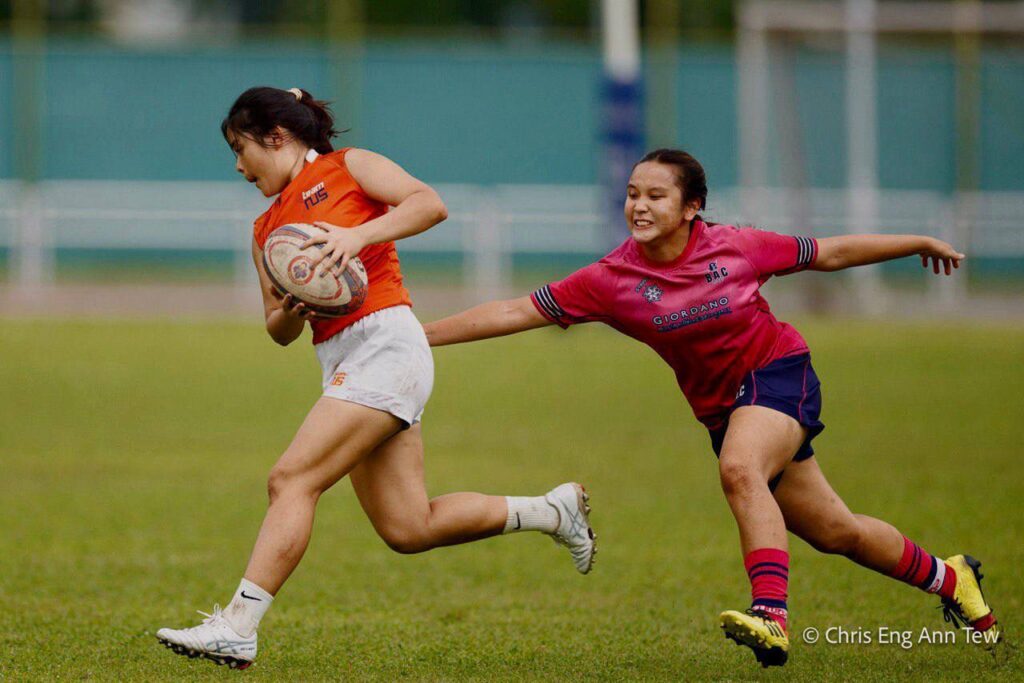
Asyraf, a final-year Political Science major at the NUS Faculty of Arts and Social Sciences is captain and a male base of NUS Alpha Verve Cheerleading.
His venture into the sport began rather serendipitously, during his freshman year at NUS, after watching a Netflix documentary that highlighted the athleticism and artistry involved in cheerleading. Seeing that NUS had a cheerleading team, Asyraf decided to step out of his comfort zone and give it a try, pivoting from soccer, his sport of choice throughout his youth.
"Cheerleading is an interesting sport that tests your physical, mental, and emotional endurance," Asyraf explained. "It requires not only strength but also precise coordination, trust, and communication among team members." As a male base-a pivotal role in lifting and supporting the flyers during stunts-Asyraf brings his soccer-honed strength to the team, allowing for impressive partner stunts and acrobatics.

The journey into cheerleading wasn't without its challenges. With no prior experience before university, Asyraf had to adapt quickly to the rigorous training schedule of three times a week, along with additional gym sessions focused on exercises that translate into cheerleading stunts such as shoulder presses and squats. "It's a sport where you have to give your 100 per cent in everything," he said, reflecting on the demanding nature of practices to put together a 24-man, 2-minute, 50-second routine packed with synchronised movements, pyramids, and acrobatics.

Beyond the physical demands, Asyraf values the tight-knit community and friendships fostered through cheerleading. Team activities like bonding suppers and events like Cheer Mania, where different university teams come together, are highlights of his university experience. "It has really shaped my time here at NUS," Asyraf said, emphasising how cheerleading has enriched his university life beyond academics.
As team captain, Asyraf takes on additional responsibilities, ensuring the team's safety during training and orchestrating routines that highlight their strengths. Looking ahead, his main goal is to lead Alpha Verve to gold at the upcoming Nationals, a testament to his dedication and leadership within the team.

Outside of cheerleading, Asyraf maintains a rigorous academic schedule, balancing his passion for political science with his athletic pursuits. He plans to pursue a Master's degree after graduation, aiming to further his knowledge in public policy or administration.
Reflecting on his journey so far, Asyraf hopes to inspire others to get past stereotypes and pursue their passions wholeheartedly. "Cheerleading is a sport open to anyone willing to take the leap," said Asyraf, proving that true strength lies not just in physical prowess, but in the courage to pursue one's passions against the odds.
As a fun fact, he shared that NUS Alpha Verve Cheerleading now has its first male flyer, a role previously reserved for females, further promoting equal participation in the sport.
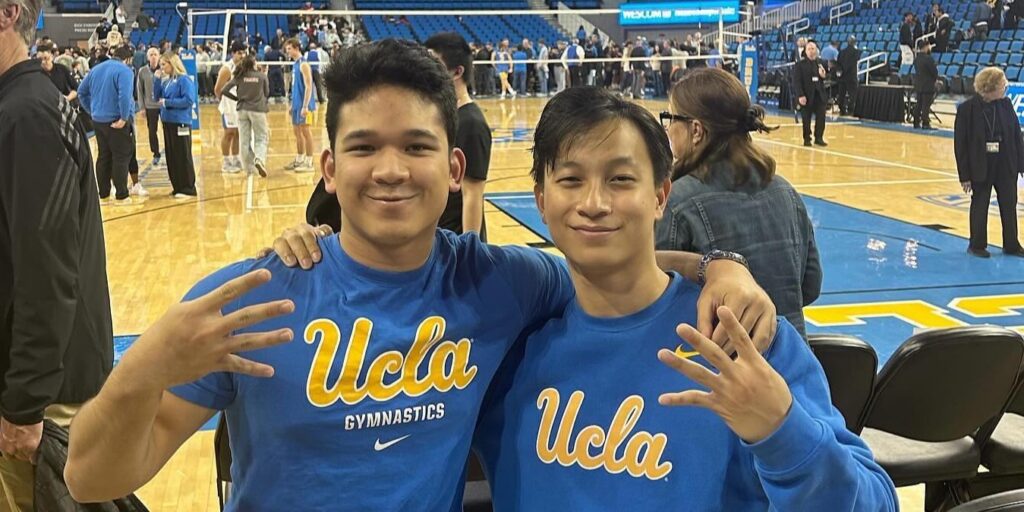
This story first appeared in NUSNews on 6 August 2024.
Going the Distance: NUS Athletes Scoop Up Medals and Degrees
IN BRIEF | 10 min read
- No matter the sport, being a competitive athlete is an exhilarating journey that can push you to your emotional, mental, and physical limits. Now, imagine going through all this while studying for a degree. Three student athletes who are graduating from NUS in July 2024 did just that, rising admirably to the challenge of balancing training, schoolwork, and competitions.

No matter the sport, being a competitive athlete is an exhilarating journey that can push you to your emotional, mental, and physical limits.
Now, imagine going through all this while studying for a degree. Three student athletes who are graduating from NUS in July 2024 did just that, rising admirably to the challenge of balancing training, schoolwork, and competitions.

Dancer Jerome Teo Sze Yong excels at displaying grace under pressure. At NUS, he was a national DanceSport athlete, President of Tembusu College's Students' Committee, and a double-degree major in Electrical Engineering and Philosophy, Politics and Economics (PPE) at the NUS College of Design and Engineering and NUS Faculty of Arts and Social Sciences respectively. In both student life and competitive ballroom dancing, this was his key secret: keeping perfect time.
"I tried to balance everything by knowing my priorities for each day, week and month," said Jerome, 26, noting the importance of time management.
With dates of competitions confirmed months in advance, Jerome could dance to the beat of his schedule. "When am I a student? When am I an athlete? Most of the time, the situation was not binary," he said.
Sometimes he needed to spend more time in the ballroom, while sometimes the lecture notes waiting to be reviewed required his immediate attention.
Juggling a packed schedule, Jerome had to navigate purposefully. When he went for dance practice, he set out to accomplish specific objectives, such as working on smaller sections of a routine, building stamina, or honing fundamental techniques.
When he ran into scheduling issues which simple time management could not solve, NUS swooped in to help. In his freshman year in 2019, Jerome and his dance partner - his younger sister, Rachel Teo Jia Hui, who was also an NUS student - represented Singapore at the Southeast Asian Games. They won a silver and two bronze medals, but Jerome missed his end-of-semester exams.
"I wanted to make sure I could pass the modules and not have to retake them the next semester," he recalled. "NUS was very supportive to make alternative arrangements, like make-up examinations at the start of the next semester."
Jerome is taking a hiatus from DanceSport, and he is now working as a digital design engineer, designing hardware for Internet of Things (IoT) devices, such as smart home devices and smart lighting. "At any point in time, if I want to resume dancing, I can always return to it," he added.
On 17 July 2024, Jerome will be graduating with Bachelor of Engineering (Electrical Engineering) with Honours (Highest Distinction) and on 19 July 2024, he will receive a Bachelor of Arts in Philosophy, Politics and Economics with Honours (Highest Distinction).

The most important thing about sports, said former competitive canoeist Kok Hui Wen, is to enjoy what you do. "As much as training is serious, it should be fun as well. It should fill you up," she remarked.
This was what drove the water sports enthusiast, who studied Nursing with a second major in Public Health, to join NUS Canoeing and also surf in her own time.
Hui Wen, who started competitive canoeing in junior college, credits the sport for developing her resilience and self-assurance. "It gave me the confidence to know that whatever hardships I am facing now, I have what it takes to overcome it," the 23-year-old said.
These qualities proved to be invaluable during her clinical postings as an NUS Nursing student. The first two years of Nursing studies were not easy for Hui Wen as she delved deeper into the complexity of the Nursing profession. The resilience that she developed from canoeing, her trust in her mentors, and the reassurance that she would eventually find her own footing in Nursing helped her navigate the period of uncertainty. "I am sure there's a place in Nursing for me and I could value-add to healthcare in my own special way," she reflected.
Keen to apply her healthcare knowledge to benefit the community, Hui Wen took on the role of Programme Head for Project Barrios, a nursing-led project that focused on providing health education for overseas and local communities. Initiated as an overseas Community Involvement Project, Hui Wen and her team restructured the project to serve underserved local communities during the COVID-19 period. They ran education programmes for the elderly, migrant workers and underprivileged children to raise awareness of common health ailments specific to each group and educate them on the prevention, early detection and community resources to mitigate these health risks.
The Nursing programme's hybrid learning approach, with a mix of online tutorials and lectures as well as in-person classes, made it easier for her to fit canoeing and surfing into her schedule. During the semester, Hui Wen would sometimes travel to Indonesia, Malaysia, the Philippines, and Sri Lanka to ride the waves.
She has retired from canoeing, but still does recreational water sports such as surfing. For now, she is looking forward to starting her new job as a nurse at the National University Hospital.
Hui Wen will be graduating on 14 July 2024 with a Bachelor of Science (Nursing) with Honours (Highest Distinction).
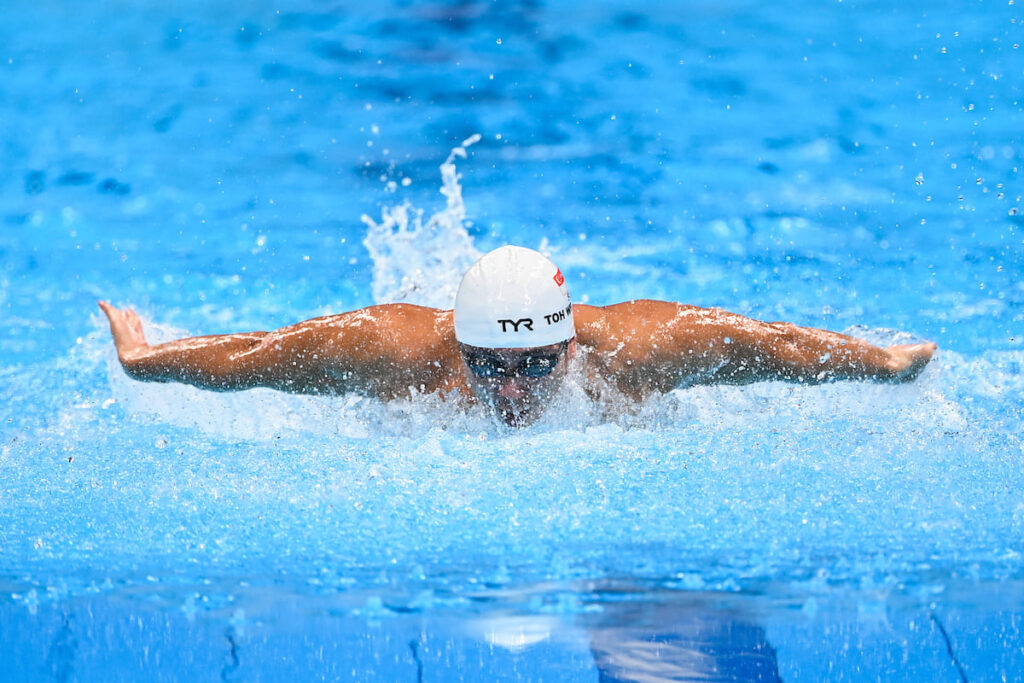
National para-swimmer Toh Wei Soong pulled off a stunning victory at the 2023 Hangzhou Asian Para Games, scooping up gold medals in backstroke, freestyle, and butterfly. But the competitions were not his only race against the clock.
Then a PPE undergraduate at NUS, he had spent the previous few years juggling classes and assignments on top of a gruelling training schedule for international competitions, including the Tokyo 2020 Summer Paralympic Games.
It was not easy. Wei Soong - who has Transverse Myelitis, a rare neurological condition affecting his lower spinal cord - had to take Leave of Absence to make time for swimming, and he also chose classes that best suited his training and competition schedule.
His passion for philosophy and interest in PPE since secondary school were what kept him going, said Wei Soong, who penned an Honours thesis on "A Wittgensteinian Solution to Vagueness", and helped set up an undergraduate student academic journal for Philosophy - The Red Stone - during his time as Deputy Director for Publications for the Republic, a PPE undergraduate journal.
"I am very glad these journals are continuing to serve our communities, and giving students opportunities to learn how the publishing system works and to commemorate the best student essays from each semester," noted the 25-year-old graduate of NUS Faculty of Arts and Social Sciences and NUS College.
As a PPE student, Wei Soong enjoyed interacting with his peers on complex and broad-ranging topics during class. "Overall, I did have a lot of fun in my undergraduate degree and a lot of fun in learning the subjects," he mused.
After more than a decade as a student athlete, Wei Soong, who is gearing up for the Paris 2024 Summer Paralympic Games, will be focusing on swimming and savouring life as a full-time athlete.
On 19 July 2024, Wei Soong will be graduating with a Bachelor of Arts in Philosophy, Politics and Economics with Honours (Merit).
This story first appeared in NUSNews on 12 July 2024, as part of a series covering Commencement 2024, and celebrating the achievements of NUS graduates from the Class of 2024.
Students Take on Global Challenges at the 21st Singapore Model United Nations
IN BRIEF | 10 min read
- SMUN participants roleplayed as UN delegates in councils to address urgent geopolitical issues such as managing the impact of climate change on small island developing states and combating cyber terrorism in international relations.
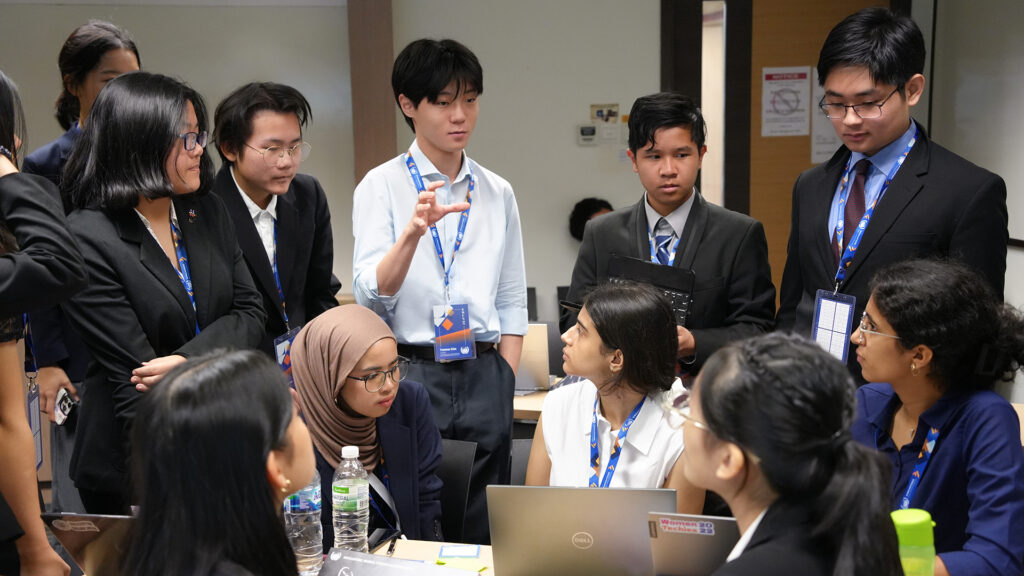
More than 500 students from over 20 secondary schools, pre-university, and tertiary institutions across Singapore and the Asia-Pacific region gathered at the 21st Singapore Model United Nations (SMUN) conference that was organised by the NUS Political Science Society (PSSOC). Held from 4 to 7 June at NUS University Town, the event provided a forum for robust debate on critical global issues such as healthcare, climate change, and peacekeeping efforts, and witnessed the highest participation in the event's history.
Organised since 2003, SMUN is a flagship event of PSSOC. It has earned a reputation for being one of the eminent Model UN conferences in the Asia-Pacific region and offers a distinguished platform of discourse for youths from all walks of life to get a taste of international diplomacy through simulations of UN committees.
This year's theme, "Reshaping the World Order: Challenges and Opportunities", provided an opportunity for participants to navigate the complexities of rapidly evolving global geopolitics. Participants stepped into the roles of geopolitical actors, including UN delegates and members of international bodies like the United Nations Security Council, the African Union, and the World Health Assembly, to engage in meaningful negotiations and debates about pertinent issues.
At the conference, Dr Mohamad Maliki Osman, Minister in the Prime Minister's Office, and Second Minister for Education and Foreign Affairs, delivered a keynote speech which addressed the intricate dynamics of the global landscape amidst growing global geopolitical tensions. Referencing Singapore Prime Minister Lawrence Wong's recent inauguration speech, he emphasised the challenges posed by global conflicts and the need for Singapore to navigate these with a strategic and principled approach, and maintaining healthy relations with like-minded partners as we pursue our national interests.
"Ultimately, we hope to maintain good relations with all countries, while safeguarding our national interest in building an open and inclusive Southeast Asia…Singapore's foreign policy is driven by our own principles and national interests."
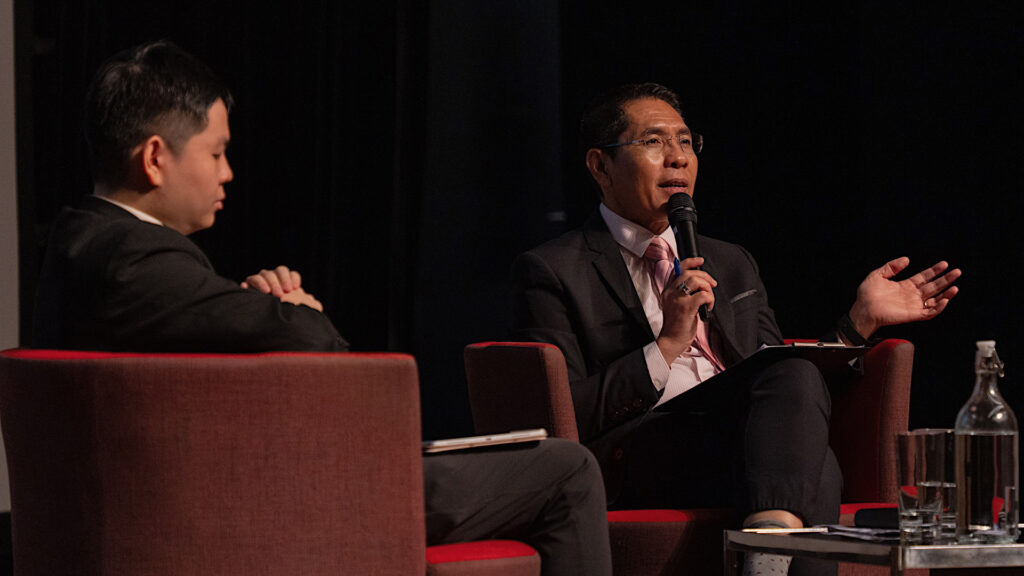
Dr Maliki concluded his speech by urging the youth to leverage platforms like SMUN to become proactive architects of a brighter future, not only for Singapore but for the global community.
An opportunity to learn about diplomacy and international relations
SMUN simulates United Nations committee sessions in which participants roleplay as UN delegates in councils to address urgent geopolitical issues through extensive research, the preparation of position papers, and the development of policy proposals. Their collaborative efforts lead to intense debates and voting on draft resolutions, with the goal of passing these resolutions with a majority vote. This year, delegates formed 11 councils to address 21 topics of interest such as managing the impact of climate change on small island developing states, combating cyber terrorism in international relations, and addressing global supply chain vulnerabilities.
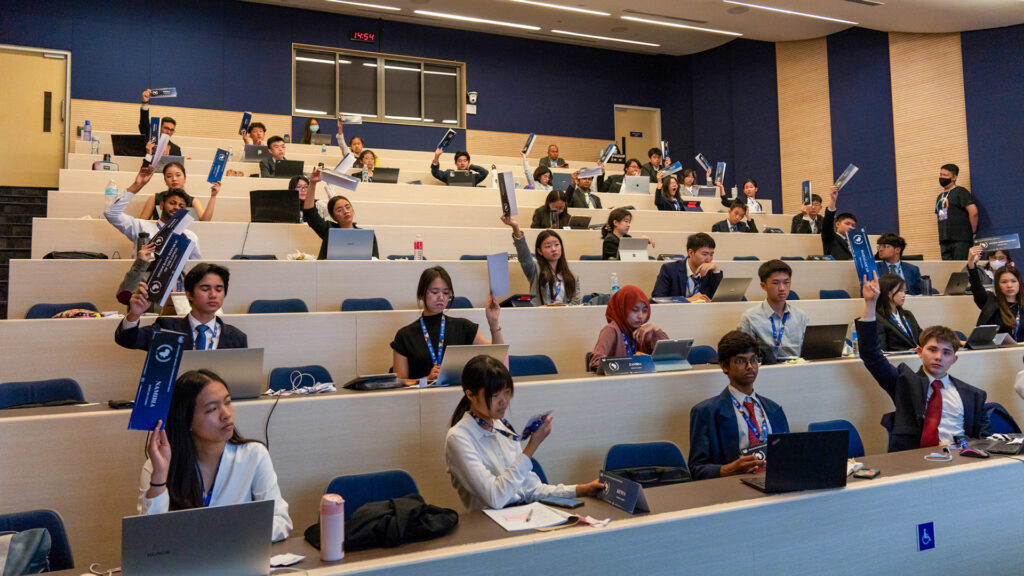
Significant discussions at the SMUN 2024 conference included a focused session on the integration of artificial intelligence (AI) in healthcare. Delegates debated regulatory strategies to ensure AI is used ethically across global healthcare frameworks. Key concerns included safeguarding data privacy, ensuring equitable access to AI-driven healthcare, and the need for international standards to manage AI implementation without exacerbating healthcare disparities.
Another key discussion was led by the BRICS+ council on the de-dollarisation of the global economy. Representing the interests of countries such as Brazil, Russia, India, China, South Africa and more, the BRICS group focuses on economic cooperation and policy coordination among its member nations to enhance their influence in global affairs. This session explored the introduction of a common currency among BRICS+ nations to reduce dependence on the US Dollar. The debate addressed economic stability, potential geopolitical implications, and the strategic steps required for a transition towards a new currency system, emphasising the need for a coordinated approach to mitigate economic risks.
As the conference was designed to spur participation and dialogue, participants who made significant contributions were recognised with awards, such as Award for Best Delegate, Outstanding Delegate, Honourable Mentions, and Best Position Paper. The delegation from the Netaji Subhas University of Technology received the Best School Delegation award, highlighting their outstanding preparation and debate performance.
Mr Aman Kumar Jha, a member of the winning delegation said, "Coming to participate in SMUN all the way from India was an indelible experience. From delving into an eclectic mix of pressing global challenges to learning diplomacy and sharing perspectives, the four days of rigorous debating gave us a glimpse of what it is like at the UN. The treasure trove of memories that we made along the way made SMUN even more special for us. Congratulations to the Secretariat and PSSOC for organising such a great event!"

PSSOC President and Year 3 Faculty of Arts and Social Sciences (FASS) Political Science student Ethan Naidu said, "PSSOC extends its gratitude to Dr Maliki Osman, all participating institutions, and the organising committee for their roles in making SMUN 2024 a success. This year's conference not only enriched the understanding of international relations among participants but also honed their skills in diplomacy and global policy formulation. Through engaging discussions and collaborative problem-solving, SMUN 2024 equipped a new generation of leaders to effectively address future global challenges."
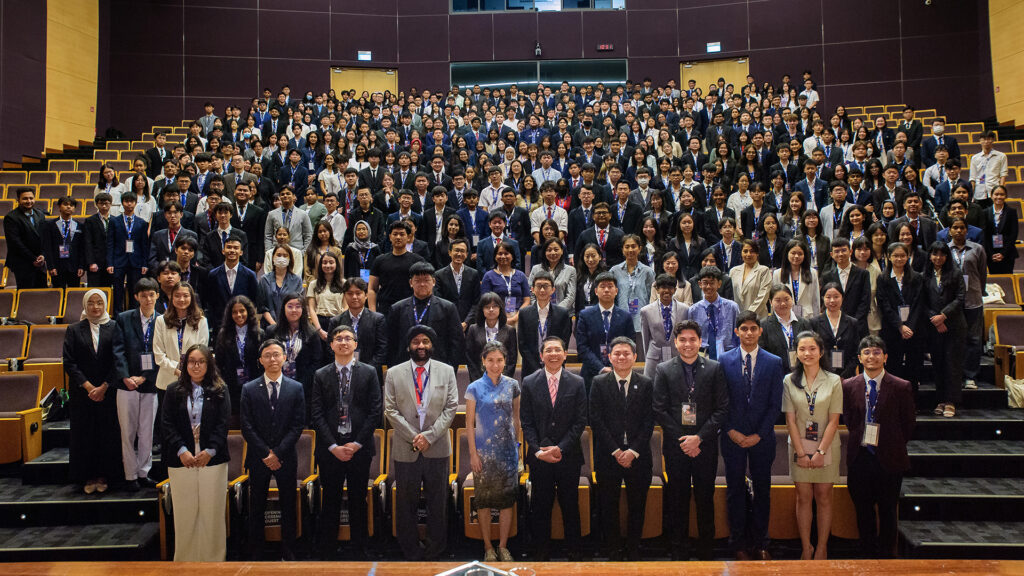
This story first appeared in NUSNews on 5 July 2024.
South Korean Doctors’ Strike is a Medical Drama with No Heroes
IN BRIEF | 10 min read
- By Dr Hyejin Kim (NUS Political Science) and Professor Erik Mobrand (Graduate School of International Studies, Seoul National University)..
Click through image below to read this piece.
This story first appeared in CNA Online and NUSNews on 28 June 2024.
Putin-Kim Meeting Generates Surprising Agreement About China in South Korea
IN BRIEF | 10 min read
- By Dr Hyejin Kim (NUS Political Science) and Professor Erik Mobrand (Graduate School of International Studies, Seoul National University)..
Click through image below to read this piece.
This story first appeared in CNA Online and NUSNews on 21 June 2024.
AI and Tech Ideas Take Flight at NUS’ first Bay Area Forum
IN BRIEF | 10 min read
- Organised for the first time in San Francisco's buzzing Bay Area, the two-day NUS Innovation Forum sparked a vibrant exchange of ideas between NUS alumni, students, thought leaders and industry experts.
Navigating the tech industry - whether as an investor, a start-up founder or an employee - can be challenging, especially today.
"We have seen the highs and lows for ourselves in recent years," said NUS President Professor Tan Eng Chye (Science '85), speaking at the NUS Innovation Forum (NIF). "From the new NUS unicorns being crowned and rising interest in deep-tech investments, to widespread tech layoffs and the funding winter, it is a rapidly evolving operating environment, and we must keep abreast with developments to seize opportunities that each tide and season presents."
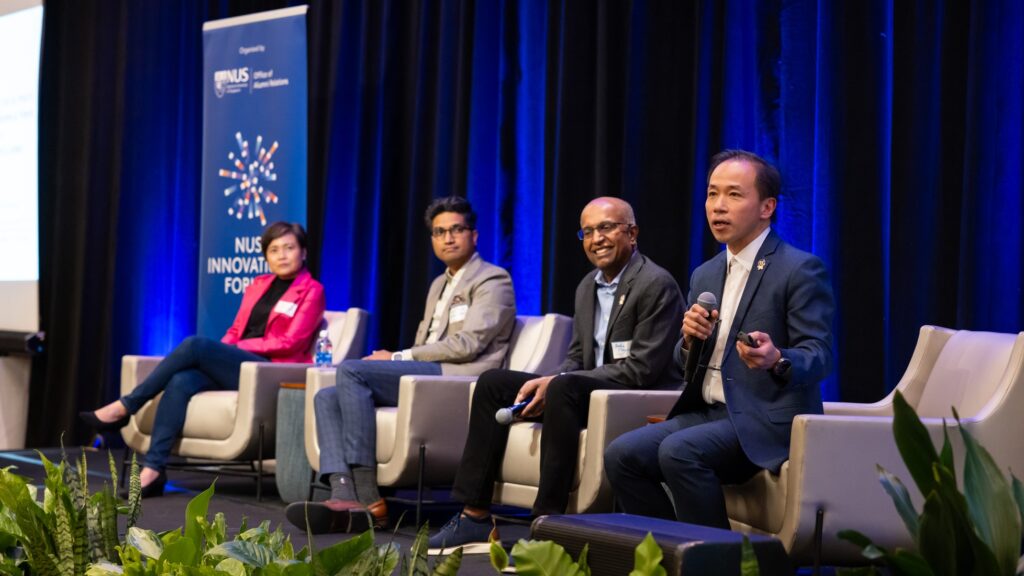
NUS alumni, students, thought leaders and industry experts in the San Francisco's Bay Area in the United States shared insights and exchanged opinions at the second edition of NIF, which ran from 13-14 June 2024 and was attended by 200 participants. Coming on the heels of the inaugural edition held in Manila in May 2024, NIF is organised by the Office of Alumni Relations to bring alumni, thought leaders and industry experts together to discuss trending topics in innovation. The two-day NIF San Francisco Bay Area, the first in the US, was organised with support from BLOCK71 Silicon Valley, NUS Overseas Colleges and the Singapore Global Network.

On why NIF was held in the Bay Area, Ms Ovidia Lim-Rajaram (Arts & Social Sciences - Political Science and History '89), Chief Alumni Officer of the University, explained, "Given NUS' long history in the Bay Area - over 20 years - through the NUS Overseas Colleges or NOC programme, to this BLOCK71 start-up launchpad - the Bay Area was a natural choice for our second international forum. Many alumni have settled in the area after graduation, drawn to the area's vibrancy."
AI for Good
The panel discussion on the first day was devoted to novel and impactful use cases of Artificial Intelligence (AI), an increasingly pertinent topic in recent times. While much has been said in recent times about its potential ills, less attention has been given to the positive changes AI can effect when dealing with intractable global issues.
The panel comprised Dr Avinash Balachandran, Vice President of the Human Interactive Driving Division at Toyota Research Institute; Ms Mariane Bekker, Founder of Founders Bay and Women Founders Bay; and Dr Wee Hyong Tok (Computing '99), Partner Director of Products (Cloud and AI) at Microsoft. It was moderated by Mr Arvind Ayyala (Engineering '10), Partner at Geodesic Capital and Chairperson of the NUS Alumni Overseas Chapter San Francisco.

The diverse experiences and insights of the panelists in the tech industry gave the audience a holistic picture of AI's possibilities and potential. For example, one speaker shared how a tech giant was already exploring ways that AI could be leveraged for sustainability efforts, such as conserving endangered species.
Prof Tan also updated the audience about the University's own efforts to harness AI. "At NUS, we are challenging our community to leverage AI to accelerate research, discoveries and translation. Among others, NUS researchers are using AI to accelerate the discovery of drug combinations and personalise healthcare treatment plans; alumni entrepreneurs are employing AI to develop cancer-screening tools; NUS start-ups are using AI-empowered video analytics and facial recognition to improve public and workplace safety."
Tech's Next Chapter
On the second day, the discussion focused on opportunities and challenges for tech investments in the Bay Area and Singapore. This panel comprised Ms Aihui Ong (Computing '98), General Partner of Transform Capital; Dr Radha Nagarajan (Engineering '86) Senior Vice President and Chief Technology Officer of Marvell's Optical Platforms and NUS Visiting Professor; and Mr Arvind Ayyala. It was moderated by NUS Deputy President (Academic Affairs) and Provost Professor Aaron Thean.
The panel opened with a lively discussion on the differences in the tech ecosystems of the Bay Area and Singapore. One speaker noted that the fear of failure was still prevalent in Singapore's ecosystem and encouraged founders to be more open to the risk of failure. Panellists also advised players in the ecosystem to avoid building products for just Singapore or even Southeast Asia. The key message they had for the audience - go bigger.

Noting that the alumni network was rich with such insights, Prof Tan welcomed the audience to tap into it. "We see the value of a strong alumni network at work: from the ties that are forged across generations, to the willingness of our alumni to make introductions, invest in, and share their knowledge with each other. By paying it forward, the community grows and flourishes."
New Contacts, New Insights
Both days of the forum featured well-attended networking sessions.
All these opportunities for the meeting of minds are critical for powering innovation, said Associate Professor Benjamin Tee, NUS Vice President (Ecosystem Building), who spoke on the NUS Enterprise ecosystem at the forum. "Meaningful collisions and collaborations are the fuels for innovation, and thought leadership forums like these are the engines," he said.
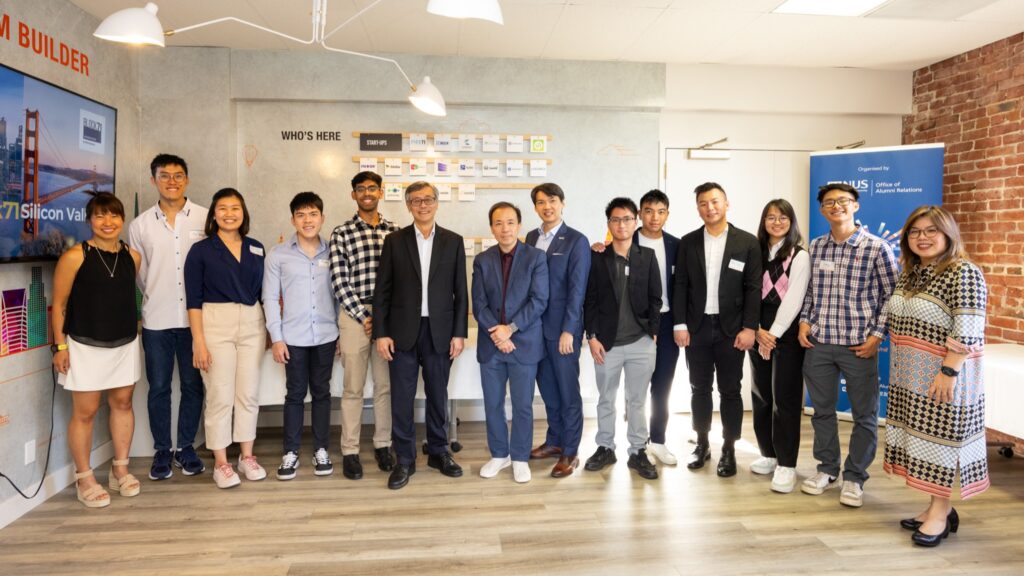
Added Prof Thean, "We are committed to fostering a culture of creativity and critical thinking in the NUS global community where, even after our students graduate, they are empowered to become lifelong changemakers with their ideas."
The NIF concluded with a NUS Alumni & Friends Dinner, during which participants reconnected with old friends and made new meaningful connections, sowing the seeds for future partnerships to come.
This story by the NUS Office of Alumni Relations first appeared in NUSNews on 20 June 2024.
Reading Between the Lines of Taiwan President Willian Lai’s Inauguration Speech
IN BRIEF | 10 min read
- Commentary on CNA Online by Associate Professor Chong Ja Ian (NUS Political Science).
Click through image below to read this piece.
This story first appeared in CNA Online and NUSNews on 27 May 2024.
NUS Faculty of Arts and Social Sciences alumni honoured for contributions to public service, education, literature and the corporate sector
IN BRIEF | 10 min read
- The four awardees were Mr Bilahari Kausikan, an iconic veteran of diplomacy; Professor Paul Cheung, a highly regarded statistician; Ms Suchen Christine Lim, a critically acclaimed writer; and Mr Tan Yam Pin, a prominent businessman and corporate heavyweight.

The NUS Faculty of Arts and Social Sciences (FASS) paid tribute on 15 May 2024 to four eminent alumni for their outstanding contributions towards nation-building, growth of the university, the promotion of the arts and social sciences, and impact in the private sector. The four were Mr Bilahari Kausikan, an iconic veteran of diplomacy; Professor Paul Cheung, a highly regarded statistician; Ms Suchen Christine Lim, a critically acclaimed writer; and Mr Tan Yam Pin, a prominent businessman and corporate heavyweight.
Established in 2015, the Distinguished Arts and Social Sciences Alumni Award lauds notable FASS alumni who have made exemplary contributions to the nation, community, University, or the faculty, and who have dedicated themselves to the betterment and promotion of the arts and social sciences.
The trailblazers who inspire young generations of FASS students and alumni
In his speech, FASS Dean Professor Lionel Lim highlighted how each of the recipients has pursued their passions with tenacity and purpose. They have made an incredible impact in their respective fields, and have done so "with integrity, compassion, and a dedication to excellence," he said.
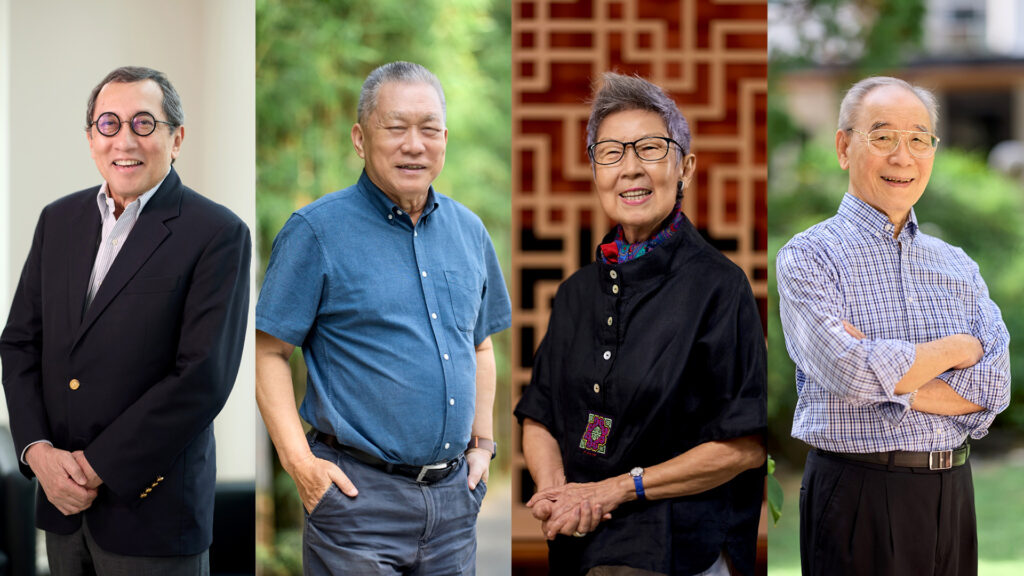
A diplomat for over three decades, Mr Kausikan has been an influential voice in shaping Singapore's positions on regional and international issues. His 37 years in the Ministry of Foreign Affairs (MFA) saw him serving in a variety of appointments at home and abroad, including as Ambassador to the Russian Federation, Permanent Representative to the United Nations (UN) in New York, and notably as the Permanent Secretary of the MFA from 2010 to 2013. He is actively engaged in ASEAN forums, facilitating dialogue, cooperation, and conflict resolution among member states. His articles and speeches, which provide thought-provoking analyses of regional issues, have influenced policymakers and scholars alike. He is currently Chairman of the NUS Middle East Institute.
Professor Paul Cheung is Director of the Asia Competitiveness Institute at the NUS Lee Kuan Yew School of Public Policy and is well-known for his pioneering research in the fields of official statistics, social planning, manpower and population. In a previous role as Chief Statistician of Singapore, he transformed the national statistical system - the 2000 Singapore population census was the first in Asia to make full use of population and business registers and the Internet to collect data. As Chief Statistician of the UN from 2004 to 2012, he played a pivotal role in developing the global statistical system and establishing an inter-governmental platform on Global Geospatial Information Management.
A 2023 Cultural Medallion winner, highly accomplished author Ms Suchen Christine Lim's critically acclaimed fiction explores themes of cultural identity, the complexities of history, and Singapore society's diverse cultural and linguistic tensions. Her 1984 debut novel Rice Bowl established her as a significant voice in Singapore's literary scene. Her third novel, Fistful of Colours, was awarded the inaugural Singapore Literature Prize in 1992. Another, The River's Song, was featured in Kirkus Reviews (US) as one of the "100 Best Books of 2015". She was also awarded the Southeast Asian Writers Award in 2012 for her body of work. Keen on fostering the next generation of literary talent, she mentors, teaches and provides platforms for young writers to showcase their work.
Mr Tan Yam Pin is a prominent business leader who built an illustrious career spanning three decades in the corporate world - he led the Cold Storage group of companies in Singapore and Malaysia; the Fraser & Neave group of companies, including Centrepoint Properties Ltd; and the Asia Pacific Breweries Ltd group of companies across Asia. Post-retirement, Mr Tan served on the boards of prominent companies in Singapore. Mr Tan also has a scholarly bent. Before his foray into business, he taught in the Department of Economics under the then University of Singapore's Faculty of Arts. Together with three colleagues, he subsequently established the Department of Business Administration, now known as the NUS Business School.
Congratulating the recipients at the ceremony, NUS President Professor Tan Eng Chye noted that their contributions to Singapore and passion for what they do will inspire many, especially current and future FASS students who will follow in their footsteps and create their own legacies.
He added, "As educators, it is deeply encouraging when we see our graduates achieve success in their endeavours. It reaffirms the transformative power of education, and it inspires us to continually improve how we teach, how our students learn, and how the student life experience can set our graduates up to thrive and contribute positively to society."
More information on the award recipients can be found here.
This story first appeared in NUSNews on 16 May 2024.
Young Generation Affected by Mobile World?
IN BRIEF | 10 min read
- Column in Tamil Murasu by Yugesh Kannan, a third-year student from NUS Political Science, and Vice-Chairman of the NUS Tamil Society.
Click through image below to read this piece.
This story first appeared in Tamil Murasu and NUSNews on 15 April 2024.
19 NUS Programmes Placed in Global Top 10 in QS World University Rankings by Subject 2024
IN BRIEF | 5 min read
- Spanning across the fields of Business, Computing, Engineering, Science, as well as Humanities and Social Sciences, 19 of NUS' 44 ranked programmes have been placed among the world's top 10.

Nineteen NUS programmes are in the global top 10, according to the latest Quacquarelli Symonds World University Rankings (QS WUR) by Subject 2024 released on 10 April 2024. Four of them have been ranked top five in the world. The programmes include courses in the fields of Business, Computing, Engineering, Science, as well as Humanities and Social Sciences - underscoring NUS' excellent performance across broad faculty and subject fields.
Professor Aaron Thean, NUS Deputy President (Academic Affairs) and Provost, said, "We are delighted that NUS has achieved top 10 rankings globally for 19 subjects this year. Notably, this marks the highest number of subjects placing in global top 10 for NUS in the past five years. We are grateful for the recognition of the exceptional calibre of our international faculty, students, and alumni. It attests to the University's commitment to academic excellence and serves as an encouragement for our dedication to interdisciplinary education, equipping our students for the challenges and opportunities of the future."
The QS WUR by Subject are an independent comparative analysis on the performance of nearly 16,000 university programmes. These programmes are taken by students at 1,561 universities in 149 locations across the world and sit across 55 academic disciplines which, for the rankings, are then grouped into five broad subject areas.
"Singapore's universities have consistently performed well in global assessments. This prestigious position offers unique opportunities for growth," said Mr Ben Sowter, Senior Vice President at QS.
Acknowledging the nation's commitment to strategic investments and planning for the tertiary education sector, Mr Sowter added, "Singapore stands to gain from these geopolitical shifts, attracting a growing share of international talent. As a recognised hub of academic excellence, Singapore also faces heightened competition from regional players, including emerging economies looking to replicate its successful model."
Transformative Education that Nurtures Future-ready and Resilient Graduates
Preparing our graduates to be globally competitive has always been an integral part of NUS' education. NUS' unique education experience emphasises a flexible interdisciplinary approach and innovative pedagogy with opportunities for multiple pathways and specialisations, enabling students and alumni to be agile and adaptable in today's volatile and complex economy. Armed with a broad range of market-relevant competencies, NUS graduates can confidently pivot to diverse sectors and areas of work, regardless of their major or specialisation.
This story first appeared in NUSNews on 10 April 2024.
Ideas Festival 2024: Shining a Spotlight on the Importance of Social Science and Humanities Research on Society
IN BRIEF | 5 min read
- Launched on 20 March 2024 with Minister for Education Mr Chan Chun Sing as the Guest of Honour, this festival was organised by the Autonomous Universities (AUs) in Singapore and is supported by the Social Science Research Council (SSRC). It features 13 events over a month-long period.
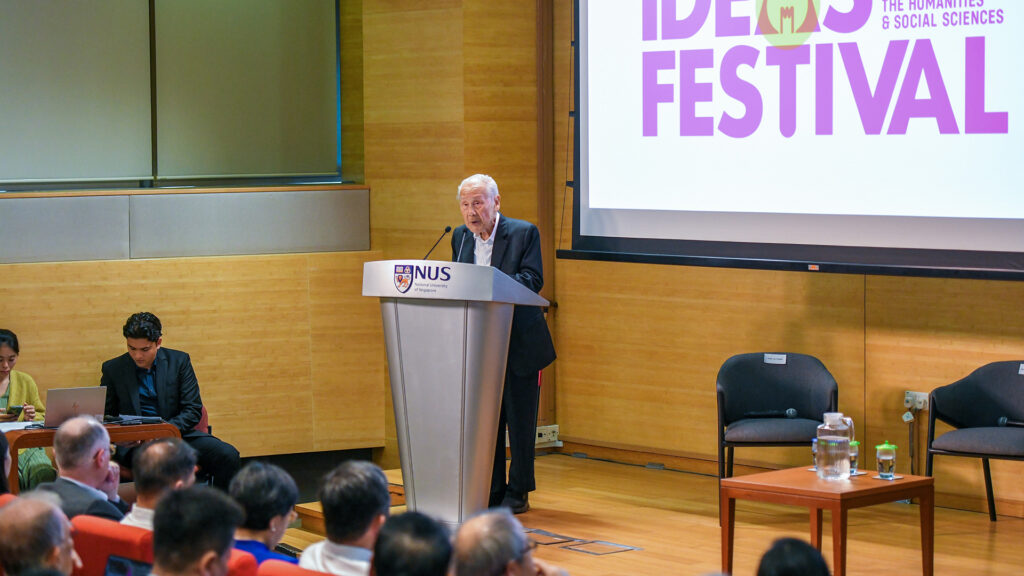
How does research in the social sciences and humanities impact our world? This is a question the inaugural "Ideas Festival 2024 - Insights from the Humanities and Social Sciences" seeks to address as it delves into the intricate challenges confronting Singapore and the region amid a period of disruptive change by drawing on the works of the local Social Science and Humanities (SSH) research community.
Launched on 20 March 2024 with Minister for Education Mr Chan Chun Sing as the Guest of Honour, this festival was organised by the Autonomous Universities (AUs) in Singapore and is supported by the Social Science Research Council (SSRC). It features 13 events over a month-long period.
At the launch event, SSRC Advisor Professor Wang Gungwu who is also NUS University Professor, highlighted the importance of SSH research in enriching our understanding of social issues, which are inherently complex and dynamic, shaped by historical developments and disrupted by the latest technological advances.
Against this backdrop, he urged more work to be done to understand Singapore's multicultural society and the complex environment in which it exists. One approach is to encourage researchers to consider having Co-Principal Investigators from a mix of academic disciplines in the humanities, social science as well as the science, technology, engineering, and math (STEM) fields. "What I envisage is that research proposers are open-minded to different perspectives that could lead them to something fruitful they did not expect to find. A variety of insights coming from scholars with different backgrounds makes that possible."
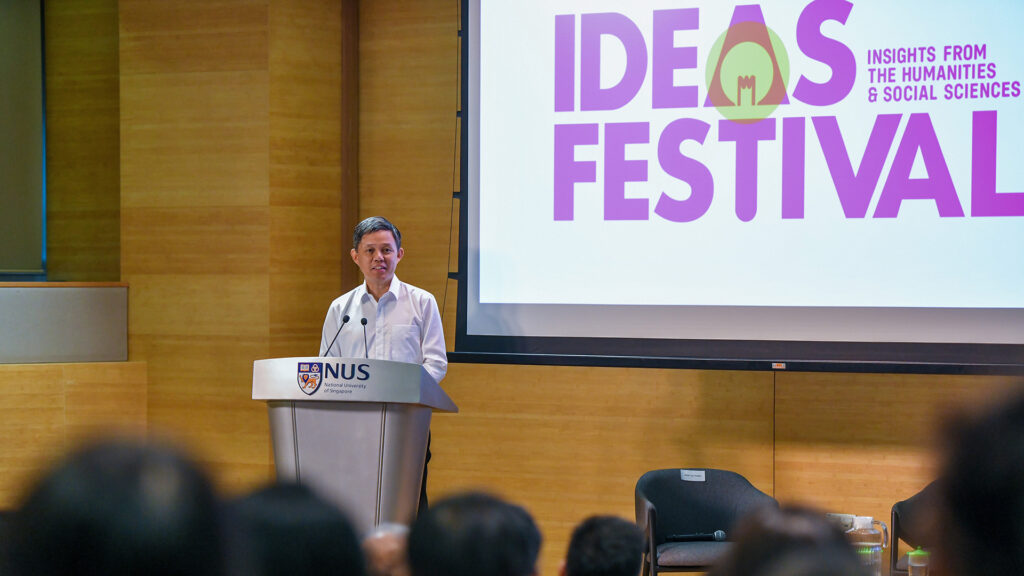
Echoing the importance of SSH research, particularly in a STEM-focused world, Professor Elaine Ho, Chair of the Ideas Festival Organising Committee and Vice Dean of Research at the NUS Faculty of Arts and Social Sciences, said at the sidelines, "Social science and humanities research is very much part of our everyday lives," citing examples such as mental health and children's health outcomes, which are concerned with the behavioural dynamics within society. "Social science and humanities researchers have these kinds of insights that can help us to improve the way that we try to better society," she noted. "There has been much more attention given to STEM research subjects in the Singaporean landscape…but where the opportunity lies for both the STEM subjects as well as social science and humanities is by coming together."
The festival features more than 50 researchers across a spectrum of expertise in SSH sharing key insights on a range of topics. These include the impact of digital acceleration and disruptive technologies like the metaverse and artificial intelligence (AI) on childhood, an inclusive future of work, new forms of social interactions, as well as fake news and misinformation in the media. It will also touch on strengthening support for mental health and well-being through a whole-of-society approach, such as leveraging family and social circles to support the well-being of individuals across various stages of their lives.
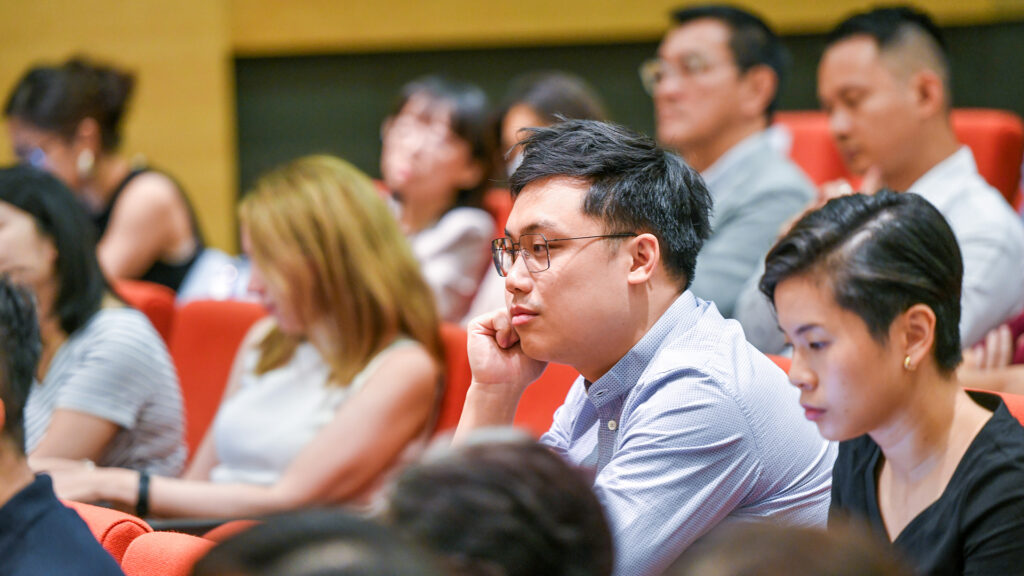
Acknowledging how the scholarship of social science and humanities in Singapore has made significant progress, Chairman of the SSRC, Mr Peter Ho, said, "You just need to look at the span of interesting projects in the universities and research institutes to get a sense. Public sector agencies have also taken greater interest, indicating the increasing traction of the social sciences and humanities among policy researchers (and) policymakers. By bringing together researchers across the universities and research institutions, the Ideas Festival clearly signals that the research ecosystem is vibrant and thriving."
NUS is the host of two events at the festival. The first, "Gazing into the Metaverse", which was held on 26 March 2024 looked at how the metaverse - a world of avatars, digital twins and digital currencies - will be built, how it will be curated, who will use it, and how it will transform our everyday lives. The roundtable examined the key questions, implications and themes that researchers in the social sciences and humanities are now asking about this next stage in our digital journey, particularly in Asia.
The other, "Foundations of Home-Based Work", will take place on 12 April 2024 and will explore the spatial, social and technological dimensions of home-based work (HBW) in Singapore. This is done through looking at considerations such as the policy framework surrounding this type of work and exploring the following questions: who is involved in it; what kind of living do they make; in which housing types and neighbourhoods is this work occurring; and the pathways for accommodating HBW in our lives through design and policy recommendations.
On 17 April 2024, the University will also co-organise "Singapura Before Raffles: Early Modern Asia in the Global Renaissance", which will discuss how early modern Singapore and Asia played important roles in shaping global ideas about maritime trade, global commerce, international law, political governance, and literary and artistic advancement. It will draw on new and exciting interdisciplinary research from teachers and scholars across Singapore's universities and the wider Asia region.
The Ideas Festival 2024 runs till 19 April 2024. More information can be found here.
This story by the NUS Faculty of Arts and Social Sciences first appeared in NUSNews on 3 April 2024.
Deepening Perspectives on Peacebuilding: Insights from the 3rd Global Peace Summit
The 3rd Global Peace Summit, convened at the prestigious United Nations Building in Bangkok, welcomed a diverse range of international delegates. The three-day summit commenced on 10th January 2024, and opened with the theme "Bridging Divides, Tools and Tactics for Successful Peacebuilding", highlighting the collaborative efforts needed to create a harmonious world. By uniting perspectives from various sectors, the summit underscored the complexity of achieving global peace. It showcased the essential, concerted actions required to navigate the multifaceted peacebuilding landscape.
The summit harnessed a range of emotions, channelling them to underscore the critical objectives of peacebuilding. It became a platform where delegates, imbued with inspiration, learnt about how to advance peace building within their respective communities. This gathering was notable for its inclusivity, drawing peace advocates from across the world. Additionally, the participation of government officials, academics, and social workers added depth to the discussions, showcasing a unified drive to explore and implement peacebuilding policies both in theory and in practice.
The following speakers are among many at the conference who resonated deeply through the sharing of their personal experiences:
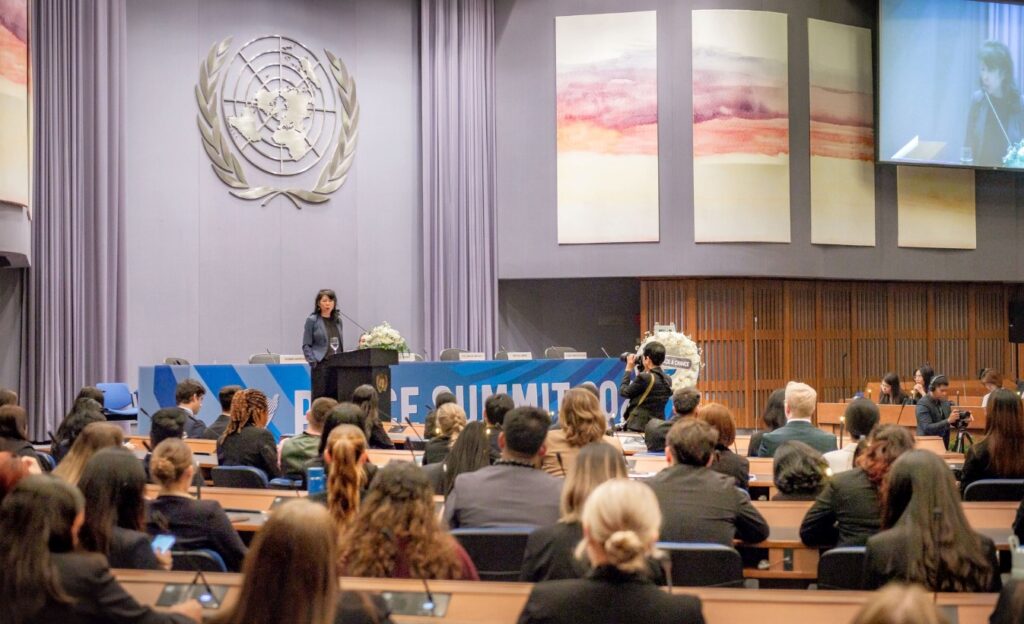
Loung Ung delivering her heartfelt words (Source: Author's own)
Loung Ung's poignant presentation as a survivor of the Cambodian Genocide captivated attendees with its raw intensity. Ung's narrative transcended mere historical recounting, delving into the profound psychological and societal impacts of conflict. Her emphasis on the imperative of historical acknowledgment to prevent future atrocities underscored the crucial role of collective memory and trauma-informed strategies in the peacebuilding process.
(Watch: https://youtu.be/uNaUeDMriDo?feature=shared)

Hassan Akkad delivering his motivational speech (Source: Humanitarian Affairs Asia)
Hassan Akkad, sharing his journey as a Syrian filmmaker and refugee rights activist, underscored the media's power in peacebuilding. He advocated for empowering refugee storytellers to share their narratives, fostering global empathy and understanding. Through his personal anecdotes of struggle and loss he faced in his own refugee journey to the UK, Akkad's experience highlighted storytelling's capacity to humanise complex issues and bridge community divides.
(Watch: https://youtu.be/WNFLzv4mTsM?feature=shared)

Antoinette Mutabazi delivering her inspiring story (Source: Humanitarian Affairs Asia)
Antoinette Mutabazi's heartfelt recounting of her experiences during the Rwandan Genocide served as a powerful testament to human resilience and the transformative power of forgiveness. Her narrative underscored the critical roles of empathy and collective healing in rebuilding efforts. The impact of her story was heightened by her vivid descriptions of violence and unimaginable suffering, which starkly contrasted with the theme of forgiveness, making Mutabazi's account all the more compelling. Her insights into the Rwandan reconciliation process also highlighted the significance of community dialogue in establishing sustainable peace.
(Watch: https://youtu.be/H2I8NUWogzU?feature=shared)
The discussions at the summit regarding the pivotal role of peace ambassadors broadened the scope from individual stories to a shared obligation in fostering peace. This shift underscored the notion that achieving peace is not a passive occurrence but a continuous, active pursuit. It necessitates a comprehensive strategy that includes education, empathy, and active advocacy.
A notable segment of the summit was dedicated to examining the critical role that education plays in the realm of peacebuilding. Motivational speakers highlighted education as a powerful mechanism for fostering understanding, tolerance, and critical thinking-skills indispensable for nurturing a culture of peace for forthcoming generations.

Singapore delegation photo (Source: Cumulative efforts from the delegation)
In summary, the 3rd Global Peace Summit acted as a significant reminder of the continuous global necessity for robust peacebuilding initiatives. The amalgamation of personal experiences and collective wisdom offered inspiring motivation for all attendees to partake in peace-promoting actions. The summit succeeded in enriching the participants' comprehension of the complexities involved in achieving and maintaining peace, inspiring a collective resolve to strive for a more harmonious and equitable world.
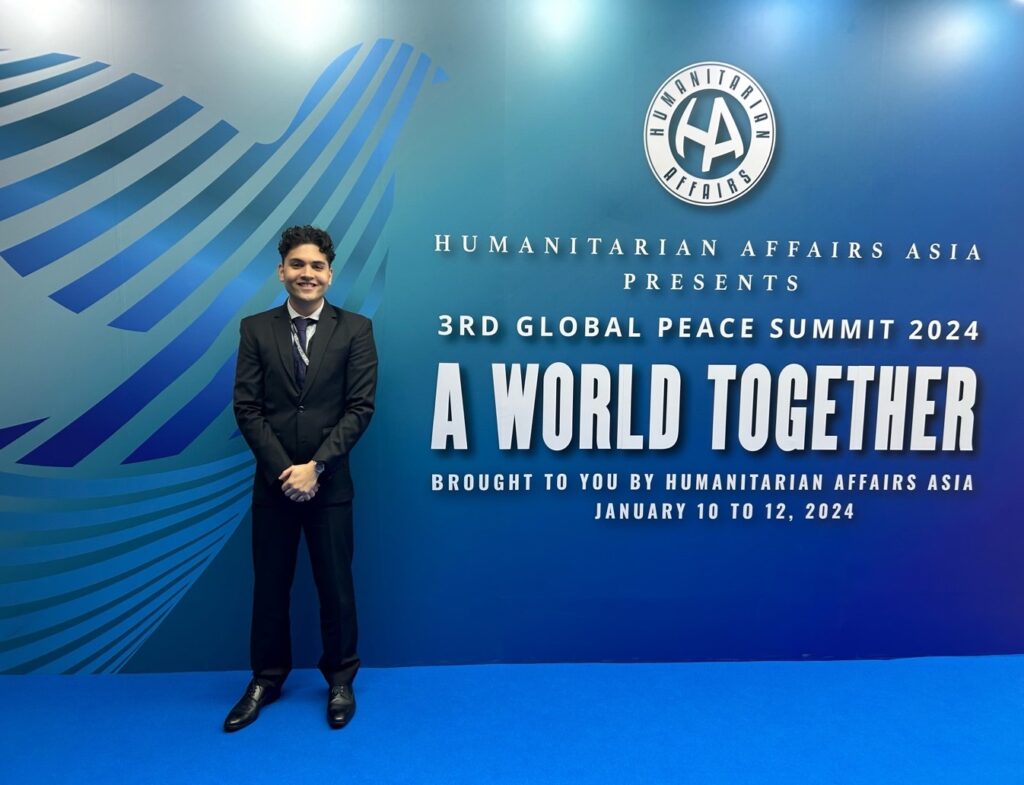
Photo at the entrance of the United Nations Building at Bangkok (Source: Author's own)
This article was written by third-year Political Science Student, Ethan Naidu, representing the Faculty at the 3rd Global Peace Summit, jointly supported by FASS and the Political Science Department.
Meaning of Success for SG Women and Female Students of Higher Education Institutions...
IN BRIEF | 4 min read
- A column for Suria News Online by Siti Maryana Siful Bahri, a final-year student majoring in Political Science, with a minor in Public Health.
Click through image below to read this piece.
This article first appeared in Suria News Online and on NUSNews on 9 March 2024.
FASS Remembers Former Dean Professor Emeritus Dato’ Dr K.J. Ratnam
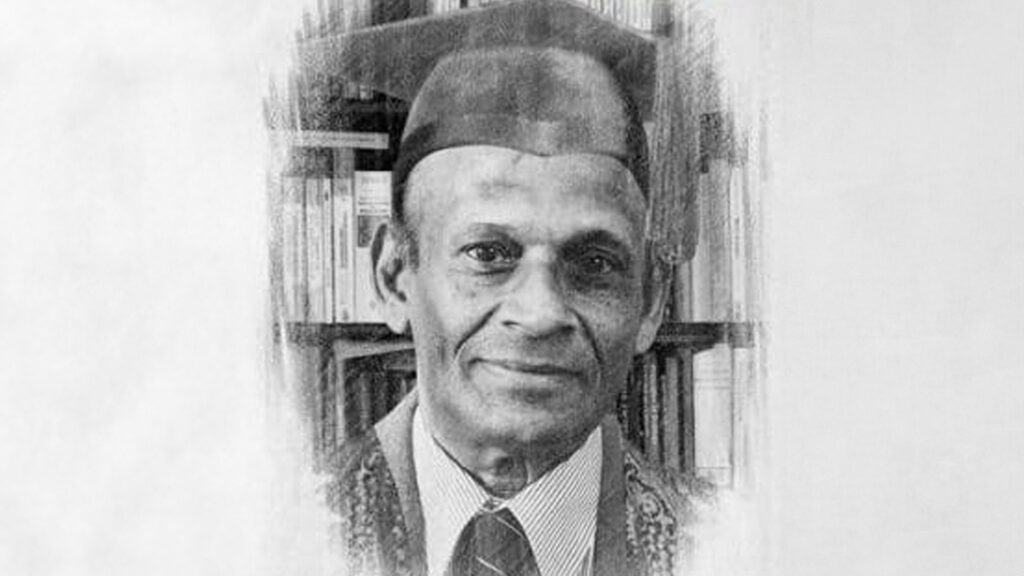
Former Dean and Head of Political Science, Professor Emeritus Dato' Dr K.J. Ratnam, passed away on 10 March 2024.
A prominent political scientist specialising in Malaysian politics and race relations, Prof Ratnam was the youngest professor in his generation. He served as a key member of the Department of Political Science at the University of Malaya in Singapore when it was first established in 1961 and became Head in 1965.
Prof Ratnam also served as the Dean of the Faculty of Social Sciences at the University of Singapore from 1966 to 1969.
"Prof Ratnam was a key contributor to the foundation of political science in Singapore, having been intricately involved in the setting up of the department in the University of Singapore. During his tenure, he also taught a generation of social science students, one of whom is Ambassador Chan Heng Chee, who holds cherished memories of him." said NUS Faculty of Arts and Social Sciences Dean, Professor Lionel Wee.
In 1970, he joined the Universiti Sains Malaysia as the Foundation Dean of the School of Comparative Sciences. Throughout his career, Prof Ratnam held various roles, including Founder and Director of the Centre for Policy Research (CPR). The CPR led pioneering social scientific research and offered policy recommendations to the Malaysian government on various critical issues, spanning from poverty reduction to ethnic relations.
In recognition of his contributions, he was honoured by Universiti Sains Malaysia with the title of Professor Emeritus in 1993.
In January 2003, he assumed the prestigious Tuanku Chancellor Chair of Science and Technology Policy and Development at the Universiti Sains Malaysia.
NUS Political Science hosts Indonesian delegation for Information Session
On the 5th of February, 2024, the Department of Political Science at the National University of Singapore (NUS), alongside the Political Science Society of NUS (PSSOC), invited a delegation comprising over 130 students and educators from SMA Sabilillah Malang School, Indonesia. The prestigious boarding high school's visit was part of a broader initiative to promote international academic exchange and dialogue, reflecting a commitment to fostering a profound community of learners and thinkers.

Associate Professor Bilveer Singh, Deputy Head of the NUS Political Science Department, delivering his opening address.
The event commenced with insightful opening addresses from Associate Professor Bilveer Singh, Deputy Head of the NUS Political Science Department; Ibu Fatimatus Syifa', Guru SMA Sabilillah Malang; and Ethan Naidu, the President of PSSOC. These addresses not only welcomed the visiting delegation but also underscored the significance of such international engagements in promoting mutual understanding and cooperation across borders.

Token of Appreciation Presentation.
A central feature of the visit was the detailed information session led by Professor Singh, who outlined the scope and structure of Political Science as a field of study at NUS. He elaborated on the curriculum offered by the College of Humanities and Sciences (CHS), highlighting the diverse opportunities available to students pursuing Political Science. The interactive question-and-answer segment provided the Indonesian students with a nuanced understanding of the academic rigour and interdisciplinary approach that defines the Political Science programme at NUS.
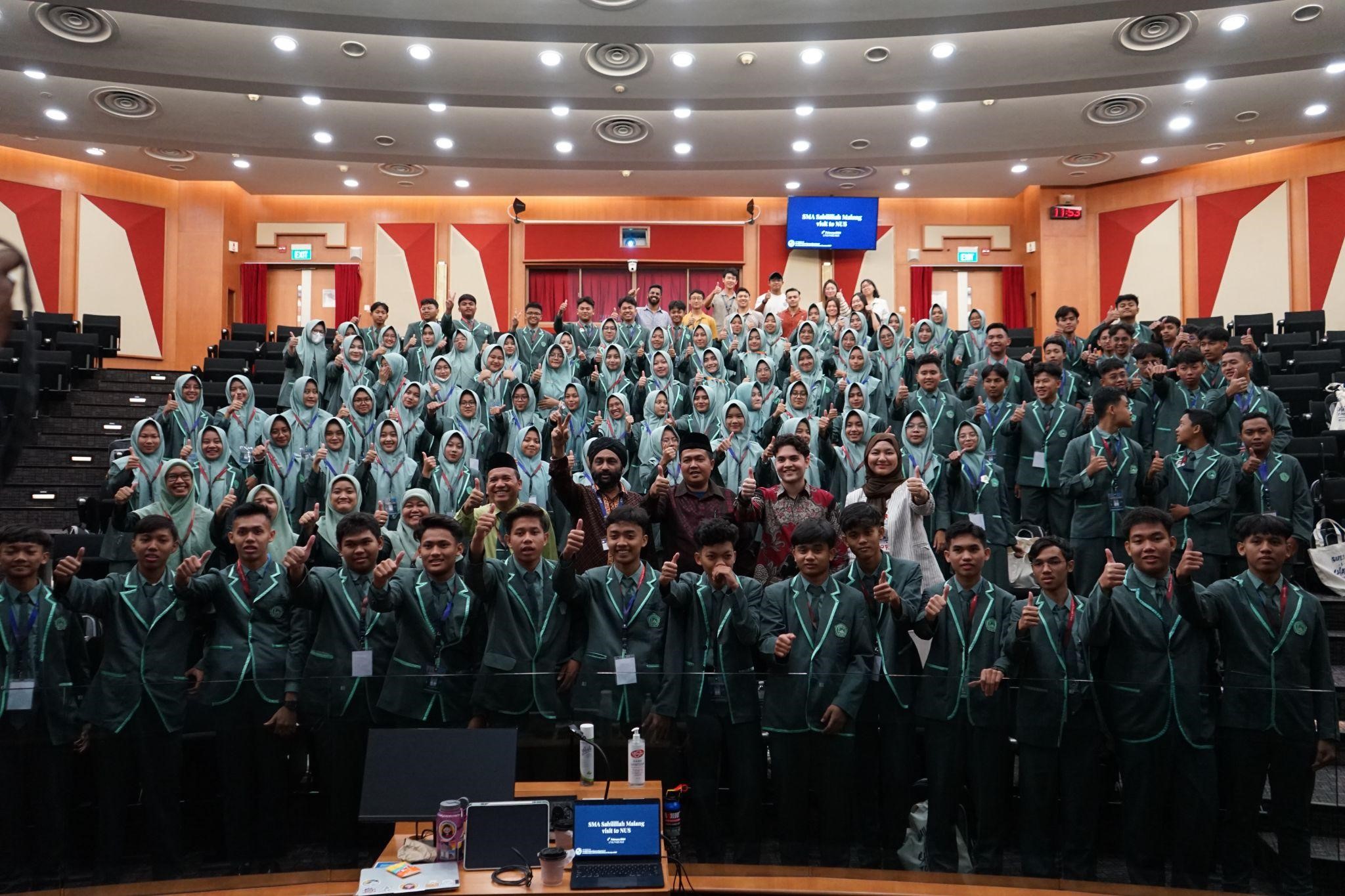
Large delegation photo of SMA Sabilillah Malang with NUS Political Science.
Following the information session, the delegation embarked on a tour of the NUS campus, splitting into smaller groups to explore various facilities and engage in discussions with PSSOC members. These interactions allowed the students from SMA Sabilillah Malang to share their perspectives and learn from their Singaporean counterparts, fostering a rich cultural and intellectual exchange. The importance of such exchanges was evident, as they not only broaden students' horizons but also contribute to a deeper appreciation of diverse worldviews and the complexities of global issues.
This visit is a testament to PSSOC's ongoing dedication to international exchange, an ethos that has previously led the organisation to engage in various cross-cultural initiatives. Notably, in 2022, PSSOC members visited Jakarta, participating in cultural exchanges at HIMAHI University and Universitas Indonesia (UI) and attending a foreign policy summit (FPCI Chapter UI). Furthermore, in August 2023, PSSOC welcomed a delegation from the University of Tokyo's Multilateral Interaction with Students (MIS), facilitating dialogues on pressing issues and sharing diverse cultural perspectives.
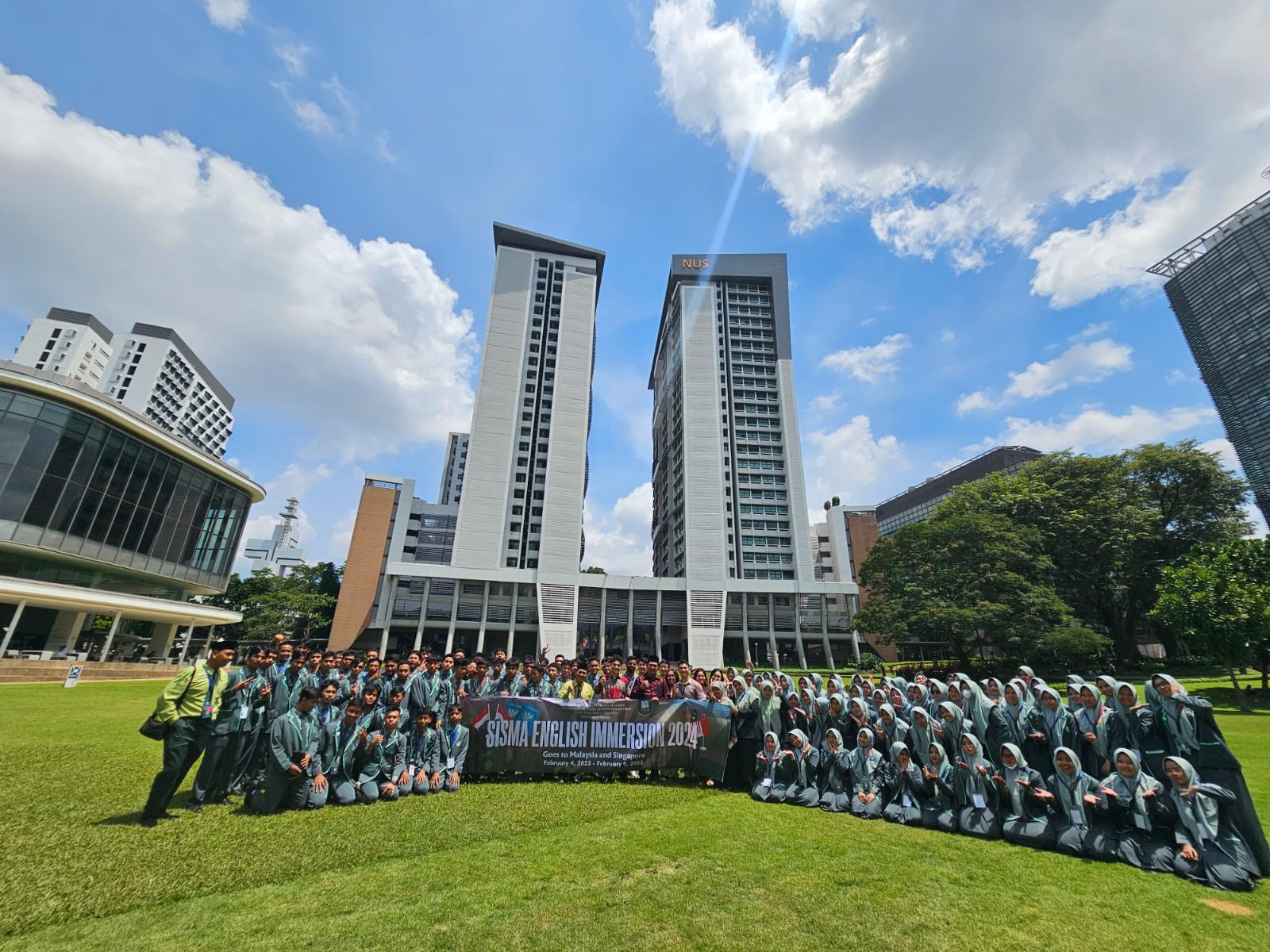
Large delegation photo at Town Green, NUS University Town.
The day concluded at University Town, wrapping up an eventful visit that underscored the mutual benefits of international academic exchanges. As the SMA Sabilillah Malang delegation departed, both the NUS Political Science Department and PSSOC expressed their hope for ongoing collaboration and future engagements. This aspiration for continued interaction highlights a recognition of the critical role such exchanges play in not only enhancing educational experiences but also in contributing to the development of informed, globally aware citizens.
This article was written by the Political Science Society of NUS (PSSOC).
The Political Science Society of NUS (PSSOC)’s Singapore Foreign Policy Dialogue II with Mr Bilahari Kausikan on 3rd November 2023

International relations have seen several points of crisis in the 2020s. The decade began with escalating tensions between the US and China, which was soon followed by Russia's encroachment into Ukraine and most recently, the conflict in the Gaza strip.
This was the crux of the discussions at the second iteration of the Singapore Foreign Policy dialogue organised by the Political Science Society of NUS (PSSOC), in conjunction with the NUS Political Science Department. Held at LT8 in the Faculty of Arts and Social Sciences (FASS), over 300 participants from post-secondary institutions convened to learn about the nuances and intricacies of Singapore's foreign policy from Mr Bilahari Kausikan, Chairman of the Middle East Institute at NUS, and former Ambassador-At-Large and Permanent Secretary in the Ministry of Foreign Affairs.
The session, chaired and moderated by Associate Professor Bilveer Singh, Deputy Head of the NUS Political Science Department was valuable in raising awareness and understanding about Singapore's foreign policies and how it considers its position in relation and response to ongoing political crises. It also provided participants with invaluable insights into the climate of contemporary international relations and Singapore's position in the global arena.
Overall, the dialogue achieved its intended purpose of shedding light on Singapore's position on the latest developments in foreign affairs. It allowed for a deeper understanding of the history and complexities of ongoing political crises like the Russia-Ukraine and the Israel-Hamas wars, as well as many factors that influence our views and responses to such situations.
The session also reaffirmed the importance of preserving social cohesion in Singapore and reiterated a principled stance on opposing terrorism and preventing the deepening of social rifts.
 Over 300 participants from post-secondary institutions gathered to discuss several key events in contemporary international relations.
Over 300 participants from post-secondary institutions gathered to discuss several key events in contemporary international relations.
Participants benefited immensely from the open discussions, gathering a plethora of information and unique viewpoints about Singapore's foreign policy and beyond. The event was also a testament to the growing political awareness of today's youth, evident in their active participation over the course of the dialogue.
The Organising Committee of Singapore Foreign Policy Dialogue II extends its gratitude to the NUS Political Science Department and the FASS Strategic Communications Team for their valued support towards the event's success. PSSOC also thanks all participants who graced the dialogue with their presence and intends to continue engaging students with similar events in the near future.
This article was written by the Political Science Society of NUS (PSSOC). As Chatham House Rules were invoked and observed throughout the event, the organisers are unable to share in detail the discussion points covered during the dialogue.
Elections and Youth
IN BRIEF | 10 min read
- A column in Lianhe Zaobao by Chen Zhan Tian, an undergraduate student from NUS Political Science and NUS Chinese Studies.
Click through image below to read this piece.
This article first appeared in Lianhe Zaobao and on NUSNews on 30 January 2024.
Southeast Asia’s Path in an Age of Limited US Leadership
IN BRIEF | 10 min read
- Op-Ed on CNA Online by Associate Professor Chong Ja Ian from NUS Political Science.
Click through image below to read this piece.
This article first appeared on CNA Online and NUSNews on 19 December 2023.
Civil society collective action under authoritarianism: divergent collaborative equilibriums for political reform in Malaysia and Singapore
SG Cares Giving Week is commemorated from 1 to 7 Dec every year, encouraging businesses and non-profit organisations to celebrate their volunteering and philanthropy efforts. Civil society organisations, or CSOs, play a key role in promoting political reforms, notably, in autocracies. Assistant Professor Elvin Ong and Syazwi Bin Rahmad (both NUS Political Science) explore the impact of civil society collective action in Malaysia and Singapore in ‘Civil society collective action under authoritarianism: divergent collaborative equilibriums for political reform in Malaysia and Singapore’ (Democratization, 2023). Ong and Rahmad argue that when civil society organizations act collectively to campaign for causes, there is a high likelihood of success in producing political changes by pressuring the incumbent autocrat to enforce liberalising reforms or to prevent democratic backsliding. However, the degree of success from these efforts depends largely on the level of public interest and support towards these causes. Strong support from the public results in high demand for collective action, thus motivating CSO leaders to work together in high-profile settings, generating even more public interest. Strong networks and relationships between CSO leaders lead to a positive collaborative equilibrium and effective platforms for political change. Conversely, poor public support for CSO initiatives result in a negative collaborative equilibrium. The authors demonstrate this relationship through a study of CSOs in Malaysia and Singapore, where they conducted interviews with civil society activists and analysed public opinion data from the Asian Barometer and the World Values Survey. From this research, the authors find that the success of collective action efforts in the two countries varies substantially. In Malaysia, collective action has been instrumental in producing political reforms, suggesting a positive collaborative equilibrium. CSO alliances have actively advocated for political changes, as seen from the partnership between Bersih and the Malaysian Bar Council, and the “Gerakan Mansuhkan ISA” (GMI) alliance. However, similar efforts in Singapore have been less successful, suggesting a negative collaborative equilibrium. The collective action efforts have mainly been directed at increasing public awareness and little effect has been made in terms of influencing political reforms. The authors explain how the different collaborative equilibriums are shown in the different responses seen in each country towards the Asian Financial Crisis in the 1990s. The discrepancy in public support explains the difference in collaborative equilibriums, lending support to the authors’ main argument. The article suggests that not only are improved measures of public interest and support for political reform issues needed, but also that further research towards studying the forces that drive public interest and support is strongly warranted. Read the article here: https://www.tandfonline.com/doi/full/10.1080/13510347.2023.2223142

Student Busy with Assignments at NUS as if Hit by ‘Tsunami’
IN BRIEF | 8 min read
- A column piece by Syed Muhammad Firdaus, a final-year student at NUS Political Science, in Berita Harian (7 November 2023, page 11)..
Click through image below to read this piece.
This article first appeared on Berita Harian and in NUSNews on 7 November 2023.
NUS Students Step Up as Community Link Befrienders to Support Disadvantaged Families
IN BRIEF | 8 min read
- The GEN2070 ComLink Befrienders service-learning course is offered in partnership with Ministry of Social and Family Development (MSF), as part of the Communities and Engagement Pillar of the NUS General Education curriculum. To-date, NUS students form the largest group of volunteer befrienders from any organisation. In future, the University aims to grow this volunteer pool to 1,000 students every year, providing more opportunity for experiential learning through impactful work that positively influences the community.

When times are tough, a trusted friend by your side becomes a source of strength to help you persevere, overcome adversity or give you hope. For some disadvantaged families in Singapore, these friends are NUS students who opted to take up a year-long service-learning course – GEN2070 Community Link (ComLink) Befrienders, which supports a nationwide initiative to uplift families with young children staying in rental flats, and empower these families to realise their aspirations.
Students Nityasree D/O Rajendran, Ng Wesley and Darren Chua Han Yong are among the 430 NUS students who have been trained and matched with ComLink families since the course was piloted in Academic Year 2022/2023. They shared their experiences of building meaningful relationships with their assigned families, understanding the families’ needs and aspirations and partnering with the families on their journey towards social mobility.
Nityasree D/O Rajendran (Nitya): Inspiring Young Minds
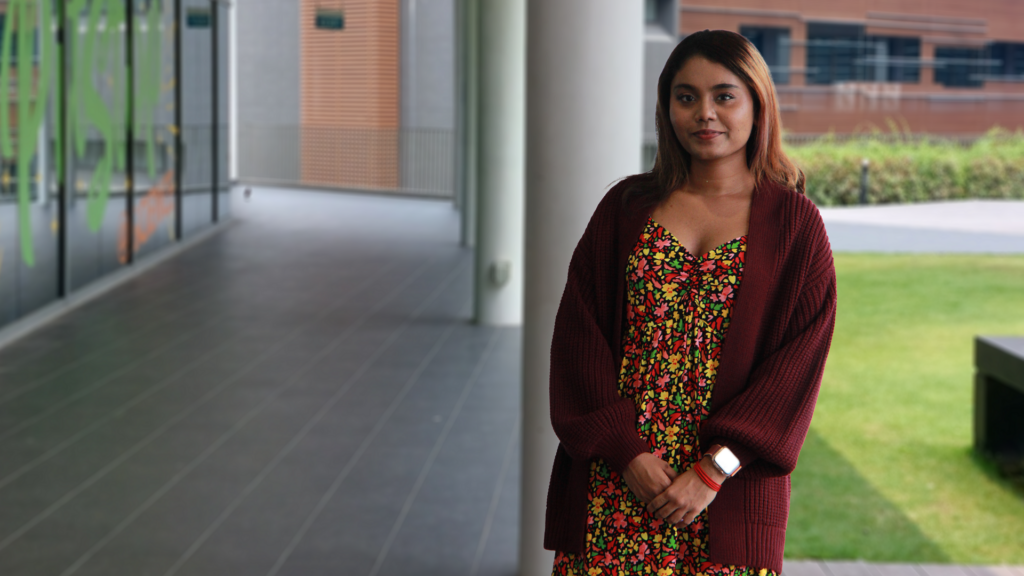
Every fortnight, Nitya, a Year 3 undergraduate student at NUS Business School, together with another befriender Shawn, meet 12-year-old E (pseudonym) at the void deck of E’s rental flat to tutor her in preparation for the upcoming Primary School Leaving Examination.
“We have our tutoring sessions at the void deck, which is more conducive, away from the busyness of the house which E shares with her mother and four older siblings. We typically do homework and assessment papers but sometimes we also do art jamming sessions to inject some fun and bond with E,” said Nitya, whose newfound joy is learning art techniques that she can then teach E.
With continuous encouragement over these sessions, Nitya witnessed as E demonstrated a growing interest in her studies. Now E is attentive in school and motivated to progress on to secondary school where she wants to continue doing sports and arts.
E is not the only family member the befrienders have touched. They have also assisted E’s mother, who has been unemployed, in her job search so that she can better support her family. With the help of Nitya and Shawn, E’s mother was able to polish up her resume and already has an interview lined up for a customer service job.
Having done many community projects in the past, Nitya found this particular experience especially rewarding and eye-opening. “I learnt that every child and situation is unique, so what works for me may not work for them. Instead of imposing my own solutions, I learnt to be open to their ideas first, then provide my thoughts and motivate them along the way. I’ve also seen firsthand how a little empathy and care can motivate someone to improve their circumstances. I guess sometimes all they need is to know that someone cares,” said Nitya.
Ng Wesley: Helping Families Achieve Their Dreams
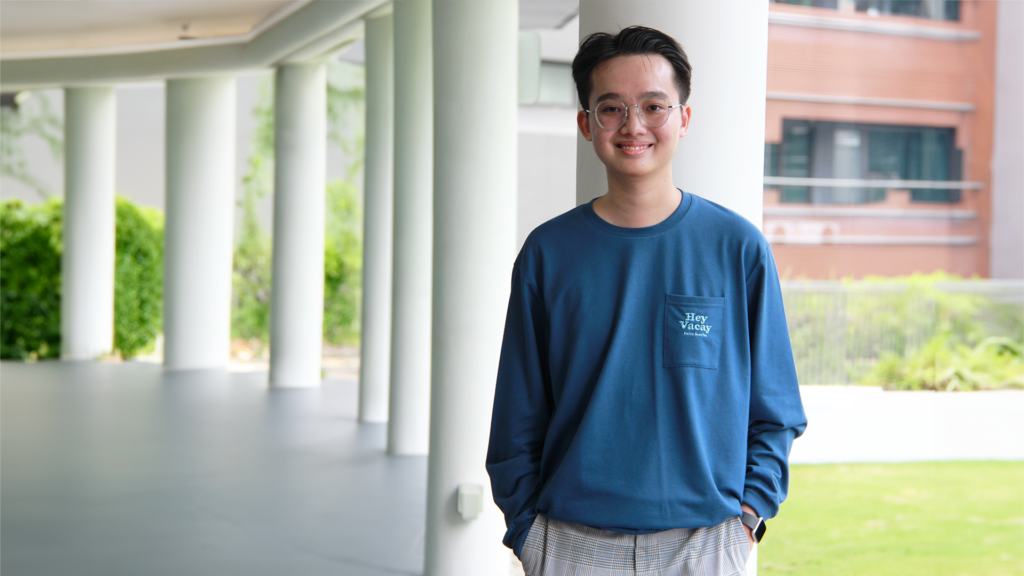
To Wesley, a Year 3 undergraduate student at NUS Faculty of Arts and Social Sciences, the ComLink Befrienders course is a wonderful way to do something meaningful in the community and find respite from the hustle and bustle of school life.
“I’ve always been passionate about causes that support the vulnerable in our community and what I like about this course is that we interact with the same families throughout our service-learning journey. I think it is important because it allows us to really understand the family’s unique circumstances, and see trade-offs through their eyes. We get to navigate real-world complexities alongside them,” said Wesley.
One of the families Wesley befriends aspires to own a flat one day. This dream had to take a backseat when the father suffered a stroke. As a result, his doctor has currently deemed him medically unfit to resume his job as a private-hire driver, putting significant strain on the family’s finances. Determined to do what he can for his family, the father has approached Wesley and his ComLink supervisor about finding suitable employment during his recovery.
“Even though he is struggling with the side-effects of his medication, it is heartwarming to see his determination to contribute to the family’s finances so that they can realise their dream of owning a home someday soon. He also takes such a keen interest in his children’s education, and they are doing very well in school,” said Wesley.
Not only has his befriending experience been emotionally and mentally rewarding, it has also helped the Political Science major in his coursework. “This semester I’m taking a course called Singapore Politics in Comparative Perspective and one of the assignments is to write a policy proposal on a contemporary Singapore policy issue, including issues relating to Singapore’s social service landscape. So, I’m able to directly apply what I have learnt to better shape my policy proposal,” he shared.
While he will be embarking on an overseas exchange next semester, Wesley looks forward to continuing the journey he started with these families once he is back.
Darren Chua Han Yong: In it for the Long-Haul
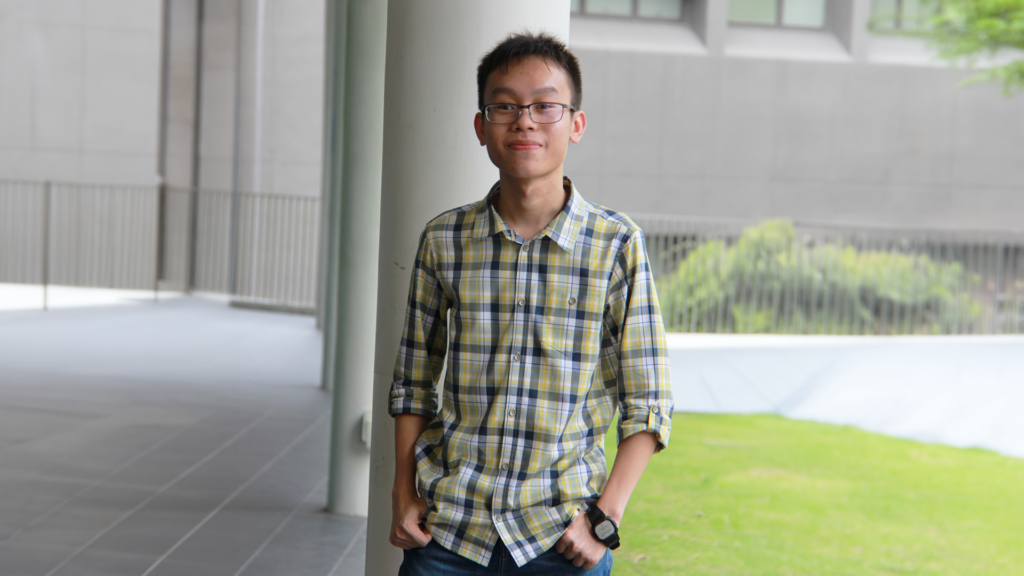
A Year 4 undergraduate student from NUS School of Computing, Darren believes that every child deserves a safe and nurturing environment to grow up in. Being able to make a direct and tangible difference in the circumstances of the families and their children is what got him interested in the ComLink Befrienders course.
“Not every volunteer opportunity allows you to work directly with the families,” he shared. “Through this course, we work with the families to come up with realistic action plans that support the families’ goals. For example, another befriender and I are involved in supporting two families take off their home-based food businesses. We created their business logos, designed promotional material and managed their social media accounts. We also meet often to sample their food and plan how to procure ingredients with the vouchers they are given. In October, the families participated in an event to promote some of their dishes. If the businesses successfully take off, it will be a huge step toward the families becoming self-reliant”.
Darren has befriended four families to-date under ComLink. While nurturing these relationships and joining group outings with ComLink families often take up his weekends or evenings, he enjoys the process, especially because he is doing it with two other friends. “It is nice that we still get to hang out with each other and do good at the same time,” he said. When Darren feels pressed for time juggling school work, co-curricular activities and volunteering, he reminds himself why he chose to become a befriender. Seeing the joy on children’s faces when they get to try McDonalds for the first time – a simple meal some may take for granted – or visit places like Sentosa motivates him to keep going.
The experience has also been enriching in ways he didn’t expect. Darren has learned to appreciate and respect cultural nuances that influence or shape people’s behavior and perspectives. He also has a deeper understanding of the various government support systems available – knowledge that will be invaluable as he continues his journey as a public ComLink befriender after he wraps up the course this year.
Making a Positive Impact through Experiential LearningThe GEN2070 ComLink Befrienders service-learning course is offered in partnership with Ministry of Social and Family Development (MSF), as part of the Communities and Engagement Pillar of the NUS General Education curriculum.
“What sets GEN2070 apart is that our students undergo training and reflective learning, on top of training conducted by MSF or a Social Service Officer. This helps to instill skills and values such as empathetic communication, civic consciousness as they embark on their befriending journey.
Our course tutors have also developed additional tools that students can use – for example activities such as Read Aloud and Draw and Count to guide them in helping children prepare for primary school; and we work closely with them to plan excursions with the families to interesting places. Through this, we hope to stimulate community action and do our part to strengthen the resilience for our nation,” said Pamela Yeh, Course Lead (Communities and Engagement), Department of Social Work at NUS Faculty of Arts and Social Sciences.
To-date, NUS students form the largest group of volunteer befrienders from any organisation. In future, the University aims to grow this volunteer pool to 1,000 students every year, providing more opportunity for experiential learning through impactful work that positively influences the community.
To watch the GEN2070 course trailer, click here.
This story appeared in NUSNews on 3 November 2023.
Coming Together in a Whole-of-Society Approach to Address Singapore's Ageing Population Challenges
IN BRIEF | 5 min read
- The profiled alumna Ms Siti Adriana Muhamad Rasip is the co-founder of Empowered Families Initiative, which seeks to harness the strengths and abilities of low-income families by investing in their aspirations, and took home the top honours at the inaugural =Dreams Asia Breakthrough Prize Competition, a nationwide contest of ideas to eradicate poverty.
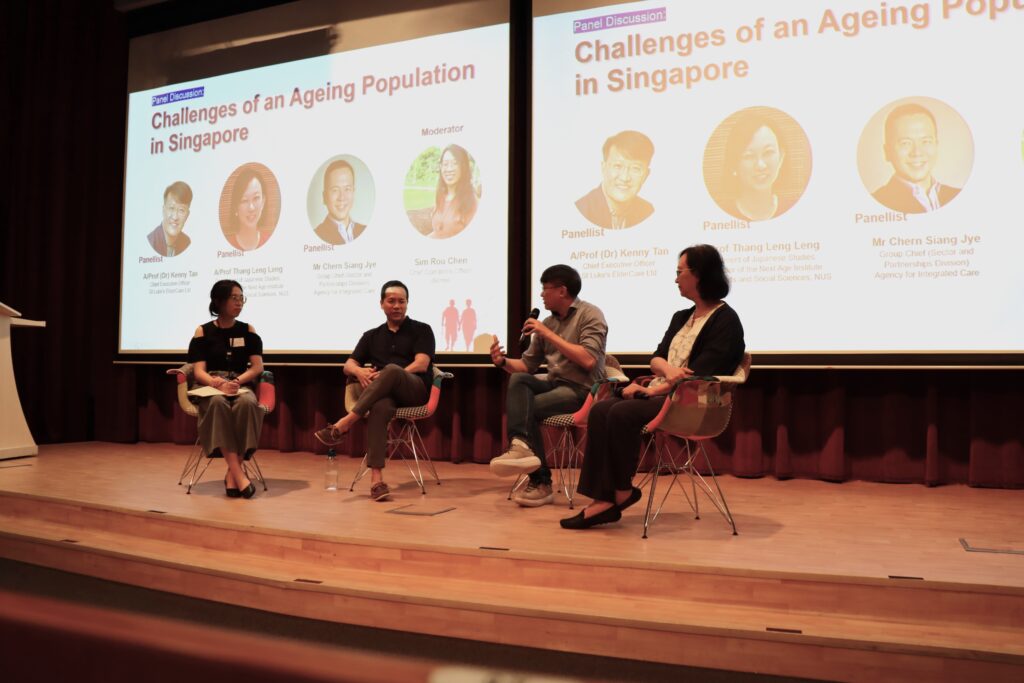
How can the whole of society be mobilised to tackle the challenges of an ageing population in Singapore? As the Singapore population demographic greys progressively, this question was at the centre of discussion at the annual symposium of the NUS Chua Thian Poh Community Leadership Centre (CTPCLC).
Held on 30 September at NUS University Town, the symposium gathered more than 120 attendees consisting of NUS students, staff and alumni, as well as stakeholders from the public and social sectors. Now in its 11th iteration, the in-person event saw changemakers, community leaders, and thought leaders discussing the issue of 'Challenges of an Ageing Population in Singapore', and how different organisations and individuals are doing their part to tackle this challenge.
The event was graced by Guest-of-Honour Mr Tan Kiat How, Senior Minister of State for Ministry of Communications and Information and for National Development, and Adviser to East Coast GRC Grassroots Organisations.
Noting that Singapore is home to some of the world’s longest living persons, Mr Tan highlighted the importance of closing the gap between life span and health span, adding that this is where everyone has a role. Mr Tan also reflected on his experiences of encountering seniors forming social networks and actively volunteering in the community, to overcome social isolation.
Expressing his delight that the CTPCLC curriculum has offered undergraduates a path to support these initiatives with their research and involvement in the community, Mr Tan expressed that this would bode well for our community, as it takes an all-of-community approach to tackle the challenges of an ageing society like Singapore.
Holistic Approaches to AgeingAttendees at the symposium delved into a thought-provoking hour-long panel discussion elaborating on efforts and plans to address the challenges of the ageing population in Singapore. Moderated by CTPCLC alumna Ms Sim Rou Chen, Chief Operating Officer of WeHiro, panellists Mr Chern Siang Jye, Group Chief, Sector and Partnerships Division, Agency for Integrated Care; Associate Professor (Dr) Kenny Tan, Chief Executive Officer of St Luke's ElderCare Ltd; and Associate Professor Thang Leng Leng from the NUS Japanese Studies and Co-Director of the Next Age Institute, NUS Faculty of Arts and Social Sciences), exchanged stories, insights, and recommendations on effectively addressing the challenges posed by an ageing population.
The discussion explored topics such as healthcare management, social support systems, and policy interventions, all designed to address key challenges faced by the elderly in our community. Assoc Prof (Dr) Kenny Tan captured the challenges succinctly in three words: helplessness, loneliness and boredom.
These thoughts were also echoed by Assoc Prof Thang Leng Leng, who spoke about loneliness and social isolation, even for elderly parents who may be living with their children, when conversations within the home could be limited to routine check-ins such as “Have you taken your medicine today?”
The discussion underscored the real need for elderly among the community to be actively engaged – and that the community can play a part through raising awareness of the former’s needs and supporting befrienders’ programmes, in ensuring that seniors can age amidst a strong social support network.
From Engagement to EffortSince its establishment in 2011, CTPCLC has continually challenged and empowered its students to explore the many facets of Singapore society and consider solutions to alleviate and address societal issues. CTPCLC students’ thoughtful analyses and implementations were showcased at the symposium through presentations, demonstrations and poster displays.

CTPCLC students and project partners Charmaine Song (Business, Year 4) and Tong Hui Yi (Social Work and Sociology, Year 4) took to the stage to elaborate on a year-long project they had embarked on in partnership with Thye Hua Kwan Moral Charities Limited.
During their project, which was titled ‘Reimagining the Active Ageing Centres (AACs) of Thye Hua Kwan’, Charmaine and Hui Yi interacted with seniors who were service users at Active Ageing Centres (AACs) in Ang Mo Kio. From the conversations, they gathered the seniors’ various opinions and hopes on how the AAC could further develop to serve Singapore’s ageing population.
Adopting a mixed methods approach that incorporated the use of observation work, semi-structured interviews, focus group discussions and online surveys, their study revealed that future AACs can play a vital role in serving as important sources of social, cultural and spatial capital for seniors: AACs provide social capital through important networks and social support among seniors; cultural capital by being a hub for acquiring new knowledge that will empower them; and spatial capital by being a potential ‘home away from home’, enabling seniors’ access to additional spaces of emotional and physical comfort.
The study also put forth key recommendations that highlighted how AACs can be further developed as a space for intergenerational communal socialisation, while serving as a rallying site for proactive seniors to engage in community-related volunteerism.

Beyond talks and discussions, attendees at the symposium also engaged with passionate CTPCLC alumni and students at a series of live demonstrations and poster displays detailing their various engagements with the community.
Amongst these was a demonstration by CTPCLC alumnus Mr Willoughby Niki Lee (College of Design and Engineering, Class of 2022) of his brainchild BoomBox - AI-based gamified activities innovated to help in seniors’ wellbeing, inspired by his love for the community and his engineering knowledge.

Ms Sim Rou Chen (Social Work and Psychology '22) also led an ageing simulation demonstration which allowed participants to experience what ageing could feel like, through the use of props and equipment like goggles, walking sticks and sandbags which hinder physical movement. Through this, participants developed a greater understanding and empathy of the physical, and thereafter, social and emotional, encounters and challenges that seniors could be facing in their daily lives.
Celebrating Tomorrow’s ChangemakersA ceremony was also held at the symposium to honour the achievements of CTPCLC’s Class of 2023, acknowledging their completion of the community development and leadership programme in NUS and celebrating their achievements in driving positive change within communities in Singapore.

“The Symposium has come at an opportune time as I begin my career in the community care sector,” said CTPCLC alumni Mr Kho Yong Xiang (Communications and New Media '23).
“CPTCLC has once again proven to be an invaluable platform for addressing the priorities of today. I heard peers discussing their ground-up research as well as connecting with partners and experts in the eldercare space. I am thankful for my time at the Centre and hope for more students to embrace the opportunities offered by CTPCLC,“ he added.
Beyond academics, the annual CTPCLC symposium provides a platform for like-minded individuals to share knowledge, foster collaboration, and inspire future leaders to address pressing community issues, making a difference to those around them. From their first tentative steps of taking courses at CTPCLC, the symposium also documents how students have been empowered to develop themselves further into passionate community builders and future leaders.
“In addition to the good work our alumni and students are doing in the community, it is really heartening that they continue to engage the Centre at an event like this one,” said Associate Professor Chng Huang Hoon, Director of CTPCLC. “I feel very proud to have been a part of their wonderful journey."
This story by NUS Chua Thian Poh Community Leadership Centre first appeared in NUSNews on 16 October 2023.
Going Beyond Basic Needs
IN BRIEF | 5 min read
- The profiled alumna Ms Siti Adriana Muhamad Rasip is the co-founder of Empowered Families Initiative, which seeks to harness the strengths and abilities of low-income families by investing in their aspirations, and took home the top honours at the inaugural =Dreams Asia Breakthrough Prize Competition, a nationwide contest of ideas to eradicate poverty.
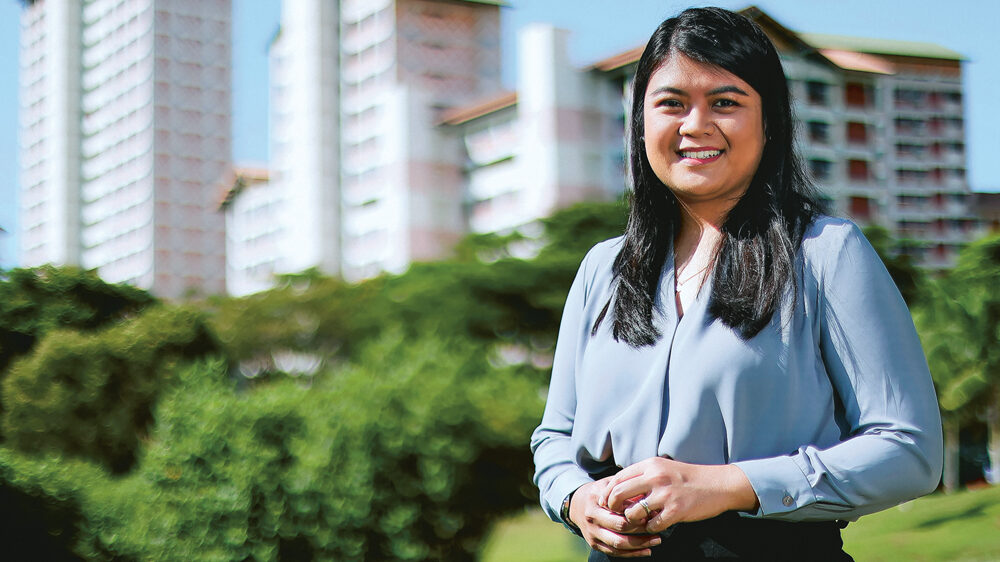
If you ever needed affirmation that internships can be life-changing, just listen to the experience of Ms Siti Adriana Muhamad Rasip. “I enrolled into my degree with the goal of becoming a policymaker. But an internship changed that,” recalls the Political Science major, now 30. The internship in question? A three-month stint at the Ministry of Social and Family Development’s Social Service Office @ Tampines, which opened her eyes to the challenges faced by low-income families in Singapore. “I was pretty ignorant before the internship started and had many misconceptions about these families and their hardships,” she adds.
But interacting with them helped Ms Adriana see their plight in a new light. Today, she is the co-founder of Empowered Families Initiative (EFI), which invests in the aspirations of low-income communities. “Our movement calls for society to help vulnerable families thrive, instead of just survive,” she sums up. This reframing of the way we think about poverty has attracted attention from the philanthropy community. In May, a panel of judges — comprising philanthropists, academics, social entrepreneurs and policymakers — crowned EFI as the winner of the inaugural =Dreams Asia Breakthrough Prize Competition. This competition offered a grand prize of $500,000 for innovative solutions to eradicate poverty in Singapore.
POVERTY IN SINGAPORE
Public rental flats, which are synonymous with vulnerable families, are not uncommon in Singapore. At the start of the decade, some 52,000 households lived in such flats, according to estimates by the Ministry of National Development.
Efforts to uplift these communities include the Fresh Start Housing Scheme, which helps families with young children — who have previously received one housing subsidy and are currently living in public rental flats — own a 2-room Flexi flat or 3-room flat.
More than 700 households who lived in public rental flats bought homes in 2022, with some tapping the scheme.
Source: The Straits Times Over the past 10 years, more than 7,800 rental households have bought homes, while another 2,300 households have booked units and are waiting for them to be completed.
Source: The Straits Times
EFI’s pitch is based on a simple premise: the most effective way to lift people out of poverty is by empowering families. “Social assistance in Singapore can sometimes feel reactive and designed to cover just basic needs. In such a system, families would always be ‘in need’ — they would only survive and not thrive,” she explains, adding that support measures often do not sufficiently take into account unique circumstances and challenges.
Her conversations with low-income families, which began during her time at NUS, cemented her beliefs. “A group of us — social service practitioners, and families who have lived through poverty — came together to start EFI,” she shares. In her view, the premise of EFI is that low-income communities are not just made up of people who are in need and helpless. “Many of them are creative and, for instance, want to start home-based businesses to uplift their families,” she says. “But often, the support they receive only covers their basic needs and doesn’t support these aspirations, which means these dreams get shelved.”
EFI hopes to help these families dust off their long-held dreams, which can be related to employment, entrepreneurship, skills upgrading, savings and expansion of social capital. This is not an exhaustive list, adds Ms Adriana, saying that families are given a great deal of autonomy to chart their own course. “It’s important to remember that receiving social assistance should not stand in the way of affording these families dignity to make their own decisions,” she stresses.
Three to ThriveEFI comprises three aspects: funding for projects of up to $1,500, a savings matching scheme, and efforts to foster a community through regular meetings among participants. To Ms Adriana, each of these plays an equally vital role. She cites the positive experience of the first four families onboarded to the EFI programme in 2022. Two of the families that were running home-based businesses used the EFI grant to buy equipment and increase their sales. Another participant successfully saved $25,000 through the matched savings programme and opened a car-washing business. Yet another participant — a food delivery rider who used to make deliveries on a bicycle — used the grant to obtain a motorcycle licence. With this, he could make more food deliveries and earn a higher income. “All four also reported a higher level of social support from getting to know one another,” concludes Ms Adriana.
These results impressed the =Dreams Asia Breakthrough Prize Competition 2023 judges, who included Mr Han Fook Kwang, editor-at-large of The Straits Times. Explaining EFI’s win, he told the national broadsheet, “We looked for a solution which will make a difference to the poverty problem. The team must have a workable plan with a realistic budget to roll out over a three-year period. It has to be implementable by existing organisations and Singapore Family Service Centres, social enterprises and charities. Most of all, it has to be innovative… achieving results not attainable in the current scheme of things.”
Social assistance in Singapore can sometimes feel reactive and designed to cover just basic needs. In such a system, families would always be ‘in need’ — they would only survive and not thrive.
The win at the =Dreams Asia Breakthrough Prize Competition 2023 has fired up Ms Adriana and her team to take EFI to the next level. “We now want to adopt a ‘scale-up and scale-out’ strategy. Scaling up is about increasing the number of beneficiaries, while scaling out is to engage through this funding, possibly by giving the funding to social service agencies to pilot EFI within their own agencies. Implementing it together will allow the community practice to learn from each other along the way, which is a shift from how we do social assistance.”
But she will have to juggle EFI’s future with another major commitment: her Masters in Public Administration in Innovation, Public Policy and Public Value, which she is pursuing in London. “It’s definitely taxing,” admits Ms Adriana, who is back in Singapore to work on her thesis. “But I have a great team of co-founders who are just as passionate about making a difference. We would get on Zoom calls at all hours of the night to put together our proposal for the competition, so I’m certain that our passion will see us through.”
This story by the NUS Office of Alumni Relations (text by Keenan Pereira, photos by Wilson Pang) first appeared in The AlumNUS in October 2023.
2023 CHS Case Competition: Tackling Screen Dependency in the Age of Social Media
IN BRIEF | 5 min read
- Themed “Solutions for Tomorrow”, the third iteration of the competition saw 47 teams compete to devise the best solutions to screen dependency among Singaporean youth and adults. Conceptualised by the Dean’s Offices at the NUS Faculty of Science and NUS Faculty of Arts and Social Sciences (FASS), the competition’s unique features – an unlimited team size, the ability to change members during the competition and a Telegram group to facilitate team formations – were designed to simulate the way complex problems are tackled in the real world.
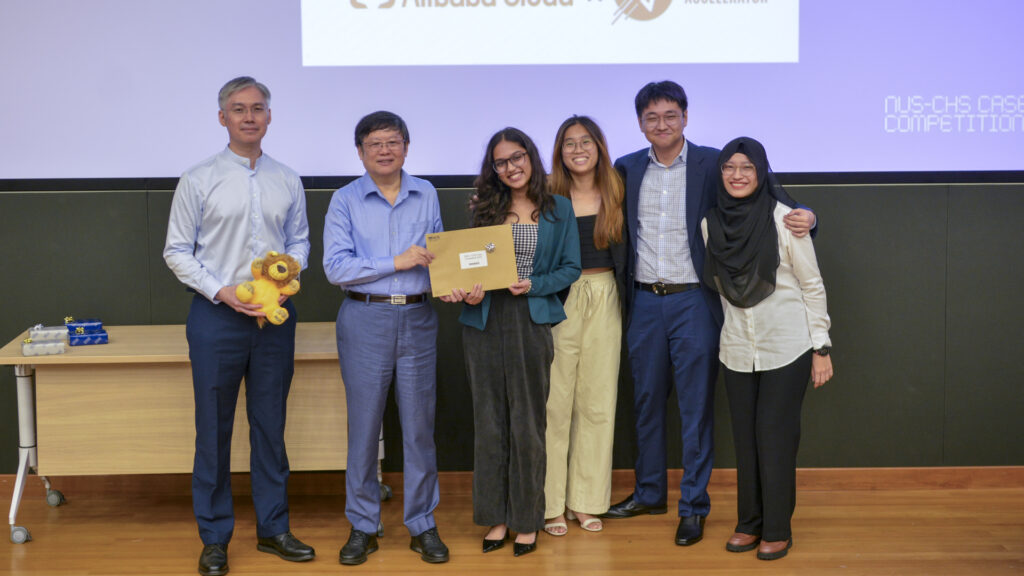
A national campaign to tackle screen dependency, a phone app that scrambles your other apps or an inbuilt phone setting that greys your screen when you spend too much time on social media – these were just some of the creative solutions proposed to counter the burgeoning social phenomenon of screen-related addictions at the recent NUS College of Humanities and Sciences Case Competition.
Themed “Solutions for Tomorrow”, the third iteration of the competition saw 47 teams compete to devise the best solutions to screen dependency among Singaporean youth and adults. Conceptualised by the Dean’s Offices at the NUS Faculty of Science and NUS Faculty of Arts and Social Sciences (FASS), the competition’s unique features – an unlimited team size, the ability to change members during the competition and a Telegram group to facilitate team formations – were designed to simulate the way complex problems are tackled in the real world.
“The CHS case competition is premised on the creation of innovative and workable solutions to complex real-world issues by drawing from the multidisciplinary expertise of team members,” CHS Co-Dean and Dean of the NUS Faculty of Science, Professor Sun Yeneng said. “This is an invaluable opportunity as students get to apply curriculum learning and adopt an interdisciplinary lens to problems, whilst also receiving mentoring and guidance from NUS faculty members and industry experts.”
Understanding the root of the problem
Screen dependency is becoming a worrying trend in recent times. Easy access to cyber technology over the last two decades has led to an unhealthy dependency on internet devices such as smartphones and computers. This was exacerbated by COVID-19 – the e-Conomy SEA 2020 report revealed that Singaporeans spend an average of 4.1 hours online daily, up from an average of 3.6 hours before the pandemic.
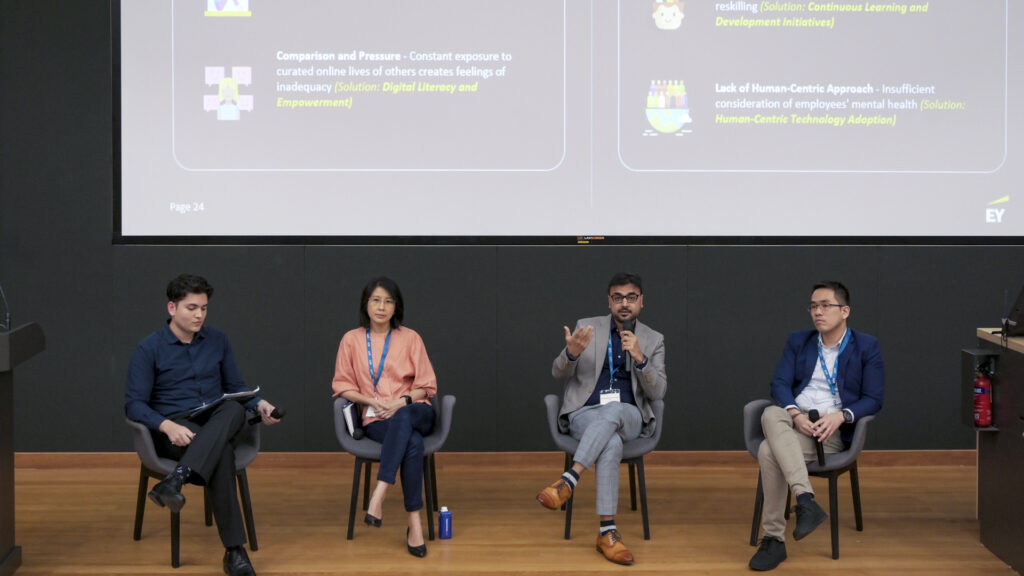
To give participants a deeper understanding of the problem they were tackling, a panel session on “Navigating the Digital Era – Technology Dependency” was organised at the launch event on 11 August, where business, technology and government representatives from EY and Infocomm Media Development Authority (IMDA) shared their insights on tech addiction and its impact on individuals, workplace demands to maintain productivity, and the lack of human-centric approaches to employees' mental health and wellbeing in technology adoption.
Teams were also mentored over two mid-term workshops delivered by faculty members from FASS and the NUS Centre for English Language Communication, who shared domain knowledge on digital dependency and provided guidance on communications and case writing skills.
Building on this foundational knowledge, the teams submitted essays offering potential solutions using a multitude of approaches including policy, technology and education, among others, and an impressive array of fun and out-of-the-box solutions resulted.
Panel judge and Head of NUS Business School’s Department of Management and Organisation Prof Sam Yam remarked, “It was a great event. The finalists all had innovative ideas to reduce social media addiction and the judges from the industries as well as academia were impressed. At the end, we chose three proposals that were innovative, practically feasible, and potentially scalable.”
Fun and feasible solutions for the win
Team Delulu won the top prize for their “Beta than Meta” campaign, an annual national campaign that comprises three phases: raising awareness of social media overuse, a detox challenge with friends and family, and incentives to stay away from screens in the form of recreational activities for campaign participants (sourced through partnerships with local small- and medium-sized enterprises). The campaign’s success leverages the psychological Theory of Planned Behaviour which assumes that individuals act rationally and according to their attitudes and subjective norms.
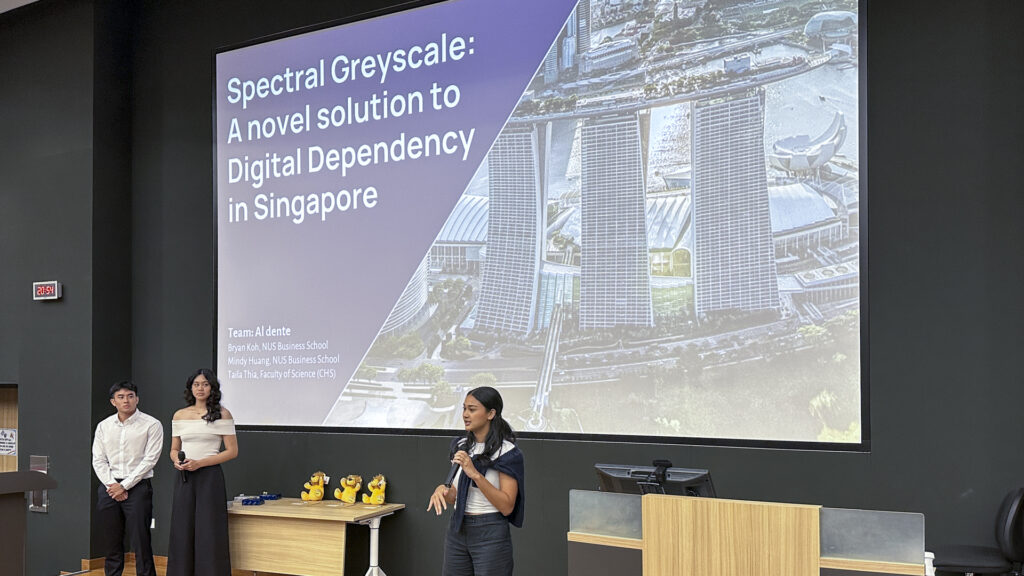
Second prize winner Team Al dente’s solution is “Spectral Greyscale” – an inbuilt phone setting that applies a monochromatic filter which mutes the visual experience for users after prolonged periods spent on social media and games, but rewards users for taking healthy breaks by restoring screens to full colour. The innovative, science-based solution was inspired by neuroscientific studies on the important influence of colour on capturing attention, prolonging attentive response and intensifying emotions compared to their monochromatic counterparts.
The third prize went to Team Apple Ecosystem whose “Scramble” mobile app allows users to personally define achievable targets on healthy screen times, scrambles the user’s apps on their screens when targets are exceeded, and offers in-app streaks and challenges as well as a forum for app users. The app is designed to encourage consistency in healthy screen behaviour while providing a support system for screen-dependent individuals.
The first, second and third cash prizes were worth S$1,500, S$1,000 and S$500 respectively. All finalist teams also received cloud computing credits and F&B vouchers from competition sponsors.
Associate Professor Nicholas Hon, FASS Vice Dean of External Relations and Student Life thanked all who participated. “We were overwhelmed by the response to the competition this year. It was created to promote an awareness of interdisciplinary thinking and interdisciplinary approaches to problem-solving. The fact that everyone who took part got a chance to practise this important skill means there are no losers in this competition.”
Tavisha Jain, Year 2 FASS Economics student, shared her team’s plans post-win, “Looking ahead, we are fully committed to taking the ‘Beta than Meta’ Campaign to the next level. Our objective is to make it a reality and transform it into a tangible initiative that nurtures a culture of digital well-being throughout Singapore.”
On her team’s biggest takeaway, she added, “This case competition has shown us that when a dedicated team comes together with a passion for change, remarkable things can happen. Witnessing the diverse ideas and approaches from other teams showcased the immense potential within our university community. We’ve learned the value of diverse perspectives and the significance of constructive feedback, which will undoubtedly fuel our future endeavours.”
This story first appeared in NUSnews on 9 October 2023.
NUS Esports Sweeps Up Medals Across All Games at the Inter-Varsity Games Festival 2023
IN BRIEF | 5 min read
- E-sports athletes and their supporters gathered at the e-sports wall at The Terrace @ COM3 to catch the exciting grand finals of the VALORANT match.
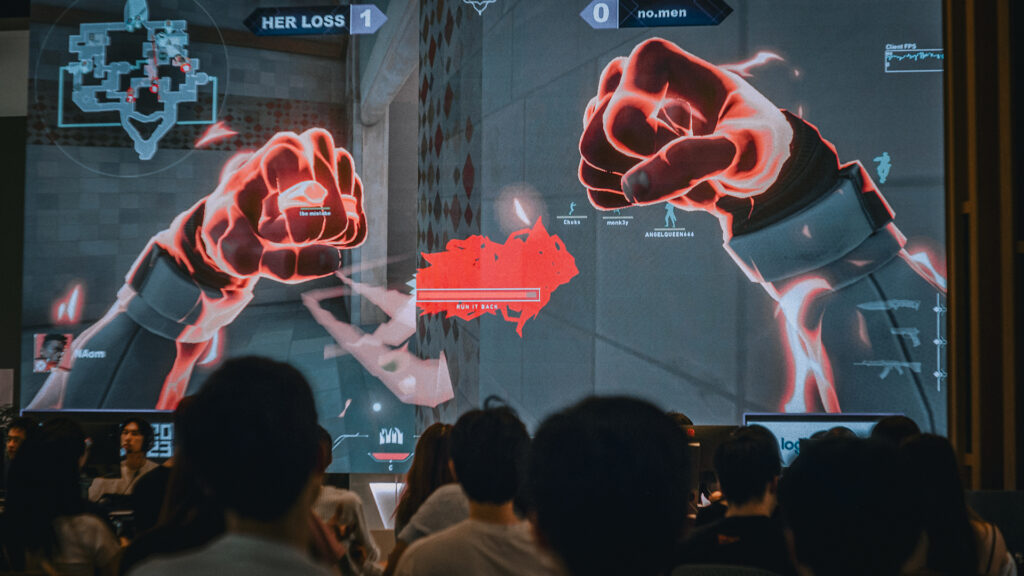
At this year’s Inter-Varsity Games Festival (IVGF), NUS Esports varsity teams and athletes had one of their best showing yet - taking home first and second place across all four e-sports titles! Organised by NUS Esports in collaboration with Nanyang Technological University, Singapore Institute of Management (SIM), Singapore Institute of Technology, Singapore Management University and Singapore University of Technology and Design, IVGF is the annual inter-varsity e-sports tournament where local universities battle it out for the top spots across different computer, mobile and console games.
Held over two weekends in August, the 20th edition of IVGF featured four popular competitive e-sports titles - Super Smash Bros. Ultimate, Mobile Legends: Bang Bang, League of Legends and VALORANT. Hosted by NUS at The Terrace @ COM3, the event saw a massive turnout of close to 200 participants from the local universities.
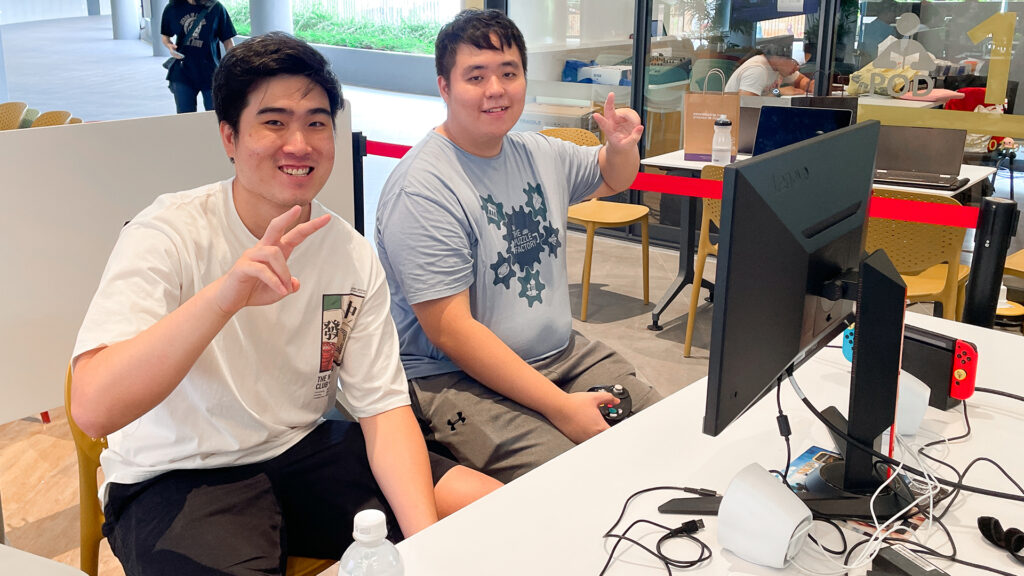
The first day of IVGF saw the Super Smash Bros. Ultimate competition undergo a Swiss tournament to determine the top four players to advance to the semi-finals and subsequently, the grand finals. After a gruelling morning of games and a nail-biting semi-final, Alvis ‘PsineWave’ Ng and Julian ‘XRias’ Foo from NUS faced off in the grand finals, with the former coming out top in a 3-0 victory.
With 12 teams and 67 student participants, Mobile Legends: Bang Bang was the most popular game at the festival. While all three NUS varsity teams managed to enter the finals, one of the teams was eliminated by a surprise contender from SIM. Eventually, it was an NUS versus NUS final where “Finally AbleToCan” took down “WeLoveNUS” in a close game of 3-1.
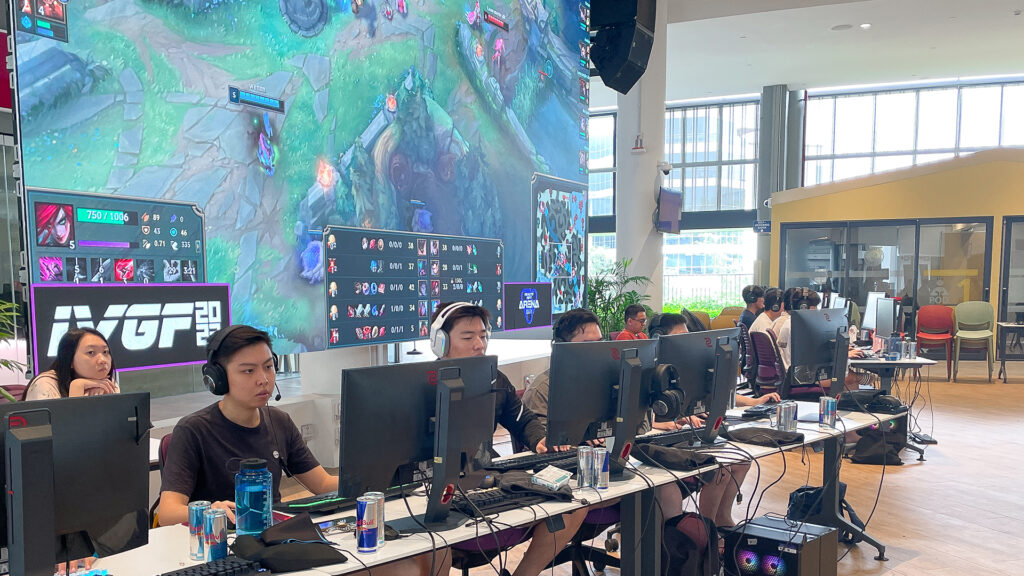
For the League of Legends and VALORANT tournaments, the teams had to face off and winners were determined in a best-of-five sets format. NUS’ “Croc with Crocs” took down NUS’ “Bulbasaur Buds” 3-1 in the League of Legends grand finals.
All eyes were on the VALORANT finals, where NUS’ “HER LOSS” went up against “no.men”, NUS’ best VALORANT team who won first place in Campus Legends 2022, an annual inter-tertiary e-sports tournament, and was one of the top eight in the VALORANT Champions Tour 2022: Malaysia & Singapore Stage 1 Challengers. While the former took the first set, the reigning champion bounced back and took the remaining three games, winning the series by a score of 3-1. Having represented the University at various VALORANT competitions, the five-man “no.men” team was arguably, the best e-sports team in NUS Esports history. This was their last competition as a team and winning the IVGF trophy marked a beautiful end to their journey.

Outgoing NUS Esports President and Esports Director Ong Jing Hao said he was extremely proud of his team for pulling off the feat of organising the largest e-sports event on campus. “IVGF 2023 was our most ambitious attempt at organising a physical e-sports event and I am glad that it turned out to be a huge success. I am also proud of our team’s achievements in the games as it was our strongest showing to date,” commented the Year 4 undergraduate from NUS School of Computing.
Recognising and Encouraging More Females to Join E-sports
While the size of this year’s event reflected the growing popularity of e-sports, female e-sports athletes remain largely under-represented in the competitive gaming scene. As one of the three females in the team, NUS Year 4 Mechanical Engineering undergraduate Angel Clarita Juspi hopes to reverse this trend.
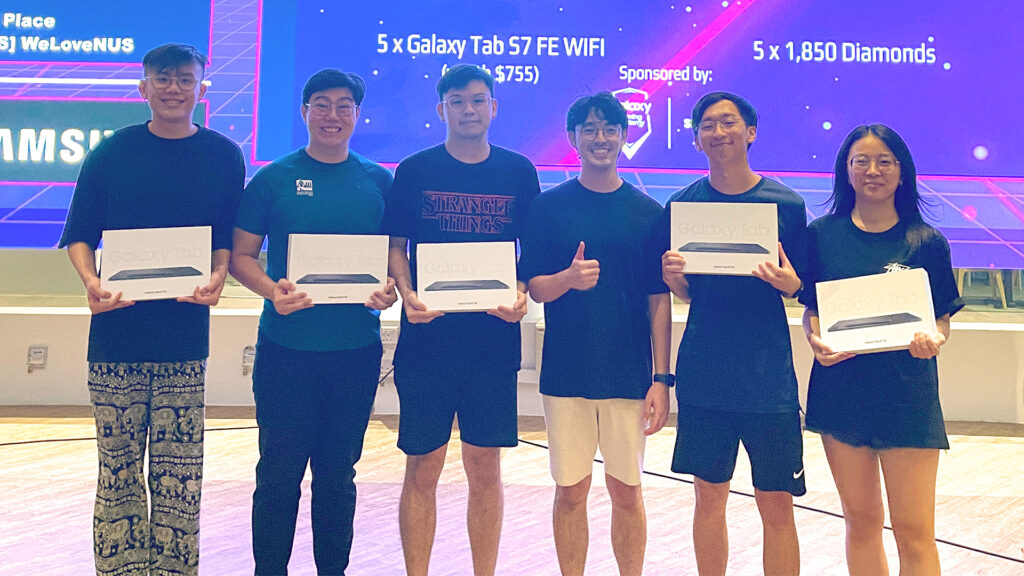
Having gamed since she was young, Juspi is aware of the discrimination and stereotypes faced by some female gamers. Encouraging her juniors to be brave, she said, “Don’t be afraid to give e-sports a chance. Everyone is treated the same here, so it is all based on your performance in the games.”

Apart from being a recreational or competitive gamer, NUS Esports also allows players to train as a coach. Year 4 Political Science undergraduate Victoria Foo is a VALORANT Esports Officer whose role involves coaching a team. To prepare for her coaching work, she watches pro gameplays, curates strategies according to her team’s strengths, conducts post-training reviews, and analyses and brainstorms solutions with her team.
Reflecting on her role, Victoria said, “The initial weeks were challenging because I’m the only girl in the VALORANT varsity team and I’m not as highly ranked as the teammates I coach. It felt like I needed to prove not just to myself, but also to the team I coached, and had to work hard to value-add to the team.”
“Despite my initial inadequacies, the friends I’ve made through the varsity teams never made me feel left out. They continued to trust my strategies and we do game together despite the differences in rank,” she shared.
Congratulations to all the NUS Esports athletes and coaches for doing the University proud!
This story by the NUS Esports first appeared in NUSnews on 15 September 2023.
Why Tharman Won Big
IN BRIEF | 5 min read
- Associate Professor Bilveer Singh (NUS Political Science) explains the factors leading to Mr Tharman Shanmugaratnam winning the recent Singapore Presidential Election and its implications for the next General Elections in his Op-Ed in Berita Harian.
Click through image below to read this piece.
This article first appeared in Berita Harian and NUSNews on 5 September 2023.
Beyond the Classroom: My Student Ambassador Experience
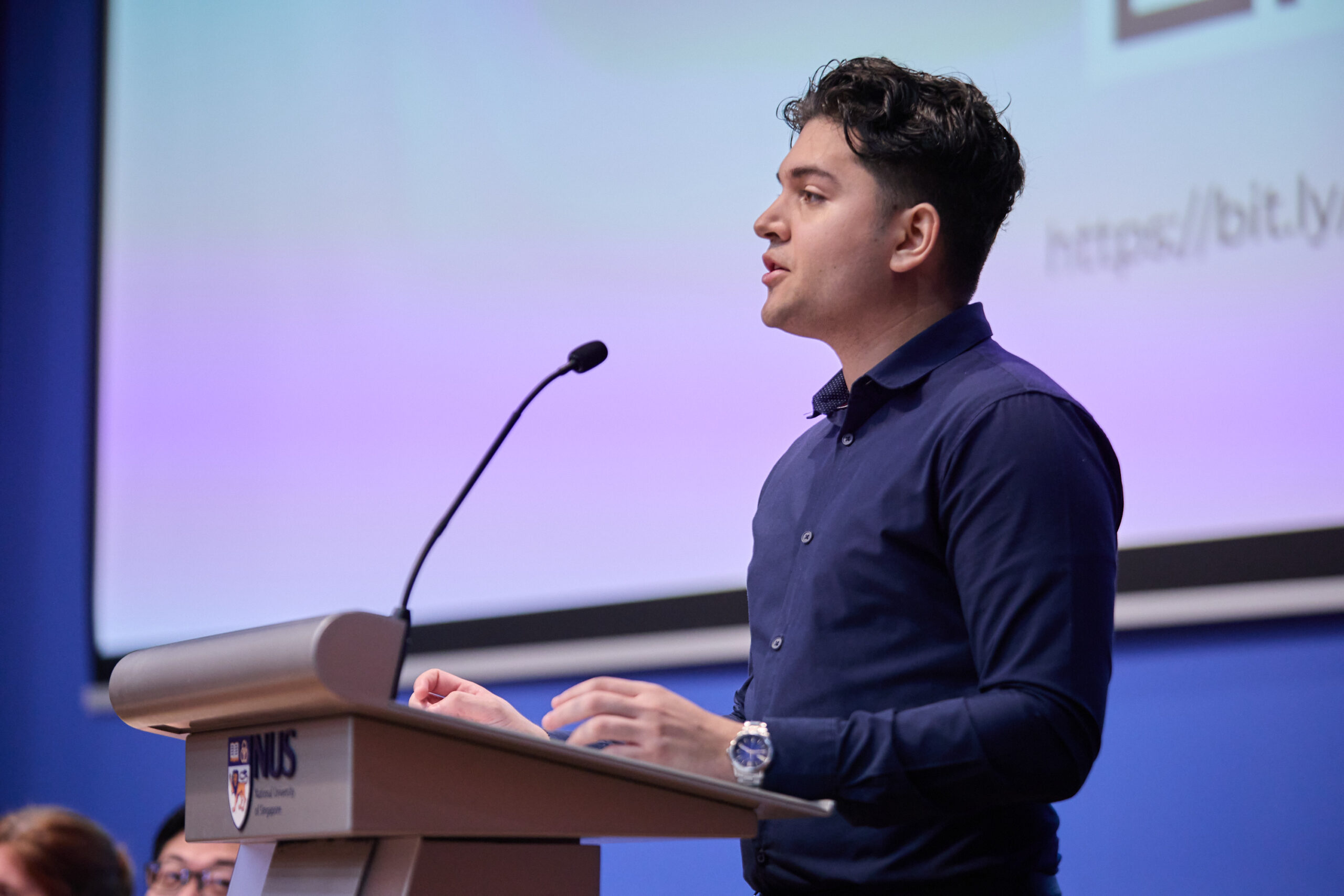 Ethan Naidu hosting a key outreach event as a FASS Student Ambassador
Ethan Naidu hosting a key outreach event as a FASS Student Ambassador
Learning Beyond the Classroom
Many perceive university life as primarily academic, but delve a little deeper and you’ll discover an enriching medley of experiences that can shape your educational journey. During my pursuit of a Political Science degree at NUS, I grew to appreciate the profound potential of outside-classroom initiatives, particularly the Faculty of Arts and Social Sciences (FASS) Ambassador Programme. This initiative not only expands the scope of conventional classroom learning but also enables us to develop important skills such as leadership, public speaking, and personal growth.
The Ambassador Experience
The FASS Ambassador Programme serves two main objectives: first, to represent the NUS and FASS communities; and second, to provide opportunities to leverage students’ knowledge and skills. One of the standout features of this programme is its flexibility, allowing Student Ambassadors (SAs) to opt for a diverse range of roles. These include serving as panellists for outreach engagements like Open Houses and pre-university school visits, or acting as hosts for prospective students. While hosting, ambassadors may engage in spirited interactions during open house sessions or lead insightful discussions about academic life at NUS. As we advise prospective students, we not only pass on knowledge but also refine our own perspectives and deepen our understanding. This process enriches both us as SAs and the prospective students.
Discovering New Highs
One of my first roles was to emcee FASSxTalks (#DiscoverFASS@CHS 2023), a series of masterclass lectures tailored to give prospective students a live in-class experience. I was initially apprehensive, but the unwavering support from the team eased me through my first major public speaking engagement on stage. The invaluable feedback I received after the event included detailed critiques that illuminated areas of strength and nuances for enhancement, thus paving the way for rapid personal growth.
Representing the FASS Student Body
I also had the privilege of participating in a FASS@CHS orientation panel on career pathways, alongside members of NUS’ leadership team. The dialogue, which focused on career modules and internships, addressed the pressing concerns of prospective students. Sharing the stage with esteemed panellists, I aimed to provide insights that were both enlightening and succinct. The positive feedback I received highlighted my ability to contribute not only to the discussion but also sharing personal experiences, particularly during the high-pressure Q&A segment.
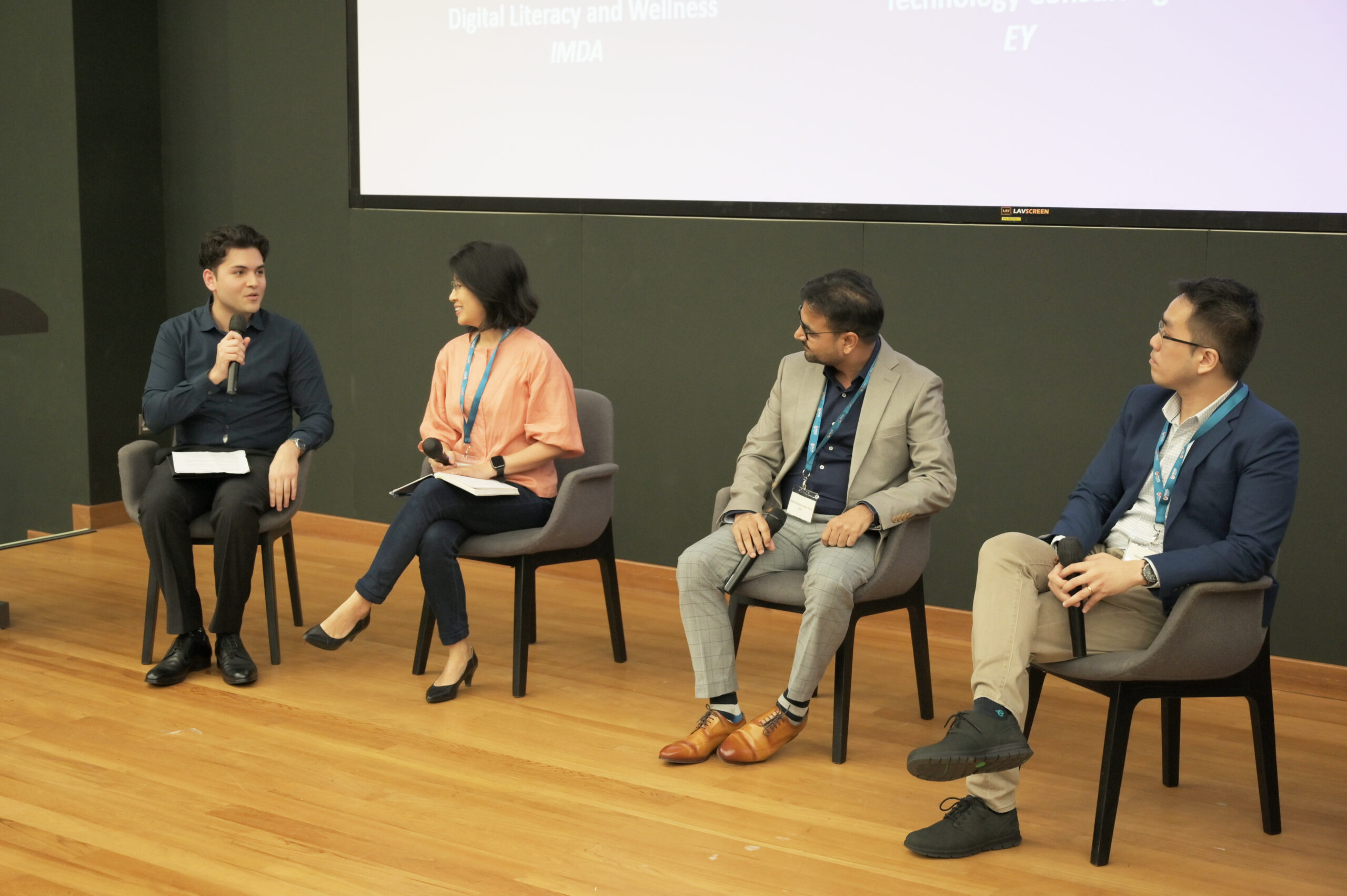 Ethan moderating a panel for the CHS Case Competition 2023
Ethan moderating a panel for the CHS Case Competition 2023
Another memorable experience during my time as an SA was moderating a panel at the College of Humanities and Sciences (CHS) Case Competition 2023, which explored the pressing issue of digital dependency. Engaged in deep discussion with industry experts, I learned that effective moderation involves guiding conversations and maintaining an ongoing, dynamic dialogue. This experience sharpened my skills in public discourse, spontaneous ideation, and weaving diverse viewpoints into a cohesive narrative.
Beyond my Ambassadorship
I believe my role as Vice-President of the Political Science Society of NUS (PSSOC) has not only enhanced my personal development under the SA programme but also improved my ability to perform my ambassadorial duties. The roles are similar in various aspects.
Both roles honed my interpersonal skills, underscored the value of collaborative leadership, and broadened my worldview. Within PSSOC, I played key roles in decision-making, shaping strategic vision, and fostering a tight-knit community — functions that closely parallel my responsibilities as an ambassador.
A True Bonding Experience
The value of the SA programme lies not only in its official activities but also in the deeper engagements and lessons that these activities impart. Each event and interaction is an avenue for nurturing attributes like empathy, adaptability, and collaboration.
An intrinsic strength of this programme is the profound sense of camaraderie it fosters. Our collective endeavours this past year extend beyond mere engagement, event participation, and logistical support. For us, it was in many respects a united journey toward maturation and enlightenment. The solidarity that came about when we tackled the challenges along the way, and the shared joy with which we celebrated our successes, will not be remembered just as highlights of our time at university but also as the foundation for lifelong professional relationships.
Looking Back
Reflecting on my roles in both the SA programme and PSSOC, I can say that they have been crucial to shaping my university journey. They’ve allowed me to merge rigorous academic pursuits with significant personal and professional growth. It’s clear that the more you put into the SA programme, the more you get out of it in terms of personal and professional development.
For those who are eager to venture beyond the classroom and connect with like-minded peers, this role could be an ideal fit. As I close this chapter, I’m grateful for the insights I’ve gained and the connections I’ve made. I urge all future students and aspiring ambassadors to embrace the diverse opportunities that university life provides. These experiences have the potential to shape not just your academic path but your entire career trajectory.
This story was written by third-year Political Science major, Ethan Naidu.
The Faculty of Arts and Social Sciences (FASS) Student Ambassadors are a cadre of outstanding and unique individuals who are intellectually curious, constantly on a quest for new knowledge and experiences across disciplines and geographies. They are ready to represent, support, trained to nurture and inspired to serve FASS.
The World as Classroom: NUS College’s Global Experience Course
IN BRIEF | 10 min read
- NUS College’s Global Experience (GEx) course is a unique experiential course that ‘breaks open the classroom’ that lets students learn through immersive activities such as visits to research centres, governing institutions or heritage sites, participation in master classes or workshops to learn about culture and community, and engaging in dialogue with important personalities and leaders — across the world.
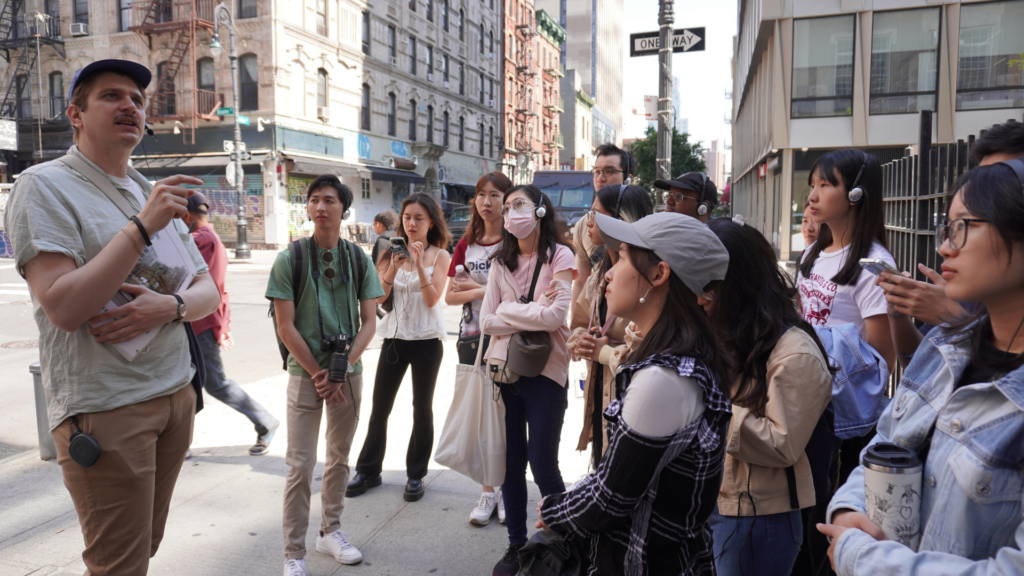
For about 60 students from NUS College, the recent summer break was spent in a faraway city immersed in a different way of life, where they discovered new dimensions to important issues such as culture, sustainability, governance, diplomacy and inclusivity – an unforgettable experience that left a huge impact on each of their lives.
These students were part of the inaugural batch of NUS College’s flagship programme, the Global Experience (GEx) course. A unique experiential course that ‘breaks open the classroom’, GEx lets students learn through immersive activities such as visits to research centres, governing institutions or heritage sites, participation in master classes or workshops to learn about culture and community, and engaging in dialogue with important personalities and leaders.
An Immersion in City, Culture and Technology: GEx Tokyo
From grappling with technologies for a rapidly ageing society to keeping centuries-old traditions alive, Japan’s unique blend of innovation and culture continues to mesmerise people the world over. A trip to its capital city, Tokyo, allowed students to immerse in the ‘behind the scenes’ aspects of the functions that keep the megacity running, and the people and companies that create Japan’s identity.
The visit to JR East gave the students a glimpse of the role major transport companies play in shaping the living, working, and somatic experience in a megacity like Tokyo. In addition to learning about transport operations that keep the city moving, students also toured the famous shopping district within Tokyo Station, and were introduced to the development of the new station Takanawa Gateway, where they had the opportunity to pitch their ideas for the new station development.

To see first-hand how Japan was harnessing space technology, students visited start-ups such as Axelspace which specialises in nanosatellites, and Listenfield, an agritech company based in Chubu University, Nagoya, which utilises satellite technology to support farmers. The group also enjoyed a visit to Juchheim, a longstanding Japanese confectionery company behind the world-famous ‘Baumkuchen’ cakes, where they got to see AI-enabled robots work alongside human bakers to produce the cakes.
Reflecting on the trip, Year 3 History major Loh An Lin, who also served as a student tutor on the trip, said, “I deeply enjoyed our time with students we met from Waseda University, Tokyo University of the Arts, and Nagoya University. Having the opportunity to conduct fieldwork with some of the students, or simply have lunch with them, allowed us a glimpse of what it is like to be a student in Tokyo and Nagoya, and how these two cities are viewed through the lens of fellow students.”
Delving into Environment and Sustainability: GEx Stockholm
Sweden is widely known as a country that has put environment and sustainability matters high on its list of priorities in both the political and societal contexts. Through a curated series of seminars, tours, and fireside chats, students who took part in GEx Stockholm gleaned insights and different perspectives on environmental and sustainability issues aimed at developing a better understanding and appreciation of a multi-disciplinary approach towards sustainable urban development.
Guided walking tours through the cities of Stockholm and Malmo were a great way for the students to not only sight-see but also immerse themselves in the Swedish approach to sustainability through visits to train stations, harbourfronts and parks. Such walking tours have been effective in increasing environmental awareness and education among locals and tourists alike.
Visits to the World Maritime University and Stockholm Environmental Institute allowed students to engage with experts in the field of sustainability and learn about their research and impact, whether in terms of informing policy or shaping the livelihoods of locals.
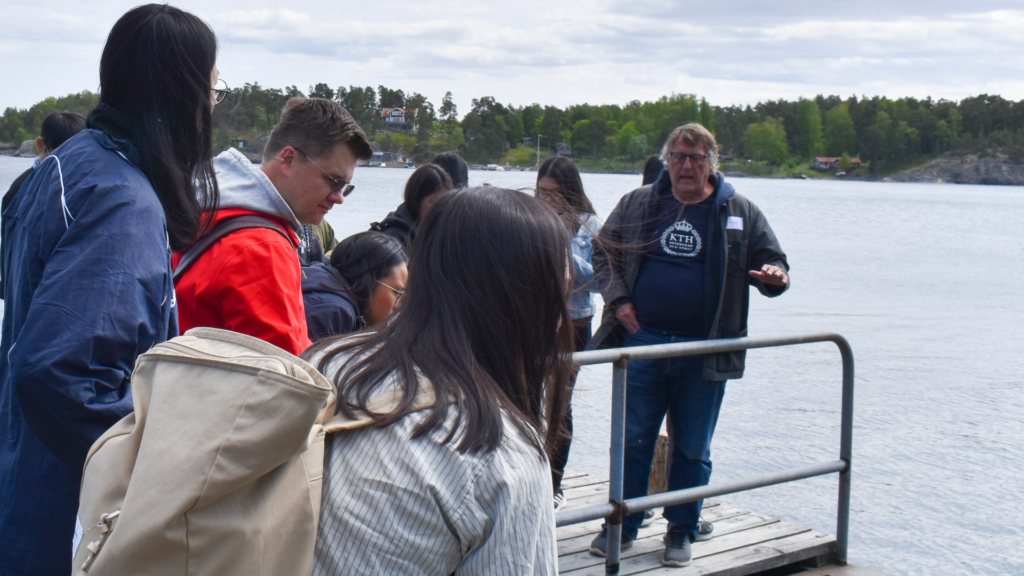
Ng Sze Xuan, a Year 4 Geography major at the NUS Faculty of Arts and Social Sciences, said, “We were exposed to topics including climate change adaptation, waste management, and urban liveability through engagement with various institutions, and professionals. Each activity revealed local, regional, and global perspectives towards the environment, helping us to develop a better understanding and appreciation of a multi-disciplinary approach towards sustainable urban development.”
While Sweden is doing well in many areas of sustainability, Ms Elin Bergman, the co-founder of circular economy company Cradlenet, spoke candidly with the students during a fireside chat about areas of waste management and resource extraction, sharing insights on improvements that can be made.
Exploring Inclusion, Diversity and Governance: GEx Toronto
“GEx Toronto was designed to give students an interdisciplinary experiential learning programme on diversity and inclusivity in governance. More specifically, the trip exposed students to the complexities involved in creating inclusive systems of governance for a diverse population in Canada,” Dr Bjorn Gomes, who teaches Social Sciences, explained.
The students participated in meetings with members at City Hall and Parliament, along with representatives from various NGOs, start-ups and academics from the University of Toronto and Toronto Metropolitan University, architects, and residents in Toronto. These organisations and people were chosen to ensure that students understood the struggles for equity and inclusion from diverse perspectives across the social and political spectrum.
Students also travelled to Manitoulin Island, located about 360km away from Toronto, to meet with many First Nations Chiefs, Elders and community members. They also engaged with educational institutions and participated in a range of activities to learn about the histories, practices, struggles and resilience of these communities.
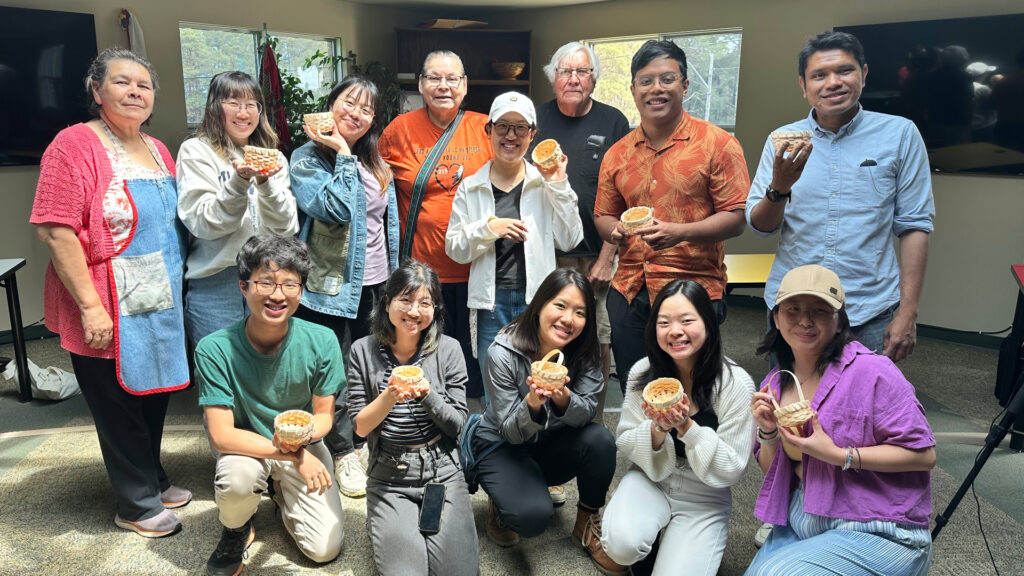
“I couldn’t help but feel that this trip was built on the openness and hospitality of our stakeholders, who were generous with their time and energy amidst their busy schedules. These conversations and spaces are not easily accessible to the average visitor or tourist, and it was a great privilege to have experienced all of this,” said Sarah Leong, also a Year 4 Geography major who took away a more holistic understanding of how stakeholders’ efforts work in relation to one another from the trip to Toronto.
Arts, Diplomacy, Culture, and Social Innovation: GEx Paris
Think of ‘Paris’ and immediately many clichés like art, fashion and romance come to mind – from the Mona Lisa to the Louvre, Champs-Élysées and haute couture, and the world icons and stories of love like the Eiffel Tower and Moulin Rouge.
But the city has much more to offer, and GEx Paris provided students with opportunities to encounter things they had never imagined. Exploring locations such as Palais de Tokyo or the Musée du Quai Branly, designed to exhibit a collection of indigenous arts and culture, and even attending a session at the French National Assembly, the students experienced the French capital in an unparalleled manner.
Crafted through a collaboration with three partner universities (Inalco, Université Paris Cité, and Sciences Po), the programme enabled students not only to acquire French language skills but also to engage with local students.
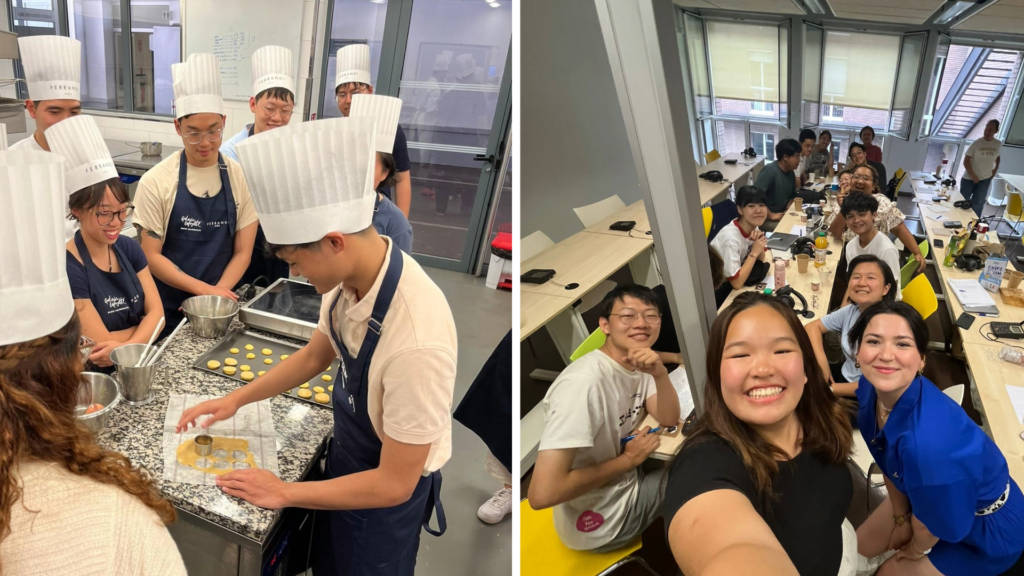
France has a very strong tradition in cultural diplomacy, and GEx Paris students attended a Masterclass by Ms Eva Nguyen-Binh, President of Institut Français, where they gained insights into France's endeavours to globally promote its language and culture, while actively fostering cultural diversity.
Like the other GEx trips, students who spent a month in Paris thoroughly enjoyed that the course was less theoretical and more experiential in nature.
Azcuna Alvin Cedrick Apuyan, a Year 3 Political Science student, said, “We met so many interesting people for our workshops and masterclasses, and visited so many heavyweight organisations like the EU and UNESCO. Often, the value in coming to these places and meeting these individuals is that we get to see the personal side of what they do – what skills these involve on a daily basis, what sorts of connections these people make, how these people achieve all that they have.”
Insights into Media, Finance and Diplomacy: GEx New York City
A visit to New York City was the perfect opportunity for students to see how media, finance and diplomacy have been pivotal in establishing its status as a global hub, prompting students to draw similarities and comparisons with Singapore.
Dr Norman Vasu, who planned and led this trip, said, “While the formal academic learning element of the programme was at the forefront, what made this trip memorable was seeing how students gained confidence throughout the course of the programme. Shyness and misplaced apprehension ebbed away as they grew more confident to explore non-touristy parts of New York in order to attain a deeper appreciation of how New Yorkers really lived.”
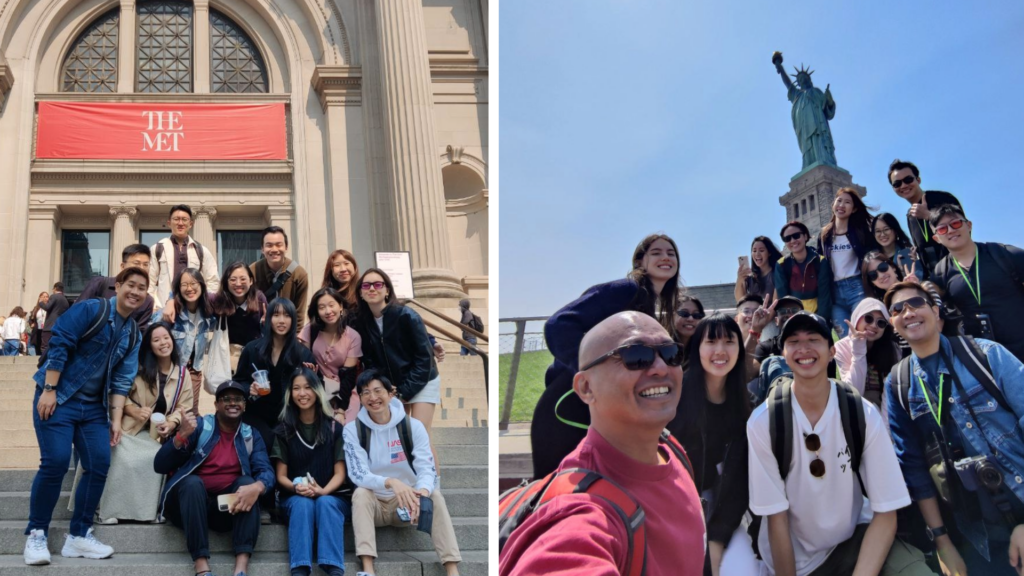
Students visited locations such as the Museum of Immigration on Ellis Island and the Tenement Museum to understand New York’s history, while a tour of Wall Street and a visit to Bloomberg’s headquarters provided students a window into the world of finance and journalism.
Additionally, seminars hosted by the United Nations (UN) Institute of Training and Research, which focused on non-traditional security issues such as food security, climate change and global health, not only deepened the students’ understanding of such issues but also allowed them to learn how the UN comes together as an inter-governmental organisation to anticipate future challenges and implement solutions to circumvent them.
Beyond the Classroom
Regardless of the city chosen for their month-long GEx course, one common feature that students enjoyed the most was the time given to pursue passion projects, fostering both their academic and personal growth.
In New York, some students took this opportunity to find out how urban planning has influenced the development of green spaces within the city while others questioned the authenticity of local cuisines present in New York.
Tan Armado Yi Zhou, a Year 5 student in Communications and New Media, decided to explore the Metropolitan Museum’s Costume Institute Benefit, better known as the MET Gala, and how its annual themes signal trends in cultural globalisation.
He said, “I’ve always been amazed by the glitz and glamour surrounding the ‘Party of the Year’. Visiting the MET museum itself felt surreal. What made it even more special was the special access to museum archives that I was given by our generous hosts. Correspondences, invitations, guest lists and seating charts that I otherwise would not have been able to access gave me deeper insights for my research to understand the motivations and intricacies of the event over the years since its inception in 1948.”
Similarly, students in Paris had the opportunity to ignite their creativity through projects that developed video essays on art movements, photobooks about urban development, paintings on diplomatic affairs, as well as poems and short stories about language and culture.
Another outstanding feature of the GEx course is the access it gives to students beyond what they can learn in the classroom or even experience during their own travels.
Dr Lee Chee Keng, who joined the students on their visits to Tokyo and Nagoya, noted the value in going behind the scenes to see things usually unseen or unnoticed, citing the example of how TESSEI has perfected the process of getting Japan’s bullet trains cleaned within minutes before they make their return journeys.
“I have been reflecting and discussing with the GEx teams as well as some partners on how to improve the GEx experience, and I am confident that we can look forward to deeper engagement with some key partners to create a deeper immersion and insights for our students,” Dr Lee said.
This story first appeared in NUSnews on 28 August 2023.
Social Science and Humanities Research Fellowship (SSHRF) Recipient Dr. Elvin Ong

Dr. Elvin Ong was awarded the Social Science and Humanities Research Fellowship (SSHRF) by the Singapore Social Science Research Council (SSRC). The SSHRF was established by the SSRC as part of its efforts to nurture local talents and strengthen the social science and humanities research ecosystem in Singapore. The 5-year grant will fund research for Dr. Ong’s next book project tentatively titled, “After Victory: Governance Outcomes, Political Stability, and Institutional Reforms in East and Southeast Asia.”
Assistant Professor Ong is the first NUS Political Science Department faculty to be awarded the SSHRF.
Fulbright Visiting Scholar Award 2023-2024 Recipient Dr. Elvin Ong
IN BRIEF | 10 min read
- The TF-NUS LEaRN Programme is NUS Global Relations Office’s signature youth leadership programme, which takes place annually and is sponsored by the Temasek Foundation.
- This year’s programme began in May, where 34 participants from four local universities – NUS, Singapore University of Technology and Design, Singapore University of Social Sciences, and Singapore Institute of Technology – attended workshops, field trips, and presentations on sustainability and leadership in Indonesia.
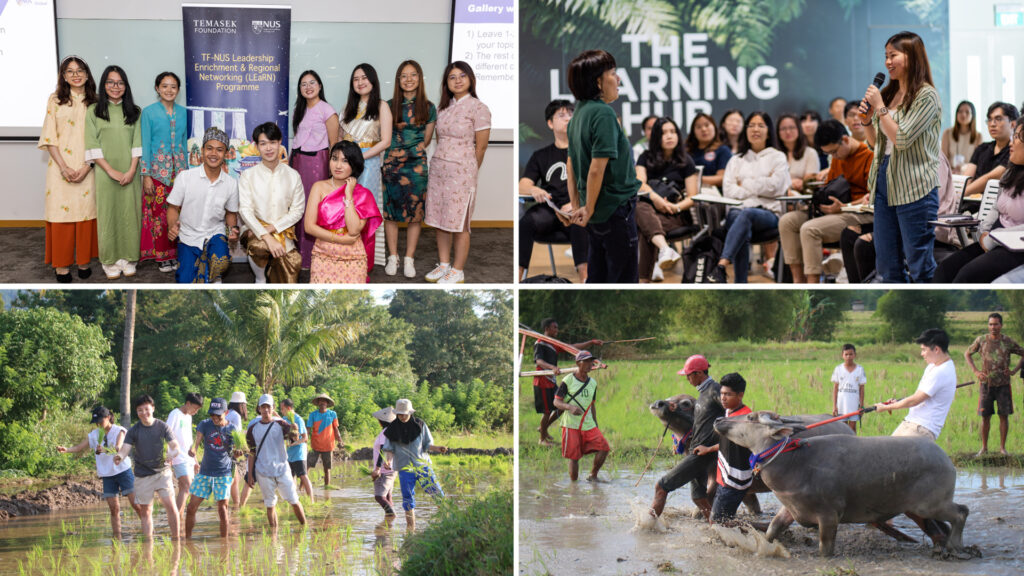
For 62 university students across Southeast Asia, the summer holidays were well-spent gaining new perspectives on leadership and sustainability through the Temasek Foundation-NUS Leadership Enrichment and Regional Networking (TF-NUS LEaRN) Programme.
This year’s programme began in May, where 34 participants from four local universities – NUS, Singapore University of Technology and Design, Singapore University of Social Sciences, and Singapore Institute of Technology – attended workshops, field trips, and presentations on sustainability and leadership in Indonesia.
The TF-NUS LEaRN Programme is NUS Global Relations Office’s signature youth leadership programme, which takes place annually and is sponsored by the Temasek Foundation.
Citing the rich cultural diversity and growing opportunities available in Southeast Asia, NUS Associate Vice President (Global Relations) Associate Professor Reuben Wong urged students to broaden their worldview, get to know their Southeast Asian neighbours better, and take active steps toward shaping the kind of society they want to live in.
“This is a great opportunity for youths to learn from one another, share their views, and play an active role in building an innovative and sustainable society. At the same time, it’s a chance for them to forge strong bonds and foster mutual respect and appreciation for the different cultures in the region, especially in an increasingly connected world,” said Assoc Prof Wong (who is also Deputy Head of NUS Political Science).
Sustainability Efforts in Indonesia
Participants from Singapore gained insights into a broad range of sustainability efforts and challenges through engaging discussions with speakers from both the public and private sectors during their visit hosted by Airlangga University in Surabaya.
This was followed by a trip to Sumbawa, in Indonesia’s West Nusa Tenggara province, where they learnt from Sumbawa University of Technology about their efforts to revitalise the agricultural industry through sustainable farming practices. The exposure was reinforced by a visit to the rice paddy fields where participants saw how local farmers engaged in sustainable farming by flooding the rice fields and releasing fishes into the fields to help with pest control.
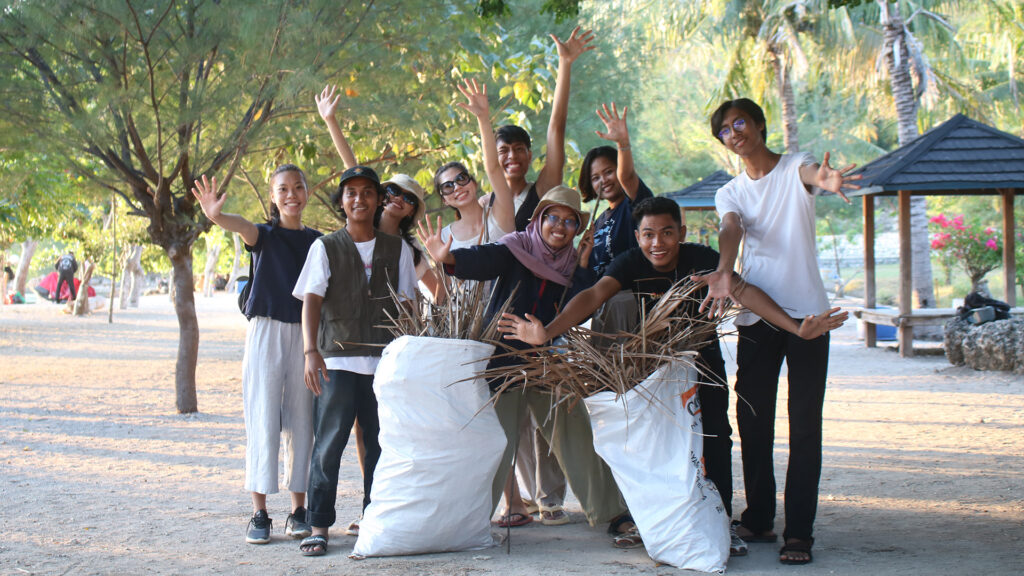
Additionally, the programme included experiential learning components on local sustainable waste management efforts. For this, students had a go at reforesting work, where they planted trees at Ai Lemak in Sumbawa, and pitched in during a beach cleanup with the locals. To complete the trip, students also experienced Indonesia’s rich culture and heritage through several dance, music and cooking lessons, village tours, and an exciting buffalo race in the paddy fields.
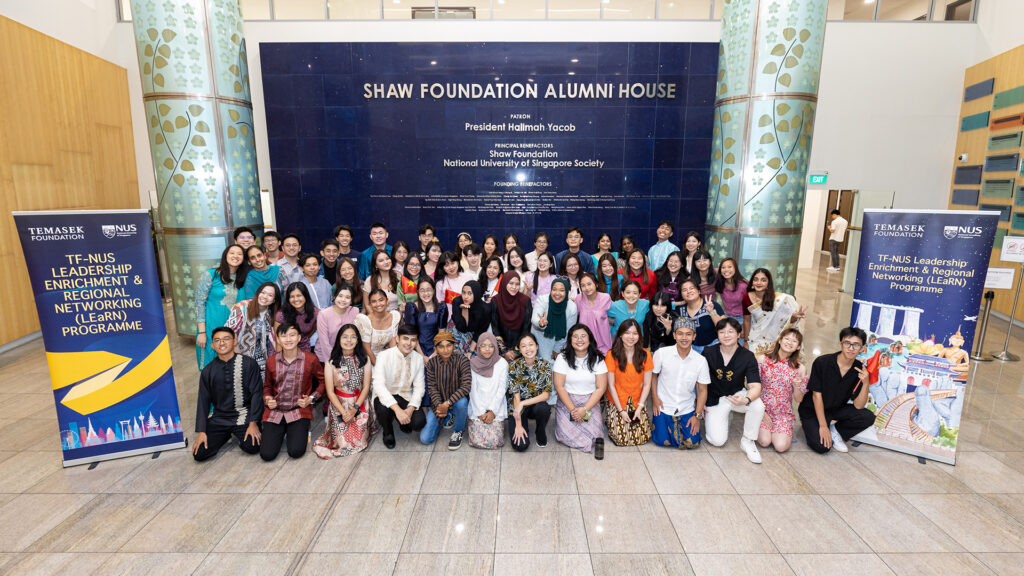
Leadership lessons in Singapore
Fast forward to July, the second and third phases of the TF-NUS LEaRN Programme resumed in Singapore, where the students were joined by 28 other participants from 15 universities across Southeast Asia hailing from countries including Brunei, Indonesia, Malaysia, Thailand, the Philippines and Vietnam.
They learned about the challenges of being a leader and managing a team through a series of site visits and interviews with leaders from various industries and backgrounds including the founders of trade associations for Singapore’s tech industry, SGTech and social enterprise SGAssist. They also had the opportunity to pitch their ideas and solutions to some of the challenges faced by social enterprises and businesses. In an inspiring dialogue with Ms Oh Siew May, a Singaporean chef and author with cerebral palsy, the participants were enlightened on untapped talent in the community.
“Just because someone is disabled doesn’t mean they are unable to do anything. We can do anything – even climb mountains. My disability will not stop me from doing what I want to do,” Ms Oh told participants. She successfully scaled Mount Kinabalu in 2005, Malaysia’s highest peak, and currently works at Fortitude Culina, a social enterprise that hires people with disabilities.
The students were also treated to a fascinating presentation by urban farmer and founder of local biotechnology start-up, Insectta, and FASS alumna Ms Chua Kai-Ning (NUS English, Linguistics and Theatre Studies '18). They learnt how black soldier fly maggots are used to sustainably produce biomaterials such as chitosan and melanin, which are often used in pharmaceutical products such as anti-microbial sprays, health and skincare products and even organic electronics, in large quantities. Using Insectta’s proprietary extraction technology, biomaterials are extracted and produced in a clean and sustainable manner. These are ultimately used in the manufacturing of environmentally-friendly commercial products.
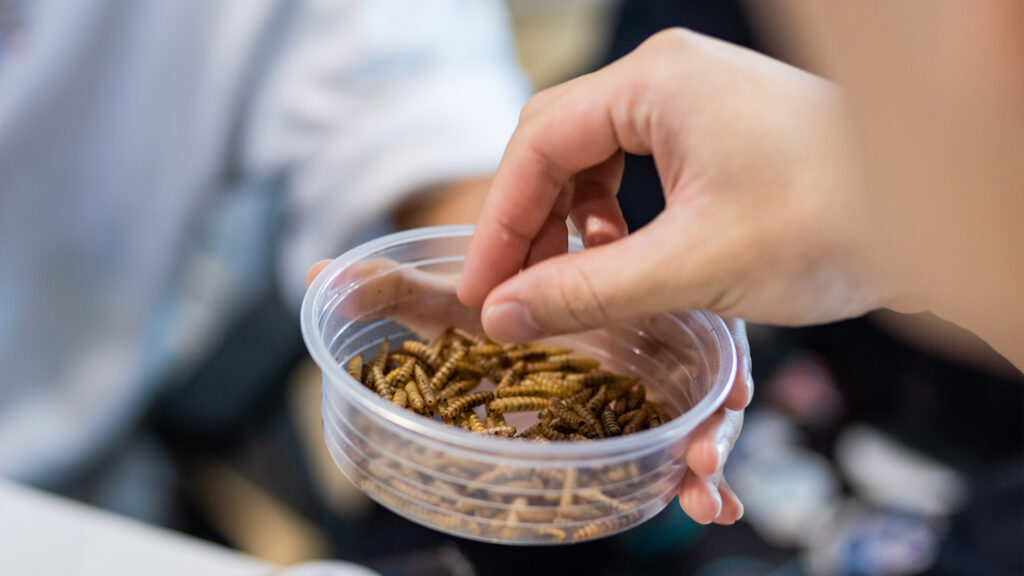
In the final leg of the programme, participants attended a series of workshops on futures thinking by NUS Lee Kuan Yew School of Public Policy, where they learnt about public policy, futures thinking methodology, and its application on real-world issues. They also attended a panel discussion on sustainability and leadership with industry experts and thought leaders, where they explored innovative approaches and strategies to drive sustainable development in ASEAN.
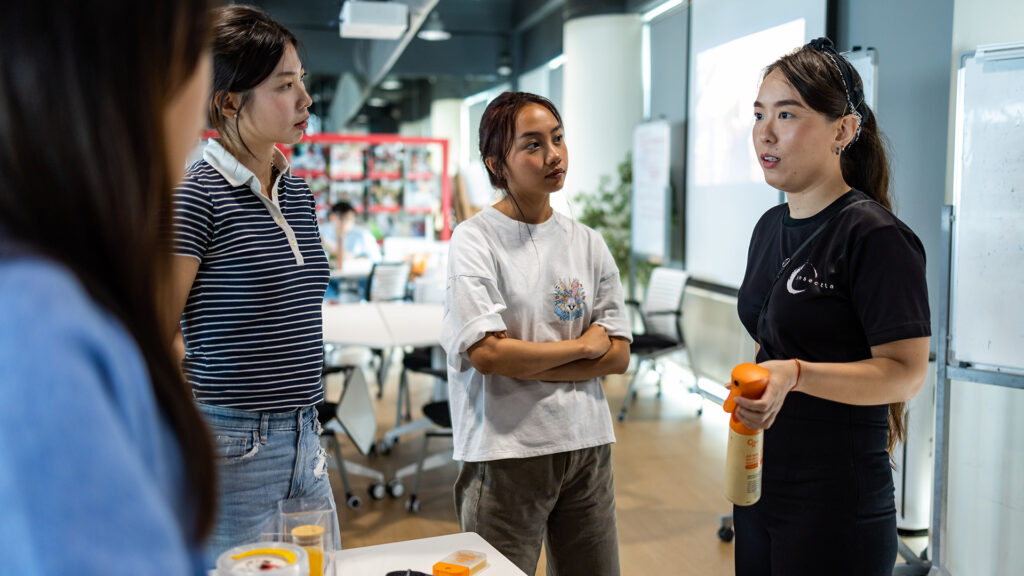
2040 Vision for ASEAN Countries
Leveraging their newly acquired knowledge and experiences from the intensive TF-NUS LEaRN Programme, students developed sustainability-enhancing strategies and shared their 2040 vision for ASEAN countries. Through engaging skits, creative props, and meticulously hand-crafted dioramas, the students presented their ideas on helping countries in ASEAN achieve sustainability goals in food, agriculture, waste management, education, tourism, and conservation.
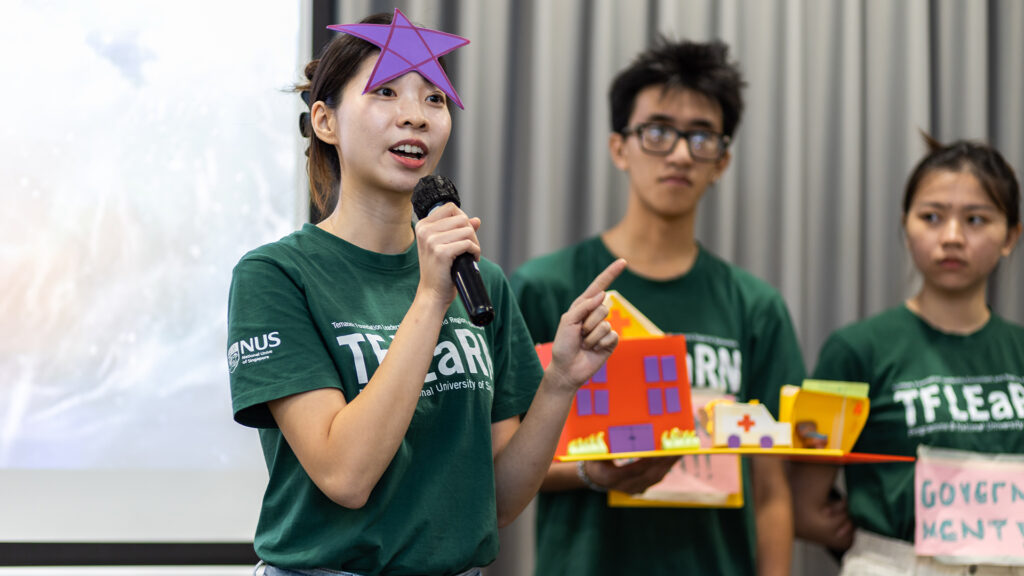
Mia Chow Qi Fang, a final-year NUS Landscape Architecture student and fellow LEaRN participant, shared that the programme was crucial in enhancing her intercultural communication skills. “I acquired many valuable skills that go beyond what I typically learn in my regular school routine. The development of soft skills, such as cultural sensitivity and effective communication across diverse cultures, was particularly useful to me. Such skills are vital in today's interconnected world, where it is important for us to be able to understand and collaborate with people from different backgrounds and cultures.”
“The TF-NUS LEaRN Programme was the perfect opportunity for me to not only acquire relevant leadership skills but also try them out in a safe space,” said Brandon New Jun Jie, an NUS Political Science freshman. “The programme’s themes and its carefully curated itinerary of field trips and academic discussions were very well thought through. The focus on sustainability, a field that I was not very knowledgeable about, was the icing on the cake.”
Dao Duy Ha Anh, a third-year engineering student from Hanoi University of Science and Technology, found the different leadership perspectives shared during the programme particularly enriching.
“One highlight of the programme was learning from the various leaders who shared valuable insights on handling feedback, overcoming challenges, and honing important career skills. This is very helpful for me as both a student, and as a working adult in the near future,” he said.
This story by NUS Global Relations first appeared in NUSnews on 17 August 2023.
Gaining Fresh Perspectives on Leadership and Sustainability in Southeast Asia at TF-NUS LEaRN 2023
IN BRIEF | 10 min read
- The TF-NUS LEaRN Programme is NUS Global Relations Office’s signature youth leadership programme, which takes place annually and is sponsored by the Temasek Foundation.
- This year’s programme began in May, where 34 participants from four local universities – NUS, Singapore University of Technology and Design, Singapore University of Social Sciences, and Singapore Institute of Technology – attended workshops, field trips, and presentations on sustainability and leadership in Indonesia.

For 62 university students across Southeast Asia, the summer holidays were well-spent gaining new perspectives on leadership and sustainability through the Temasek Foundation-NUS Leadership Enrichment and Regional Networking (TF-NUS LEaRN) Programme.
This year’s programme began in May, where 34 participants from four local universities – NUS, Singapore University of Technology and Design, Singapore University of Social Sciences, and Singapore Institute of Technology – attended workshops, field trips, and presentations on sustainability and leadership in Indonesia.
The TF-NUS LEaRN Programme is NUS Global Relations Office’s signature youth leadership programme, which takes place annually and is sponsored by the Temasek Foundation.
Citing the rich cultural diversity and growing opportunities available in Southeast Asia, NUS Associate Vice President (Global Relations) Associate Professor Reuben Wong urged students to broaden their worldview, get to know their Southeast Asian neighbours better, and take active steps toward shaping the kind of society they want to live in.
“This is a great opportunity for youths to learn from one another, share their views, and play an active role in building an innovative and sustainable society. At the same time, it’s a chance for them to forge strong bonds and foster mutual respect and appreciation for the different cultures in the region, especially in an increasingly connected world,” said Assoc Prof Wong (who is also Deputy Head of NUS Political Science).
Sustainability Efforts in Indonesia
Participants from Singapore gained insights into a broad range of sustainability efforts and challenges through engaging discussions with speakers from both the public and private sectors during their visit hosted by Airlangga University in Surabaya.
This was followed by a trip to Sumbawa, in Indonesia’s West Nusa Tenggara province, where they learnt from Sumbawa University of Technology about their efforts to revitalise the agricultural industry through sustainable farming practices. The exposure was reinforced by a visit to the rice paddy fields where participants saw how local farmers engaged in sustainable farming by flooding the rice fields and releasing fishes into the fields to help with pest control.

Additionally, the programme included experiential learning components on local sustainable waste management efforts. For this, students had a go at reforesting work, where they planted trees at Ai Lemak in Sumbawa, and pitched in during a beach cleanup with the locals. To complete the trip, students also experienced Indonesia’s rich culture and heritage through several dance, music and cooking lessons, village tours, and an exciting buffalo race in the paddy fields.

Leadership lessons in Singapore
Fast forward to July, the second and third phases of the TF-NUS LEaRN Programme resumed in Singapore, where the students were joined by 28 other participants from 15 universities across Southeast Asia hailing from countries including Brunei, Indonesia, Malaysia, Thailand, the Philippines and Vietnam.
They learned about the challenges of being a leader and managing a team through a series of site visits and interviews with leaders from various industries and backgrounds including the founders of trade associations for Singapore’s tech industry, SGTech and social enterprise SGAssist. They also had the opportunity to pitch their ideas and solutions to some of the challenges faced by social enterprises and businesses. In an inspiring dialogue with Ms Oh Siew May, a Singaporean chef and author with cerebral palsy, the participants were enlightened on untapped talent in the community.
“Just because someone is disabled doesn’t mean they are unable to do anything. We can do anything – even climb mountains. My disability will not stop me from doing what I want to do,” Ms Oh told participants. She successfully scaled Mount Kinabalu in 2005, Malaysia’s highest peak, and currently works at Fortitude Culina, a social enterprise that hires people with disabilities.
The students were also treated to a fascinating presentation by urban farmer and founder of local biotechnology start-up, Insectta, and FASS alumna Ms Chua Kai-Ning (NUS English, Linguistics and Theatre Studies '18). They learnt how black soldier fly maggots are used to sustainably produce biomaterials such as chitosan and melanin, which are often used in pharmaceutical products such as anti-microbial sprays, health and skincare products and even organic electronics, in large quantities. Using Insectta’s proprietary extraction technology, biomaterials are extracted and produced in a clean and sustainable manner. These are ultimately used in the manufacturing of environmentally-friendly commercial products.

In the final leg of the programme, participants attended a series of workshops on futures thinking by NUS Lee Kuan Yew School of Public Policy, where they learnt about public policy, futures thinking methodology, and its application on real-world issues. They also attended a panel discussion on sustainability and leadership with industry experts and thought leaders, where they explored innovative approaches and strategies to drive sustainable development in ASEAN.

2040 Vision for ASEAN Countries
Leveraging their newly acquired knowledge and experiences from the intensive TF-NUS LEaRN Programme, students developed sustainability-enhancing strategies and shared their 2040 vision for ASEAN countries. Through engaging skits, creative props, and meticulously hand-crafted dioramas, the students presented their ideas on helping countries in ASEAN achieve sustainability goals in food, agriculture, waste management, education, tourism, and conservation.

Mia Chow Qi Fang, a final-year NUS Landscape Architecture student and fellow LEaRN participant, shared that the programme was crucial in enhancing her intercultural communication skills. “I acquired many valuable skills that go beyond what I typically learn in my regular school routine. The development of soft skills, such as cultural sensitivity and effective communication across diverse cultures, was particularly useful to me. Such skills are vital in today's interconnected world, where it is important for us to be able to understand and collaborate with people from different backgrounds and cultures.”
“The TF-NUS LEaRN Programme was the perfect opportunity for me to not only acquire relevant leadership skills but also try them out in a safe space,” said Brandon New Jun Jie, an NUS Political Science freshman. “The programme’s themes and its carefully curated itinerary of field trips and academic discussions were very well thought through. The focus on sustainability, a field that I was not very knowledgeable about, was the icing on the cake.”
Dao Duy Ha Anh, a third-year engineering student from Hanoi University of Science and Technology, found the different leadership perspectives shared during the programme particularly enriching.
“One highlight of the programme was learning from the various leaders who shared valuable insights on handling feedback, overcoming challenges, and honing important career skills. This is very helpful for me as both a student, and as a working adult in the near future,” he said.
This story by NUS Global Relations first appeared in NUSnews on 17 August 2023.
Bilahari: Affected by Ethnic Sentiment, Some Singaporeans Fail to Recognise National Interests
IN BRIEF | 1 min viewing
- A new book – a second collection of essays and speeches on Singapore's foreign policy – by Mr Bilahari Kausikan, Chairman of the Middle East Institute at NUS, former Singaporean diplomat and NUS Political Science alumnus ('76) seeks to help people understand international relations better.
Coverage in other media outlets:
This story first appeared on CNA on 20 July 2023 and on NUSNews on 21 July 2023.
NUS Political Science Society Hosts 400 Students from the Region at 20th Anniversary of Singapore Model United Nations
IN BRIEF | 5 min read
- About 400 students from more than 20 secondary schools, pre-university and tertiary institutions in Singapore and the Asia-Pacific region gathered to debate pressing global developments and issues such as healthcare, climate change and peacekeeping at the 20th Singapore Model United Nations (SMUN) conference.
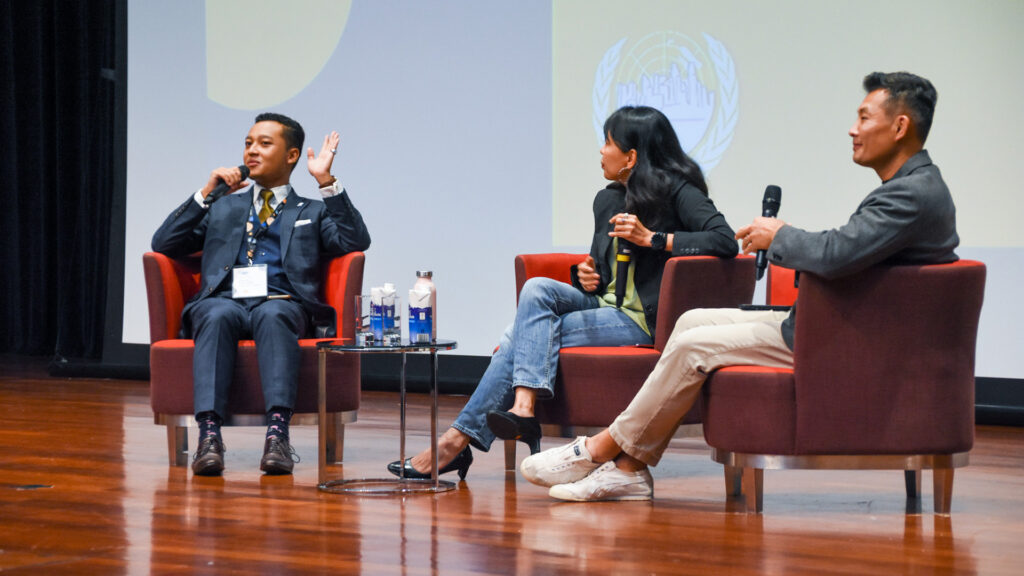
About 400 students from more than 20 secondary schools, pre-university and tertiary institutions in Singapore and the Asia-Pacific region gathered to debate pressing global developments and issues such as healthcare, climate change and peacekeeping at the 20th Singapore Model United Nations (SMUN) conference.
Organised by the NUS Political Science Society (NUSPSSOC) from 6 to 9 June at NUS University Town, the turnout is the highest in the event’s history.
Themed “20 Years of Diplomacy and Empowerment”, the flagship NUSPSSOC event saw students taking on the roles of UN delegates and councils such as the United Nations Security Council and international organisations like the North Atlantic Treaty Organization and the World Health Assembly to engage in intense discussions and negotiations on the most challenging problems facing the world today.
Guided by the theme, Dr Vivian Balakrishnan, Singapore’s Minister for Foreign Affairs delivered a keynote speech about the “storm clouds” looming over Singapore – the Russia-Ukraine conflict, competition between the US and China and the upsurge of anti-globalisation sentiments.
Singapore is a diverse and small country that is highly dependent on trade. To survive in such headwinds, Dr Balakrishnan said Singapore should continue to uphold a rules-based international order, strengthen multilateral cooperation and make more friends.
Stressing the importance of unity in facing these challenges, he commented, “Foreign policy begins at home…If Singapore was not united, cohesive, successful, relevant, useful and constructive, nobody would care.”
Dr Balakrishnan also spoke about the need to harness opportunities brought about by new technologies including digital technology and renewable energy. To illustrate the potential of digital technology, he used artificial intelligence software such as Perplexity AI and ChatGPT onstage to seek their views on the topics that were in discussion.

An enriching exchange of views
The SMUN conference is a simulation of the meetings that United Nations members often have, and saw students participating as delegates in 11 intense councils debating 22 topics.
Participating students, known as “delegates” work as representatives of a council to solve a problem with fellow delegates. They conduct research, formulate position papers and create policy proposals that they will debate with other delegates in their council. At the end of the event, delegates will vote on draft resolutions, with the goal of passing them with a majority vote. The best performing delegates in each council will be recognised with awards.
Standout sessions over the four-day period included one that focused on the European Commission’s 2030 Climate Plan to cut greenhouse emissions in Europe by at least 55 per cent by 2030 and examined EU countries’ historical responsibility to climate change. Delegates reviewed existing policies and proposed creative solutions to resolve the region’s climate issues.
Another interesting council session was by the World Health Assembly which focused on the protection of healthcare workers. COVID-19 had highlighted their plight as many healthcare workers face the increased risk of virus exposure, burnout from long work hours, as well as discrimination and abuse from the public. The council discussed safeguards and necessary measures to ensure their physical safety and mental well-being.
At the end of the debates, local and international delegates were treated to dinner and music at the Singapore Flyer with a view of the scenic Marina Bay.
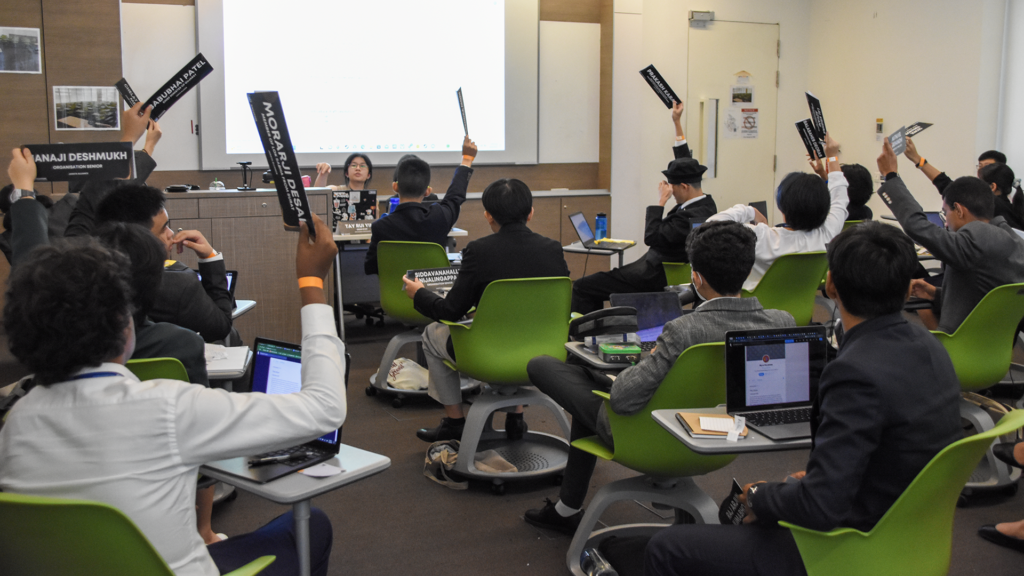
A unique learning experience for delegates
The conference’s closing ceremony on the fourth day provided delegates with the opportunity to meet with Mr David Chua, Chief Executive Officer (CEO) of the National Youth Council, and Ms Ivy Tse, CEO of non-profit youth organisation – the Halogen Foundation – who spoke at a short panel discussion on youth empowerment. Mr Chua and Ms Tse focused on the ways in which youths can help the less fortunate around the world and how the UN can serve as a bridge between developed and developing countries to do so.
Awards were also given out to delegates to commend them on their efforts and achievements across categories such as Best Delegate, Outstanding Delegate, Honourable Mentions and Best Position Paper.
Mr Raka Ramadhan from Universitas Indonesia, received the Best Delegate award and the prized gavel for his standout contributions in the United Nations Environment Agency council.
Commenting on his experience, Raka shared that he initially thought determined diplomacy and eloquent speeches were the key factors to being the best delegate. However, the heated and rigorous debates while role-playing a country within a council made for an intense experience which gave him fresh perspectives. The friendships forged and bonds made despite the intense discussions also made it very memorable.
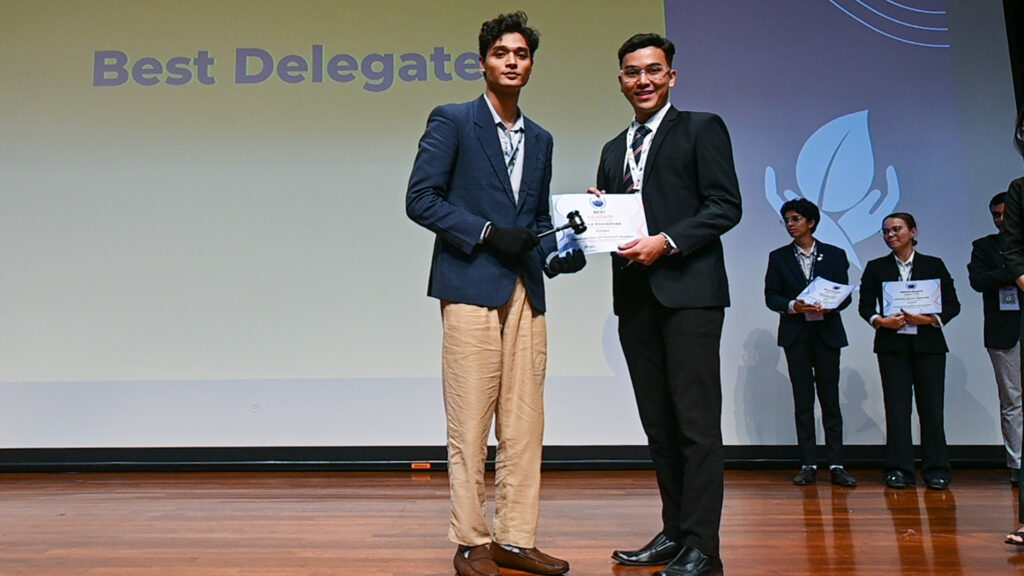
SMUN Secretary General and Year 2 FASS-Political Science student Zahid Zailani shared how the SMUN conference presented a unique opportunity for students to hone their critical thinking and public-speaking skills, as well as cultivate nuanced perspectives and deep empathy for global issues. “Ultimately, the sessions reveal that world events have reverberating impacts. We all bear a shared responsibility to create solutions to global problems.”
This story by the NUS Political Science Society at FASS first appeared in NUSnews on 14 July 2023.
A Homecoming for All: NUS Alumni Across Campuses and Generations Reunite at Bukit Timah
IN BRIEF | 5 min read
- NUS Homecoming 2023 brought together more than 800 NUS graduates at the Bukit Timah Campus to celebrate their alma mater.
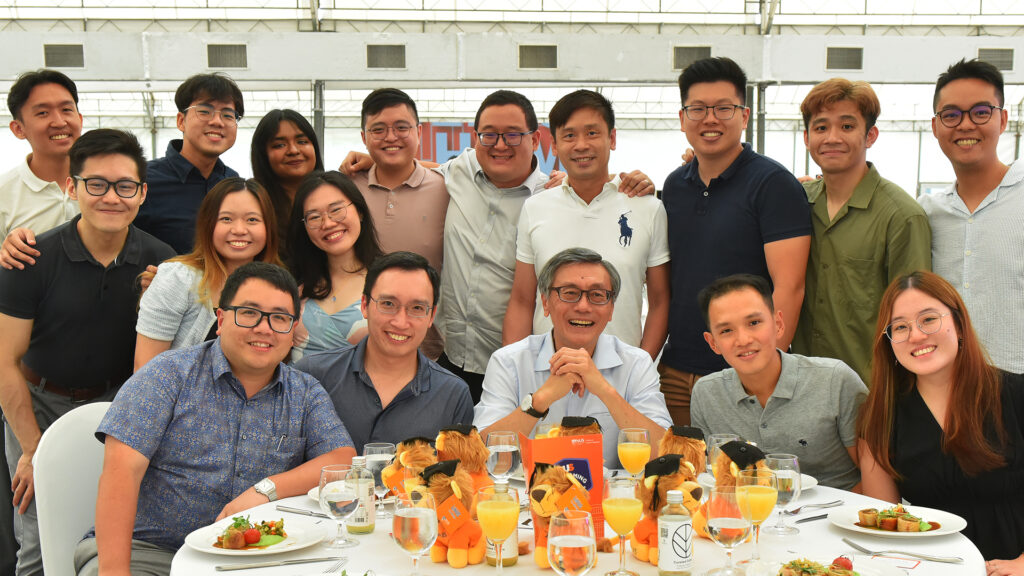
It was a jubilant reunion for the more than 800 alumni who attended NUS Homecoming on 1 July 2023. Organised by the NUS Office of Alumni Relations and co-hosted by NUS Law and the Lee Kuan Yew School of Public Policy (LKYSPP), the event held at the Bukit Timah Campus brought together multiple generations of NUS graduates for a day of celebration and connection.
Importantly, the event marked the first occasion where graduates from the Bukit Timah, Kent Ridge and Outram campuses came together for a combined Homecoming. Participation at the event also reflected the diversity of the alumni community, with overseas alumni from Hong Kong, the Philippines, and New Zealand flying to Singapore for the occasion, and alumni from the Class of 1953 to 2023 also in attendance.
“Homecoming is not only an opportunity to make new memories with old friends, but also an opportunity to make new friends from across campuses, faculties, countries, and cohorts,” said Ms Ovidia Lim-Rajaram, Chief Alumni Officer, NUS.
Morning activities centred on a variety of insightful seminars and workshops hosted by NUS staff and alumni, with highlights including a conversation between Professor Wang Gungwu (Arts-History ’53) and Ambassador Chan Heng Chee (Arts-Political Science ’64); a talk on “An Adventure in the Pursuit of Happiness” by Mr Jonathan Sim (Arts and Social Sciences-Philosophy ’13); a cocktail mixing session by Associate Professor Kevin SW Tan (Science ’94); as well as a line dancing lesson led by Mr Lim Chee Kiang (Engineering ’83).
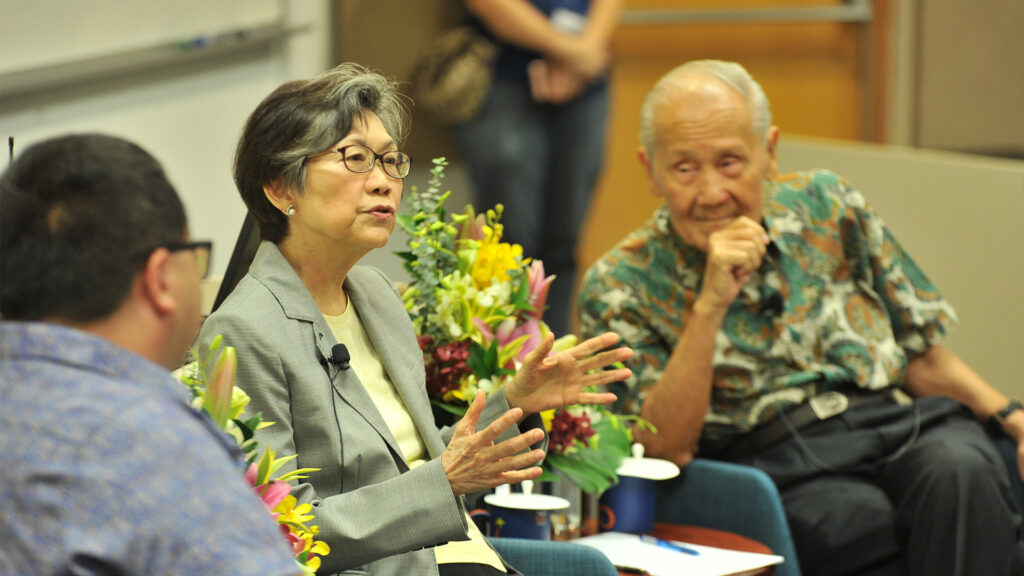
Attendees were also able to visit College Green, which previously operated as Dunearn Road Hostels for the undergraduates of the then-University of Malaya, and which now serves as a hostel for LKYSPP students.
During lunch, attendees enjoyed performances from NUS musical groups Red Dot Baroque, Resonance and The Jazzlings, while engaging in stimulating conversation with fellow alumni. Recent news that NUS had climbed to 8th in the QS World University Rankings, marking the first time the University had placed amongst the world’s top ten, provided a frequent topic of conversation and point of pride amongst event attendees.
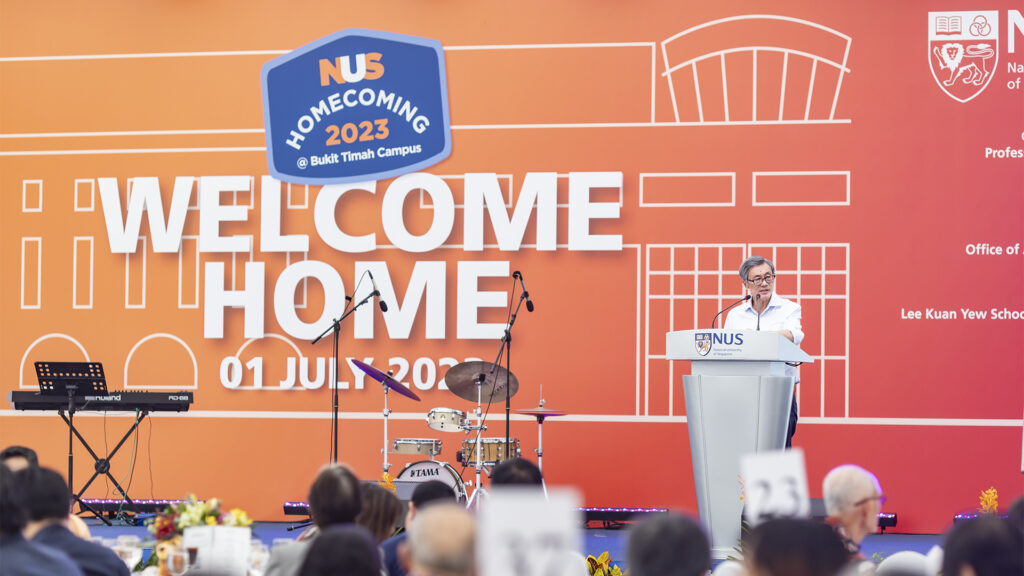
In his speech at the event, Guest-of-Honour NUS President Professor Tan Eng Chye (Science ’85) gave credit to the NUS alumni for their role in this achievement, stating that, “this remarkable growth story of our University would not have been possible without the participation and support of our alumni community.”
Noting that the University was not “standing still,” Prof Tan encouraged alumni to remain actively involved in NUS’ next phase of growth and contribute to sustaining and nurturing the University’s extended network.
This was a message that resonated with first-time attendee Raimie Tang (Engineering and Business ’21). “I benefited a lot from [my] NUS education and had many opportunities [as a result]. So I just [wanted] to come back and see how to stay connected, give back if possible, and even reconnect with other alumni.”
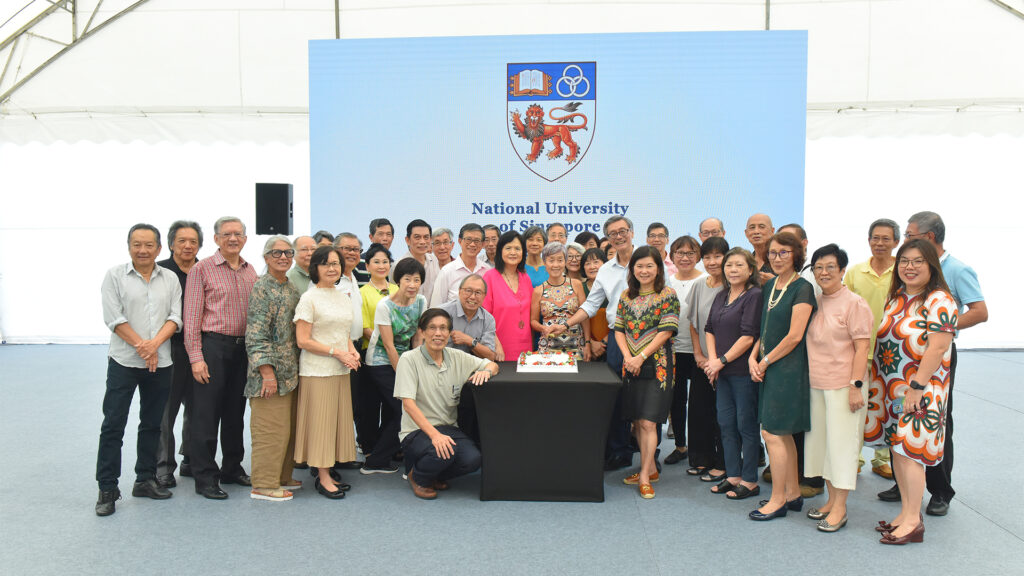
The event ended on a sweet note, as guests enjoyed a dessert buffet and cake in celebration of four milestone anniversaries: the 65th anniversaries of Eusoff Hall and Raffles Hall, the 50th anniversary of the Class of 1973, and the 20th anniversary of the Yong Siew Toh Conservatory of Music.
This story by the NUS Office of Alumni Relations first appeared in NUSnews on 13 July 2023.
Tackling Population Challenges? Be Bolder, says Ho Kwon Ping
IN BRIEF | 10 min read
- The 1st SR Nathan Fellow of the Institute of Policy Studies (Lee Kuan Yew School of Public Policy), prominent businessman and FASS alumnus Ho Kwon Ping (Economics, History and Political Science, '78) suggests that Singapore's large transient community of foreign workers could be a future source of permanent residency or citizenship.’.
Click through image below to read this piece.
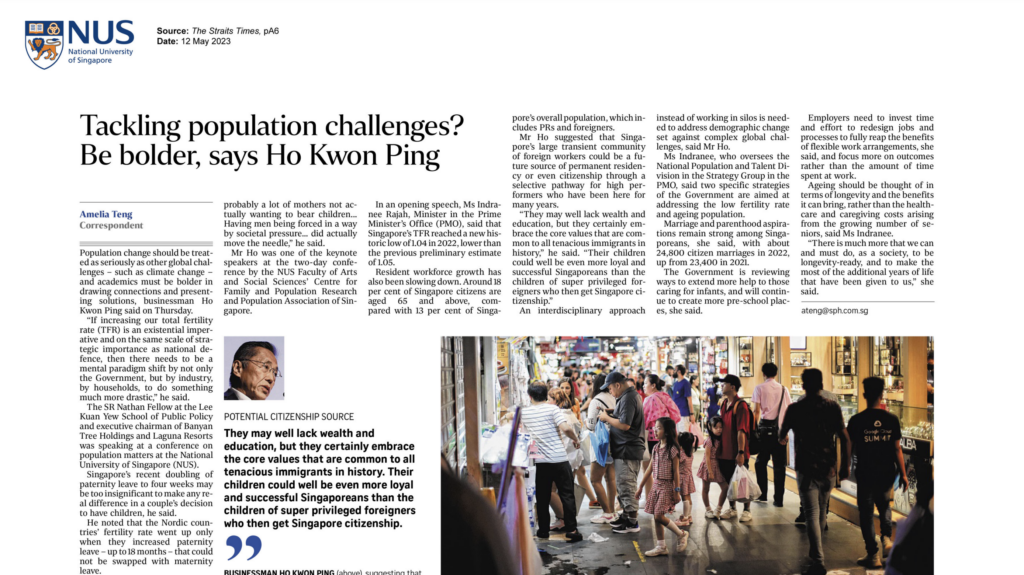
This article first appeared in The Straits Times on 12 May 2023 and NUSNews on 11 May 2023.
FASS Honours Alumni for their Profound Impact on Community and Nation
IN BRIEF | 8 min read
- This year’s honourees are Mrs Elizabeth Sam, a prominent banker; Mr Othman Bin Haron Eusofe, an influential unionist; Dr S Vasoo, a passionate social worker; Mr Benny Lim, a dedicated civil servant and policymaker; and Mr T. Sasitharan, a celebrated actor and respected voice in arts and culture – all of whom have dedicated their careers and lives to service and community in different ways.

The NUS Faculty of Arts and Social Sciences (FASS) paid tribute to five outstanding alumni for their service and contributions in various capacities towards Singapore’s nation-building, and the growth of the University and Faculty, at the recent 2022 Distinguished Arts and Social Sciences Alumni Awards (DASSAA) dinner.
The DASSAA was established in 2015 to recognise individuals who have made significant contributions to the nation and community, and dedicated their lives to the betterment and promotion of the arts and social sciences. Each of them played important roles in many areas, whether it was in shaping domestic and international policies, the business landscape, the creative environment, or in improving the lives of those around them.
This year’s honourees are Mrs Elizabeth Sam, a prominent banker; Mr Othman Bin Haron Eusofe, an influential unionist; Dr S Vasoo, a passionate social worker; Mr Benny Lim, a dedicated civil servant and policymaker; and Mr T. Sasitharan, a celebrated actor and respected voice in arts and culture – all of whom have dedicated their careers and lives to service and community in different ways.
Speaking at the awards ceremony, NUS Provost Professor Aaron Thean said, “The Faculty has honoured many alumni who have played important roles in many areas, be it in the shaping of local and international policies, the business landscape, the creative environment, or in improving the lives of NUS FASS students and beyond. The achievements of its graduates are one of the best testimonies to the work done by the Faculty.”
“The five outstanding FASS alumni who will be presented with the Distinguished Arts and Social Sciences Alumni Awards 2022 have excelled in their respective fields in public service, politics, finance, education and the arts. Their contributions to Singapore and their continued passion for what they do serves as an inspiration to many of us, especially to the FASS students who will follow in their footsteps and create their own legacies,” he added.
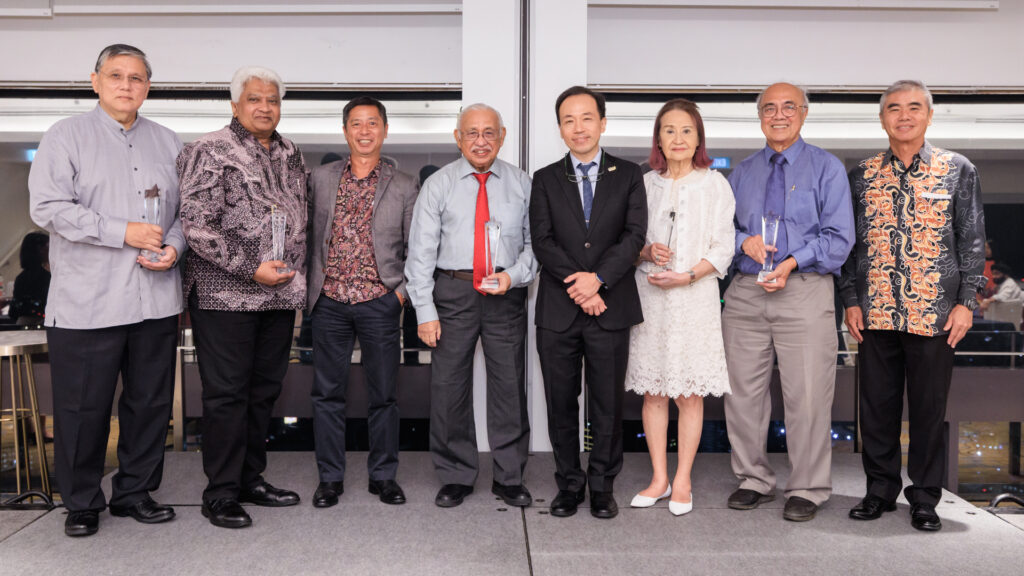
Inspiring the Next Generation of FASS Students
Mrs Elizabeth Sam is one of Singapore’s best-known female bankers. Her career spanned over 40 years, with the first half of it in the public sector where she played a key role in the growth of Singapore as a global financial centre. In 1996, Mrs Sam was awarded the Public Service Star (BBM), Republic of Singapore, for her contributions to the nation’s development as a global financial centre. The following year, she was recognised as one of the top 50 outstanding women globally in finance by Euromoney.
Currently a member of the Presidential Council for Minority Rights, Mr Othman Bin Haron Eusofe graduated with a Bachelor of Arts (Honours) from the then University of Singapore in 1964. He was a Founder Member of Yayasan Mendaki which was established in October 1982 to introduce programmes to help Malay students to improve in their educational performance. He continues to serve on the Mendaki Council. Mr Othman was also a key member of the NTUC team on the National Wages Council, and served on several Statutory Boards including the Public Utilities Board and the Civil Aviation Authority of Singapore.
Dr S Vasoo, Emeritus Professor in the NUS FASS Department of Social Work, has authored several monographs on social issues and has published various such articles both internationally and locally. He recently co-edited a book, “Singapore Ageing: Issues and Challenges Ahead”. He was awarded the Honorary Life Member of the Singapore Association of Social Workers for his outstanding contributions to social work in Singapore.
Mr Benny Lim is Chairman of the National Parks Board and the Chairperson of the Housing & Development Board. He is also Special Advisor to the Centre for Liveable Cities as well as Special Advisor to the National Security Studies Programme at the S. Rajaratnam School of International Studies (RSIS) at the Nanyang Technological University. He is also concurrently Chairman of Temasek Foundation CLG and Chairman of Temasek Lifesciences Laboratory IPC. Mr Lim started his career in the public service as a police officer, and went on to develop an illustrious career in the public sector, holding prominent roles in the Ministry of Home Affairs, Ministry of National Development and the Prime Minister’s Office, amongst others.
Mr T. Sasitharan, or more fondly known as Sasi to the arts community in Singapore, is widely acknowledged as one of the foremost thinkers and contributors to the development of the local arts scene. A former Philosophy teacher and arts journalist, Mr Sasitharan is a respected voice in discourses on arts and culture. His essays, commentaries and reviews, on the place of the arts in society, the value of culture, actor training, arts education, theatre criticism, aesthetics and creativity, have been published internationally while his speaking engagements have been at universities, conferences and arts forums around the world.
Congratulating the 2022 DASSAA recipients for their achievements, FASS Dean Professor Lionel Wee said, “Your achievements and your journey inspire the next generation of students who will follow in your footsteps. You have paved the way for them to build on your successes, to take risks, and to innovate in ways that will help make our world a better place. I want to congratulate each of the FASS Distinguished Alumni Award recipients. You have made your mark on the world, and you have done so with integrity, compassion, and a commitment to excellence.”
Read the full citation of the 2022 DASSAA recipients here.
This story first appeared on NUSnews on 10 May 2023.
NUS Political Science Briefs JC2 Students on Politics and Government in Singapore
IN BRIEF | 2 min read
- Deputy Head of NUS Political Science Associate Professor Bilveer Singh spoke to a group of second-year National Junior College (NJC) students about politics in Singapore, its evolution, current state and future outlook, as well as the issues, trends and movements shaping its development.
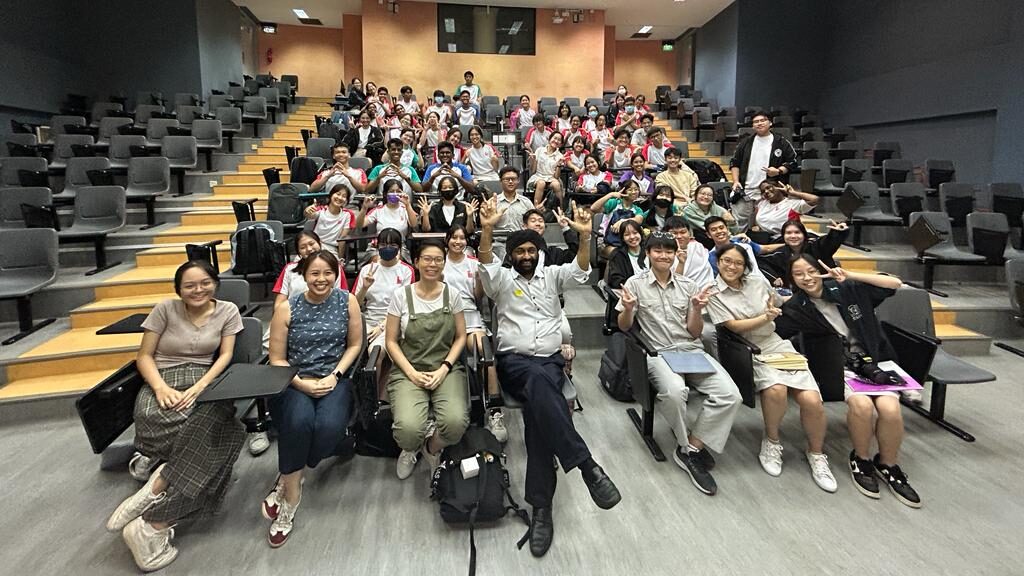
More than 50 National Junior College (NJC) students heard from Associate Professor Bilveer Singh, Deputy Head, NUS Political Science, who visited their school on 29 March 2023. Assoc Prof Singh spoke to the second year JC students under the rubric, ‘Perspectives on Singapore’s Politics’. Following his 25-minute presentation on the key drivers of Singapore’s politics and where national politics have reached today and the future outlook, Assoc Prof Singh engaged the students in an hour-long discussion on major issues pertinent to the topic, including: race relations and class struggle, corruption, nepotism and cronyism, political succession, role of the Opposition, rising liberalisation and what politics could look like in the coming years.
The students were enthused by the level of engagement during the dialogue and said they were looking forward to coming to the NUS campus for the College of Humanities and Sciences (CHS) Open House on 13 May 2023, and further exploring their academic options at FASS, CHS and NUS.
NUS Open House: More than 7.7M Visitors Drawn to Action-Packed Showcase over 10 Days
IN BRIEF | 25 min read
- NUS Open House 2023 saw a strong showing by visitors eager to find out about the University’s academic programmes, as it returned in from 25 February to 6 March. Some 7.71 million visitors attended the physical and online showcase which involved 3,071 faculty and staff, students and alumni.
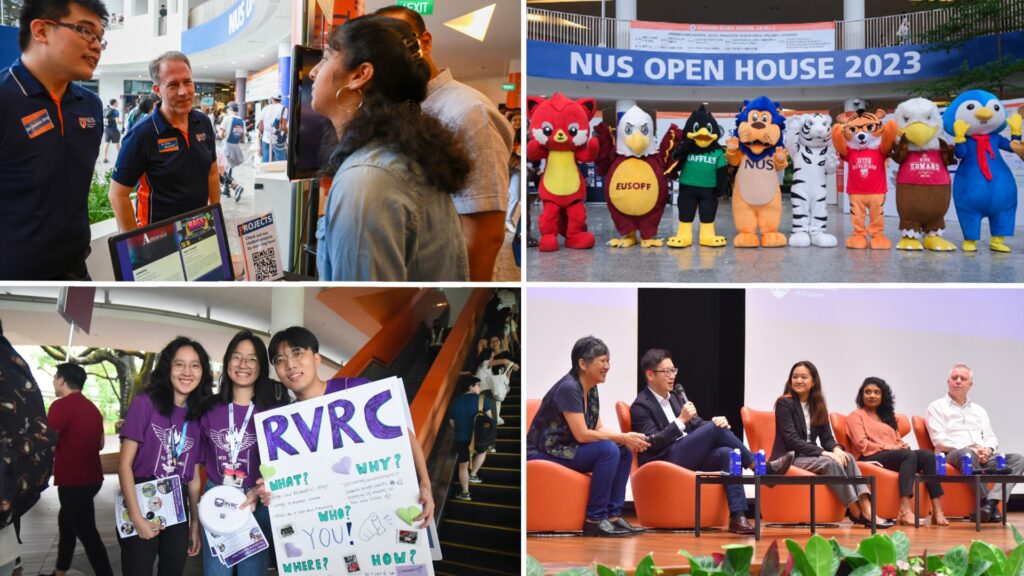
NUS Open House 2023 saw a strong showing by visitors eager to find out about the University’s academic programmes, as it returned from 25 February to 6 March. Some 7.71 million visitors attended the physical and online showcase which involved 3,071 faculty and staff, students and alumni.
Kicking off the 10 action-packed days were the informative virtual talks, webinars, and social media sessions. The on-campus event on 4 March saw packed crowds at the programme booths, talks, special classes, campus tours, student life performances and residential venues despite the heavy downpour. Prospective students gained valuable insights from faculty members, explored the University’s extensive global opportunities, as well as its diverse entrepreneurship platforms and lifelong learning courses, giving them a comprehensive overview of what NUS has to offer.
“I really enjoyed meeting the professors and students who are from the courses I'm interested in as I gained many insights from them on life in NUS and the various possibilities that are open for exploration,” said prospective student Karthika Warrier, an alumna from Raffles Institution who is considering applying to NUS Computing or the College of Humanities and Sciences (CHS).
Jasmine Chiam, an alumna from Nanyang Junior College (NYJC) who is interested in applying to CHS and NUS College, agreed. “The programme was well-run despite the fact that it was raining,” she said. “I felt that it was well-curated for students with different interests.”
A draw for many prospective students were CHS, the newly launched NUS College, and the College of Design and Engineering (CDE) – the University’s recent interdisciplinary pathways aimed at meeting the evolving demands of the workforce.
Addressing Shared Challenges with the Humanities and Sciences

CHS, which provides an enhanced undergraduate experience for students of the Faculty of Science (FOS) and the Faculty of Arts and Social Sciences to pursue breadth and depth across academic disciplines, showcased its Common Curriculum throughout the Open House.
Currently accepting its third intake, it held talks on hot topics such as sustainability, food science and technology, and mental health to demonstrate how students can apply various perspectives to address complex real-world issues.
The panel entitled “Why Sustainability and Climate Change Matter” saw speakers from the Geography, Japanese Studies, Anthropology and English, Linguistics and Theatre Studies departments weighing in on the topic from their respective disciplines. Another session by the Department of Food Science and Technology explained how its programme applies principles from chemistry, biology, engineering and nutrition to address issues such as food safety and security, as well as the careers its graduates can pursue.
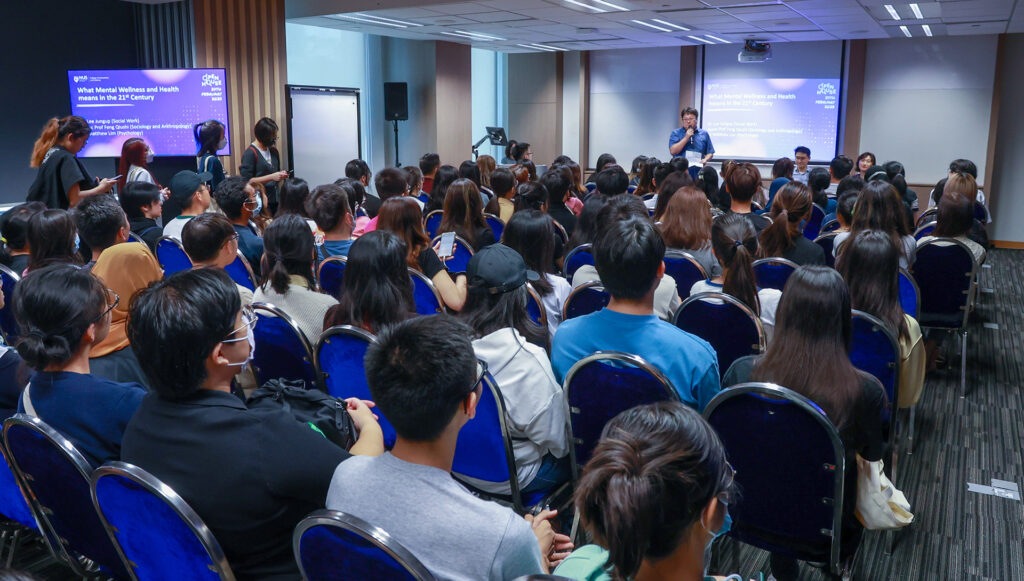
In the same vein, the panel “What Mental Wellness and Health Means in the 21st Century” saw speakers from the Social Work, Sociology and Psychology departments discuss perceptions of mental health in society. Dr Lee Jungup, an Assistant Professor in Social Work, pointed out the close relationship between social work and psychology. “Many of our Social Work students consider a double major with Psychology,” she said, noting that social work emphasises the practical while psychology is more theoretical and clinical in nature.
Jasmine, the NYJC alumna, said the various informative talks reaffirmed her decision to apply to NUS. “The NUS College tour as well as the CHS Common Curriculum sharing were particularly informative. They made the programmes seem quite appealing and I am looking forward to applying for both,” she said.
For some like Christian Chua, an alumnus from the NUS High School of Math and Science, attending the Open House talks helped clarify the career options available for the different programmes.
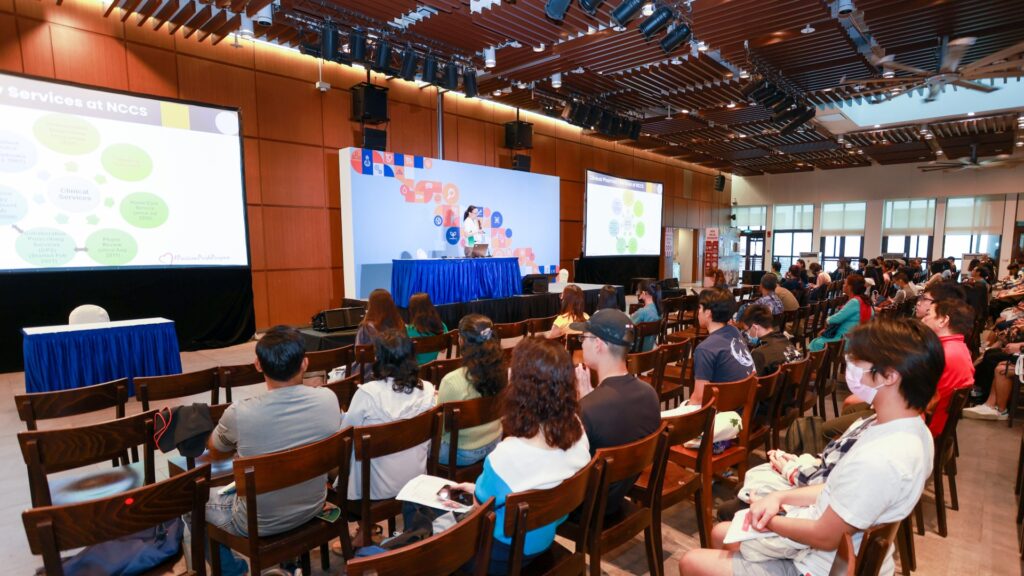
Christian, who is currently considering the Medicine, Pharmacy, and Pharmaceutical Science programmes, attended the Pharmacy talk and booth, where faculty members of different specialisations touched on the various career pathways and the collaborative practices of the discipline.
“It was useful that they discussed the different careers that Pharmacy graduates had gone into so I knew a degree in Pharmacy wouldn't just limit me to community or hospital pharmacy but also to the R&D, drug approval side, or the business side as well,” he said.
Shaping the Future of Design and Engineering
Meanwhile, there was action aplenty over at both the online and in-person Open House by CDE, which is accepting its second intake. Officially launched in November 2021, CDE was a merger of the Faculty of Engineering and the School of Design and Environment, ramping up the distinctive interdisciplinary experience at NUS.
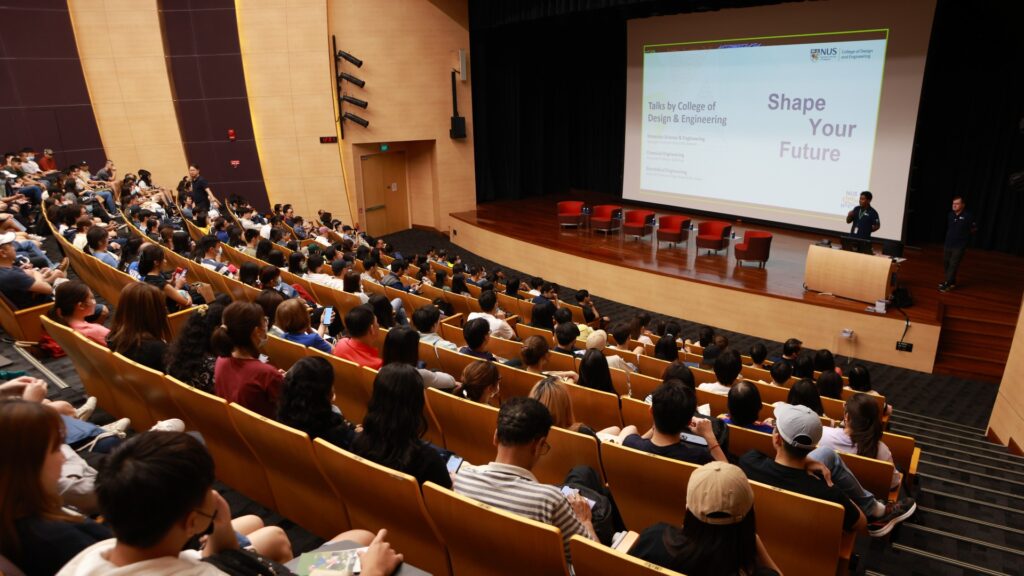
From the Common Curriculum and the multidisciplinary education model, to the Student Exchange Programme and future career prospects, CDE faculty and students shared their insights on a plethora of topics with prospective students.
The talks, such as the one on Biomedical Engineering, Chemical Engineering and Materials Science & Engineering, also provided valuable information. Prospective students learnt how undergraduates are exposed to a range of interdisciplinary topics with global-scale applications in class, and how NUS engineers are taking on the world’s biggest challenges, such as clean energy.
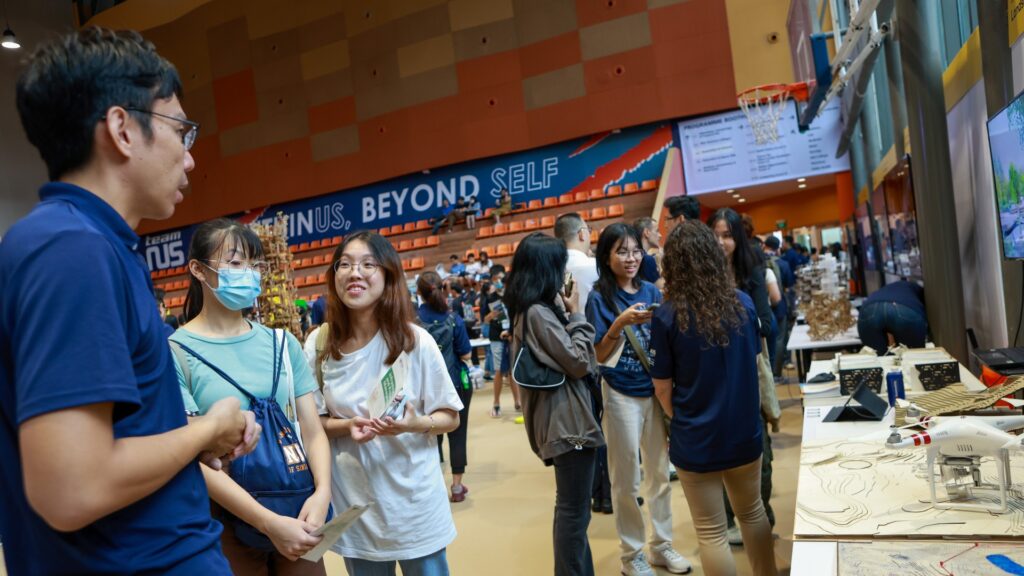
The talk on Architecture, Industrial Design and Landscape Architecture also saw a large turn-out. Discussing the breadth and depth of CDE’s curriculum, it touched on how students will be equipped to face the 21st-century challenges through their education in CDE.
Kaisyn, who is graduating from Nanyang Polytechnic this year, said, “I appreciated that they covered the basic skills and activities done throughout the curriculum. It allowed me to confirm that the Industrial Design course is relevant to my study and career plan.”
The in-person Ask-Me-Anything sessions with student panels also allowed participants to get their burning questions answered.
Tee Jia Hong, a graduate of Anglo-Chinese Junior College who intends to apply to Industrial and Systems Engineering (ISE) and attended the student sharing, said, “By listening to the experience from the ISE senior, I am able to get the hang of the academic and co-curricular prospect of being an ISE student.”
Over at CDE’s Rise of the Robots campus tour, participants were given a look at the Advanced Robotics Centre, which displayed projects such as an autonomous wheelchair, an artificial robotic arm, and a haptic feedback machine.
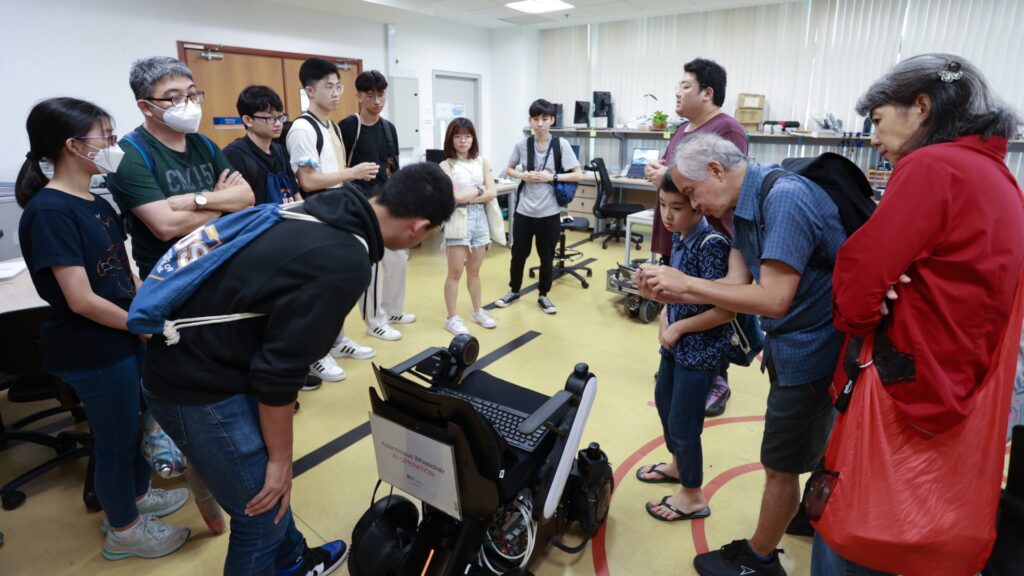
Robert Lim from Singapore Polytechnic, who attended the tour, said, “It was a memorable experience . . . I was able to learn more about what the courses have to offer and what undergrad students have accomplished in NUS.”
Exploring experiential learning
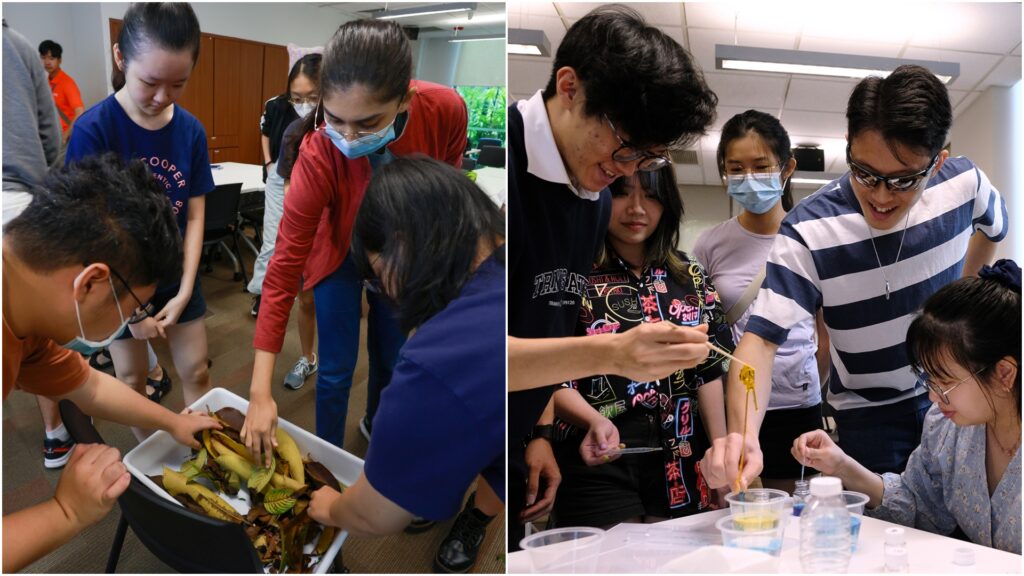
NUS College, Singapore’s first honours college, offered a glimpse of its flagship experiential learning programmes during its online and physical showcase. Faculty members highlighted the Impact Experience programme, where students develop solutions to real-world issues with community partners, and the Global Experience programme, which immerses them in global cities for specially curated courses and field visits based on specific themes.
The college, which is accepting its second intake, also held special classes for prospective students to get a feel of its small-group seminar-style lessons. Dr Ang Yuchen’s special class introduced his field course Biodiversity and Natural History in Singapore, which combines scientific concepts with the visual and language arts and environmental philosophy.
“I found the sample lessons useful in helping me not just get a sense of how lessons are conducted over at NUS College, but also how my potential Profs are like as teachers and facilitators,” said Eugene Teo, an alumnus of Raffles Institution, explaining that small, collaborative discussions was better suited to his learning style. Attending the Open House “also gave me a better understanding of the people I will be interacting with and the environment in which I would be studying in upon entering university life”, he added.
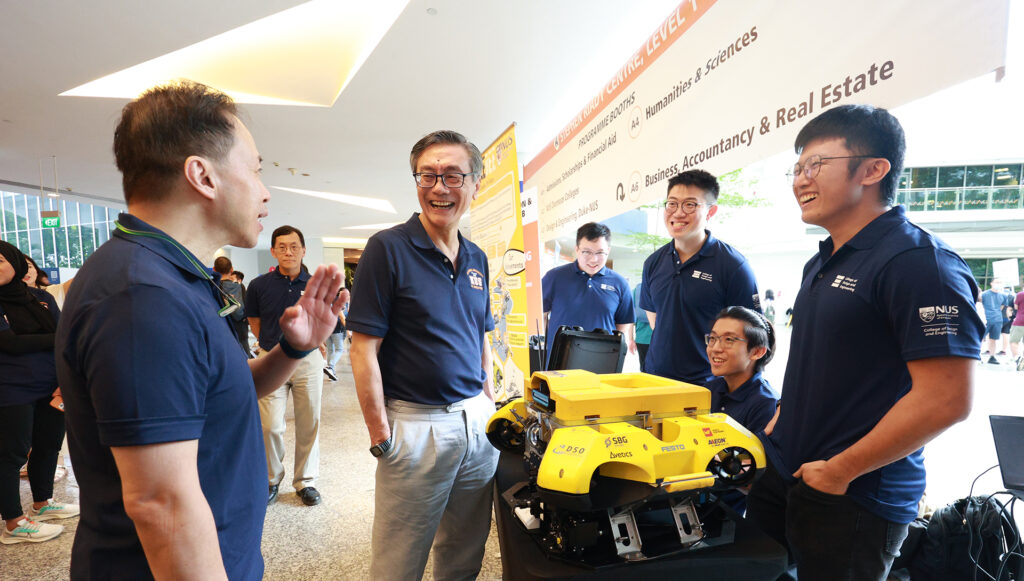
Interactivity was a prominent feature of the Open House. NUS Nursing offered visitors a chance to try basic wound treatment and resuscitation, while NUS Law held moot demonstrations at its Bukit Timah Campus.
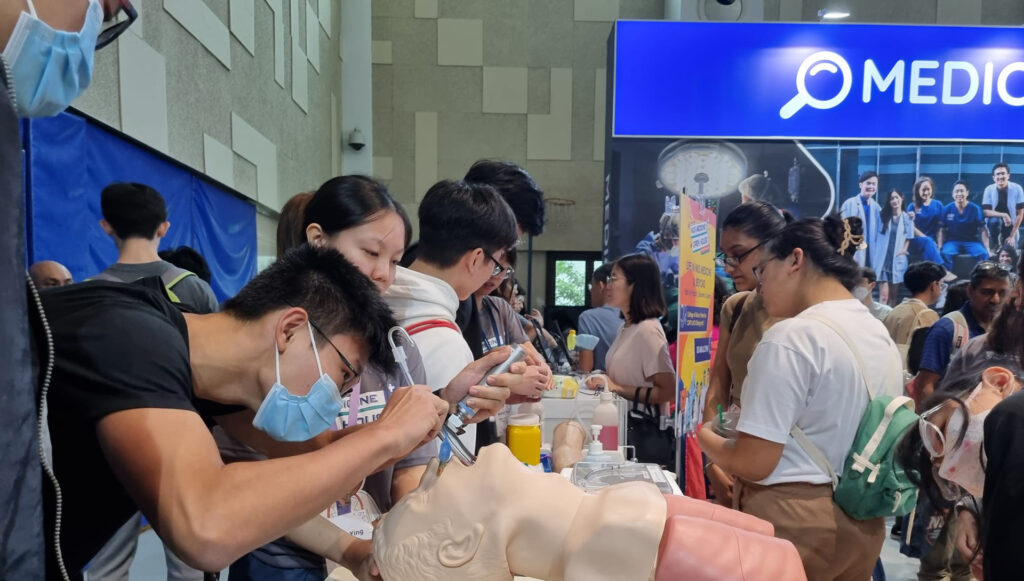 |
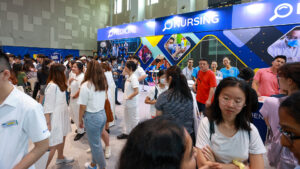 |
Aqirah Bte Azam, who will be graduating from Temasek Polytechnic in May, had the chance to see the Nursing students in action and attended a talk by its alumni. “Hearing their experiences in NUS and their careers have given me the courage to pursue my aspirations in nursing”, she said.
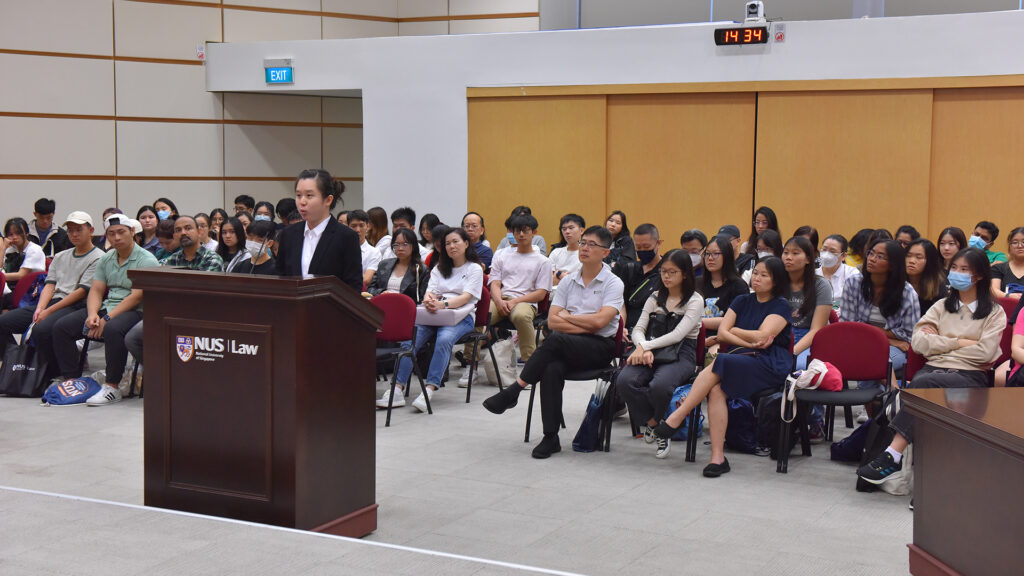
Smorgasbord of Student Life
Visitors also got a taste of the vibrant NUS student life on display. Student clubs and societies, as well as the Hall and Residential College (RC) interest groups, put their best foot forward at the Student Village.
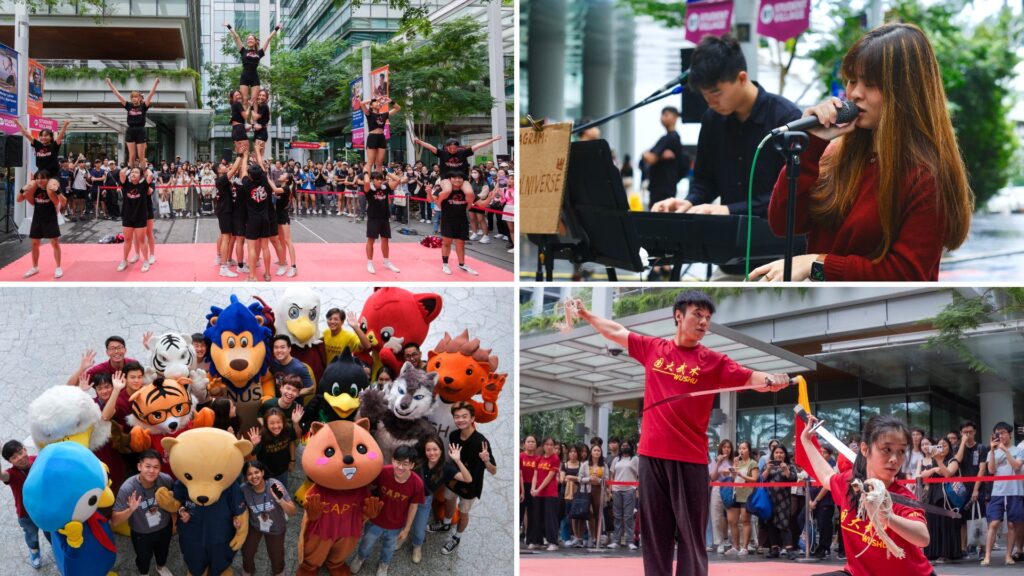
Visitors were wowed by the striking moves of NUS Wushu, the energetic cheerleading displays of King Edward VII Hall’s KE Titans, and the snazzy K-pop dance moves of the Korean Cultural Interest Group. They were also treated to renditions of catchy tunes from Mandopop group NUS CAC Voices, acapella group NUS Resonance, Raffles Hall rock and jazz band RHockerfellas, and many more.
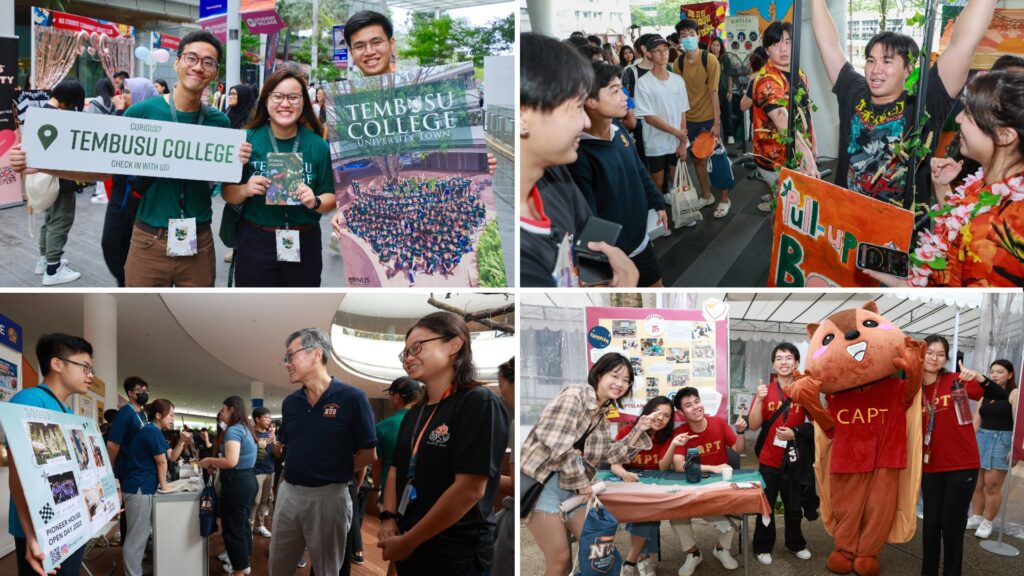
Representatives from the RCs, halls, and houses were present to offer prospective students the inside scoop on the on-campus experience. Complemented by A-Day-in-the-Life videos and 360° virtual tours, the booths, talks, and Ask-Me-Anything panels by student leaders gave participants a sense of the residential options at their fingertips.
“The House Life talk was the most enjoyable and informative event to me since the masters and students really explained to me what living in houses was like, while keeping us engaged through jokes and videos,” said Jia Hong.
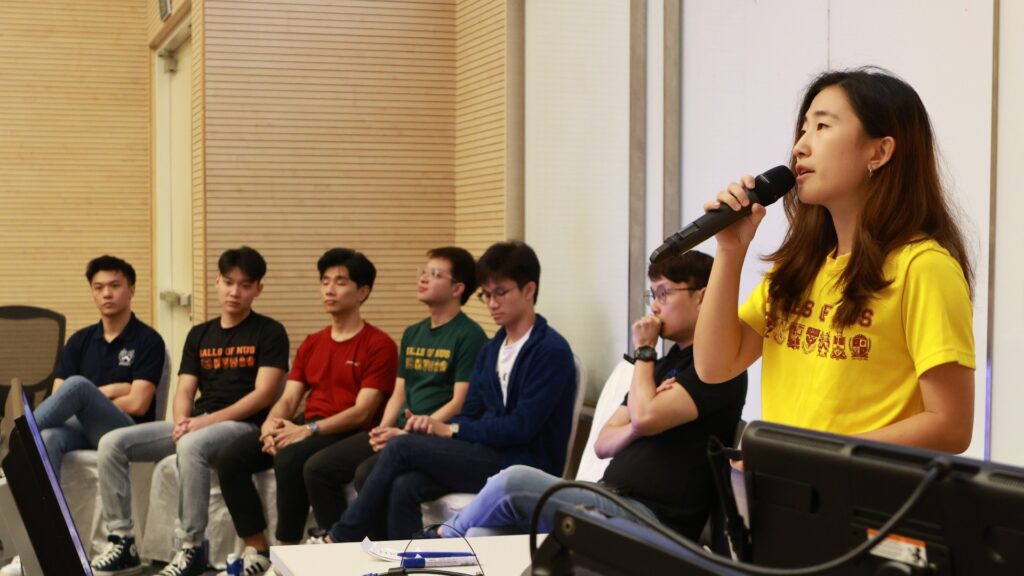
Charlotte Toh from Singapore Polytechnic, said the Halls talk helped her better understand the hall culture and admission criteria.
Guided in-person tours of the various halls and residences, such as King Edward VII Hall, Tembusu College, Ridge View Residential College, and Residential College 4, opened a window to the close-knit community of residential life.
Samuel Liu, who graduated from National Junior College, said, “The well-guided tours and booths set up for each RC that I visited gave me a good indication of which RC would be most suitable for my character and goals.”
This story first appeared on NUSnews on 9 March 2023.
FASS Inspiring Mentor 2022 Award Winners Announced

The NUS Faculty of Arts and Social Sciences is proud to announce the winners of the 2022 FASS Inspiring Mentor Awards.
Congratulations to:
- Assoc Prof Melvin Yap Ju-Min, Associate Professor, Department of Psychology
- Assoc Prof Robin Loon Seong Yun, Associate Professor, Department of English Language and Literature
- Dr Amazaki Osamu, Senior Lecturer, Centre for Language Studies
- Dr Natalie Pang Lee San, Senior Lecturer, Department of Communications and New Media
- Dr Kamalini Ramdas, Senior Lecturer, Department of Geography
The NUS Career Compass 2023
IN BRIEF | 5 min read
- Find out how the University has developed and broadened our curriculum to better prepare our graduates for the swiftly evolving workplace, and how interdisciplinary learning can help students solve complex issues in our society.

In collaboration with CNA938
How does NUS cultivate highly sought-after talents in the workforce of the future?
Find out how the University has developed and broadened our curriculum to better prepare our graduates for the swiftly evolving workplace, and how interdisciplinary learning can help students solve complex issues in our society.
This story first appeared on NUSnews on 23 February 2023.
CHS at NUS Open House 2023: Download the FASS Essentials on 27 February 2023
IN BRIEF | 10 min read
- On 27 February, get the full download on the essentials of academic programmes, student life, career preparation, overseas opportunities and financial aid at CHS via Zoom in the ‘virtual’ edition of CHS@NUS Open House 2023.
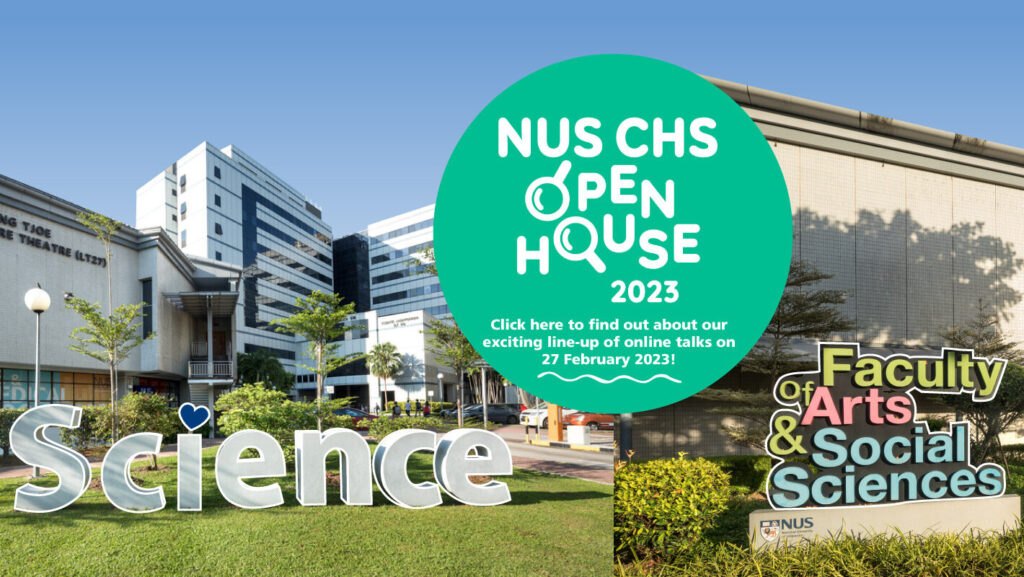
If you have not already marked your calendars for two dates with the NUS College of Humanities (CHS) during NUS Open House 2023, do it now!
On 27 February, get the full download on the essentials of academic programmes, student life, career preparation, overseas opportunities and financial aid at CHS via Zoom in the ‘virtual’ edition of CHS@NUS Open House 2023. Go to https://bit.ly/CHSatNUSOH2023-Virtual for the full 27 February programme.

Then prepare to come on-campus on 4 March to engage with our award-winning faculty members, advisors and students to experience interdisciplinary education and explore your future vocation. Go to https://bit.ly/CHSatNUSOH2023-OnCampus for the full 4 March programme.
To help you plan your way through the lineup of FASS-specific talks and activities, read on for some of our highlights on 27 February 2023 that ought not to be missed.
Academics at the Forefront
The online edition of CHS@NUS Open House is meant to provide you with as comprehensive a briefing of what CHS, and its component Faculties of Arts and Social Sciences, and Science, have to offer students.
Academics is at the forefront and the day starts with a session devoted to the CHS Core Curriculum (9:00 – 11:00 am), a specially curated interdisciplinary programme that provides unprecedented freedom to choose the pursuit of breadth and depth across a broad spectrum of disciplines. This session will be led by Professor Sow Chorng Haur, Vice Dean (Outreach & Admissions), NUS Faculty of Science (FoS), and Dr Noorman Abdullah, Assistant Dean (External Relations & Student Life), FASS.
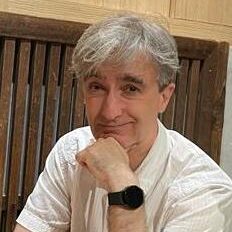
Associate Professor Luke O'Sullivan
The CHS Cross-Disciplinary Programmes
Three one-hour talks devoted to introducing Cross-Disciplinary Programmes (XDPs) offered by CHS will be running concurrently from 11:00 am. One programme FASS offers that embodies the concept of interdisciplinarity is the Philosophy, Politics, and Economics XDP, and the session for that will be led by Associate Professor Luke O’Sullivan (NUS Political Science) in discussion with fellow PPE Joint Programme Committee member, Dr Joel Chow (NUS Philosophy).
"This session is an opportunity to ask questions about the PPE-XDP. Philosophy, Politics, and Economics is a classic combination of disciplines that was first taught in Oxford and has spread globally because of its proven effectiveness. It brings together the ability to think about ideas in abstract and analytical terms, explore their practical implications for society, and model their costs and benefits in quantitative terms,” says Assoc Prof O’Sullivan. “PPE students can expect to develop a unique knowledge base and set of skills that leaves them suited for a wide range of careers in today's complex and fast-changing world."
Attendees are required to come prepared, because in addition to providing an overview of the PPE-XDP, Assoc Prof O’Sullivan expects audience engagement. Join the PPE-XDP session on 27 February at 11:00 am here.
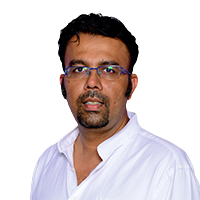
Associate Professor Rajesh Rai
Asian Studies @ CHS
NUS is recognised as a global centre of excellence in Asian Studies, where a multidisciplinary and comparative approach to the study of Asia and its regions is adopted. The session on programmes by the various Asian Studies departments at NUS (2:00 – 2:50 pm) will feature Associate Professor Rajesh Rai (NUS South Asian Studies), Dr Faizah Zakaria (NUS Malay Studies), Associate Professor Tham Shiao Wei (NUS Chinese Studies), Dr Clay Eaton (NUS Japanese Studies) and Dr Mohamed Effendy Abdul Hamid (NUS Southeast Asian Studies).
“You probably hear a lot about how Asia is the largest continent in the world, with the greatest diversity of cultures, philosophies, political thought and economic might, as well as scientific and technological advancement,” says Assoc Prof Rai, offering up a brief on the discussion he will be leading as moderator. “This session will take you through an interdisciplinary journey through history and current affairs to show you just how influential Asia has been a force for change, both positive and negative, on the world’s stage.”
Join this session by clicking here.
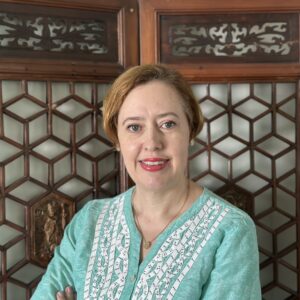
Humanities @ CHS
Learn more about the academic disciplines that focus on studying different aspects of the human condition from: Dr Donna Brunero (NUS History); Associate Professor John Whalen-Bridge, Associate Professor Graham Wolfe and Dr Leslie of NUS English, Linguistics and Theatre Studies; and Dr Zachary Barnett (NUS Philosophy).
“Do you: Ponder big questions regarding life, society, and culture? Wonder how language develops? Hold theatrical ambitions? Find yourself curious about connecting the past and present, the local and global?” session moderator Dr Brunero asks rhetorically. “If so, join us as we answer questions regarding our disciplines and share insights into how studying with us at NUS can broaden your horizons.”
To join Dr Brunero and her fellow speakers in this 3:00 - 3:50 pm session click here.

Social Sciences I: Same, Same but Different
This session features Dr Kamalini Ramdas (NUS Geography), Associate Professor Feng Qiushi (NUS Sociology and Anthropology), Dr Elaine Tan (NUS Political Science) and Dr Georgios Georgiou (NUS Economics), and will delve into their respective programmes as well as approaches toward forging a “collective identity”.
Session moderator Dr Kamalini explains. “This panel brings together social scientists from Economics, Geography, Political Science and Sociology to discuss what it takes to develop a collective identity as social scientists,” says Dr Kamalini, who will be working with her fellow speakers toward answering questions such as, “What are the benefits and challenges of a collective approach to learning and research? How might our students benefit from our commitment to engage?”
Click here to join the Social Sciences I (4:00 – 4:50 pm) session.
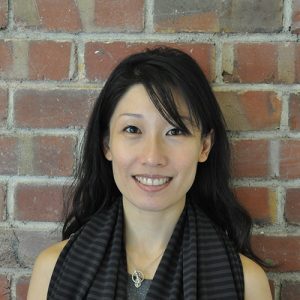
Social Sciences II: Understanding Social Complexity
Dr Adelyn Lim (NUS Sociology and Anthropology), Associate Professor Irene Ng (NUS Social Work), Dr Nina Powell (NUS Psychology) and Dr Alex Mitchell (NUS Communications and New Media) will be introducing the disciplines offered by their respective Departments, and show how they can each be applied to enable a deeper understanding of our world.
“The world we live in today can feel exciting but also downright contradictory. Global friendships are in many ways easier to make than in the past, yet we see terrorism, violent crime, wars, and enduring social inequality,” says session moderator Dr Lim, who will be discussing in detail with her fellow speakers complex issues thrown up by questions such as, “How did this world come about? Where are we heading in the future?”
To join the Social Sciences II (5:00 – 5:50 pm) session, click here.
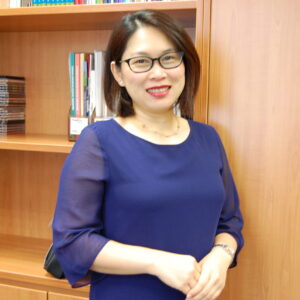
Ms Sasiwimol Klayklueng
Foreign Language Studies: Passport to the World
Meet leading Language instructors Ms Sasiwimol Klayklueng (Thai), Dr Sandhya Singh (Hindi and Tamil), Ms Indianti Tjan (Indonesian), Ms Rungnapa Kitiarsa (Thai) and Ms Sophie Undorf Bouvier (French), who will elaborate on the Minor in Language Studies and Proficiency Certificates conferred by the NUS Centre for Language Studies, which are very much sought after by students looking to enhance their career prospects.
A Winning Vision of a City on Cleaner Energy in 2060
IN BRIEF | 15 min read
- NUS undergrads crowned national champions of Shell Singapore’s ‘Imagine the Future Scenarios’ competition.
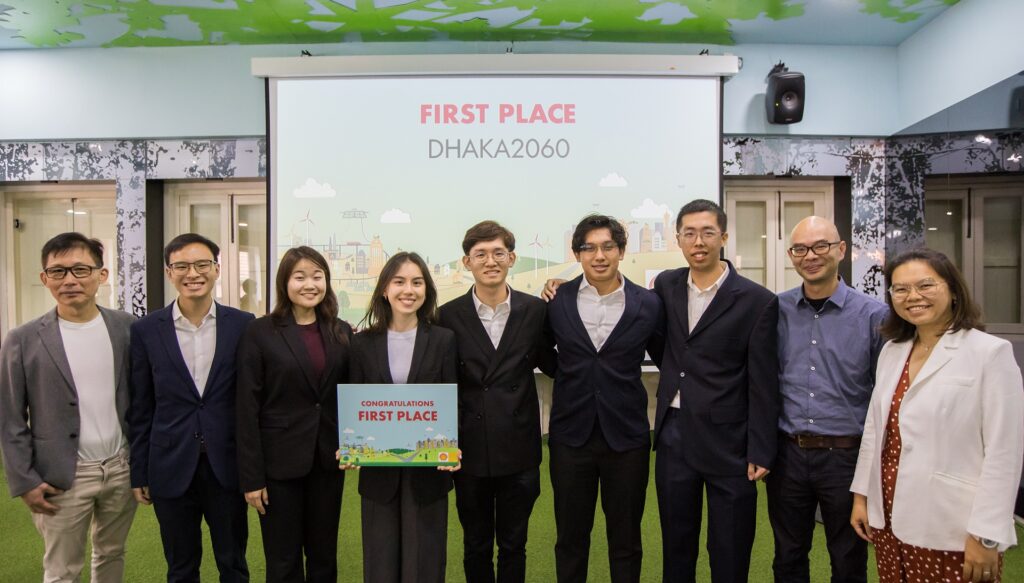
Over the year-end holidays, six second-year students from the College of Humanities and Sciences and NUS College at the National University of Singapore banded together to take on the interdisciplinary challenge of envisioning what the future could be if a city ran on cleaner energy.
Signing up for the 2022/2023 ‘Imagine the Future Scenarios’ competition to dream up two such alternate scenarios for an Asian or Middle Eastern city, the students envisioned how Dhaka’s ability to tackle climate change and rapid urbanisation would chart the future of Bangladesh’s capital city, eventually emerging national champions in the competition.
This is the seventh edition of the competition organised by Shell Singapore to encourage students to use their knowledge and imagination to anticipate the future and the challenges it could bring.
Team leader for ‘Team DHAKA2060’, Sophie Du Toit, said she and her team mates were drawn to the competition’s blue-sky proposition which allowed breadth for exploration, creativity and critical thinking, while challenging participants to consider the future from a grounded, realistic perspective.
Sophie, who is currently majoring in Global Studies with a keen interest in what sustainability could look like for current and future generations, said, “It was the competition’s strong emphasis on future planning vis-a-vis a transition to green energy which really drew us to participate in it. The prospect of engaging a nexus of issues – governance, clean energy and urban resilience – in order to craft plausible scenarios of a world 30 to 40 years into the future was “both exciting and deeply interesting.”
The team spent two months researching and brainstorming to demonstrate how Dhaka can capitalise on its existing resources and investments to make the green switch and develop a strategy that can accommodate potential policy changes. This led them to formulate two divergent scenarios of what work, life and play would be like for the city’s future citizens in 2060.
In the first ‘Green Straitjacket’ scenario, they speculated on what a city governed by a centralised government, with strict domestic controls over energy production and supply, would look like. Conversely, in the second ‘Silicon Delta’ scenario, they envisioned the city under decentralised, laissez-faire governance with a high reliance on foreign powers for energy imports.
Elaborating on their choice of city, Daniel Poon, who is currently pursuing a double major in Chemical Engineering and Political Science, said, “The city of Dhaka presents many unique opportunities alongside challenges, which have generally been sidelined in favour of bigger-name cities in the region. It is our hope that our project will be able to convincingly demonstrate the potential and corresponding pitfalls of Dhaka’s industrial and social future in the decades to come.”
Using theatrics to take their audience on a journey
Having scoped out plausible visions for the city’s future, the team took on the challenge of creating a skit to bring their audience on the journey to a ‘future’ Dhaka in the year 2060.
Morris Yang, a Philosophy, Politics and Economics (PPE) major, said the group made a unanimous decision to go with a more unconventional approach instead of presenting a typical slide show to bring the concept to life. With the goal of engaging the audience through relatable characters and realistic scenarios, Team DHAKA2060 mustered up ‘theatrical courage’ to create a skit to project how life in Dhaka might be in 2060.
“A skit opens up another dimension for us to demonstrate their lives, hopes and dreams – and even their anxieties – beyond words and pictures.” This approach, explained Morris, was both risky and challenging as it was different from the structured academic presentations the students were familiar with in their university projects.
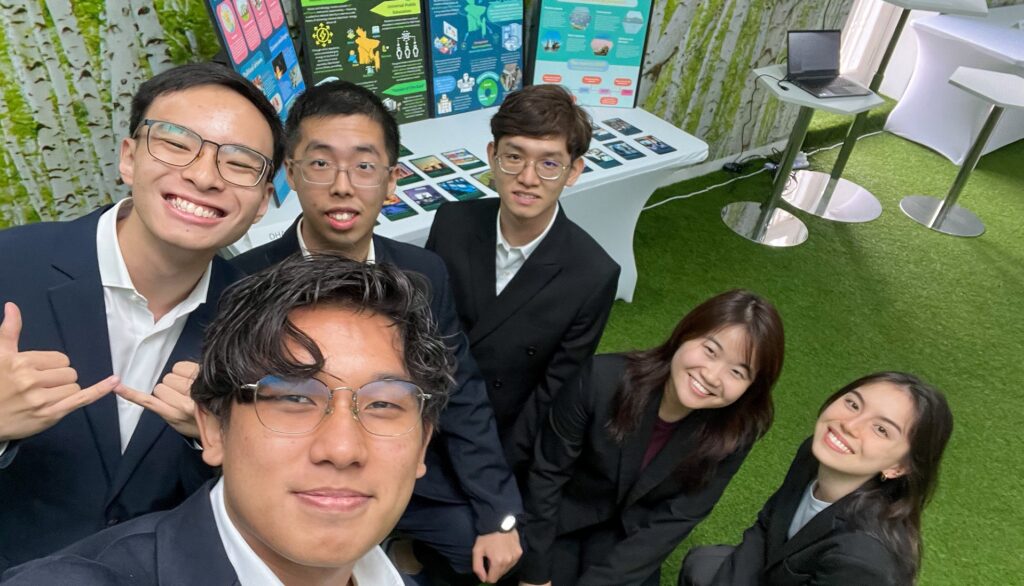
The team spent many evenings and nights rehearsing and polishing their skit in front of their classmate and residential hallmates. Not only did the rehearsals make for a fun experience, it unearthed hidden acting talent among the group and the risk taken paid off as the presentation turned out to be the most rewarding moment of the competition for each member.
“The theatricality of our presentation really immersed the audience in the worlds we’ve created. Being able to express our point with confidence was what helped us stand out in the competition,” said Eleyn Yap, a fellow PPE undergraduate.
History and Political Science double major Jeff Chin shared, “It was really gratifying to hear from the judges that they enjoyed our skit presentation and the energy it brought to the competition. The time and effort we put into bringing our ideas to life paid off, and it was a proud moment for us.”
Solutions that emerge from a confluence of ideas
Apart from daring to take a path less travelled in their presentation method, Team DHAKA2060 also credited the team’s win to its academic diversity which allowed them to consider multiple dimensions for each future scenario.
“While some of us were inclined to analyse the political possibilities for Dhaka, others pointed out (the) geographical constraints. The diversity in the way we think and see things became very obvious when it came to discussing Dhaka’s future. Everyone shared from their own perspective, yet ultimately, it was these differing and individual worldviews that strengthened the nuance of our case,” Eleyn said.
Iyan Danial Mohamad agreed that having many brilliant minds all pondering the logic of each idea helped immensely in ensuring they were sound. The Communications and New Media major who is also pursuing a double minor in History and Interactive Media Development, said, “Naturally, the fact that all of us came from different backgrounds as well also allowed us to expand the scope of our ideas, which was important so that we were able to cover more aspects of how a city could develop over the next few decades.”
“We were considerably more open to reiterating and challenging existing ideas without adhering to a dogmatic belief in the tried-and-tested,” said Morris.
Leaning on and trusting each other’s strengths, the team overcame their initial worry that they may have bitten off more than they could chew taking on a city that was rapidly evolving politically and socio-economically. However, it was the team’s varying view points and opinions that ultimately drove them to look at the issues from a macro perspective led to more convincing and multi-layered arguments that withstood questions from the judging panel.
This story first appeared on NUSnews on 10 February 2023.
Onward to Harvard: The Journey Towards a Fulbright Scholarship
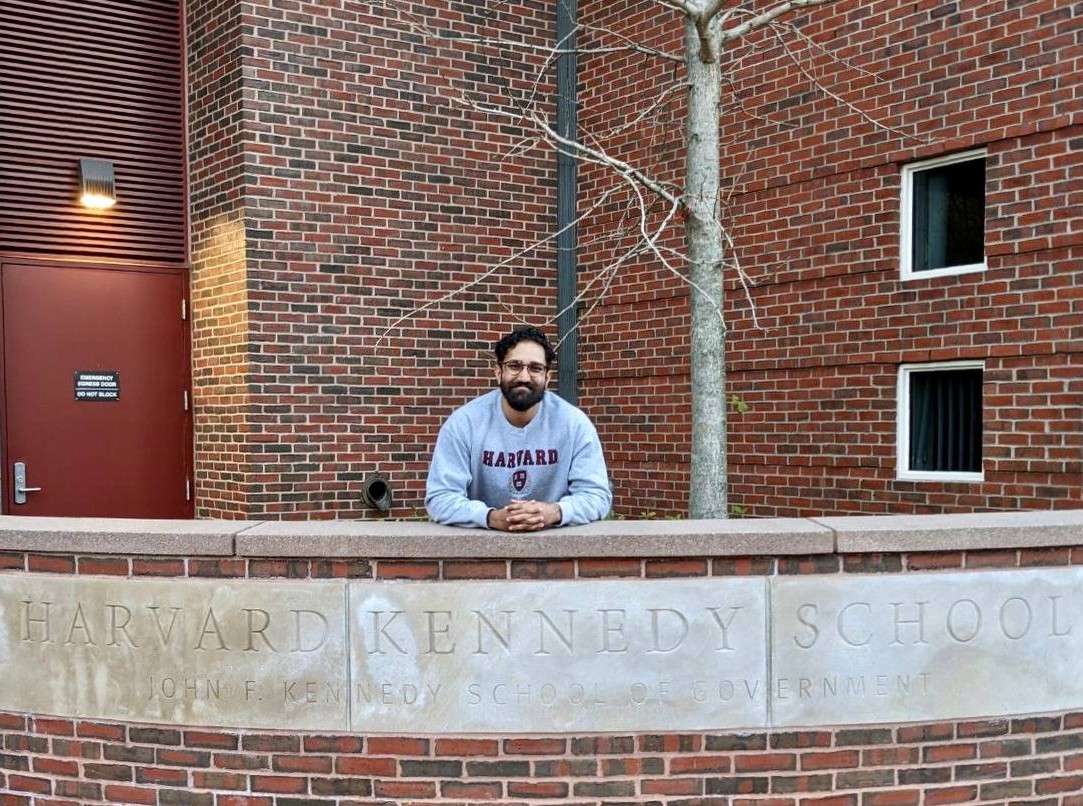
Sometimes, people count themselves out too early, according to Barath Harithas, FASS Alumnus and Fulbright Scholar. Photo: Barath Harithas
Alumnus Barath Harithas (NUS Political Science, ’16) was somewhat stunned when he found out that not only had he been awarded a scholarship under the prestigious US Government-sponsored Fulbright Singapore Student Program to pursue a Master's in Public Policy, he had also received the John F. Kennedy Fellowship and been appointed a Belfer Young Leader Student Fellow at the think tank Belfer Center — all at Harvard Kennedy School (HKS).
“Mine isn’t the story of the diligent and tractable schoolboy who teachers earmarked for success,” says Barath. “In fact, more than one teacher had told me that I was headed for an institutional facility. After the army, NUS was perhaps where I started to apply myself in earnest. The flexibility afforded by the FASS curriculum and scope for customisation allowed me to explore what I was interested in unreservedly.”
“But even then, getting into NUS itself seemed like a pipe dream,” says Barath, “No one in my family had even been to university. Thinking about Harvard seemed like a risible proposition. And I think sometimes we count ourselves out too early if we don’t get the right scholarship or get into a brand-name university in the US/UK after our A-levels. But life doesn’t end at 18. Quite the contrary. Not everyone gets anointed with early success. I was most certainly a late bloomer.”
After graduating from NUS, Barath joined the Public Service with stints across the Ministry of Foreign Affairs, the Ministry of Trade and Industry, and Enterprise Singapore with a focus on key flashpoints in the US-China relationship such as the South China Sea conflict, the US-China trade war as well as US-China technology competition. At HKS, Barath hopes to bring together his working experiences and his academic learnings to add fresh insights to the conversation on US-China relations and approaches to the US-China rivalry.
About the Fulbright Programme
The Fulbright Scholarship is the flagship international educational exchange program sponsored by the U.S. Government. The objective of the grant is to enable the recipient to pursue a particular field of study, and to develop leaders who can contribute to promoting better understanding between the United States and Singapore. Over 500 Singaporeans have participated in the Fulbright Program, including Senior Minister Teo Chee Hean, former Dean of FASS Professor Lily Kong, and Chairman of the Middle East Institute at NUS Mr Bilahari Kausikan. 2022 Marks the 76th Anniversary of the Fulbright Program. Visit the Fulbright Program website for more information.
Barath also hopes to deepen his understanding of critical issues in technology regulation, a topic he is deeply passionate about. He has spent the past two years delving into areas spanning artificial intelligence, quantum computing, cybersecurity and the Internet of Things. At HKS, Barath was working with the late Ash Carter, former US Secretary of Defense, to develop recommendations on content and platform regulation for US policymakers and private sector actors.
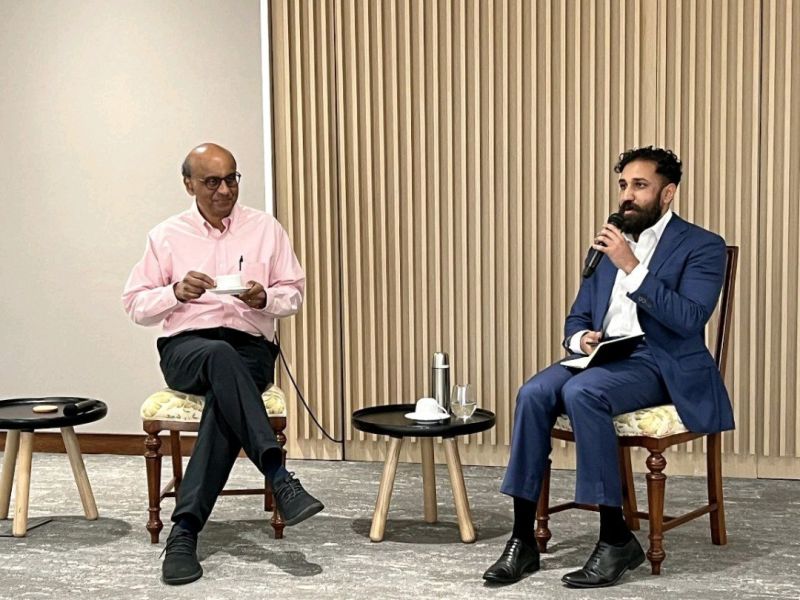
Barath co-leading the first dedicated policy trip to Singapore since 2009 by a delegation of over 50 students from Harvard Kennedy School and moderating a fireside chat with Senior Minister Tharman Shanmugaratnam. Photo: Barath Harithas When informed of Barath’s award, some of his Professors were not surprised and quick to point at his intellectual curiosity and grit as winning attributes. Associate Professor Luke O’Sullivan, who taught Barath in many undergraduate courses, remembers Barath as always having been a determined and outspoken individual. “He was clearly smart with an inquiring intellect, and I found him very endearing,” says A/P O’Sullivan. “I’m sure he will be a big success, he’s worked hard for it.”
People of FASS is a content series that emphasises on the human element, our people, their accomplishments and journey, as well as what inspires them. The series is curated primarily to focus on featuring exemplary students, alumni, researchers, faculty and staff.
A/P Soo Yeon Kim and Dr. Nathanael Sumaktoyo the Asian Polmeth 2023 Conference (6-7 January 2023)
A/P Soo Yeon Kim and Dr. Nathanael Sumaktoyo hosted the 11th Annual Meeting of Asian Polmeth, in collaboration with The Society for Political Methodology (American Political Science Association) and Steering Committee members Fang-Yi Chiou (Academia Sinica, Taiwan), Kentaro Fukumoto (Gakushuin University, Japan), Benjamin Goldsmith (Australian National University, Australia), Kosuke Imai (Harvard University, U.S.A.), Xun Pang (Tsinghua University, China), and Jong Hee Park (Seoul National University, Korea).
The conference brings together quantitatively-oriented scholars of Political Science and the social sciences more broadly for a two-day conference in Asia. Scholars gathered for the first time in person in three years to share research, to network, and to promote research on quantitative methods and their applications.
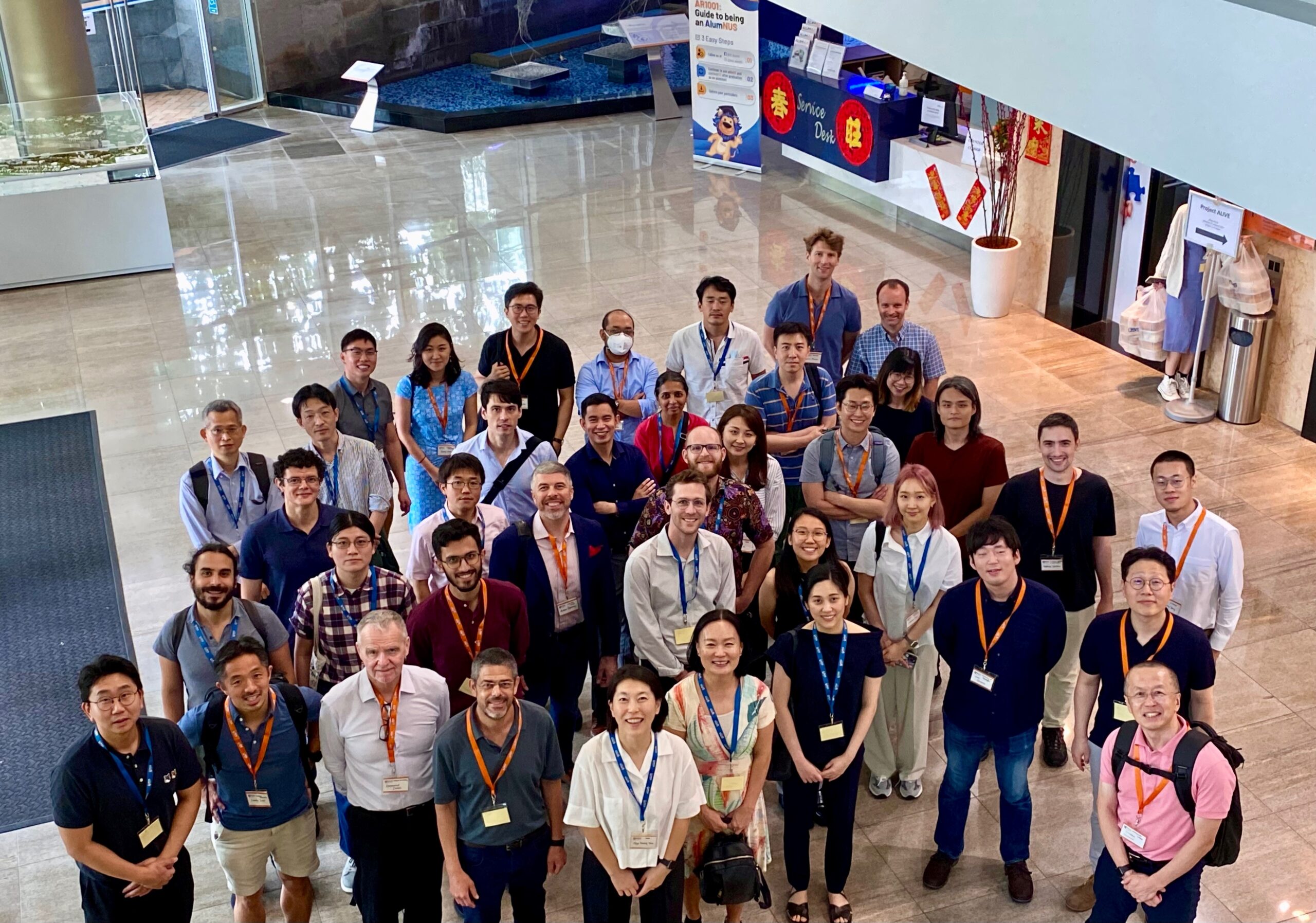
S-E Asia’s high stakes in Biden-Xi meeting
IN BRIEF | 10 min read
- The dangerous deterioration of US-China ties has grave and far-reaching implications, and regional leaders should make clear to superpower rivals their deep concerns, advises Professor Chan Heng Chee, NUS Trustee, Ambassador-at-large, Professor at the Lee Kuan Yew Centre for Innovative Cities at SUTD, and FASS alumna (NUS Political Science, '64 and '74).
Click through image below to read this piece.
This article first appeared in The Straits Times and NUSNews on 14 November 2022.
The Half-life of Knowledge
IN BRIEF | 10 min read
- There is now an indisputable requisite to equip graduates with interdisciplinary knowledge and skillsets. We need both the agile lenses of interdisciplinarity as well as the deep-cutting laser of deep domain expertise. The former trains us to aim and focus the laser, while the latter allows us to cut to the heart of a problem.
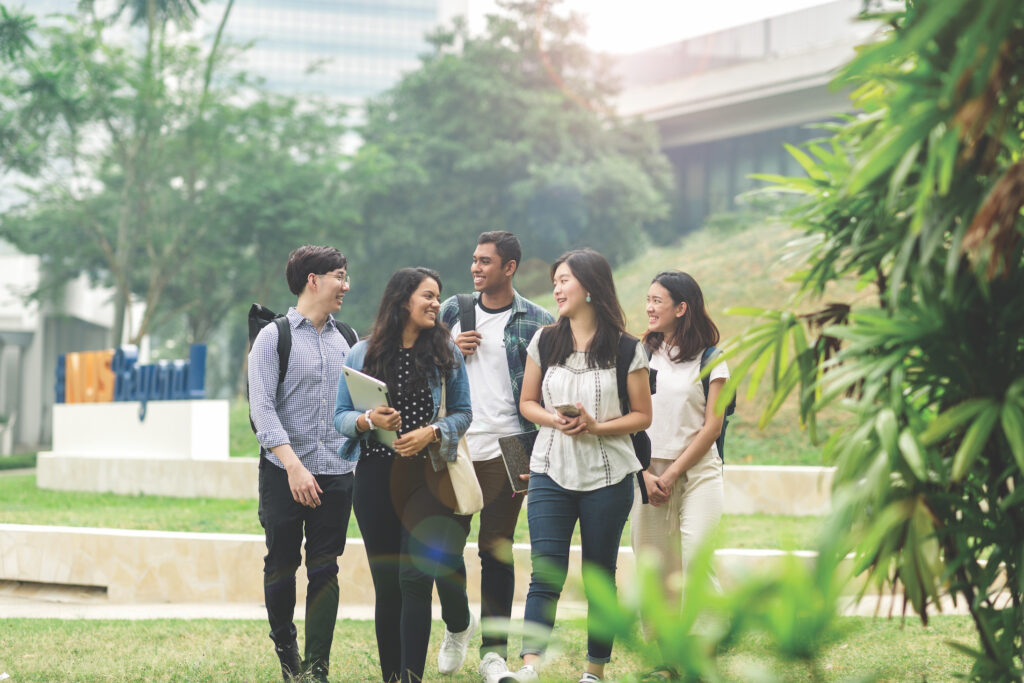
| By Professor Tan Eng Chye |
“Teach a person to fish, and you may feed them for three-and-a-half years” may sound less inspiring than “Teach a person to fish, and you feed them for a lifetime”, but the former more accurately reflects the current realities of tertiary education.
Breaking news travels at warp speed, accelerated by social media and instant messaging. In a matter of minutes, news can reach the four corners of the world. Such interconnectedness highlights the leaps made in information technology over the years while underscoring a persistent and inexorable phenomenon – the reduction of the half-life of knowledge.
The half-life of knowledge, coined by Fritz Machlup in 1962, refers to the amount of time elapsed before half of the knowledge in a particular field is superseded or becomes obsolete. Given the speed with which knowledge develops and is shared, it is perhaps not surprising that this value is ever decreasing in many fields.
This phenomenon raises fundamental questions about our university degree programmes. How should a fresh graduate, filled with aspirations to change the world, deal with the harsh reality that a significant portion of their undergraduate training may be rendered irrelevant by the simple passage of time?
Distilling a degree programme is one possible, albeit drastic approach. We can consider equipping students only with evergreen core domain concepts. This training should take less time than our current degree programmes. As and when students require specific new knowledge, or need to upgrade existing knowledge, they can take short courses to bridge knowledge gaps and meet their professional needs. This type of “just in time” learning, also known as micro-credentialing, helps to circumvent the shortened half-life by injecting cutting-edge knowledge at just the right time.
Another less disruptive approach is revitalisation. We can maintain the current degree programme structure, but provide avenues for graduates to return to university in the future. Such short stints of study can follow existing models for bite-sized, self-contained courses, or semester-long study periods undertaken with the support of employers.
One certainty is that university study will cease to be just one stage of life. Instead, “university studies” will become the de facto way of studying, with a person continually refreshing and renewing their knowledge in tandem with or in anticipation of developments in industry, society and the world.
In anticipation of this, we created the NUS Lifelong Learners Programme (or NUS L3), which promises a 20-year period of student enrolment, from the point of undergraduate or postgraduate admission. In other words, a graduate of NUS can choose to come back to campus to take courses for at least 20 years from the day of matriculation.
Interdisciplinarity
Beyond the way knowledge is acquired, we are also grappling with working in an increasingly VUCA (volatile, uncertain, complex, and ambiguous) world. In such a context, can we continue to hold a siloed view of domain disciplines? In training law students, for example, we would be remiss not to show them basic programming, which can allow them to create customised commands to quickly and easily trawl through databases, with millions of legal records, to identify precedents.
Deep domain expertise is like a laser – a focused beam of knowledge that can cut through dense problems. However, real-world issues are increasingly multifaceted and ill-defined, often lacking a clear vulnerable spot at which a laser beam can be aimed.
As a mental experiment, consider the challenge of introducing autonomous electric vehicles to a city. This proposition involves urban design, city planning, the law, and engineering for accessibility. We can form a multidisciplinary team of experts, where each member is a domain expert, to tackle the issue. However, in all likelihood, we will encounter misalignment between domains, simply owing to differences in problem-solving methodology, thinking models or even nomenclature.
If we liken domain training to equipping students with specific lenses through which they can see and focus on information to solve a problem, then interdisciplinarity suggests that we should train students to operate across more than one domain. By educating them in core ideas from multiple domains and providing opportunities to apply their knowledge in authentic settings, students with interdisciplinary training can switch domain lenses as needed, solving problems using novel and unorthodox approaches that transcend domains.
To be clear, we are not advocating for dismantling deep domain training. Rather, we recognise that there is now an indisputable requisite to equip graduates with interdisciplinary knowledge and skillsets. We need both the agile lenses of interdisciplinarity as well as the deep-cutting laser of deep domain expertise. The former trains us to aim and focus the laser, while the latter allows us to cut to the heart of a problem.
NUS strongly believes in providing interdisciplinary pathways for our students. In 2020, we created the College of Humanities and Sciences (CHS) to provide an enhanced interdisciplinary undergraduate experience for students of the Faculty of Science and the Faculty of Arts and Social Sciences. CHS undergraduates can choose between deep domain training or the flexibility of interdisciplinary training of varying breadth and depth in courses offered by both faculties. Continuing our efforts to pave more interdisciplinary pathways for students, in 2021, we merged the School of Design and Environment and the Faculty of Engineering to form the College of Design and Engineering. More recently, NUS launched NUS College, Singapore’s first honours college offering pathways to more than 50 majors across a half dozen degree programmes. The aim of NUS College, as explained by its inaugural dean, Professor Simon Chesterman, “[is to offer] broad, interdisciplinary competencies that equip students for life, along with the opportunity to dive deep into areas in which you are passionate.”
To quote Charles Dickens, “It was the best of times, it was the worst of times, it was the age of wisdom, it was the age of foolishness.” Indeed, our experiences with the global pandemic and its effects on education over the past two years have given us the rare opportunity to engage in deep reflection and introspection. Witnessing the breakdown of resistance to adopting and adapting technology for teaching and learning during this time, we should be emboldened to re-examine and revolutionise some of our established, and perhaps outmoded, notions of how to offer higher education.
About the Author
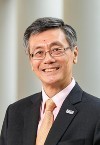 Professor Tan Eng Chye is President of the National University of Singapore. A passionate academic and educator, Prof Tan is a member of the World Economic Forum’s Global University Leaders’ Forum, as well as Singapore’s Future Economy Council, which is tasked with driving the growth and transformation of the country’s future economy.
Professor Tan Eng Chye is President of the National University of Singapore. A passionate academic and educator, Prof Tan is a member of the World Economic Forum’s Global University Leaders’ Forum, as well as Singapore’s Future Economy Council, which is tasked with driving the growth and transformation of the country’s future economy.
This article was first published in the Times Higher Education World University Rankings 2023 supplement and first appeared in NUSNews on 4 November 2022.
Lessons from the 20th Communist Party Congress to Singaporean Youths
IN BRIEF | 10 min read
- An article by Tan Zhan Tiam, Year 1 student from the NUS Faculty of Arts and Social Sciences (Political Science and Chinese Studies), and Tai Kai Zhen, member of the Business China Youth Chapter in Lianhe Zaobao.
Click through image below to read this piece.
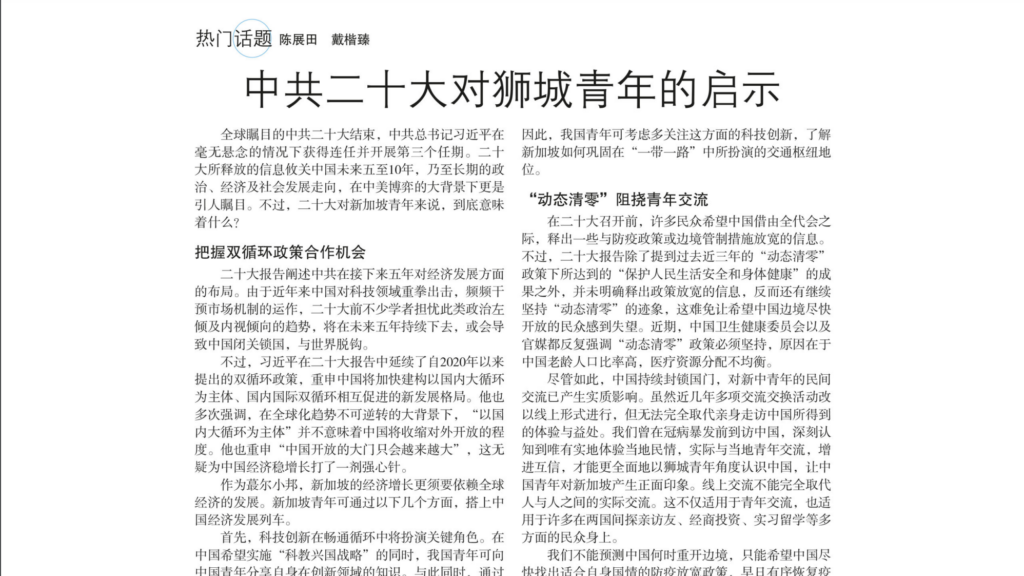
This article first appeared in Lianhe Zaobao and NUSNews on 26 October 2022.
Xi’s China Dream – Its Appeal and Dangers
IN BRIEF | 10 min read
- Whatever personnel and policy changes emerge from the 20th party congress, China's ambitions and revanchist ethnonationalist goals will endure, says Mr Bilahari Kausikan, Chairman of the Middle East Institute at NUS, former Singaporean diplomat and NUS Political Science alumnus, in an Op-Ed for The Straits Times.
Click through image below to read this piece.
This article first appeared in The Straits Times and NUSNews on 17 October 2022.
Banking on Doing Good
IN BRIEF | 10 min read
- From trailblazer in the banking world to leader in social services - CEO of Methodist Welfare Services, Singapore Council of Women's Organisations President (2020-2022), and NUS Arts and Social Sciences Faculty Advisory Board Member as well as alumna Ms Junie Foo (NUS Political Science, '90) has found her journey to be full of fulfilment.
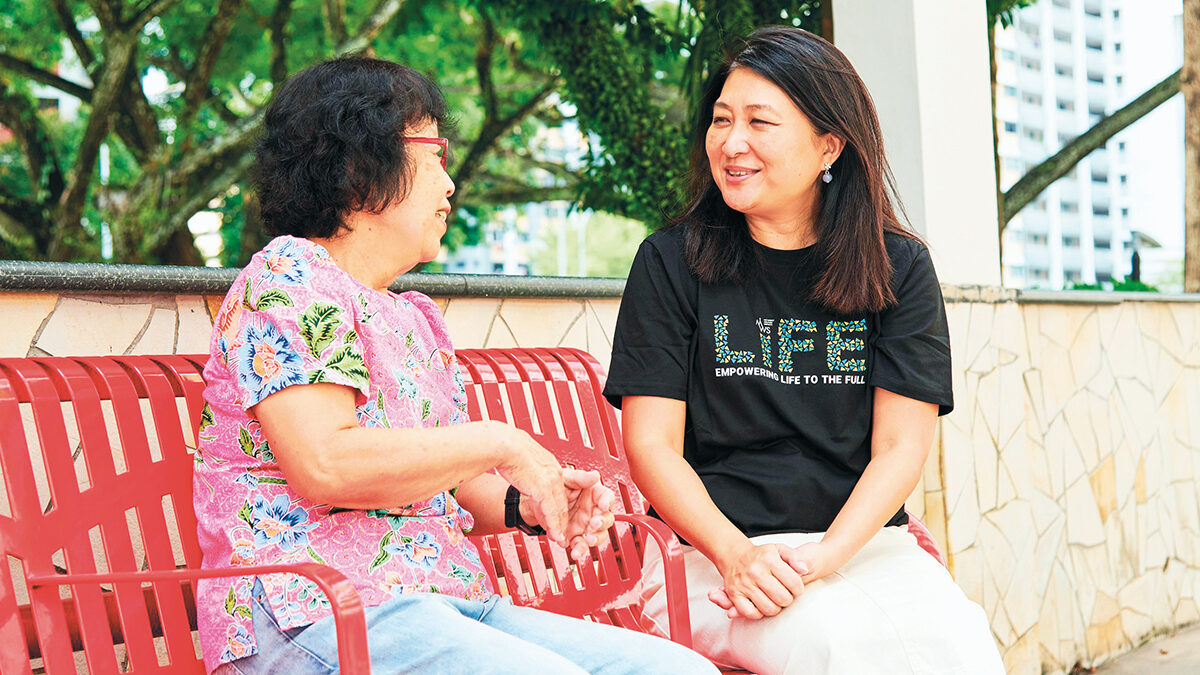
MS JUNIE FOO chatting with a senior at the MWS Active Ageing Centre at Kebun Baru.
You could call it an essay-writing assignment that changed her life. In 1990, Ms Junie Foo was a Political Science undergraduate when she entered a Japanese essay-writing competition. The topic? The past, present and future of Singapore. "I don't remember exactly what I wrote, but I think we had been coming out of a recession at that point, so I touched on that, as well as on our multicultural society," she recalls.
Her piece caught the eye of business leaders and, even before graduation, she was offered a job at a major Japanese financial institution. That kick-started her success in the financial industry, where, over the course of nearly 30 years, she attained many firsts. For instance, the distinction of being the first non-Japanese and the first woman in the management team of the Corporate Banking Division, Asia Oceania, in a Japanese financial institution.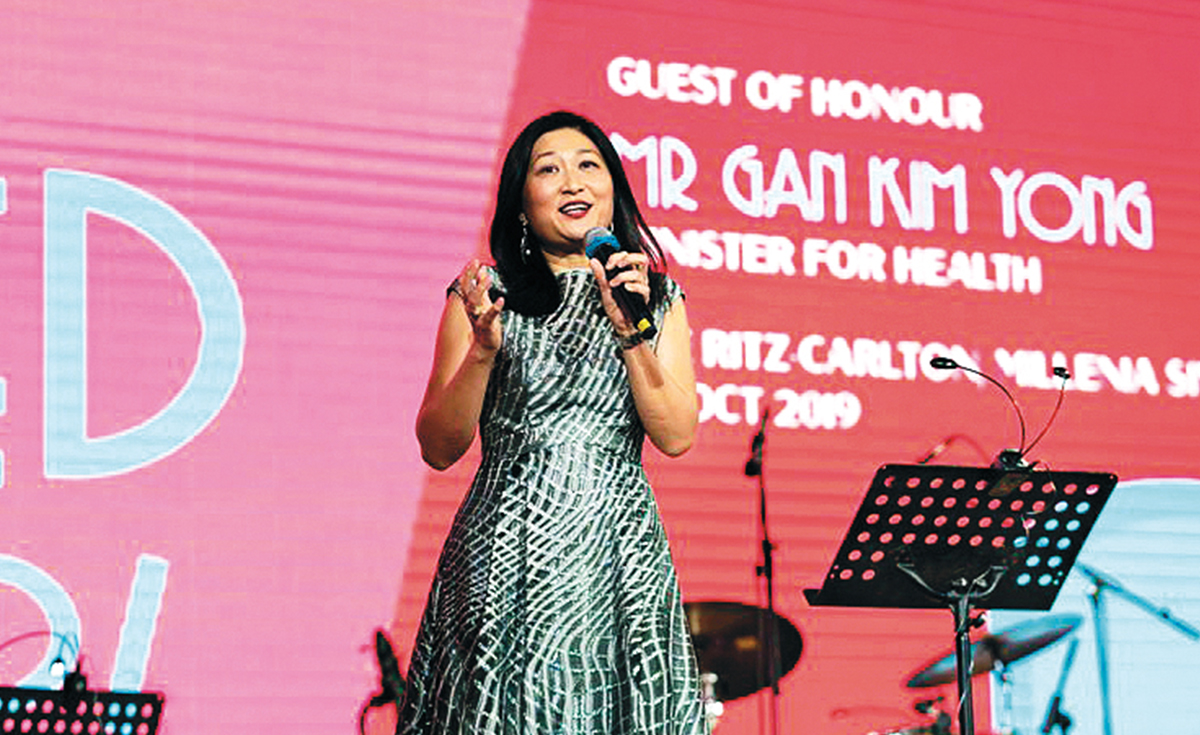
On stage at the MWS Charity Ball in October 2019.
But climbing the corporate ladder was not all that it was made out to be. "After 25 years or so, I recall doing the budgeting for our regions, looking at revenues and earnings, and thinking, 'I can do much more for the community'," she shares. She spent two years pondering her next move even as other banks came calling. Her husband, whom she had confided in, told her going back to the banks would be an act of "vanity". "So I decided to do an act for the community," she says, explaining her decision to join Methodist Welfare Services (MWS) as its Chief Executive Officer in 2018.
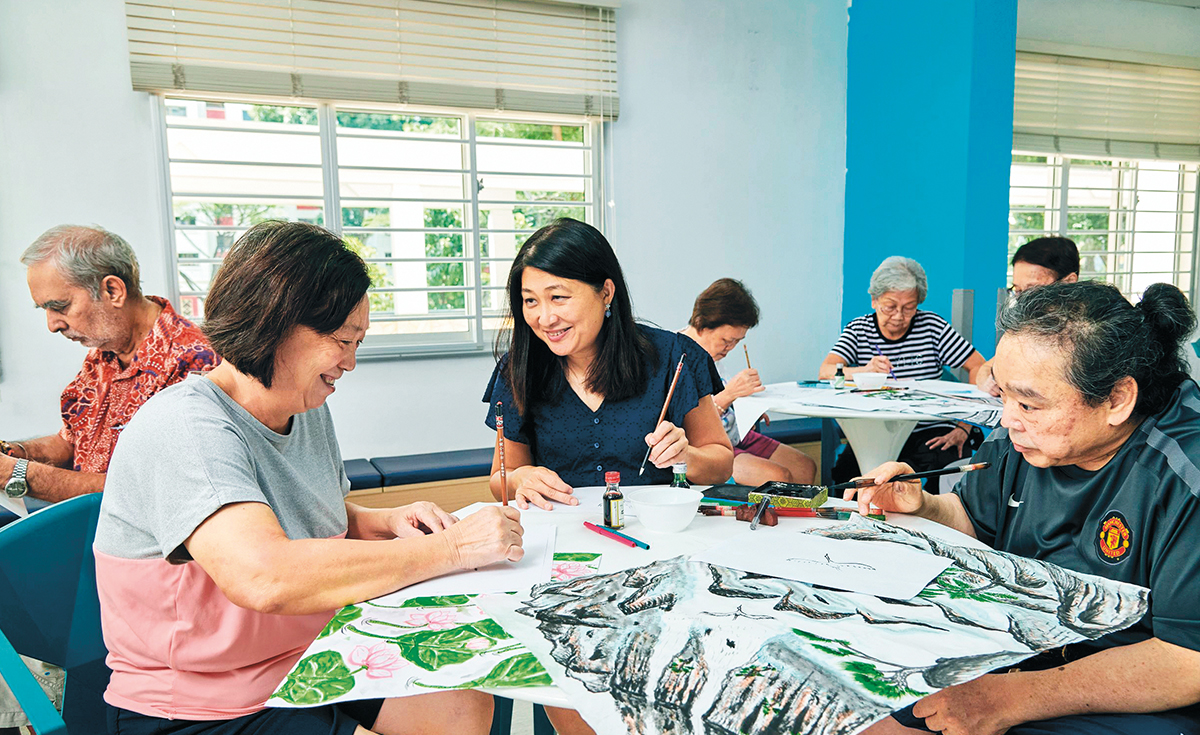
Painting with seniors at the MWS Active Ageing Centre.
A Different World
The world of social services was a far cry from the glamour of banking. As a multifaceted social services agency with over 600 staff, MWS' operations span from helping the destitute to caring for vulnerable seniors in the community. Ms Foo quips that her career change took her from the glitzy restaurants of Marina Bay to rental flats in Hougang. "There was once I was at a nursing home and sitting with a resident who had been born blind and deaf, and had just been abandoned," she recalls. "We could not converse at all, but I just sat next to her and put my hand on her shoulder to let her know that she was not alone." Ms Foo describes it as a "moment of affirmation". "It made clear that me being in social services was a calling."
But she admits that, as with every sector, the social services industry too, has its challenges - the biggest being talent retention. Ms Foo's former world of banking is rife with fat pay cheques, but such large salaries are impossibly rare in social services. "It says a lot about society and what we value," says Ms Foo with a shrug. "But I'm hoping to change that. We cannot short-change our talent, because they do so much good for the community."
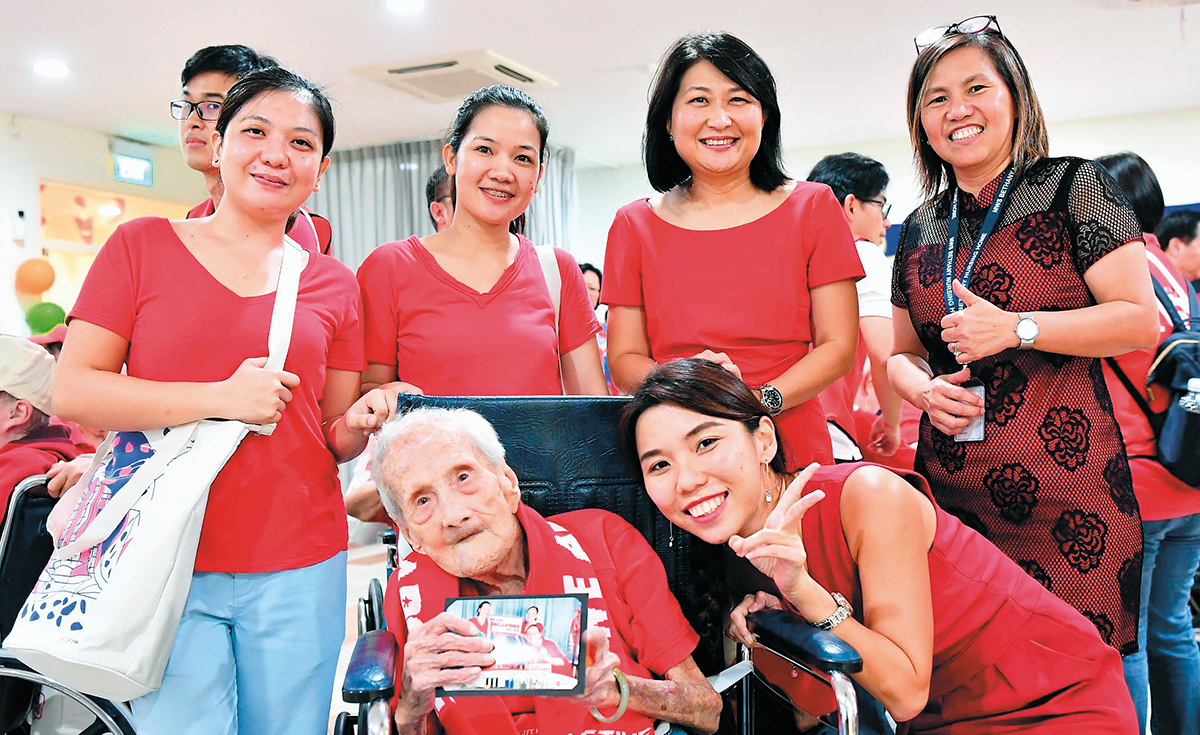
Ms Foo with staff and volunteers at a Chinese New Year celebration.
This story first appeared in AlumNUS Issue 131, Oct-Dec 2022.
Call for Nominations | FASS Inspiring Mentor Award 2022
IN BRIEF | 3 min read
- We invite NUS FASS members of staff to nominate the colleagues who have served as their truly inspiring mentors - who have gone beyond the call of duty to positively impact their work and life - for FIMA 2022 honours.
Click through image below (or just write to fassmentoraward@nus.edu.sg) to file your nomination.
FASS Establishes LBKM Social Sciences Scholarship to Nurture Top Talents in the Social Sciences
IN BRIEF | 5 min read
- The scholarship was established through a S$300,000 gift from Lembaga Biasiswa Kenangan Maulud, LBKM (Prophet Muhammad's Birthday Memorial Scholarship Fund Board).
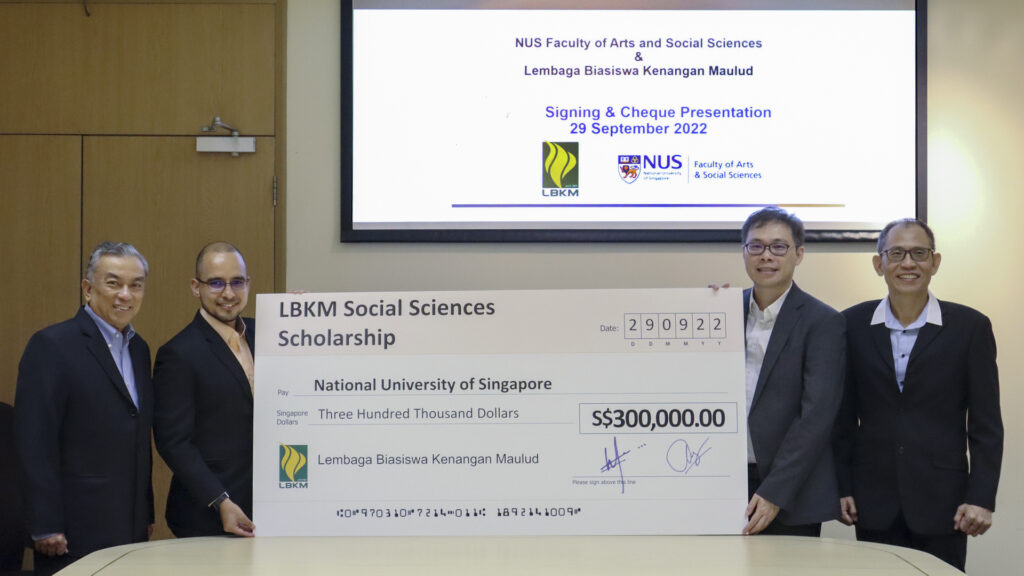
The NUS Faculty of Arts and Social Sciences (FASS) has received a generous endowment gift of S$300,000 from Lembaga Biasiswa Kenangan Maulud (LBKM) - or Prophet Muhammad's Birthday Memorial Scholarship Fund Board - to establish the LBKM Social Sciences Scholarship.
The Scholarship will be available to academically outstanding full-time third- and fourth-year Singaporean students pursuing majors in Communications and New Media, Economics, Global Studies, Philosophy, Politics and Economics (PPE), Political Science, Psychology, Social Work, as well as Sociology and Anthropology. This aims to further spur academic excellence in the social sciences amongst FASS undergraduates and encourage them to distinguish themselves in their scholastic activities.
Applications for the Scholarship worth $5,000 each will open in the academic year beginning in August 2023.
Professor Lionel Wee, Dean of NUS FASS, said, "The rise of the digital economy has driven up demand for social scientists as their knowledge and skills are needed to understand the impact of new technology on people and societies, provide social support in the wake of fast-moving changes, and overcome cultural differences in an increasingly shrinking world. These are roles robots and technology cannot replace. This Scholarship will enable us to attract and nurture exceptional social science students keen to grow their skills and achieve their fullest potential. We are grateful to LBKM for their trust and strong support."
Associate Professor Loy Hui Chieh, Vice Dean of NUS FASS, and Dr Syed Harun Alhabsyi, President of LBKM, signed the agreement today to establish the Scholarship, with a ceremonial cheque presented by LBKM to NUS FASS.
Dr Syed Harun said, "LBKM's continued support for undergraduates in the study of social sciences remains of extreme importance as societal and community needs become more complex, ever-changing and inter-disciplinary. It is hoped that LBKM's contributions will continue to inspire students to do well in the area of social sciences and groom future leaders who will not only perform exceptionally in their academic pursuits but also give back to the community."
The new LBKM Social Sciences Scholarship is an extension of LBKM's longstanding relationship with NUS FASS and past community donations that have supported undergraduate students financially and encouraged them to excel in their studies since 2007.
This story first appeared in NUSNews on 29 September 2022.
Inaugural Tembusu Conversations: Artificial Intelligence and the Great Leap into an Age of Plenitude
IN BRIEF | 10 min read
- Initiated by Tembusu College Rector, Mrs Lim Hwee Hua, who assumed the role in July 2022, Tembusu Conversations is a new series of dialogue sessions held every semester at Tembusu College. The dialogues aim to acquaint students with issues related to technological innovations and financial, geopolitical and social shifts, through close engagement with experts from diverse fields.

Dr Lee Kai-Fu, CEO of Sinovation Ventures and former President of Google China, envisions the future of artificial intelligence (AI) and automation to be a plenitude. As defined in Oxford English Dictionary, 'plenitude' refers to 'an abundance' and 'the condition of being full or complete'.
Speaking at the inaugural Tembusu Conversations on 7 Sep 2022, Dr Lee outlined five key driving forces which will shape the future in his 30-minute keynote address titled "How AI Will Transform the World: Upcoming Disruptions from Life Sciences to New Energy". These are Artificial Intelligence, Automation, New Energy, Quantum, and Life Sciences.
Initiated by Tembusu College Rector, Mrs Lim Hwee Hua, who assumed the role in July 2022, Tembusu Conversations is a new series of dialogue sessions held every semester at Tembusu College. The dialogues aim to acquaint students with issues related to technological innovations and financial, geopolitical and social shifts, through close engagement with experts from diverse fields.

An Age of Plenitude
These five driving forces bear great potential in transforming and changing the future as they not only can work in silos to effect change, but can also come together synergistically - such as the confluence of automation and energy which is expected to lower material and labour costs through the development of autonomous robots. Dr Lee also touched on how automation could enable medical devices in the life sciences field to become "smaller, faster, cheaper and more accurate".
Referring to quantum computing as "the greatest transformation in computing humans will witness in our history", Dr Lee shared that he expects quantum computing to mature in the next two decades and power the next wave of innovation. The speed at which quantum computing has advanced in recent years has put much of today's encryption, including cryptocurrency Bitcoin, at risk of being exposed.
Living with AI
Dr Lee also took the time to respond to questions from the floor, sharing his views on how humans can adapt to living with the changes AI will bring to jobs and lifestyles, and how we can approach ethical AI. Students took the opportunity to engage with Dr Lee in the 45-minute question-and-answer session moderated by Ayushi Lahiry, a second-year student from NUS Economics and President of the NUS Economics Society.

While it is inevitable that some jobs will be replaced along with the advancement of AI in the next decade, Dr Lee emphasised that AI is currently not able to fully supplant the human in the workplace. This, therefore, underscored the importance of identifying and nurturing career skills for jobs that are intellectually challenging and hold longevity in the advancing AI landscape, whilst embracing technology as a tool and partner in one's work. With a tongue-in-cheek reference to AI as a "glorified spreadsheet", Dr Lee encouraged students to "be happy and aspire to do things that AI cannot do".
Dr Lee also countered the notion that AI would lead to a loss of deep literacy - including capacity for thought, conceptualisation and reflection - in humans, pointing out that human-to-human services such as eldercare, sales and concierge services would likely see a surge in demand, due to an increased need for human interactions.

Dr Lee also acknowledged the existence of biases in AI, and sounded a clarion call for more focus on ethical AI through enhancing education on such topics for AI engineers. Alluding to the popular adage, "with great power comes great responsibility", Dr Lee shared the need for AI engineers to develop tools which can "send more warnings to AI, train data sets which are reasonably balanced, and cleanse data".
Referring to the multi-faceted features of AI, Dr Lee also warned that regulation of AI in itself would not serve as a panacea. He cited how computer viruses had spurred innovators to invent anti-virus software, and encouraged the invention of new technologies.
"I found his point on the need for methods to detect biased datasets to be a very critical reminder as companies can often overlook ethical considerations when developing AI, such as bias reduction, in the pursuit of efficiency," shared Ramu Lakshmanan, a Year 1 student from NUS Computer Science. "I've realised the need to be aware of bias should I have to work on AI in the future".
Jonah Lo, a first-year student from NUS Political Science, expressed his appreciation for Dr Lee's problem-solving approach. "Perhaps inspired by his broad entrepreneurial and technological background, he noted how problems like racial bias could be resolved through technical solutions like compilers," he said, referring to the software that translate source code written in a high-level language into machine-language instructions.
"Such angles are novel for a political science student," he added.

Opportunities for the Future
In response to how other countries such as Singapore can survive and thrive, Dr Lee offered some optimism that many opportunities are waiting to be discovered. Referring to examples of tech giants Grab and TikTok which have established offices locally, Dr Lee encouraged young people to embark on careers with such companies, which he believes will offer valuable learning points about entrepreneurship that would be helpful in founding startups. Referring to numerous successful Chinese startups which emerged from former employees of China's BAT - Baidu, Alibaba, Tencent - Dr Lee expressed his belief that the same could be achieved by future entrepreneurs in Singapore despite its small market size.
This story by Tembusu College first appeared in NUSNews on 16 September 2022.
Weathering challenges ahead: Education on security issues is key
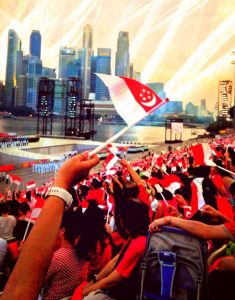
In 'Weathering challenges ahead: Education on security issues is key' (The Straits Times, August, 2022), Associate Professor Bilveer Singh (NUS Political Science) argues that security issues have become one of Singapore's key priorities in light of surging inflation around the world.
Southeast Asia is facing growing geopolitical uncertainties. Regional powers like China and India have become more assertive over the years, partly filling the growing power vacuum left by the United States. Southeast Asian governments have been increasing their spending on defence. Cyberattacks, religious extremism, terrorism, climate change, and large-scale migration are also security challenges the region will encounter in the future.
Given the threats to security, A/P Singh warns that we cannot take peace and prosperity for granted. A small state like Singapore is inherently vulnerable to regional conflicts. Political and community leaders as well as educational institutions and media should strengthen their efforts to inform Singaporeans of the security threats the country is facing. Maintaining social cohesion is critical to Singapore's survival, and more must be done to curb the spread of transnational extremism. A/P Singh observes that Singapore is not broken yet, but little 'tsunamis' hit the nation on a daily basis. Singapore's survival relies on the collective strength of its people and government.
Read the article here: https://www.straitstimes.com/singapore/weathering-the-challenges-ahead-education-on-security-issues-is-key
US-China Ties Most Fraught in Decades: Speakers at Panel Discussion
IN BRIEF | 6 min read
- A panel discussion around former Australian Prime Minister Kevin Rudd's book, The Avoidable War, jointly organised by the National University of Singapore's East Asian Institute, Lee Kuan Yew School of Public Policy and Faculty of Law.
- Panel included Kevin Rudd, Singapore's Ambassador-at-Large Chan Heng Chee (FASS alumna - NUS Political Science, '64), and International Institute for Strategic Studies Executive Director for Asia James Crabtree.
Click through image below to read this piece.
This article first appeared in The Straits Times and NUSNews on 11 August 2022.
Situation in Taiwan Strait: Lessons for Southeast Asian Youth
IN BRIEF | 6 min read
- Commentary by undergraduate Tan Zhan Tiam (NUS Political Science and NUS Chinese Studies) in Lianhe Zaobao.
Click through image below to read this piece.
This article first appeared in Lianhe Zaobao and NUSNews on 9 August 2022.
FASS Students Dominate 2022 USP Awards
IN BRIEF | 10 min read
-
NUS Faculty of Arts and Social Sciences (FASS) students have topped 9 out of 14 prize categories in 2022 University Scholars Programme (USP) Awards, achieving the USP Overall and Domain Prizes for academic excellence.
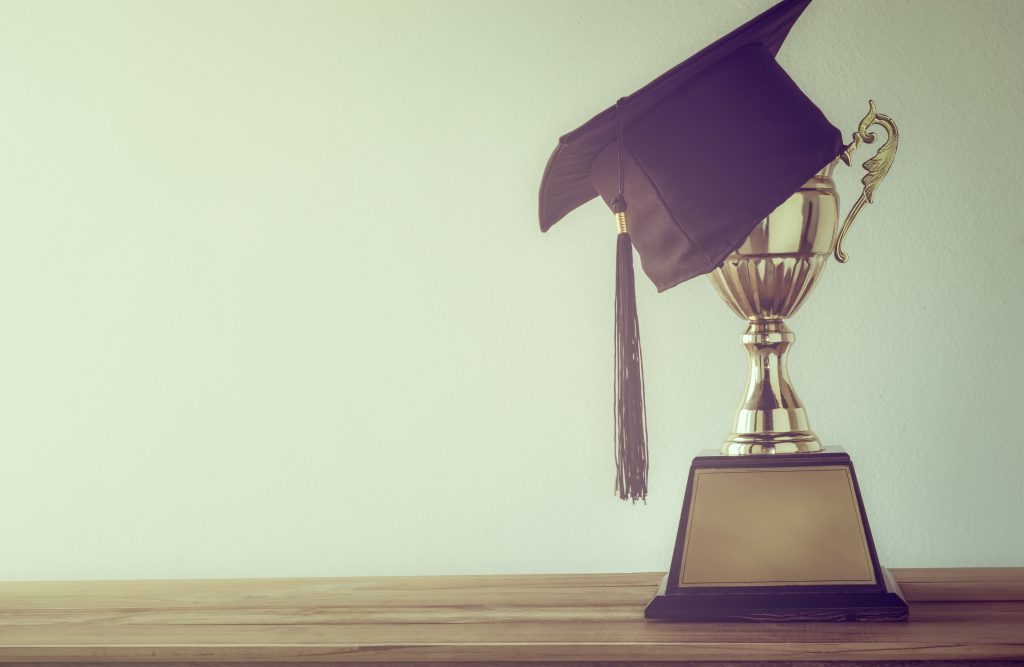
Students of the NUS Faculty of Arts and Social Sciences (FASS) in the University Scholars Programme (USP) have topped 9 out of 14 categories at the 2022 USP awards, including the Joanna Wong Medal, NUSS Medal for Outstanding Achievement, Izzudin Taherally Prize, Chan Bibe bte Syed Mohd Shah Prize, Albert Teo Prize, Tin Chew Hong Prize, Syed Ahmad Khan AMU Memorial Prize and Sung Kah Kay Memorial Prize. FASS students have also swept the USP Overall and Domain Prizes, with Philosophy, Politics, and Economics major Nickson Quak Jun Hao (Philosophy, Politics, and Economics) taking Best Overall Performance, in addition to sharing top spot with his compatriot Terence Mah (Psychology) under Best Performance in Science and Technology.And to stamp FASS’ dominance in this year’s awards, Archana Dhinakar Bala (Economics) – winner of the Joanna Wong Medal and the Syed Ahmad Khan AMU Memorial Prize – served as valedictorian for the USP commencement ceremony.
In full, the list of FASS winners of this year’s USP awards are.
Joanna Wong Gold Medal AwardPresented to the graduating student from USP who best embodies the ethos of the programme—demonstrating academic excellence and commitment to co-curricular activities.
Winner: Archana Dhinakar Bala (Economics) NUSS Medal for Outstanding Achievement
Presented to the graduating USP student with outstanding all-round achievements, who demonstrates academic excellence as well as significant participation in NUS students activities and/or impactful contribution in community service/voluntary work, preferably in leadership capacities.
Winner: Teow Jun Hao (Philosophy, Politics, and Economics) Sung Kah Kay Memorial Prize
For the graduating USP student who best exemplifies scholarship and academic excellence, and who demonstrates leadership in independent and interdisciplinary scholarship.
Winner: Yip Sze Kay (Majors: English Literature and Philosophy, Minor: French) Izzuddin Taherally Prize
For the graduating USP student who is well-rounded and has exemplified academic excellence and demonstrated a strong commitment to promoting interfaith dialogues or activities related to social harmony.
Winner: Ahmad Zaki bin Yazid (History) Chan Bibe Bte Syed Mohd Shah Prize
For the graduating USP student who is well-rounded and has demonstrated academic excellence as well as a strong commitment to wide-ranging learning through co-curricular acivites, or to community service.
Winner: Rachel Teng Ying Xin (Sociology) Albert Teo Prize
For the well-rounded graduating USP student who has exemplified academic excellence and demonstrated a strong passion for entrepreneurship or innovation in the social or business sector.
Winner: Peng Yun Ting (Philosophy, Politics, and Economics) Tin Chew Hong Prize
For the graduating USP student who is well-rounded, has exemplified academic excellence, and demonstrated strong commitment to community service preferably in the areas of eldercare, ageing or gerontology.
Winner: He Shiying (Major: Global Studies, Minor: Public Health) Syed Ahmad Khan AMU
For exemplifying academic excellence and reflecting a strong commitment or made a significant contribution to South Asian studies and culture.
Winner: Archana Dhinakar Bala (Economics) USP Prizes: Overall and Domain
For graduating USP students who have demonstrated academic excellence in USP courses.
- Best Overall Performance
Winner: Nickson Quak Jun Hao (Philosophy, Politics, and Economics)
- Best Performance in Humanities and Social Sciences
Winner: Belle Koh Rae Qi (Psychology)
- Best Performance in Science and Technology
Winners: Nickson Quak Jun Hao (Philosophy, Politics, and Economics) and Terence Mah Cai Jun (Psychology)
The Boy who Could – From Normal (Academic) Student to NUS Valedictorian
IN BRIEF | 10 min read
- Mohamed Fayyaz Bin Mohamed Faqarh, who graduated with top honours, was also selected as the valedictorian of his class.
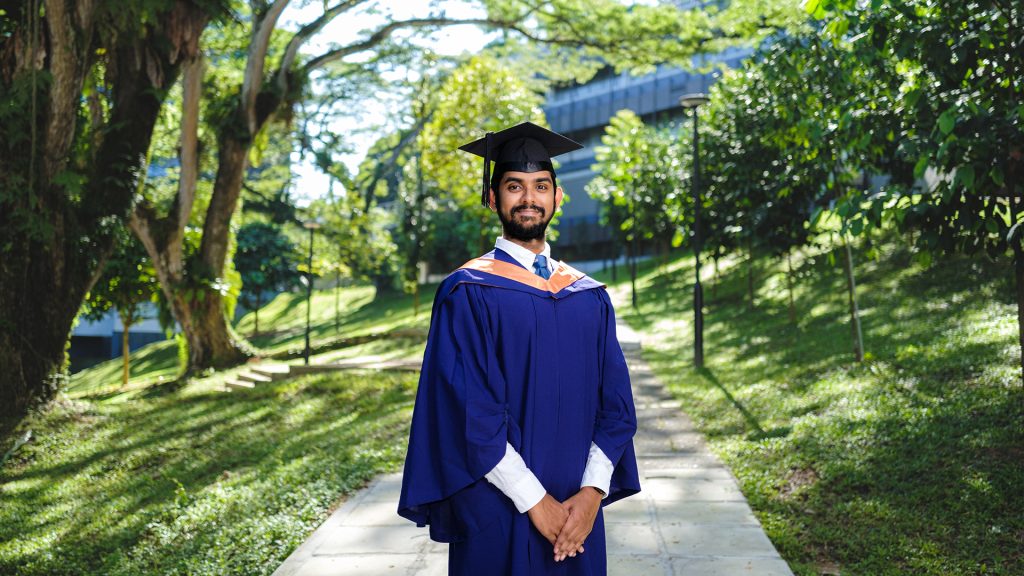
"Fayyaz wants to go to NUS!" a classmate declared, followed by thunderous laughter.
For Mohamed Fayyaz Bin Mohamed Faqarh, or Fayyaz, a history of being mocked for his ambition and life goal of studying at NUS while he was a Normal (Academic) student only spurred him on to prove his detractors wrong.
"Those experiences really broke me to some extent," added the 26-year-old. "But in the long run, they fuelled me to do better. When I felt like giving up, I imagined my whole class laughing at me."
Filled with determination, Fayyaz devoted himself to achieving his dream. His tenacity paid off, and he did well for his O-Level examinations. So well, in fact, that he was the only student from his Secondary 5 cohort who made it to a junior college (JC).
But Fayyaz knew that he should not become complacent, continuing to strive for academic excellence in JC. While his A-Levels did not disappoint, he was still rejected by NUS, and devastated by the outcome.
A dream come true
Just as he was considering other universities, however, a stroke of serendipity occurred - a place at NUS opened up and he received an offer at the Faculty of Arts and Social Sciences (FASS), a course that was perfect for him.
"Because of my varied interests, I could not decide what I wanted to major in," he explained. "But FASS allowed me to try out majors that interest me before I had to make a decision."
While serving his national service (NS), Fayyaz developed an interest in security issues. This led him to take an exposure course on political science, where he learnt how the subject is linked to every facet of society. And just like that, he was hooked, quickly deciding to major in Political Science with a minor in History.
He had also been accepted into Tembusu College, where he met many like-minded peers who were passionate about regional and global affairs.
"NUS did not meet my expectations, it exceeded them," he said with a smile. "The academic rigour is unmatched, and the professors are passionate and understand students well. I have had many opportunities come my way, and the people I met are all incredibly supportive."

University life was far from a breeze. In Fayyaz's second year at NUS, the COVID-19 pandemic hit. His parents, who were both travel agents, saw their income dwindle from a few thousand dollars a month to zero overnight.
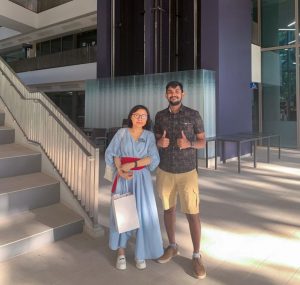
"Besides using the savings I had from NS to pay for my stay at Tembusu College, I also had to help my family financially," said Fayyaz, the second of three children. "I took up research assistant work and even took part in experiments regularly, as I would get a small sum of remuneration."
Fortunately, he received bursaries and a scholarship from NUS, as well as an interest-free loan from Mendaki, which lightened the burden.
Despite his circumstances, Fayyaz still made an effort to volunteer as a grassroots leader at Marine Parade GRC - a move inspired by his History professor, Associate Professor Wang Jinping.
"Assoc Prof Wang taught me not only to be academically inclined, but also made me realise the importance of finding new ways to give back to the community," said Fayyaz.
Yesterday, Fayyaz graduated with a Bachelor of Social Sciences with Honours (Highest Distinction) in Political Science with a minor in History, and he was also selected as the valedictorian of his class. Furthermore, he has turned his dream degree into his dream job - as a global risk intelligence analyst at enterprise software organisation Everbridge.
"My job requires me to identify and analyse global real-time events and risks and report them to clients," he said. "The skill sets that I acquired at NUS and the research opportunities I gained really matched what the employers wanted, and my interest in security coincides with my job scope."
For Fayyaz, no dream is too big. He made it come true.
This story first appeared in NUSNews on 7 July 2022 as part of NUS News' coverage of Commencement 2022, which celebrates the achievements of our 13,975 graduates through 28 in-person ceremonies. For more on Commencement, look out for our other graduate profiles, check out the official Commencement website, or look up (and tag) #NUS2022 and #NUSFASS on NUS' and FASS' social media channels!
Commencement 2022: Kickstarting a Season of Celebration and Achievement
IN BRIEF | 10 min read
- NUS celebrates the milestone accomplishments of 13,975 graduates through 28 in-person ceremonies.
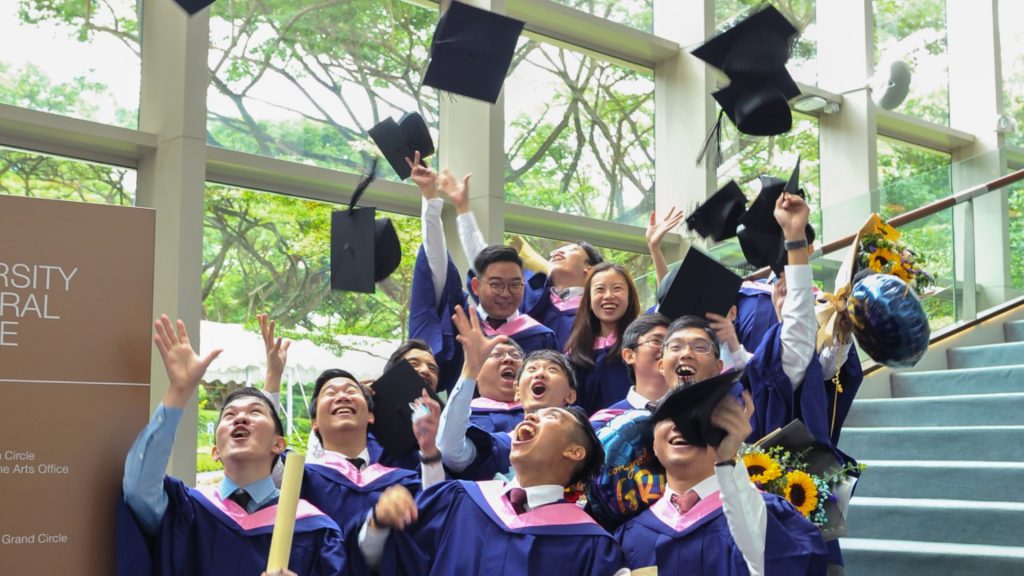
A long-awaited season of celebration is officially under way, with the inaugural ceremony of Commencement 2022 marking the milestone achievements of some 200 Faculty of Arts and Social Sciences (FASS) graduates, and seeing the conferment of two Honorary Graduates, Professor Tommy Koh and Professor Wang Gungwu.
Taking place at the University Cultural Centre, the ceremony kicked off bright and early on 6 July to an effervescent buzz of anticipation from the graduates and their loved ones, inaugurating a total of 28 in-person ceremonies to be held over the following 10 days.
In keeping with the Commencement traditions and the proud ceremonial heritage of NUS, the ceremony showcased the pageantry of the Ceremonial Procession, the fanfare, and playing of the National Anthem, all culminating in the highlight of the ceremony-the presentation of graduates. Graduates from the Class of 2022 celebrated their achievements amid the applause of family and friends, a momentous apogee of their time in NUS.
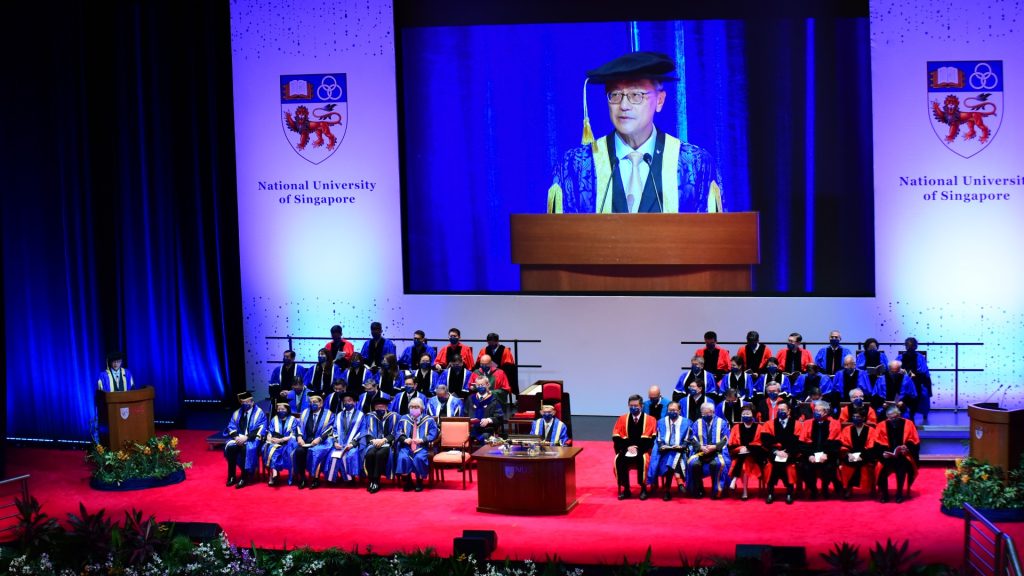
Speaking at the ceremony, NUS President Professor Tan Eng Chye reflected on the qualities needed for graduates to thrive in today's dynamic environment: an attitude of resilience and adaptability to overcome challenges, and a willingness and boldness to view problems as opportunities, exercise creativity, and apply their skills and knowledge to create solutions.
"For the Class of 2022, you are crossing the threshold into a wider world of dynamic change and great possibilities, but also of discomforting uncertainty," he said.
"But I am fully confident that the NUS graduates of today share the same ethos of excellence and service to community of generations past. In time to come, you will undoubtedly make your own unique contributions, and become the vanguard in elevating our collective prosperity and well-being."
Contributions to Law, Nature and Culture: Prof Tommy KohTwo illustrious NUS alumni were also honoured as Honorary Graduates for the Class of 2022-lawyer and diplomat Professor Tommy Koh, and historian Professor Wang Gungwu.
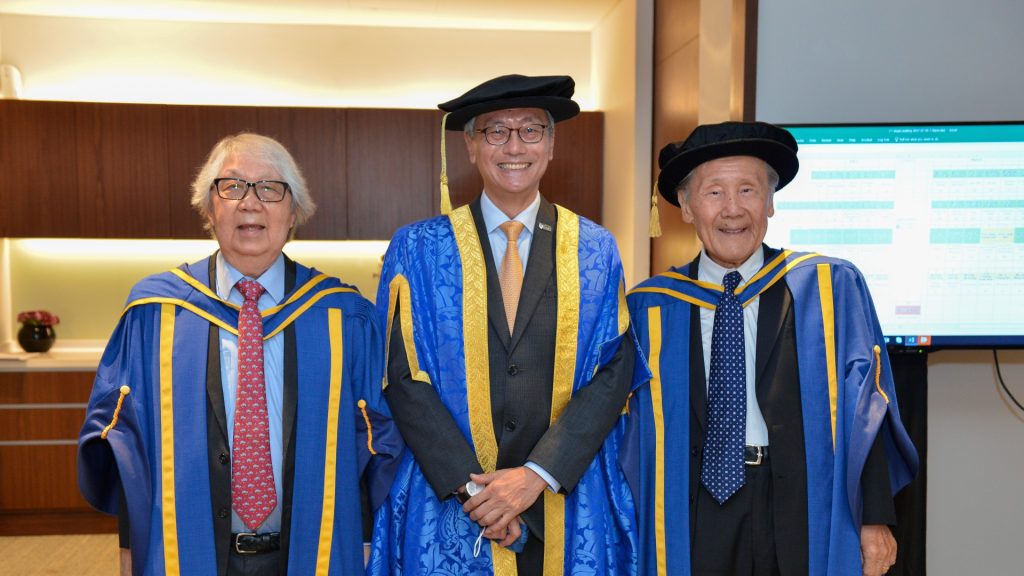
In recognition of his dedication as a practitioner-scholar and decades of service to the University, Singapore, and the world, Prof Koh, who wears many hats including Ambassador-at-Large at Singapore's Ministry of Foreign Affairs, Special Advisor of the Institute of Policy Studies, and founding Rector of NUS' Tembusu College, was conferred the Honorary Degree of Doctor of Laws.
Highlighting three areas on which he has focused his energies - law, nature, and culture - Prof Koh said, "I chose to study law, not to enrich myself, but to pursue justice and to promote the rule of law."
He also spoke about his work concerning nature and the environment, including chairing the 1992 Earth Summit, being patron of the Nature Society, and helping NUS establish the Lee Kong Chian Natural History Museum as its founding Chairman. "My vision is to live in harmony with nature. My agenda is to promote sustainability in all our endeavours," he added. "I am [also] glad that I have been able to play a very small role in transforming Singapore, from a cultural desert to a cultural oasis."
Delivering the citation for Prof Koh's conferment, Professor Simon Chesterman, Vice-Provost (Educational Innovation) and Dean of the NUS Faculty of Law and NUS College, referred to Prof Koh's "academic milestones [which] are but one strand of the rich tapestry of his professional life", as well as his leadership and guidance in education at NUS, and his eminent contributions to state and environmental diplomacy.
An Inspiring Story Worth Retelling: Prof Wang GungwuProf Wang, one of the world's foremost experts on the Chinese diaspora and Sino-Southeast Asian historical relations, was conferred the Honorary Degree of Doctor of Letters, the latest in a long list of accolades that includes the prestigious Tang Prize in Sinology, and the Distinguished Service Order of Singapore.
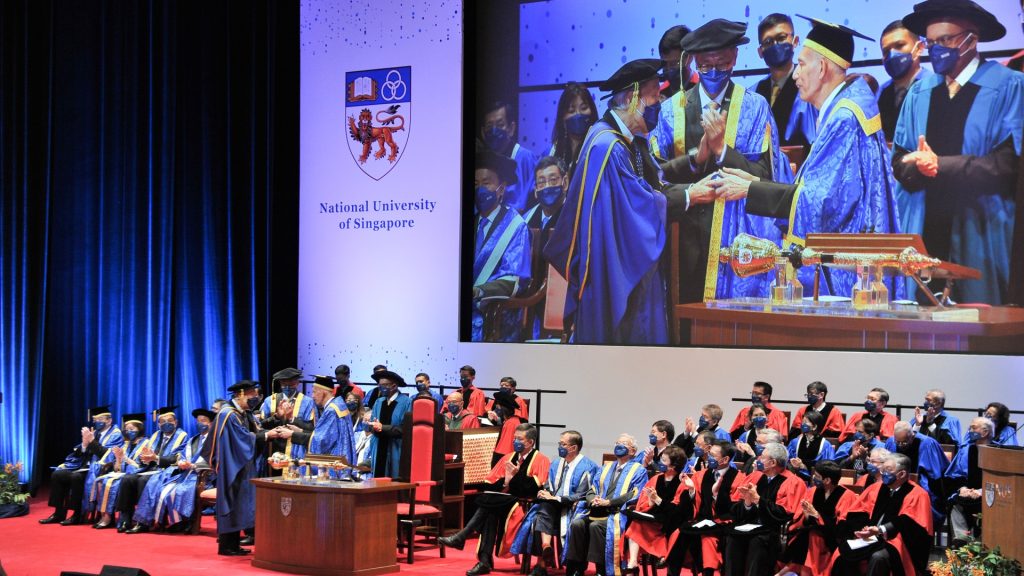
Reflecting on his time as a student of the University in colonial Malaya, Prof Wang said: "You can imagine how happy I am to be a graduand again with my alma mater. The university gave my generation a good start in life. It went on to adapt to the rapid changes of our time. In so doing, it has come out better and stronger."
He spoke about the "inspiring story worth retelling" of how the University had set out and followed its own aspirations, becoming a major centre of learning by being actively connected to the world, as well as regularly reinventing itself.
"The way our university strives to keep our humanity always in our sights is something to be very proud of. I hope that all of us graduating today, no matter where life leads us, will never hesitate to help our university to enhance this capacity to advance our human condition," Prof Wang stressed.
Prof Lionel Wee, Dean of FASS and co-Dean of the College of Humanities and Sciences, who delivered the citation on Prof Wang's conferment, lauded the latter as "an eminent figure and brilliant mind" who has made manifold contributions as a leading figure in Sinology, a renowned public intellectual, and a visionary leader and administrator at leading academic institutions around the world.
"This doctorate symbolises the meaningful connections between Professor Wang and the University, and it celebrates the long-standing contributions and value that Professor Wang's scholarly insights bring to Singapore, to Southeast Asia and, indeed, to the world," he said.
Parsing the Path ForwardInfusing the celebrations with a spirit of introspective gratitude, Valedictorian Mr Nickson Quak, who is graduating with a Bachelor of Arts with Honours (Highest Distinction) in Philosophy, Politics, and Economics said, "As varied as our journeys may have been, each and every one of us graduates here could have only made it thus far because of the unwavering support that our parents, our families, our loved ones, and our friends have so generously afforded us."
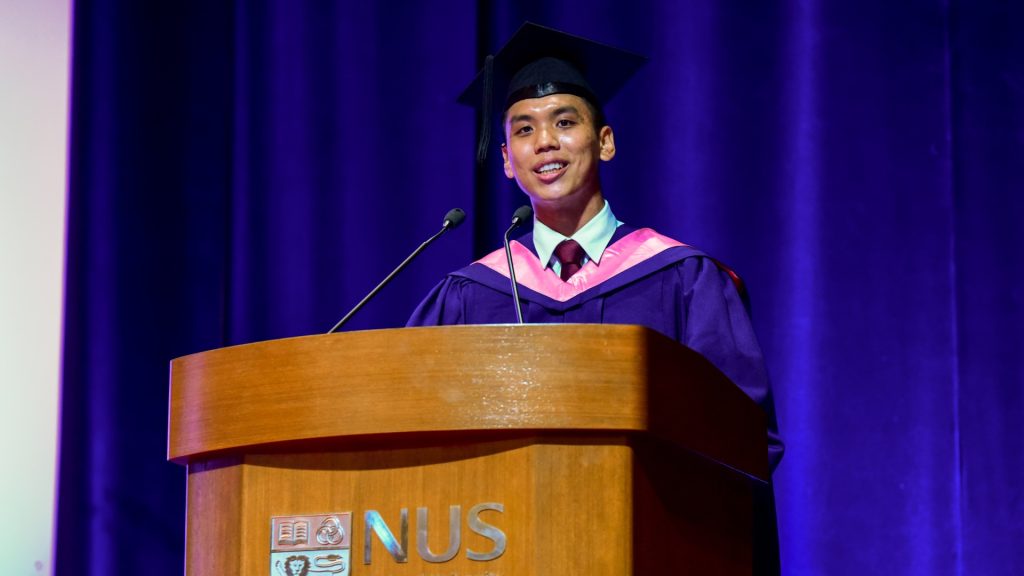
His words further summarised the spirit of determination and community that will carry graduates onwards in their lives: "If [the journey ahead] appears daunting to you, I say to you: fret not… because when you look to your left and your right, you see the resilient men and women who, forged by the challenges brought upon by the global pandemic, will always offer you a helping hand."
This story first appeared in NUSNews on 6 July 2022 as part of NUS News' coverage of Commencement 2022, which celebrates the achievements of our 13,975 graduates through 28 in-person ceremonies. For more on Commencement, look out for our upcoming graduate profiles, check out the official Commencement website, or look up (and tag) #NUS2022 and #NUSFASS on NUS' and FASS' social media channels!
The `Third Space’ Gains Traction
IN BRIEF | 10 min read
- By Prof Chan Heng Chee, NUS Trustee and member of the Yale-NUS College Governing Board, Prof at the Lee Kuan Yew Centre for Innovative Cities at SUTD and Ambassador-at-Large, Ministry of Foreign Affairs, Singapore.
Click through to read this article.
Source: The Sunday Times © SPH Media Limited. Permission required for reproduction.
Creating Impact with Community-based Research
IN BRIEF | 10 min read
- Empowering youths in Singapore, the future role of community hospitals, and women’s sexual health: these were some of the subjects explored by students of the NUS Chua Thian Poh Community Leadership Centre (CTPCLC) in their practicum projects.
Empowering youths in Singapore, the future role of community hospitals, and women’s sexual health: these were some of the subjects explored by students of the NUS Chua Thian Poh Community Leadership Centre (CTPCLC) in their practicum projects.
Showcased at the recent 10th CTPCLC symposium, these projects affirm the importance of students applying their learning in the local community, and creating lasting social impact. Held on 14 May, the symposium – also the Centre’s flagship annual event – brought thought leaders and changemakers together for a fruitful engagement on community issues.
Graced by guest-of-honour Mr Alvin Tan, Minister of State for Culture, Community and Youth, and Trade and Industry, the virtual event this year was attended by more than 120 NUS students, staff and alumni, as well as stakeholders from the public and social sectors.
In his opening address, NUS President Professor Tan Eng Chye conveyed deep appreciation for Dr Chua Thian Poh’s immense generosity and support in nurturing NUS students to be “future changemakers”. He also expressed his hope for students at CTPCLC to “enable inclusion and positive change” in the community, guided by the Centre’s five-point value system of compassion, inclusivity, equity, respect and integrity.
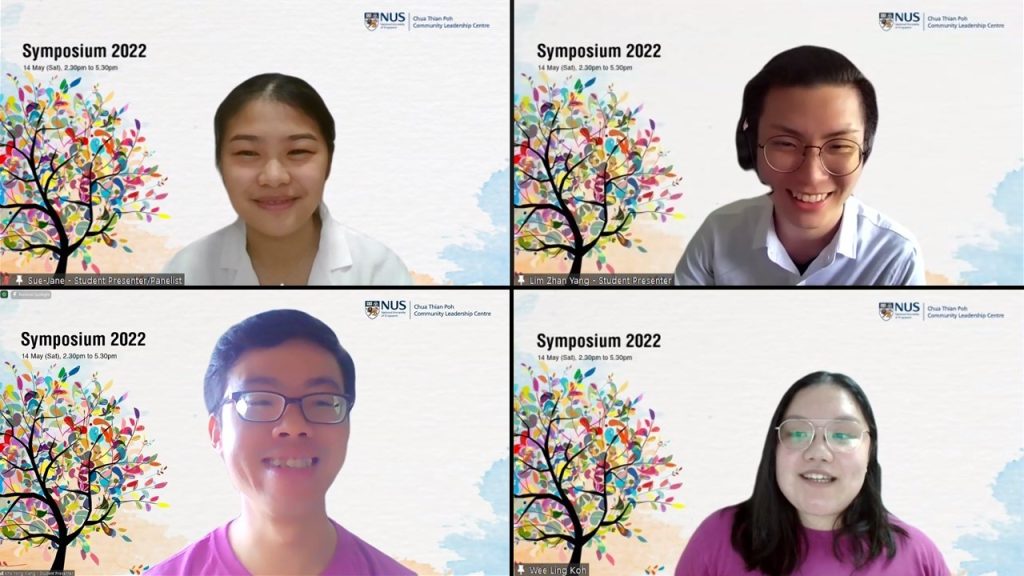
The three projects featured at the symposium were undertaken by NUS students in collaboration with various partner organisations, underscoring a collaborative approach towards creating positive impact in society.
Cheow Sue-Jane and Lim Zhan Yang, Year 4 students from Psychology and Political Science respectively, shared their research findings on the developmental outcomes of youths who had completed a youth changemaker programme run by social enterprise Make The Change (MTC). They found that the youths had expanded their knowledge of the social enterprise sector, and developed their technical skills and interest in serving others. The team’s findings will also guide MTC, which conducts social innovation learning programmes, in the design of future programmes for youths.
The various opportunities for community hospitals in meeting future healthcare needs was the focus of a team led by fourth-year Communications and New Media student Kho Yong Xiang. Guided by the question “How will Singapore's community hospitals look like in the future?”, the team collaborated with the MOH Office for Healthcare Transformation, a unit that takes an experimental and evidence-based approach to redesigning healthcare in Singapore. Together, they identified potential roles that future community hospitals can play within the Singapore healthcare ecosystem, and how the ecosystem can stay agile and move in step with Singapore's changing social demographics.
In presenting her group’s study of Action for AIDS’ (AfA) Love and Sexual Health programme, Koh Wee Ling, a graduate from the CTPCLC programme, elaborated on findings on sexual behaviours and attitudes of young women, as well as their understanding of Human Immunodeficiency Virus and prevention methods for sexually transmitted infections. The outcomes will contribute to AfA’s programme development in raising awareness about sexual health.
CTPCLC Director, Associate Professor Chng Huang Hoon, expressed her pride in how students are contributing to positive change in Singapore society through their research. “Our students’ research signals the first essential step in which they have taken to become impactful youth changemakers in years to come”, she said.
Mental Health in Singapore: A Growing Challenge?This year’s symposium also featured a panel discussion, “Mental health in Singapore: A growing challenge?”. Moderated by CTPCLC instructor Dr Kevin Tan, the discussion – featuring panellists Minister of State Mr Alvin Tan, Mr Tim Lee of Caregivers Alliance Limited, Mr Khoo Yi Feng of Limitless Singapore, and NUS-CTPCLC student Ms Cheow Sue-Jane –offered insights on how different community stakeholders can respond to growing mental health concerns in Singapore.
Minister of State Mr Alvin Tan said that an inter-agency taskforce has been set up to address mental health and well-being issues in Singapore, as the government seeks to co-create solutions to improve the mental health ecosystem in Singapore. He iterated the importance of looking out for others and practising self-care to tend to one’s mental health and well-being. Mr Tan also shared that the taskforce, which has been reviewing the population’s mental health needs, will be launching a public consultation in the coming weeks. He encouraged the audience to look out for the consultation sessions.
As fellow panellist Khoo Yi Feng also characterised it, “mental health needs to be a leadership priority that requires the urgent attention of all levels of institutions, because it has profound implications for performance and collective well-being”.
By NUS Chua Thian Poh Community Leadership Centre
This article first appeared in NUSNews on 23 May 2022.
#ICYMI: FASS@CHS Open House 2022 — View On Demand Here!
IN BRIEF | 3 min read
- If you missed the NUS College of Humanities Open House 2022, worry not. All the talks and engagement sessions of 11 and 14 May are available for your viewing on-demand here.
Prospective students considering their offer but have missed the NUS College of Humanities Open House 2022 do not have to worry about missing out on information and insights they may need to make their decisions.
All the talks and FASS@CHS engagement sessions listed below are available for your viewing on-demand here or at https://bit.ly/FASSatCHSOH2022.
NUS CHS Open House 2022 Online (11 May 2022)
- Introduction to CHS, CHS Core Curriculum, Student Experiences & Learning Pathways
- Experiential Learning & Career Preparation, and Student Leaders Sharing
- BES-XDP (Bachelor of Environmental Studies Cross-Disciplinary Programme)
- DSE-XDP (Data Science and Economics Cross-Disciplinary Programme)
- PPE-XDP (Philosophy, Politics, and Economics Cross-Disciplinary Programme)
Introduction to CHS
Experiential Learning, Career Preparation, Student Leaders
BES-XDP
DSE-XDP
PPE-XDP
South Asian Studies
Education@FASS Depth, Diversity, and Difference I (11.30–1200)
Communications and New Media
Languages
Chinese Studies
Education@FASS Depth, Diversity and Difference II (1430–1500)
Anthropology
Economics
FASS@CHS Open House 2022 On-Campus (14 May 2022)
- The CHS Common Curriculum: FASS@CHS Integrated courses
- South Asian Studies
- Education@FASS: Depth, Diversity & Difference I (11.30 am -12.00 pm)
- Communications and New Media
- Languages
- Chinese Studies
- Education@FASS: Depth, Diversity & Difference II (2.30 -3.00 pm)
- Anthropology
- Economics
NUS CHS Open House 2022: Discover #Interdisciplinary Education!
IN BRIEF | 5 min read
- The NUS College of Humanities and Sciences is hosting its Open House 2022 next week and all prospective students who have received offers are invited!
- A two-day hybrid programme – 11 May on Zoom (and viewable on CHS’ Facebook page) and 14 May on several locations across the NUS Kent Ridge campus, specifically the areas around the Faculty of Arts and Social Science (FASS), and the Faculty of Science (FoS) – CHS Open House 2022 aims to address all concerns a prospective undergraduate may have before committing to academic at the University and College.
- Highlights include opportunities to engage, discuss and explore academic pursuits, career development and student life at the College with key faculty and administrative staff and leadership — live and in person.
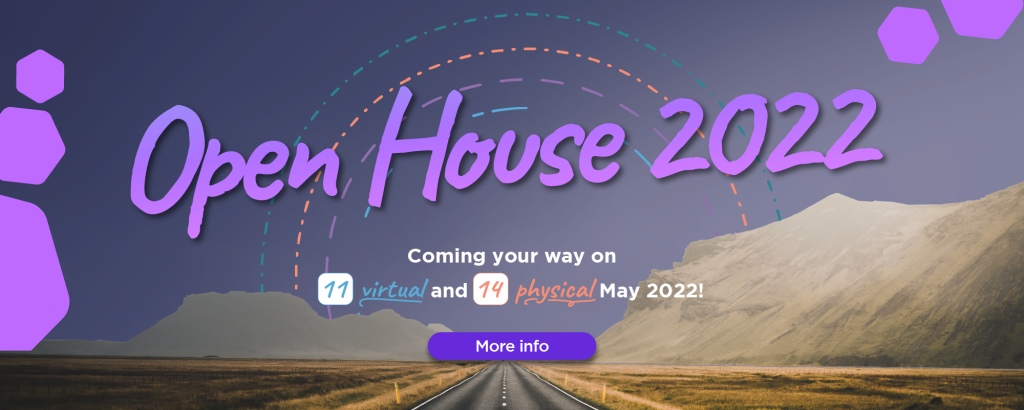
The NUS College of Humanities and Sciences is hosting its Open House 2022 next week and all prospective students who have received their offers are invited. As the deadline for them to accept their offers is looming, CHS has put together a programme aimed at answering all the questions they may have and clarifying all their concerns as much as possible.
Marking a cautiously calibrated return of the University to the normalcy of hosting large on-site events, this year’s CHS Open House is a two-day hybrid programme: 11 May on Zoom (and viewable on CHS’ Facebook page) and 14 May on several locations across the NUS Kent Ridge campus, specifically the areas around the Faculty of Arts and Social Science (FASS), and the Faculty of Science (FoS).*
11 May 2022 (Wednesday): The Essentials, OnlineThis a series of comprehensive information sessions (on Zoom and livestreamed on Facebook Live) covering everything new undergraduates need to know to get the most out of their education journey with CHS, including the:
- CHS Core Curriculum
- College’s three challenging but rewarding cross-disciplinary programmes
- Data Science and Economics (DSE-XDP)
- Environmental Studies (BES-XDP)
- Philosophy, Politics, and Economics (PPE-XDP)
- myriad Learning Pathways laid for you
- versatile career development programmes designed to prepare you for the future workplace
- CHS Student Experience—eye-opening and busy, yet energising and enriching
Speakers and panelists include CHS Co-Deans, Vice-Deans, key faculty staff members, career preparation and student services leader.
For more information and links to the 11 May sessions, click here.
14 May 2022 (Saturday): Get Personal, On CampusThe College is calling for prospective students to come on site, visit where they could well be spending their undergraduate years very soon, and speak to their future instructors and potential mentors. The full-day programme – running in key FASS and FoS locations across the NUS campus – offers:
- entry to witness and even participate in talks/lectures and panel discussions presented and hosted by award-winning instructors on a variety of academic subjects, interdisciplinary topics and specialised research areas
- face-to-face engagement with faculty, admin and student representatives from ALL Departments and student organisations under CHS, and opportunities to explore academic, financial aid and student activity options with the people in the know
- consultation with the career development teams of CHS
- guided Walking Tours across the facilities of FoS and FASS
For more information on the activities planned for 14 May, click here.
Discover Your #Interdisciplinary Future @ CHSThis Open House is the last chance for prospective students to learn more about the complete #interdisciplinary educational experience that they can expect at CHS. One that opens up a world of possibilities and equips them with skills and knowledge across the humanities, social sciences, physical sciences and applied sciences. One that inspires, cultivates and prepares them to work across diverse industries and sectors, with multidisciplinary teams, to solve some of the most complex wicked problems facing the world today — from social inequality to food shortage, unsustainable development and global warming. And one that grooms them to be the leaders of public institutions and private enterprise tomorrow.
* Campus shuttle bus services will be made available on 14 May to all visitors for easier movement across campus, which extends to Kent Ridge MRT.
FASS Alumni Honoured for Sterling Contributions to Nation and Society
IN BRIEF | 5 min read
- The NUS Faculty of Arts and Social Sciences (FASS) honoured five eminent alumni on 29 April 2022, presenting each with a FASS Distinguished Arts and Social Sciences Alumni Award 2021.
- The outstanding alumni were:
- Mr Peter Tan (Japanese Studies, ’92), Singapore’s Ambassador to Japan
- Mrs Josephine Teo (Economics, ’91), Minister for Communications and Information and Second Minister for Home Affairs
- Mr Haresh Sharma (English Language and English Literature, ‘90), Resident Playwright of The Necessary Stage
- Ms Denise Phua (English Language and Political Science, ‘83), Mayor of Central Singapore District
- Mr Low Thia Khiang (Chinese Studies, ‘81), former Secretary-General of the Workers’ Party
It was all smiles as five eminent alumni from the NUS Faculty of Arts and Social Sciences (FASS) took to the stage on 29 April to receive the FASS Distinguished Arts and Social Sciences Alumni Award 2021.
The outstanding alumni who took home the honours were:
- Mr Peter Tan (Japanese Studies, ’92), Singapore’s Ambassador to Japan
- Mrs Josephine Teo (Economics, ’91), Minister for Communications and Information and Second Minister for Home Affairs
- Mr Haresh Sharma (English Language and English Literature, ‘90), Resident Playwright of The Necessary Stage
- Ms Denise Phua (English Language and Political Science, ‘83), Mayor of Central Singapore District
- Mr Low Thia Khiang (Chinese Studies, ‘81), former Secretary-General of the Workers’ Party
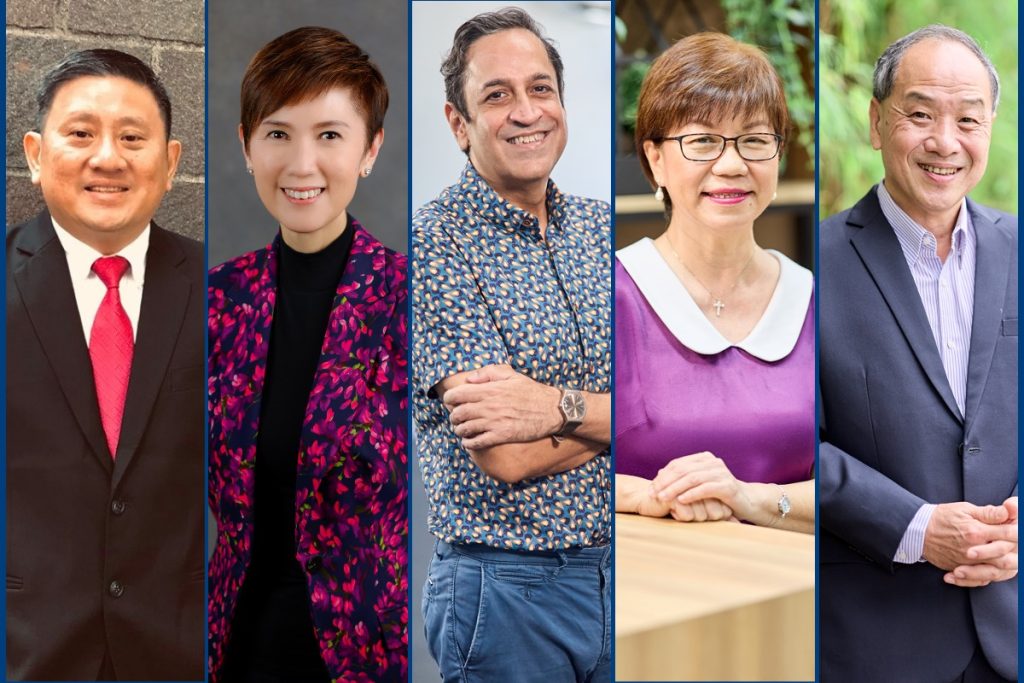
The 2021 awards ceremony had been postponed to this year due to the COVID-19 pandemic.
“These five individuals have contributed to Singapore in distinctive ways, and their passion, perseverance and pursuit of excellence serve as an inspiration to current and future generations of FASS students,” said NUS President Professor Tan Eng Chye.
“NUS is proud to have them as our alumni, and I hope they will continue to maintain close ties with their alma mater and with FASS. There is much we can do together, to nurture and inspire the next generation of Singaporeans to realise their potential.”
Echoing similar sentiments was FASS Dean Professor Lionel Wee who added that the five epitomise the spirit of service to the community. They play pivotal roles in Singapore and globally, through the arts, shaping of policies, diplomatic relations and community engagement.
The Honourees and their Contributions to Nation and SocietyMr Peter Tan has over three decades of foreign service experience under his belt. He has served with distinction in various capacities on issues related to areas including Southeast Asia, Northeast Asia, Europe and the United Nations since joining the Ministry of Foreign Affairs in 1992. He has vast diplomatic experience with regard to Japan, having previously served in the Singapore Embassy in Tokyo as First Secretary, as Counsellor, as well as Acting Minister-Counsellor and Deputy Chief of Mission. Mr Tan was awarded the Public Administration Medal (Silver) in 2008 for his contributions.
Playing a critical role in policymaking is Mrs Josephine Teo who is Singapore’s Minister for Communications and Information, Second Minister for Home Affairs, and Minister-in-charge of Smart Nation and Cybersecurity. She is also a member of the National Jobs Council and the Future Economy Council. Mrs Teo was the Minister for Manpower from May 2018 till May 2021, and previously served in the Prime Minister’s Office and other heavyweight ministries like Finance, Transport and Foreign Affairs. She has been a member of Parliament (MP) since 2006.
A critically-acclaimed playwright known for his socially-conscious plays, Mr Haresh Sharma began writing plays during his undergraduate days. As Resident Playwright of homegrown theatre The Necessary Stage, he has written more than 120 plays which have been staged in over 20 cities. His play on mental illness, Off Centre, was the first Singapore play selected by the Ministry of Education as a Literature text for the GCE N- and O-Levels. A 2015 Cultural Medallion recipient, Mr Sharma was also the first non-American to be awarded the prestigious Goldberg Master Playwright by New York University's Tisch School of the Arts in 2011.
Ms Denise Phua gave up a successful corporate career in 2005 to become a full-time special needs volunteer before joining politics in 2006. An MP for Jalan Besar Group Representation Constituency (GRC), she is best known for her advocacy for those at risk of being left behind in Singapore. She is one of the key architects behind three 5-year Enabling Masterplans for the Disabled in the country, and she is the President of Autism Resource Centre (Singapore) and Chairman of Autism Association Singapore – both being established autism charities. She supervises the Pathlight School – Singapore’s first autism special school which she co-founded – and helped start The Purple Parade, an annual parade to support inclusion.
Making his mark in politics is former politician Mr Low Thia Khiang who served as Secretary-General of the Workers’ Party between 2001 and 2018. He was one of two opposition MPs between 2001 and 2011 and was the de facto opposition leader between 2006 and 2018. Following the 2011 General Election, Mr Low became one of five elected opposition MPs of Aljunied GRC – and went on to represent the Bedok Reservoir–Punggol division between 2011 and 2020. Mr Low stepped down as the MP for Aljunied GRC prior to the 2020 General Election, making him Singapore's longest serving opposition MP with 29 years in service.
The Journey with FASS and BeyondDinner guests were treated to videos of the awardees who shared about their FASS experience – how it has shaped their lives and careers thereafter – as well as their career milestones.
Both Mr Sharma and Mr Tan shared fond memories of spending time in the libraries and reading rooms, as well as the invaluable friendships that blossomed beyond the classrooms in FASS. For Mr Sharma, NUS played a pivotal role in his theatre journey. He explained, “There was the huge support structure all around me, from the lunchtime performances where we could perform, to my lecturers and tutors, who when they found out that I was interested in Singapore theatre and literature, started encouraging me.”
Reminiscing on her university “days of freedom”, Ms Phua appreciated the considerable latitude afforded to her to select subjects that she loved and pick the lecturers she wanted to learn from. FASS, she shared, had helped hone her ability to think critically, developed her confidence to speak up, and made her realise the importance of finding solutions to problems to make a difference.
Established in 2015, the Awards recognise individuals for their distinguished scholarship and exemplary service to the Faculty, the University and Singapore. These outstanding recipients have made significant impact in various fields locally and internationally, which has contributed to the betterment and promotion of the arts and social sciences.
Click here for more info on this year’s award recipients.
This article first appeared in NUSNews on 29 April 2022.
#DiscoverFASS@CHS 2022 | Watch Masterclasses Here!

As part of the #DiscoverFASS@CHS campaign leading up to our Open House in May this year, we are holding Masterclasses presented by three of our award-winning Faculty members, and streaming them 'live' online here. Masterclasses by Award-Winning Faculty
Experience lessons led by our dynamic faculty members. See schedule below.
| 0930 - 1000 | Prof William Bain The Wisdom of Liars and the Ethics of War |
| 1030 - 1100 | Assoc Prof Deborah Shamoon Animé and the Japanese |
| 1130 - 1200 | Dr Maiya Murphy Theatre as Aesthetic Art and Social Tool |
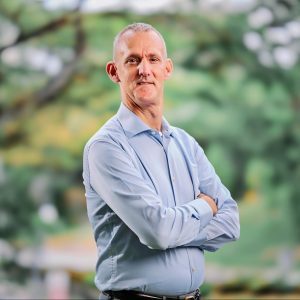
Prof William Bain, NUS Political Science
The Wisdom of Liars and the Ethics of War
War is widely thought to be estranged from moral judgement-the language of right and wrong. In time of war self-interest and necessity quickly overcome moderation and restraint; and the call of the nation-or some other community-justifies conduct that would be unacceptable in all other contexts. The strong do what they will and the weak suffer what they must. In this masterclass I will sketch out the conventional ethics of war in modern international relations. One might object that moral judgement is, in fact, a charade, a mask behind which hypocrisy lurks. I respond to this objection by arguing that liars and hypocrites provide the best evidence of authentic moral judgement in time of war.
William Bain is Professor of international relations in NUS Political Science. His research and teaching focuses on questions and theories of world order, international ethics, and religion and international relations. His most recent book, Political Theology of International Order, argues that dominant ways of imagining international order are properly understood as a worldly application of a theological pattern that originates in the Middle Ages.
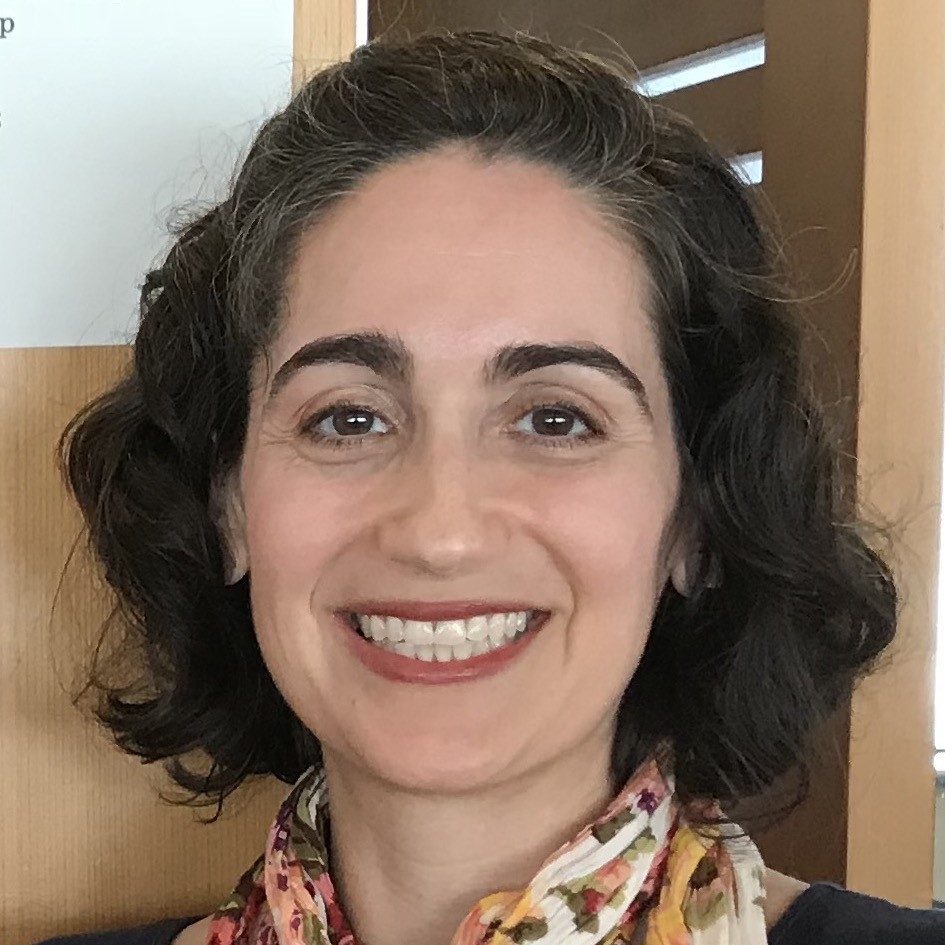
Assoc Prof Deborah Shamoon, NUS Japanese Studies
"I said Anime, but There's Hardly Been Any Movement!": Understanding Limited Animation
What is Japanese about anime? How do we discuss anime in an academic context? This lecture will give a brief introduction to the history of anime and explain the limited animation techniques that give anime its distinct look and feel. We will also discuss the way that form affects content, how cost-saving measures in animation gave rise to a national style, and why certain tropes get repeated in anime narratives. This lecture will change the way you look at anime, and introduce you to key concepts in anime studies, including superflat, database consumption, and the media mix.
Associate Professor Deborah Shamoon(NUS Japanese Studies), who is originally from the United States, received her PhD in Japanese Studies at the University of California, Berkeley, and taught at the University of Notre Dame before coming to NUS in 2012. Her areas of specialisation are cultural studies and gender studies. She has published books and essays on Japanese manga, anime, literature and film. She teaches courses on Japanese popular culture, art history, and literature. of international relations in NUS Political Science. His research and teaching focuses on questions and theories of world order, international ethics, and religion and international relations. His most recent book, Political Theology of International Order, argues that dominant ways of imagining international order are properly understood as a worldly application of a theological pattern that originates in the Middle Ages.
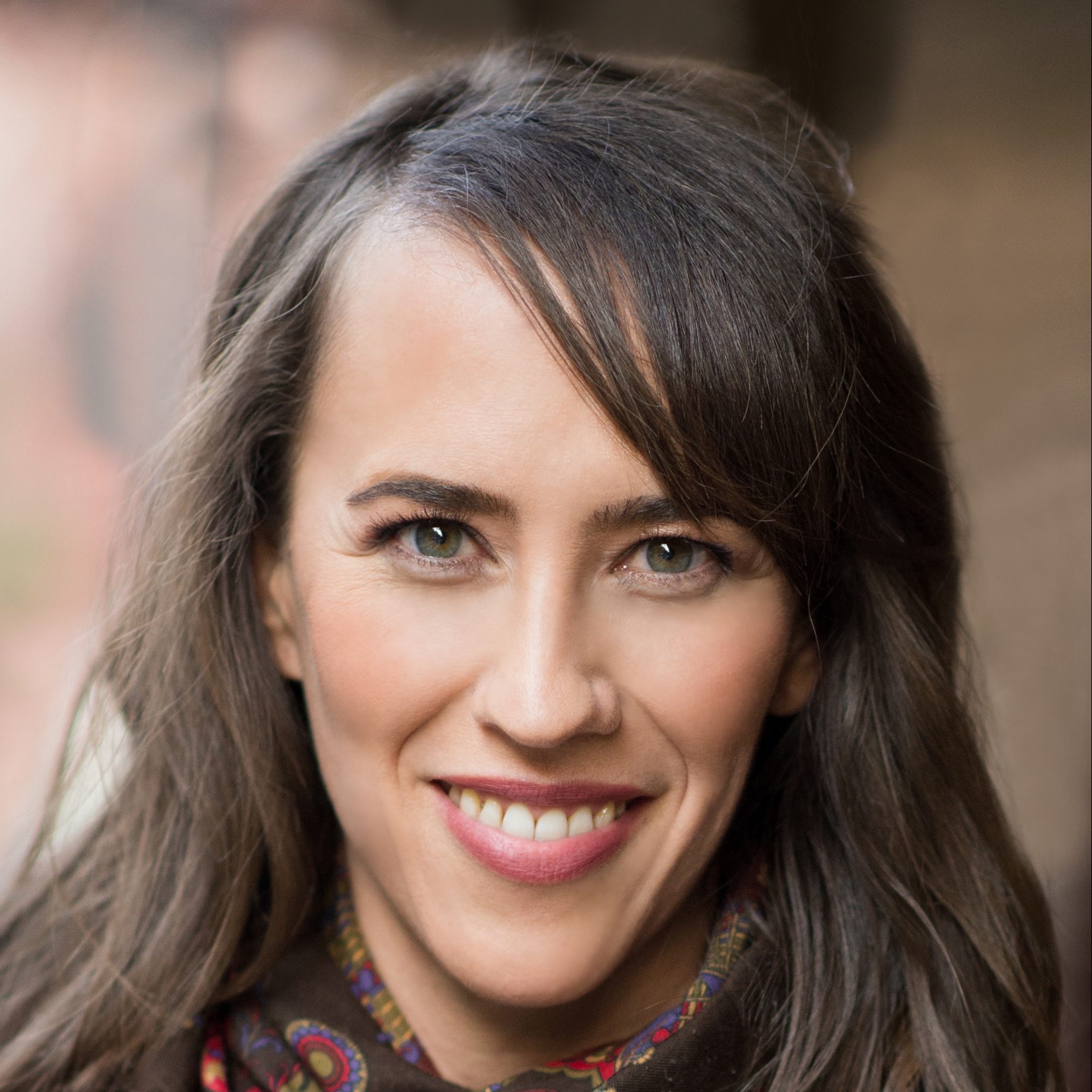
Dr Maiya Murphy, NUS English, Linguistics & Theatre Studies
Theatre and Performance on Stage and in the World
This class explores how performance can be understood as aesthetic art and social tool. By taking the concerns and approaches of the performing arts seriously, we will examine how theatre and performance can reflect human behaviour and shape social life. We will consider the diversity of performances across time and place, some unique skills and intelligences embedded in artistic technique, and recent exchanges between theatre and science. Through drawing together the realms of imagination and everyday life, this class demonstrates some key ways in which performance helps us teach ourselves how to better live in our world.
Dr Maiya Murphy works at the confluence of performer training, theatre making, movement, and cognitive approaches to understanding theatre. She is the author of Enacting Lecoq: Movement in Theatre, Cognition, and Life(2019). Her work has also appeared in Phenomenology and the Cognitive Sciences, Constructivist Foundations, Theatre, Dance and Performance Training, New Theatre Quarterly, Theatre Survey, Practice as Research in the Arts and Beyond (Robin Nelson, ed.), The Routledge Companion to Jacques Lecoq (Mark Evans and Rick Kemp, eds.), and The Oxford Handbook of Dance and Theater (Nadine George-Graves, ed.). She is an Assistant Professor in NUS Theatre Studies (Department of English, Linguistics and Theatre Studies) and makes theatre with her collective, Autopoetics.
Watch Masterclasses!Is the People’s Action Party Here to Stay: Analysing the Resilience of the One-Party Dominant State in Singapore
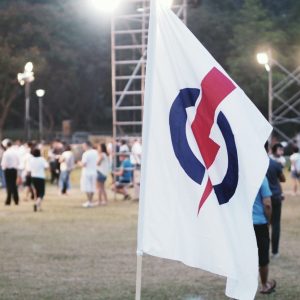
Singapore’s first General Election as an independent nation was held on 13 April 1968. Out of fifty-eight seats, only two seats contested by the Worker’s Party, and another five seats contested by independents. This resulted in a walkover election won by the People’s Action Party (PAP) on nomination day. Since then, the PAP have established a monopoly in Singapore with walkovers a persistent feature in each successive General Election. It was only from 2015 onwards that all seats were contested by the opposition.
Singapore’s General Elections 2020 marked a shift towards strong opposition parties. Although the PAP won a strong mandate, historical developments suggest why a noticeable shift was experienced. Associate Professor Bilveer Singh (NUS Political Science) reviews the broad political changes that may have affected the PAP’s GE2020 results in ‘New Issues and Developments in Singapore as the Pre-Dominant PAP Prepares for the Forthcoming General Elections’, a chapter in ‘Is the People’s Action Party Here to Stay?’ (World Scientific, 2019).
Unity was a dominant rhetoric emphasised by Deputy Prime Minister Heng Swee Kiat. His ability to unite the fourth generation of PAP members and his ‘amicable character’ reflected well of the prospective prime minister. Heng also posits unity and responsibility would align Members of Parliament to a common goal, and lead to a corruption-free government.
Although the PAP has adopted a more conservative ‘consultative approach’, they have continued to use fear to win votes. Most notably is their accusation that the Aljunied-Hougang Town Council (managed by the Workers’ Party) failed to efficiently use public funds. This has drawn criticism from Dr Tan Cheng Bock (Party Chief, Singapore Democratic Party), Lim Tean (Party Chief, People’s Voice Party) and Yee Jenn Jong (former Workers’ Party NCMP) who contested against the use of fear to reign in dissent and strengthen support for their mandate. These public figures also conveyed public sentiments that the PAP was losing touch with the ground.
A/P Singh also noted the public’s diminishing trust in the PAP’s leadership. From 2016 to 2019, multiple data breaches experienced by the Ministry of Health questioned the efficacy of the government’s cybersecurity. Hyflux, a private corporation under the Public-Private Partnership model, also faced controversy when its failing business was expected to experience heavy investment losses. The family feud over the personal residence of Singapore’s founding father, Lee Kuan Yew, may also have contributed to the loss of faith. A/P Singh suggests such ‘public service failures’ may undermine the PAP’s credibility.
Despite the Opposition’s criticism, A/P Singh suggests that they will need to establish themselves amongst Singaporeans. The Opposition’s generally poor performance have convinced the public to return to the security as evident from the PAP’s track record. A successful campaign against the dominant incumbent will thus require the Opposition to convince the public with strong alternatives.
Read the chapter here.
Sixteen NUS Programmes in Global Top 10
IN BRIEF | 5 min read
- Programmes include those from Arts and Social Sciences, Computer Science, Design and Engineering and Science – demonstrating the University’s strengths across its different colleges, faculties and schools, according to the latest Quacquarelli Symonds (QS) World University Rankings by Subject.
- FASS courses among the World's Top 10 (in their respective subject areas) include Anthropology, Geography, Linguistics, Politics & International Studies, and Sociology.

Sixteen of the University’s academic programmes have been placed in the top 10 worldwide, according to the latest Quacquarelli Symonds (QS) World University Rankings by Subject.
These programmes include those from Arts and Social Sciences, Computer Science, Design and Engineering, and Science – demonstrating the University’s strengths across its different colleges, faculties and schools.
“We are delighted that NUS continues to be among Asia’s best universities. We are in the top 10 in 16 subject areas in the QS World University Rankings by Subject 2022. NUS is also in the top 10 in two (of five) broad categories - Engineering & Technology and Social Sciences & Management - in the same rankings,” said NUS Senior Deputy President and Provost Professor Ho Teck Hua.
“This is high international recognition of our world-leading faculty, talented students, staff and alumni, and will serve as strong encouragement for all of us at NUS."
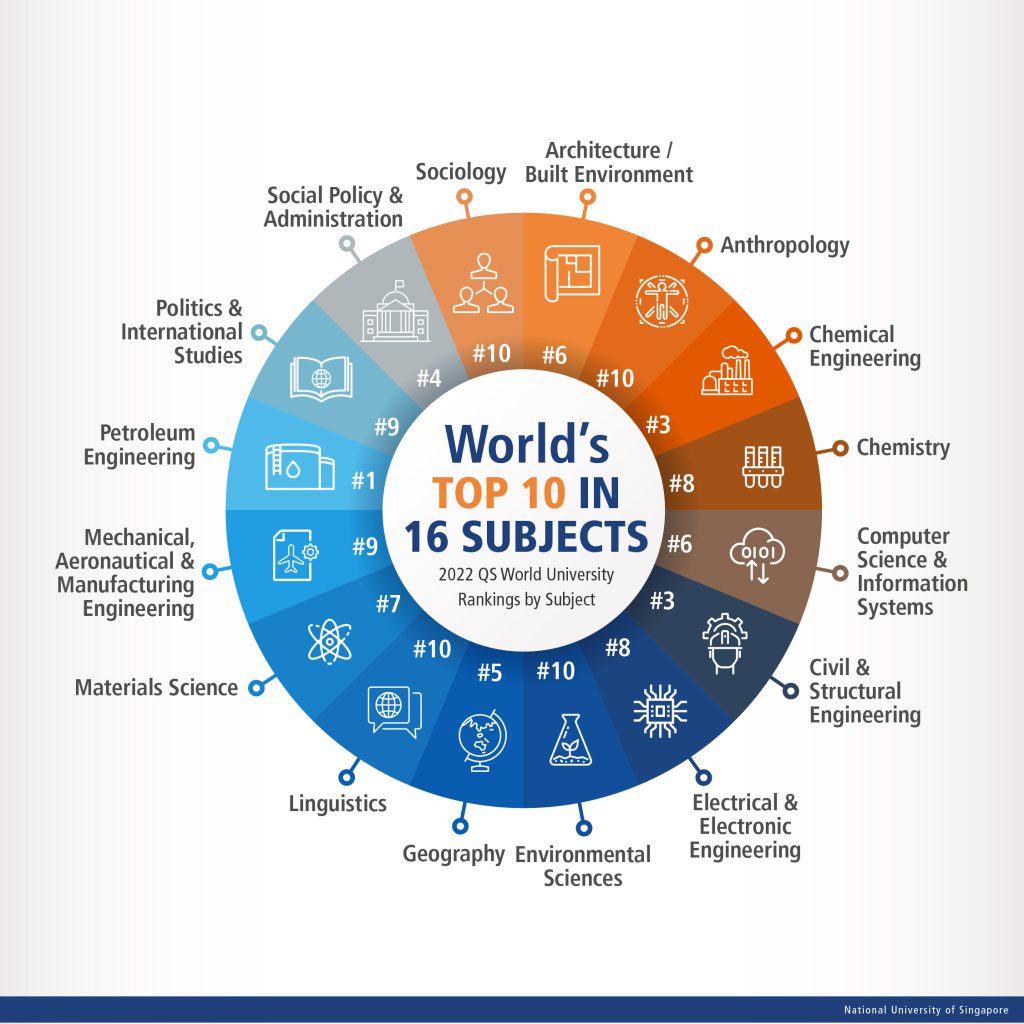
NUS takes pole position as Asia’s best university, sharing the top spot with the University of Tokyo. Both universities have 37 programmes ranked in the top 50.
The QS rankings provide independent comparative analysis of the performance of 15,200 individual university programmes at 1,543 universities across the world. The programmes are across 51 academic disciplines and five broad faculty areas.
“The consistent improvements made by Singaporean institutions in our rankings result from a decade of investment and strategizing,” said Mr Ben Sowter, Research Director at QS.
He noted that NUS has the largest endowment of any university in Asia today. “Advantaged by this long-term preparation for their financial futures and by a relentlessly international outlook, Singaporean higher education is going from strength to strength,” added Mr Sowter.
Education to prepare students for a post-pandemic worldGraduates are expected to be agile and adaptable in the post-pandemic world order. In training students to connect the dots across diverse disciplines, NUS has embarked on educational innovations centred on interdisciplinarity and experiential learning.
The establishment of the College of Humanities and Sciences and the College of Design and Engineering has allowed NUS to deliver future-focused interdisciplinary education at scale, while offering students flexibility to pursue multiple pathways and specialisations. The result: an education that offers both breadth and depth.
This will be reinforced with the inaugural intake at NUS College – Singapore’s first undergraduate honours college – in the new academic year. The college will welcome a diverse community of students from across 50 majors including Humanities and Sciences, Engineering, Environmental Studies, Business, Computer Science and Law. These undergraduates will come together to pursue experiential and interdisciplinary learning in an immersive residential environment.
This article first appeared in NUSNews on 6 April 2022.
Appointment as “Chair-Elect” for AAS Malaysia, Singapore, and Brunei Studies Group 2022-2024

Assistant Professor Elvin Ong has been appointed as “Chair-Elect” of the Association for Asian Studies (AAS) Malaysia, Singapore, and Brunei (MSB) Studies Group from 2022 to 2024. He will work with the new Chair of the MSB Studies Group, Associate Professor Cheong Soon Gan (University of Wisconsin-Superior), and Chair-Mentor Professor Patricia Sloan-White (University of Delaware), in the administration of the group for the two years, and then take over as Chair from 2025.
The Association for Asian Studies (AAS) (https://www.asianstudies.org/) is a scholarly, professional association dedicated to representing all persons interested in the study of Asia across all academic disciplines, and is one of the largest organization of its kind in the world. The MSB Studies Group (http://www.msbstudies.org/) is an official committee of the AAS, representing a network of scholars, students, and observers with research interests in the three countries.
Assistant Professor Elvin Ong’s research interests are in the study of democratization in East and Southeast Asia, with a specific focus on opposition parties in hybrid regimes. You can find out more about his research here: https://sites.google.com/site/jyelvinong/home.
When Ties Run Deep
IN BRIEF | 5 min read
- Celebrated alumna Ms Violet Oon (Political Science and Sociology, ’71), relates how her association with the University spans across generations and is very much intertwined with her own family history.

When I was a teenager, my father casually commented one day as we drove through Club Street, “We used to live here when I was a child – my grandfather Mr Oon Cheng Lock used to gamble on behalf of the towkays in the Gentlemen’s Clubs along this street and he made good money.” Intrigued, I asked what that meant. My late father said, “You know, like Rhett Butler in Gone with the Wind – he kept 10 per cent of the takings.” He jested that it was the spoils of the table that put two sons through King Edward VII Medical School in the early 20th century. Was this true or false? I am not certain, but I much prefer this whimsical account, which entwines three generations of Oons – my grandfather, my father and I – with the long history of today’s National University of Singapore (NUS).
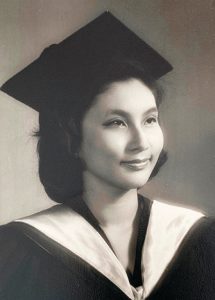
I think that few early families can lay claim to three generations of graduates from NUS, a family history spanning over 60 years. My grandfather Dr Oon Kock Tee (also known as Oon Kok Kee) and his brother Dr Oon Sim Kong graduated with Licentiates in Medicine and Surgery from King Edward VII Medical School in 1916 and 1917 respectively. Memories of my paternal grandparents were retold as tales from my father. “Your grandfather used to run a clinic at North Bridge Road, opposite the original location of Islamic Restaurant,” my father shared, “He was perhaps the only doctor who was unable to ‘make money’.” According to my father, my grandfather soon went on the high seas to become a ship’s doctor, leaving my grandmother in Singapore to fend for their growing brood of children on very little money. Whenever he docked back in Singapore, another baby was soon on the way.
In October 1928, my grandfather, who was part of the Chinese Medical Students’ Union, with 50 other doctors, all graduates of King Edward VII Medical School, attended a dinner in celebration of the 17th anniversary of the Republic of China, at the then-Garden Club. This was featured in The Straits Times.
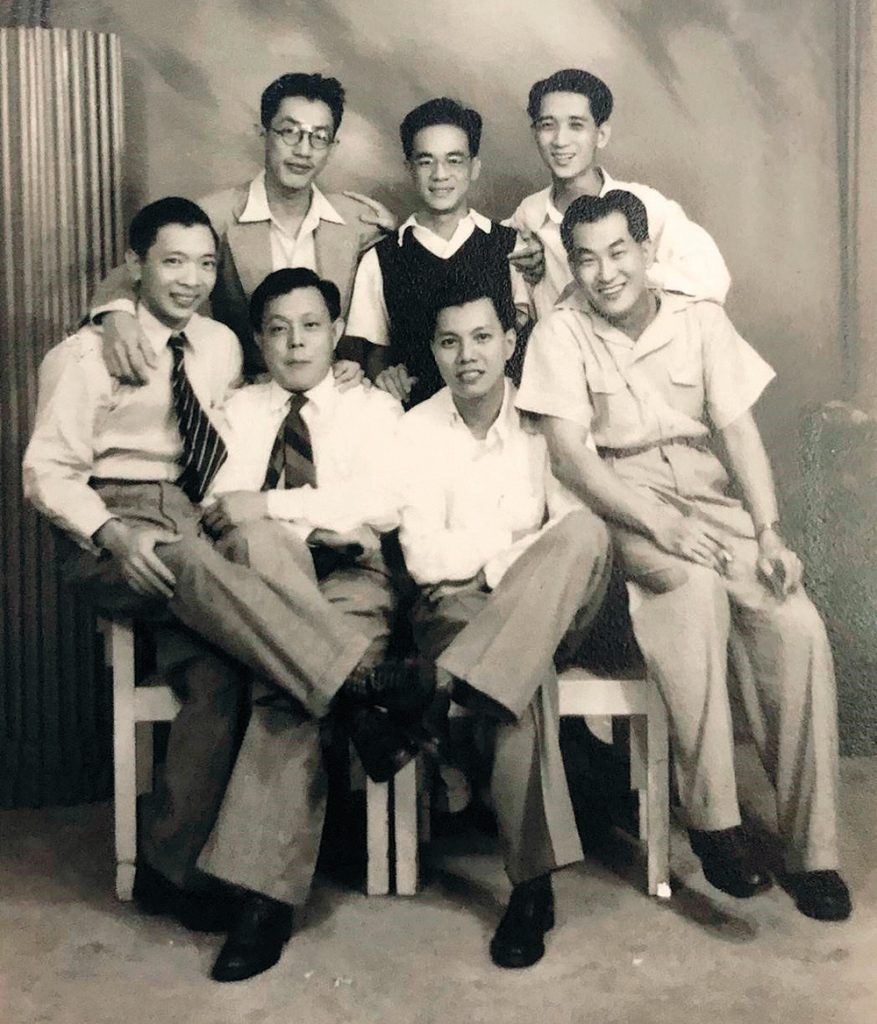
The story continues when my father, Mr Oon Beng Soon (Arts ’46), entered Raffles College in 1939. Raffles College was the hallowed institute of learning of Singapore and Malaya when he enrolled as a student. In 1928, 43 students had enrolled when Raffles College opened. I discovered only recently that Raffles College produced a total of just 573 graduates from that enormous building at Bukit Timah Road. On 8 October 1949, Raffles College and King Edward VII College of Medicine merged to form the University of Malaya.
My father’s classmates — who included the late Mr Lee Kip Lee (Arts ’46), the father of Singaporean cultural icon Mr Dick Lee — skipped Final Exams due to World War Two. They were both later awarded War Diplomas in Geography from Raffles College.
Geography was my father’s favourite subject. One day, he nostalgically recalled, “Just before the fall of Singapore to the Japanese in 1942, the [then-]Head of Department, Professor Ernest Henry George Dobby, brought his favourite Geography students, Robert and I, to India to escape the Japanese.” My grandfather eventually passed away in Ceylon (now Sri Lanka) in 1945. My father, then in India, brought the ashes of Dr Oon Kock Tee back to Singapore. The happy wanderer finally came home to roost. Was the love of Geography and wanderlust part of the Oon DNA? Perhaps. My father’s career as the first local executive in the Royal Dutch Shell company meant that his job brought us to many postings, from the neighbouring areas of Malacca, Kuala Lumpur and Jesselton (Kota Kinabalu today), to a posting in London in 1961. Although we looked forward to our moves as we traversed Britain, France and Spain, we always came home to Singapore
My father and his friends formed the Topsy Turvy Club (TTC), and they had lots of fun and were up to hijinks while in college, just the way we would go on to have fun as students in the late 1960s. During World War Two, Raffles College was turned into a medical facility and was the Japanese army’s headquarters in Singapore, later reverting to a school of higher learning after their surrender. Two buildings stand sacrosanct in my own Singapore memories – King Edward VII College of Medicine, in the Singapore General Hospital grounds; and the Bukit Timah Campus, which was my father’s and my home for many years. It was a joyous day when the Bukit Timah campus was announced to be returned to the National University of Singapore in 2005, architecturally intact and where I had walked through the same hallways and quadrangles as my father.
What an exciting history my campus at Bukit Timah and my grandfather’s campus in the Singapore General Hospital grounds have had. They produced an admirable harvest of graduates — from doctors, to statesmen and heads of country mid-century — Mr Lee Kuan Yew (’41), our first Prime Minister, known as the father of modern Singapore; and the brilliant economist Dr Goh Keng Swee (Arts ’39), who served as Singapore’s second Deputy Prime Minister. There were also notable names across the pond, such as Dr Mahathir Mohamad (Medicine ’54), former Prime Minister of Malaysia, to a flowering of intellectual talent in the 1960s and 1970s – Ambassador Chan Heng Chee (Arts ’64), Professor Tommy Koh (Law ’61) and Professor Kishore Mahbubani (Arts and Social Sciences ’71), to name a few. The list goes on and on.
The students of our institutes of higher learning in Singapore not only had brains but also a deep capacity for, and interest in, the wider world. From the date that King Edward VII College of Medicine was launched in 1905 – our men and women showed that they were people of substance, from the interest of the doctors at the aforementioned 1928 meeting to celebrate the Chinese Republic till today. This is important to know as NUS has consistently pulled its weight to rise as one of the best universities in Asia, and in the world.
In 1971, following the footsteps of two generations before me, I graduated from the Faculty of Arts and Social Sciences in the then-University of Singapore with a Bachelor’s degree in Political Science and Sociology, in spite of the fact that as a tribute to my father, I had taken Geography classes in my freshman year. While I loved it, I was unable to sustain my interest in the subject as my mind drifted off to sleep as soon as the curtains were drawn close, leaving the lecture theatre in darkness as the lecturer projected the slides on screen
An Emotional Homecoming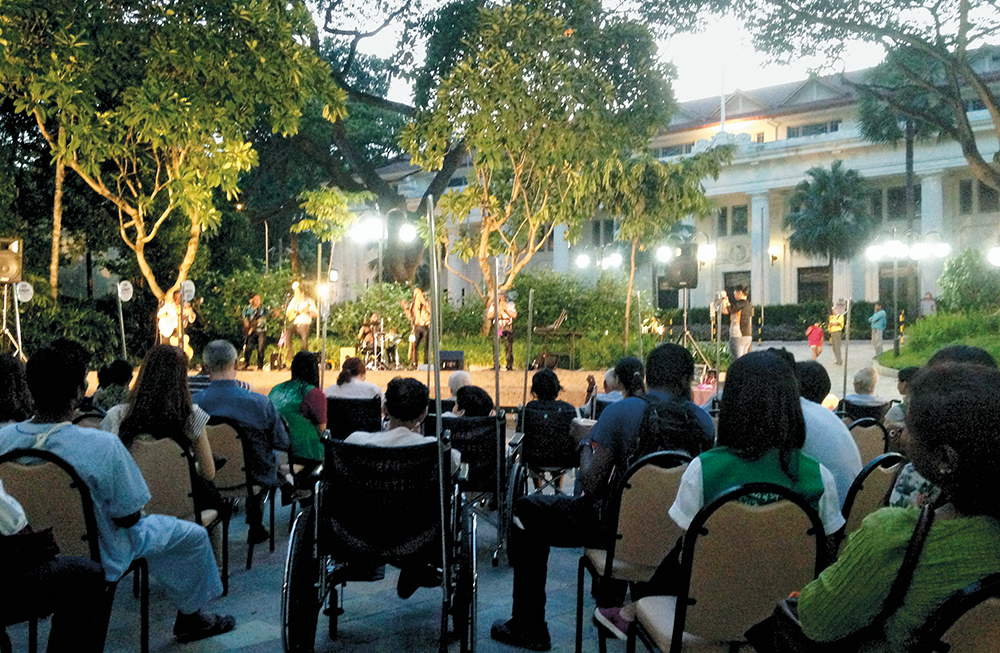
King Edward VII College of Medicine is of special poignancy to me as I was warded at the Singapore General Hospital (SGH) for five weeks after suffering a stroke in June 2014. While being treated there with great care, I pondered each day, that just across the road was the college where my grandfather had studied to be a doctor, and I could channel his presence by my side as I slowly healed. This was where my grandfather had learnt to heal others with a similar affliction, and it is of great meaning and sentiment to me that my hospital of choice till today is SGH.
The College of Medicine Building, located within the grounds of SGH, resembles a classical Greek building, with a colonnade of 12 Doric columns, 11 large sculptured timber doors, and allegorical bas-relief sculptures depicting the teaching and practice of medicine (Teo, 2005 as cited in Tan, 2005). Above the central doorway is a Roman eagle crowned with a wreath, a classical symbol that signifies a civil or official building (Teo, 2005 as cited in Tan, 2005). I am also heartened to know that this hallowed building — which is part of the fabric of my family — has been conserved as a national monument and will always remain just the way it was on the outside, when my grandfather first walked through those doors.
When night fell, the hallowed edifice of Grecian columns opposite my hospital ward lit up, seemingly illuminated as a beacon of hope. One particular evening, there was a Mariachi band from South America which performed in the courtyard facing the Medicine building. As patients in wheelchairs, myself included, were wheeled into the courtyard, the band played to the background of the dramatically-lit College of Medicine. I wistfully recalled that my father loved the pulsating beats and sounds of Latin music. As I sat under the stars, enjoying music that touched his heart — against the backdrop of the medical school that my grandfather had studied in — I could feel the souls of three generations of Oons resonate in that starry, starry night.
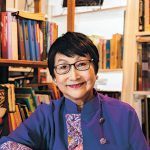 Ms Violet Oon is a food critic, chef-restaurateur, consultant, cookbook author and authority on Peranakan and Singapore cuisine. Ms Oon first made her name as an Arts and Music Critic as well as a food columnist in the 1970s and was dubbed Singapore’s food ambassador by the Singapore Tourism Board in the late 1980s. She co-owns the Violet Oon Singapore group of restaurants. Her proudest moment came in 2019 when she was awarded the Lifetime Achievement for Outstanding Contribution to Tourism by the Singapore Tourism Board. Her life’s work has been to curate, collate and celebrate Singapore cuisine.
Ms Violet Oon is a food critic, chef-restaurateur, consultant, cookbook author and authority on Peranakan and Singapore cuisine. Ms Oon first made her name as an Arts and Music Critic as well as a food columnist in the 1970s and was dubbed Singapore’s food ambassador by the Singapore Tourism Board in the late 1980s. She co-owns the Violet Oon Singapore group of restaurants. Her proudest moment came in 2019 when she was awarded the Lifetime Achievement for Outstanding Contribution to Tourism by the Singapore Tourism Board. Her life’s work has been to curate, collate and celebrate Singapore cuisine.
This article first appeared in The AlumNUS (Issue 129, Apr-Jun 2022).
Open House 2022 Engages and Excites
IN BRIEF | 30 min read
- The ever-popular NUS Open House hit new heights this year, attracting over 8.61 million visitors – a 26.2 per cent increase from the 6.83 million visitors that attended last year's online Open House.
- From 26 Feb to 5 Mar, visitors crowded the websites, livestreams, webinars and social media sessions hosted by the University's colleges, faculties and schools. There was something for everyone, and the event covered everything from academic courses to student life and entrepreneurship programmes.

The ever-popular NUS Open House hit new heights this year, attracting over 8.61 million visitors – a 26.2 per cent increase from the 6.83 million visitors that attended last year's online Open House.
From 26 Feb to 5 Mar, visitors crowded the websites, livestreams, webinars and social media sessions hosted by the University's colleges, faculties and schools. There was something for everyone, and the hybrid event covered everything from academic courses to student life and entrepreneurship programmes.
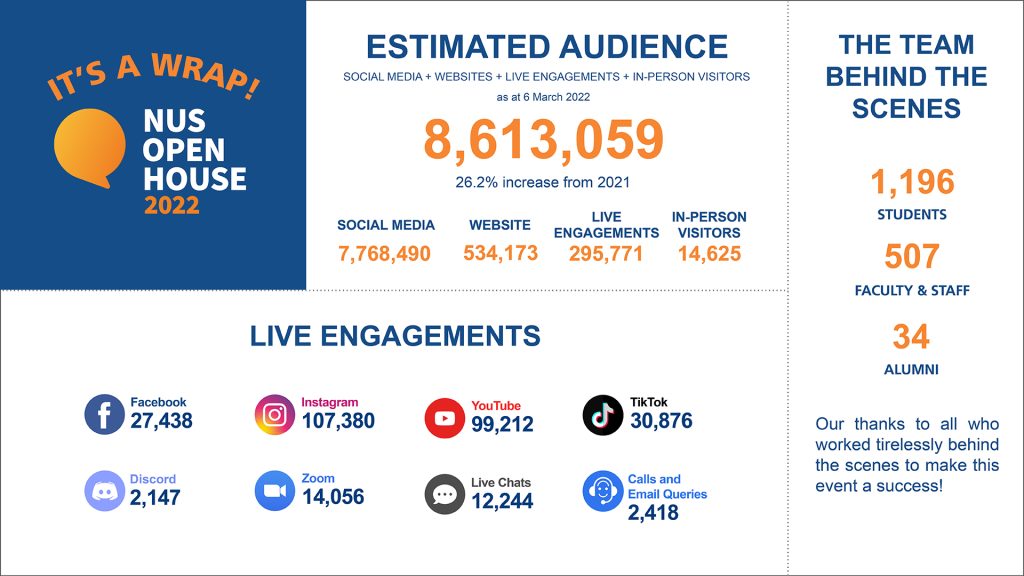
While much of the engagement happened online, prospective students got to meet NUS students and staff face-to-face for the first time since the pandemic started.
The physical Open House, held one sunny Saturday on 5 Mar, included numerous booths showcasing the University’s wide-ranging academic options and vibrant student life; sample classes and talks to get a taste of varsity life; and tours of the different colleges, faculties, and schools.
Prospective students gave the hybrid format a thumbs-up.
Joshua Chua, an alumnus of Anderson Serangoon Junior College, appreciated the online sessions and felt the physical Open House was a huge differentiating factor.
“The (physical) Open House really gave me a good image of what living and studying at NUS could look like by virtue of being an in-person event as opposed to it being virtual, so I'm really grateful to NUS and everyone involved for having this opportunity during the pandemic,” he said.
On her part, Hwa Chong Institution alumna Elsie Woo, who attended both the online and in-person sessions, said, “The experience was really welcoming and wholesome, and really exposed me to NUS as a whole.”
Showcasing the country’s first honours college
One of the highlights this year was the NUS College, Singapore’s first honours college. It will accept its first batch of students this year.
Prospective students were treated to online webinars on the College’s distinctive curriculum, its global pathways, and its focus on hands-on experiential learning. In more intimate breakout rooms, staff and student volunteers readily answered questions about student life and academic pathways. By having a home college or faculty – say Business or Science – while simultaneously being enrolled at NUS College, students will be able to get an educational experience that is as broad as it is deep.
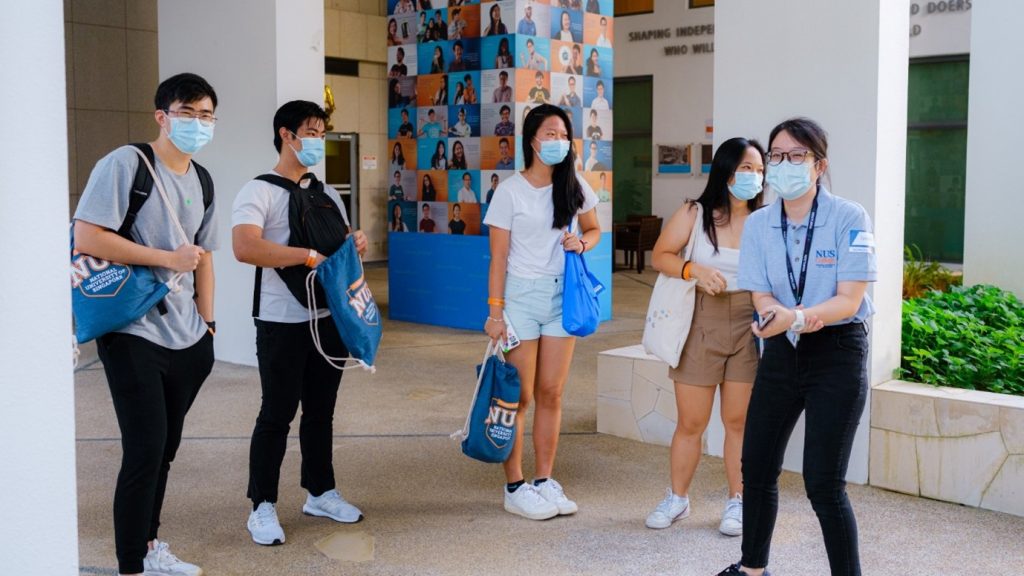
The in-person activities featured a tour of the facilities and residential options that NUS College students would be able to enjoy.
Elsie Woo was one of many students drawn to NUS College’s unique offerings.
“I attended a few webinars, including introductory talks for NUS College and Food Science and Technology,” said Elsie, who also visited many booths in-person.
“The sessions were very well-planned and the seniors were extremely helpful and patient.”
Nanyang Polytechnic alumnus Koh Jin Yuen focused his time on NUS College, attending the College’s guided tour and virtual sharing sessions.
“The NUS College tour was informative as I got to ask the facilitators about their experiences. I think the curriculum is very meaningful,” said Jin Yuen.
“The Open House helped to deepen my understanding of how NUS College works, and allowed me to better understand the lifestyle of a student from NUS College.” He is intending to apply for the Information Systems programme offered by NUS Computing, as well as NUS College.
Ramping up interdisciplinary offerings
Exciting developments in the realm of interdisciplinary education—a major theme that NUS has been championing—were foregrounded at the Open House, with the College of Design and Engineering (CDE) also taking in its inaugural cohort. A result of the merger of the Faculty of Engineering and the School of Design and Environment, CDE is set to transform the NUS educational experience.
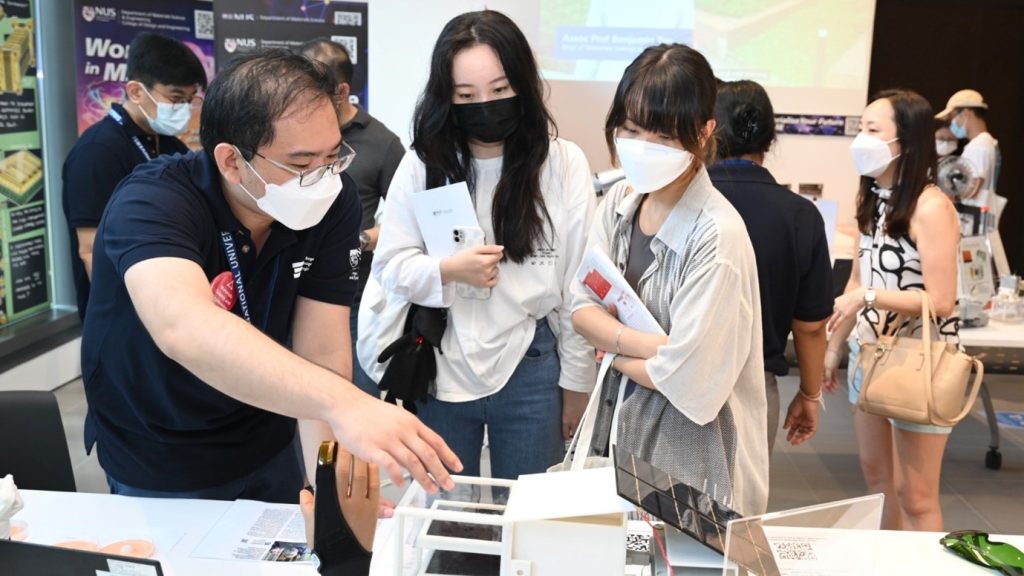
Across five galleries and 19 sub-categories, including Architecture, Industrial Design, Materials Science and Engineering, Biomedical Engineering, and Civil Engineering, visitors were presented with an informative display of the wide range of courses and programmes that will be on offer in the new College.
Raffles Institution alumna Grace Zai, who visited the Designing the Future exhibition and galleries, said, “The Engineering galleries were very informative as I could ask questions I had about the course, as well as student life, and get a clearer picture of what I would be studying and doing. It helped me make a more informed decision on my choices.”
Grace is considering applying to Engineering Science and Architecture, as well as Mechanical Engineering and Electrical Engineering with a specialisation in robotics.
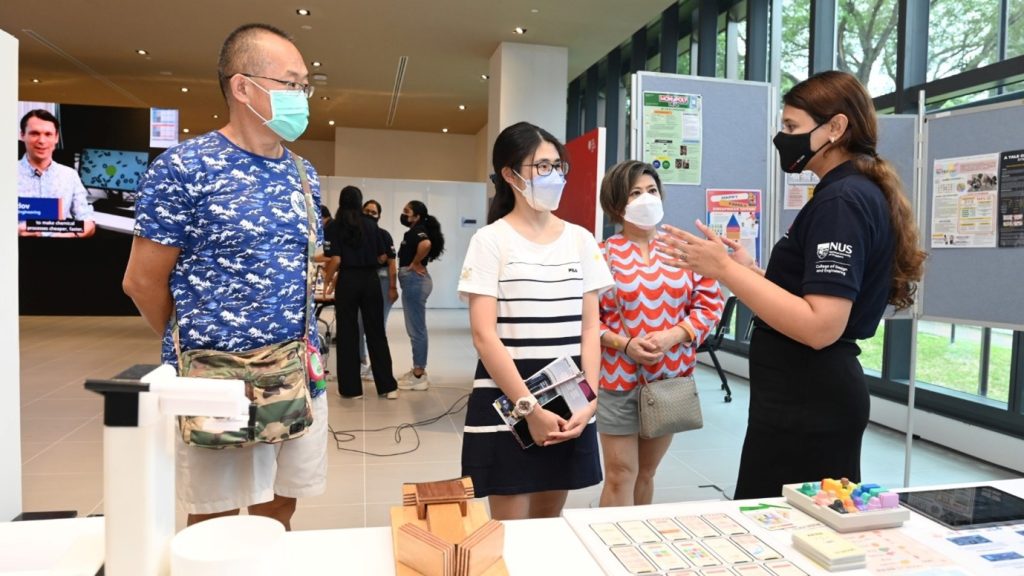
There were also panel discussions, both online and in-person, where faculty and current students interacted with prospective students to share their experiences and answer questions about the new interdisciplinary curriculum.
“As a prospective student, I got to see first-hand the school facilities, as well as the accommodations. My experience was pretty enriching and enlightening because I could ask the professors questions I had in mind and learn more about the courses,” said Timothy Tay, a graduate of Victoria Junior College who visited the SDE gallery on Sustainable Innovations.
“For example, I did not realise Project Facilities Management (PFM) was recently changed to Infrastructure Project Management (IPM). The professor explained that students will now graduate with a BEng degree rather than a BSc degree,” he recalled, referring to the first interdisciplinary full-time undergraduate programme to cover engineering, design, management, technology, building science and law courses.
Information was also available on the vibrant student life of the College’s various clubs and societies, as well as career programmes that enable students to better understand their interests and what it takes to marry that with industry skills and experience.
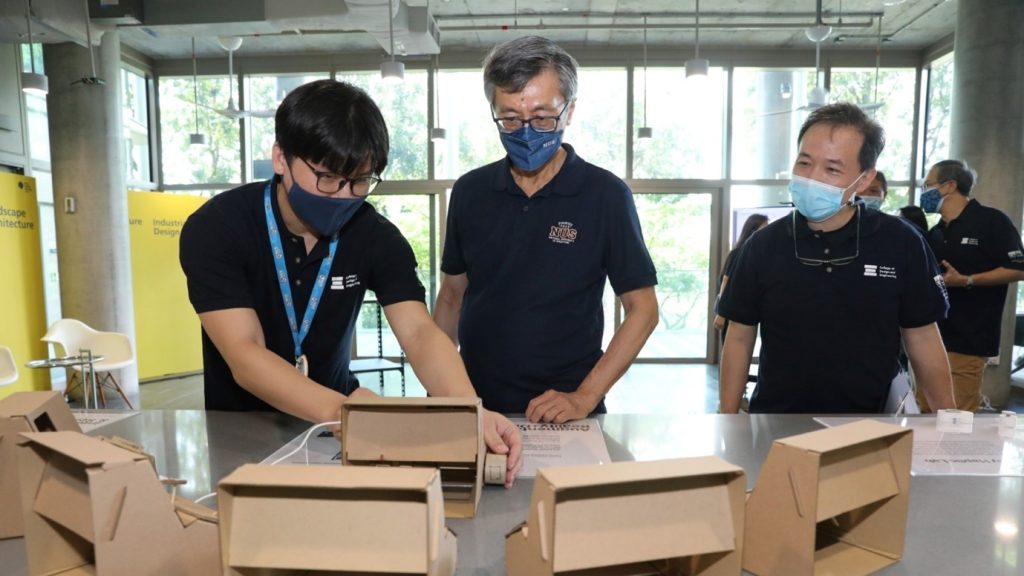
“The NUS Open House provided me with a more informed perspective on the courses offered in NUS. The various booths set up and run by students allowed for quick chats about what the courses have to offer. The responses by the students and professors were engaging and genuine, which I found informative in making my choice for courses in NUS,” said Kalepu Sai Sri Akshath, who attended CDE’s online and in-person events with his family and is intending to apply to Computer Engineering.
Drone-sensing demonstrations and the Solar Roof Tour, 5G Lab Tour, and BEEHUB Tour further showcased the College’s manifold facilities. Visitors also got a first-hand experience of NUS’ very own net-zero energy building through tours at SDE4, itself a product of both architecture and engineering, and the first of its kind in Singapore.
A marriage of the humanities and sciences
Continuing in the vein of interdisciplinarity and equipping students with a multifaceted, integrated toolbox of skills to thrive in the future economy is the College of Humanities and Sciences (CHS), which will be accepting its second intake this year.
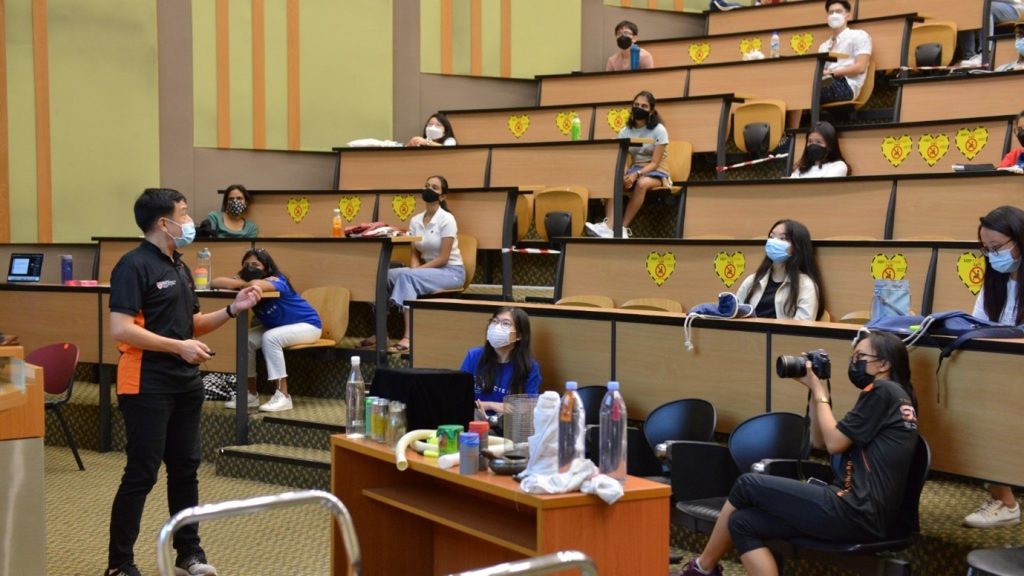
Seminars about the CHS Core Curriculum were available at the Open House, as well as informative masterclasses that covered a vast range of interdisciplinary topics.
The Data Science and Economics masterclass saw Assoc Prof Lim Tiong Wee and Assoc Prof Chen Ying (Statistics & Data Science, Faculty of Science) and Dr Denis Tkachenko (Faculty of Arts and Social Sciences) break down the complexities of the digital economy with real-life examples, and explicate its relevance to Singapore’s Smart Nation goals.
The new Data Science and Economics (DSE) cross-disciplinary programme will be the first of its kind in Singapore to integrate knowledge across these two disciplines.
“I got to understand how data science and economics complement each other,” said Russell Hor, a graduate of St. Joseph's Institution who has finished National Service and is enrolling in CHS this year.
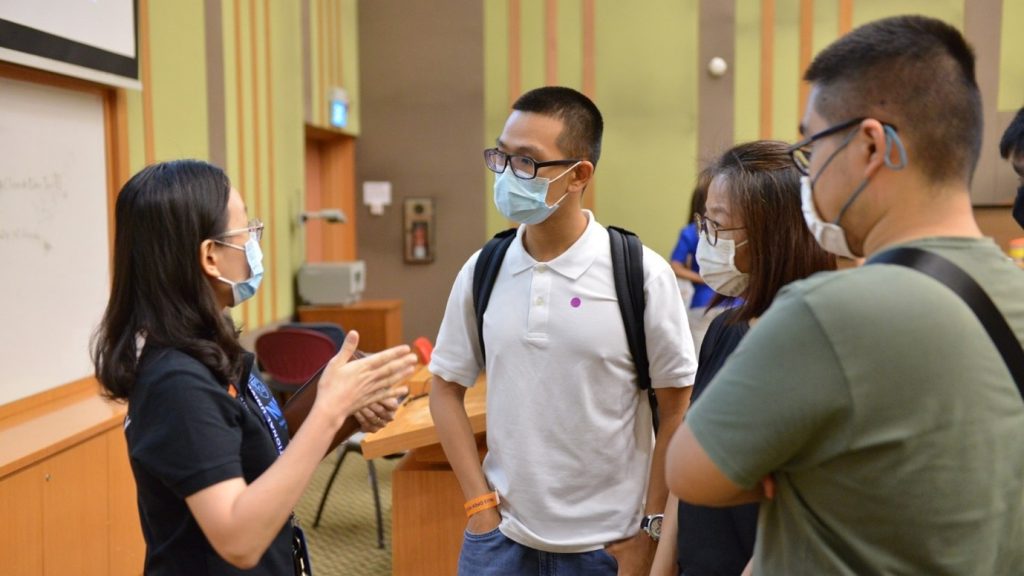
Vanille Goh, who graduated from Anglo-Chinese Junior College and attended the Geography and Environmental Studies masterclasses, said, “[The masterclasses] provided me with a good overview of how passionate the lecturers were and how each course will adequately prepare me for what I would want to do in the future.”
Nanyang Junior College alumna Wen Xinyue also appreciated the in-person masterclasses, adding that they gave her a first-hand glimpse into studying humanities at the university level.
“I am interested in studying English, and from the English Language and Literature masterclass on Gender, Sexuality and Language, I learnt about how entrenched gender roles and stereotypes can be within the language we use,” she shared.
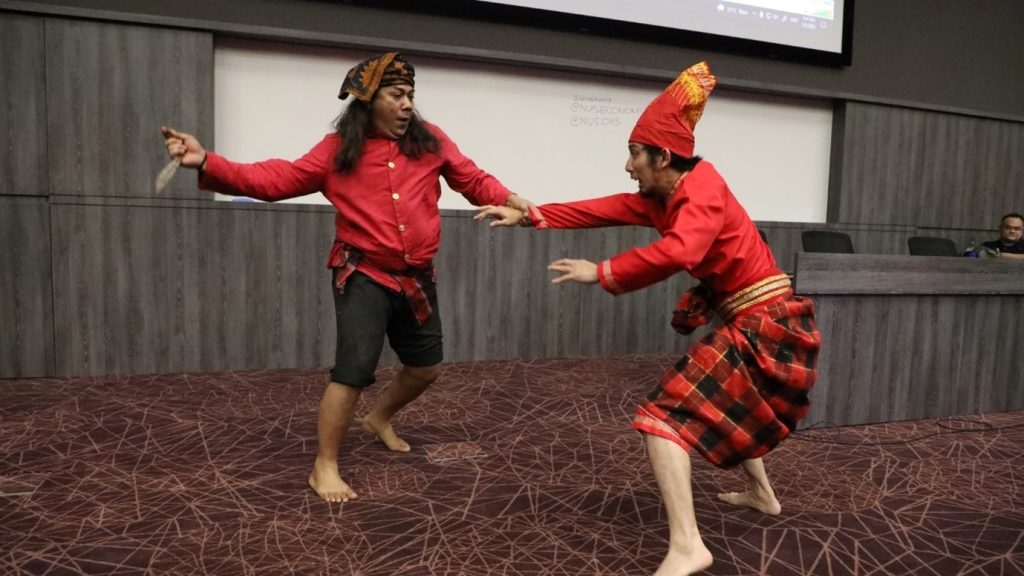
Meanwhile, over at the “Insights into Southeast Asia from the Martial Arts Perspective” masterclass, Dr Mohamed Effendy of NUS Southeast Asian Studies presented prospective students with a riveting intellectual and visual treat, demonstrating how useful unique perspectives on the region’s myriad communities can be gleaned by studying them through the lens of the martial arts. Students saw the concepts brought to life – witnessing first-hand an exciting live demonstration by practitioners of pencak silat – of how Southeast Asian warriors of old defended themselves using a wide array of techniques and weapons.
Action aplenty
There was action aplenty among other faculties. NUS Business School’s programmes included a 360 live tour, as well as live chats with the BBA Deans on the different majors offered by the School. Its in-person sessions included sharing sessions by the BBA Deans, BIZCareers advisors, and student ambassadors.
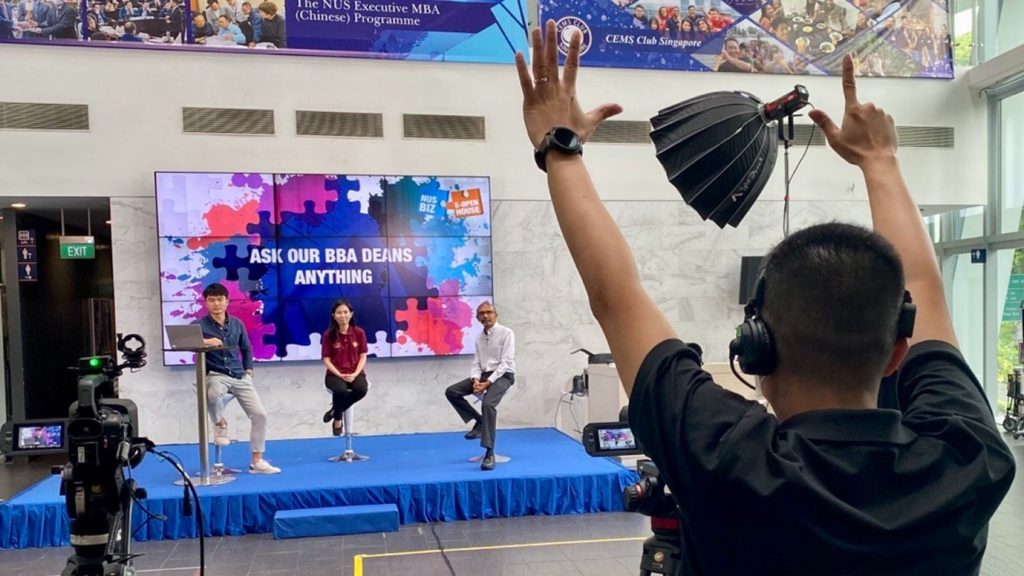
Year 4 Accountancy and Finance undergraduate Calvin Chur was one such student volunteer, serving as an emcee for the online Open House and sharing in-person on 5 Mar about life at the Business School.
“It was a tiring, but extremely fulfilling day engaging with prospective students, learning about their concerns with regards to entering a new phase of life and trying to address those concerns,” said Calvin. “In fact, many of their concerns mirrored those that I had as a fresh A-level graduate attending the NUS Open House back in 2016 – and I am glad that I could offer insider insights to help them make an informed decision at this major milestone of their lives.”
Year 4 Real Estate undergraduate Natasha Liem, another student volunteer who served as an emcee, added, “There was quite a large number of viewers for the panel and a prospective student actually sent me a message on Instagram to enquire more about real estate from a student's perspective. I think the panel went well!”

For NUS Business School Executive (Marketing & Outreach) Ms Casey Jean Grant, it was an eye-opener to experience the whole planning process.
“Most of the students and parents were very curious and excited about the prospect of coming to NUS Business School,” she added. “Their excitement definitely rubbed off on us and made the rest of us excited to share about our School.”
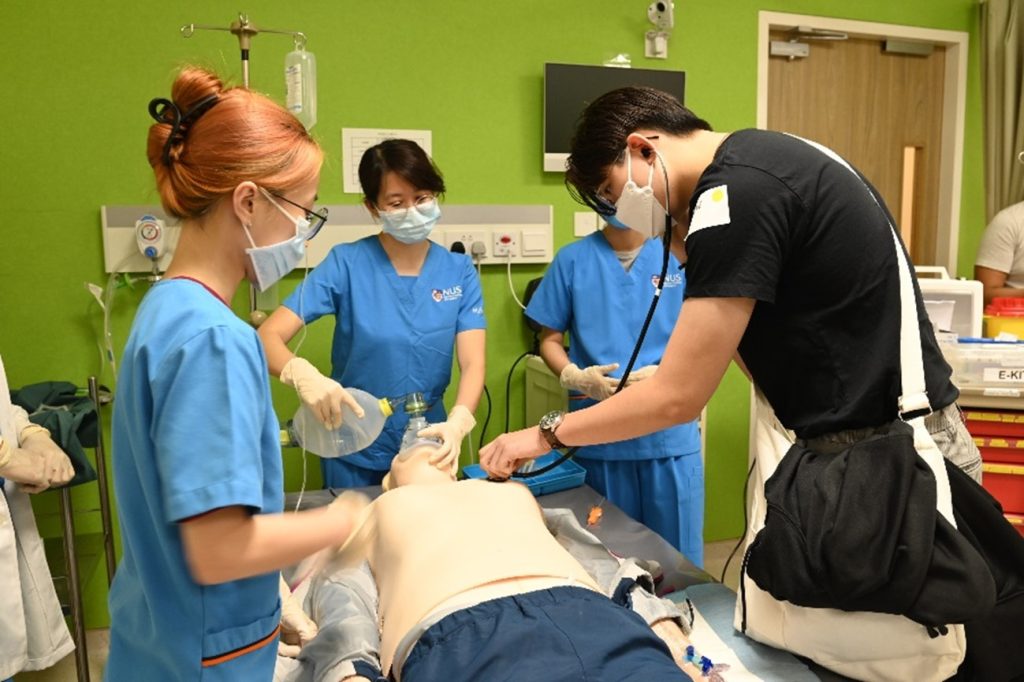
With frontline healthcare workers being in the spotlight these couple of years, there was plenty of interest in NUS Dentistry, NUS Nursing, NUS Medicine, and Duke-NUS Medical School. Live demonstrations were conducted and prospective students got a taste of what it would be like to be a dentist, nurse or doctor.
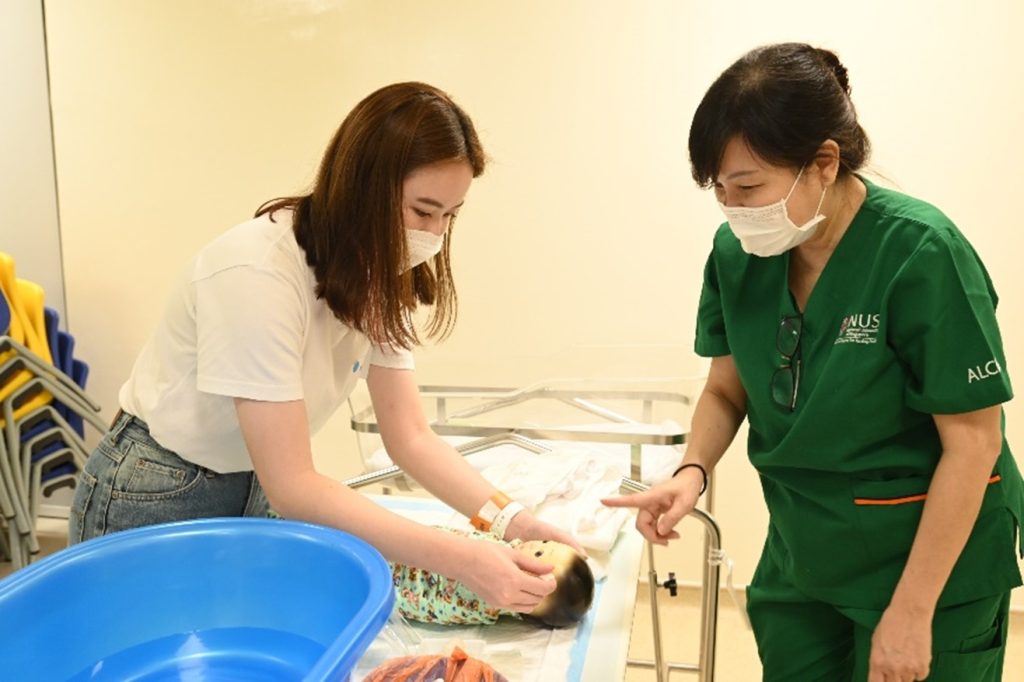
Serving up a slice of campus life
Whether on the screen or in the flesh, visitors to the Open House also witnessed the rich and vibrant student life beyond the classroom that NUS is known for.
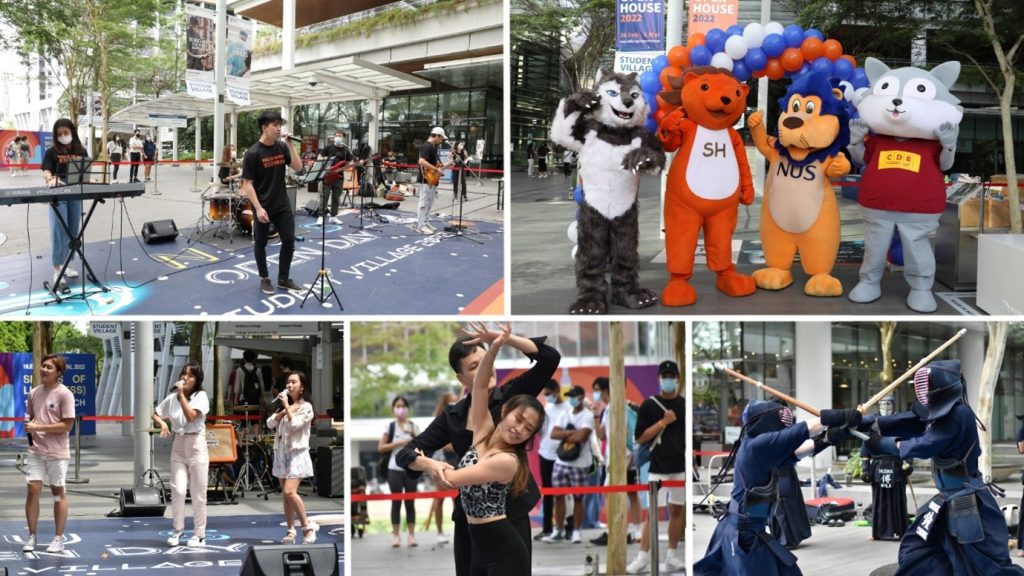
Besides holding talks to acquaint visitors with the wide range of co-curricular activities available, student clubs and societies rose to the occasion at the Student Village showcases to feature a spectacular smorgasbord of music, dance and sporting performance across the eight days that Open House was on. Visitors were serenaded by soulful tunes by the NUS Jazz Band and wowed by the moves of NUS Kendo Club. They were also treated to cheerleading displays, snazzy dance performances by NUS Funkstyle and BreakiNUS, catchy renditions of contemporary pop and choral music by the a cappella group Resonance, and the dulcet tones of TheNUSChoir and the NUS Mandopop group Voices.
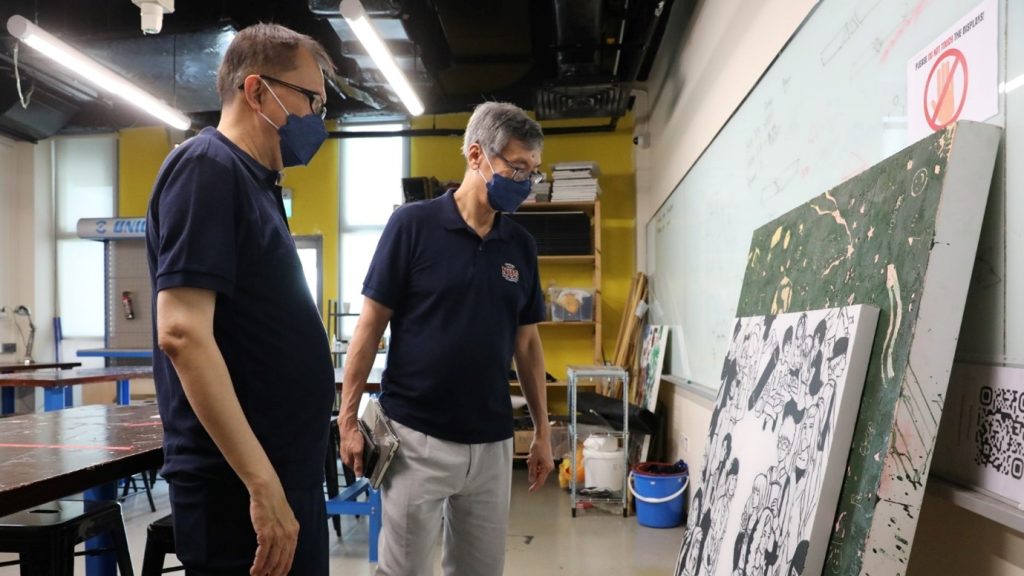
"It was really lively with dozens of booths as well as live performances put on by really talented students! It truly allowed me to understand the culture here and makes me want to be a part of it after experiencing first hand,” Vanille Goh shared.
Students and hall masters from the halls and residences also conducted informative residential life talks, A-Day-in-the-Life-Of vlog sessions and Ask-Me-Anything sessions to help students interested in on-campus living understand its manifold aspects like academic programmes and pastoral care.
These were complemented by in-person tours of King Edward VII Hall, NUS College, Ridge View Residential College, Tembusu College, RC4, and Pioneer House, NUS’ newest housing model, giving participants a real taste of the sense of community and camaraderie that comes with residential life in NUS.
Joshua Chua, who also participated in the RC4 tour, said, “The RC4 tour was definitely a highlight because the tour guide, as with most staff and students, was welcoming and frank, which eased my nervousness.”
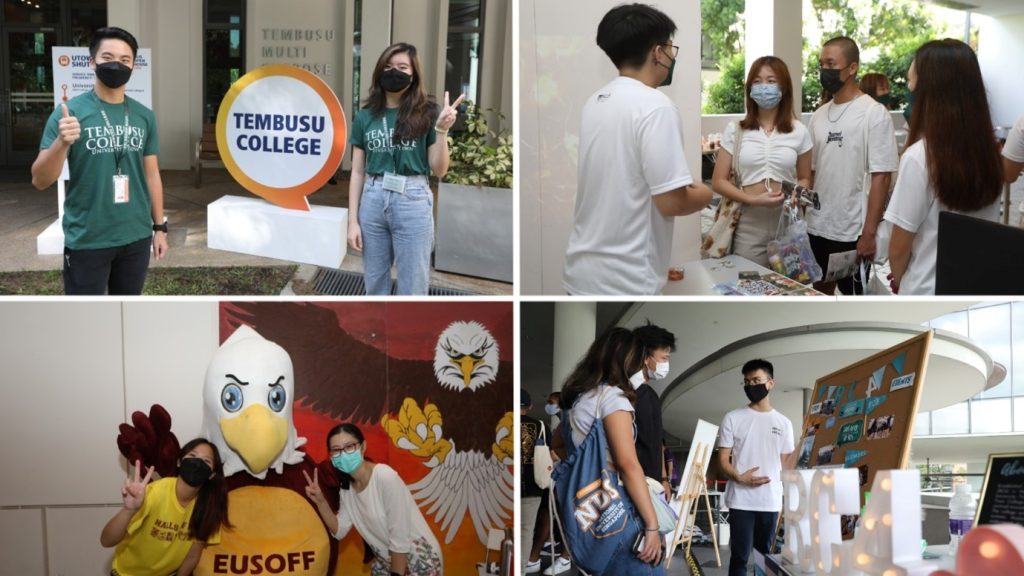
Matthew Yeow, an alumnus of Anglo-Chinese School (Independent) who attended both online and in-person sharing sessions by student residents of the Residential Colleges, said, “During the physical Open House, I had the opportunity to find out a lot more about the residential colleges and what made them distinct from halls. Furthermore, I also got to find out more about the individual residential colleges and their communities, as well as the additional courses they took.”
“As a prospective student, I think the Open House was executed effectively through both the online and physical mediums. Having the opportunity to come down and visit the University and talk to the current students gave me a better understanding of student life in NUS,” he added.
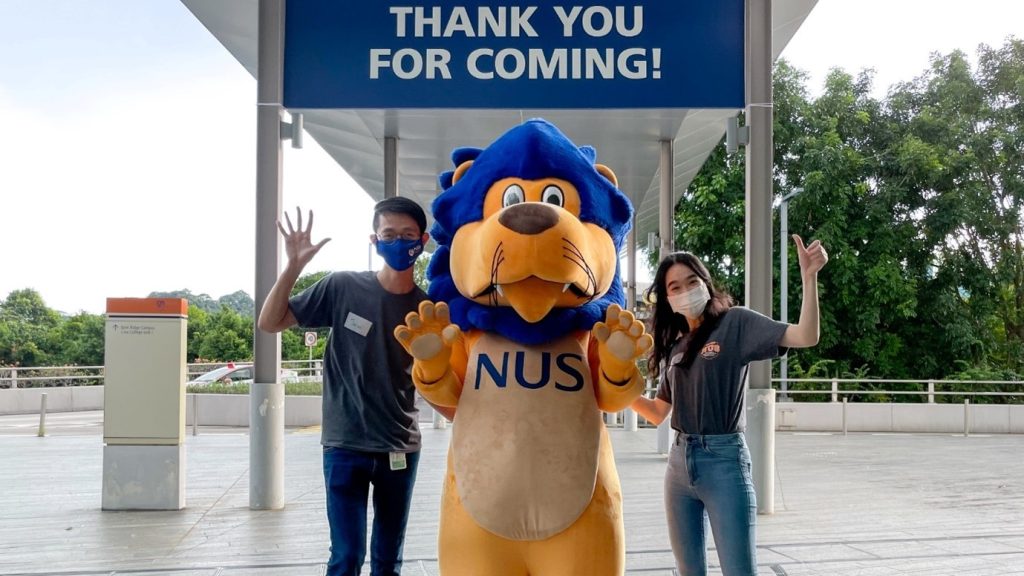
This story first appeared on NUSNews on 8 March 2022.
New Courses for the New Economy
IN BRIEF | 5 min read
- NUS is offering a number of new programmes to prepare graduates for the future, including the much-anticipated Major in Anthropology, and Minor in Interpreting by the NUS Department of Chinese Studies.
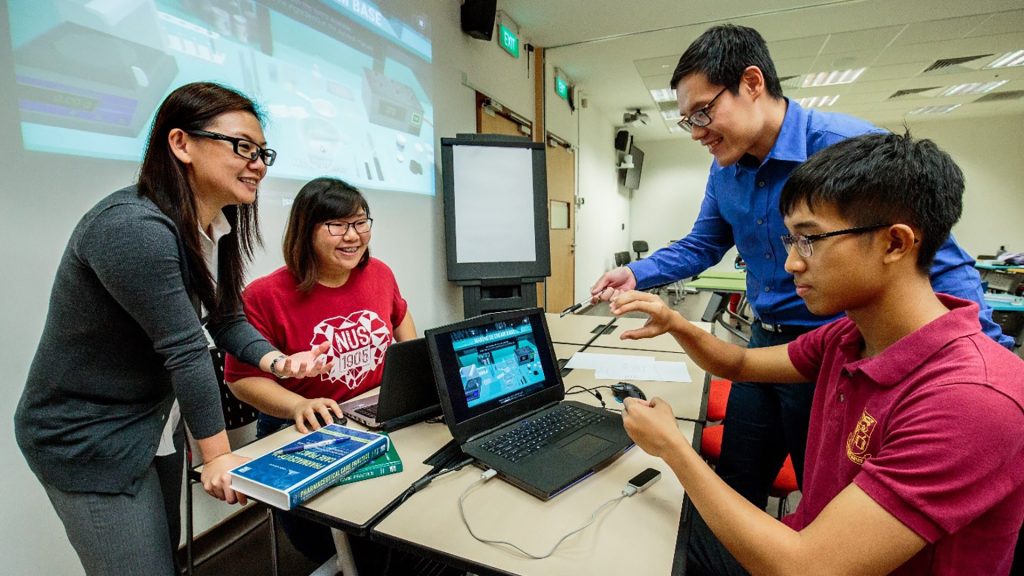
The University’s key theme of preparing undergraduates for the workplace of the future will be further enhanced with the launch of new majors, minors and degree specialisations in the upcoming academic year. About 10 new courses are on the cards.
New programmes from the NUS College of Design and Engineering (CDE), NUS Faculty of Science, NUS School of Computing, and NUS Faculty of Arts and Social Sciences will cover areas such as Artificial Intelligence, technology, data science, sustainability, globalisation. They will add on to the interdisciplinary offerings by the flagship NUS College, Singapore’s first honours college welcoming its first cohort in August – as well as those by the College of Humanities and Sciences (CHS).
“The overall goal of all our education reform efforts is to advance a university curriculum that prepares students well for a Fourth Industrial Revolution world and workplace,” said Professor Bernard Tan, NUS Senior Vice Provost (Undergraduate Education).
“Our education, focused on both breadth and depth, ensures that our graduates are held in high regard by employers. Last year, more than nine in 10 NUS graduates secured a job within six months of their final examinations.”
New majors and minors
Bachelor of Engineering (Infrastructure and Project Management)Offered by CDE’s Department of the Built Environment, this degree will equip graduates with the knowledge and interdisciplinary skills to excel in the multifaceted built environment. This is the first interdisciplinary full-time undergraduate programme to cover engineering, design, management, technology, building science and law courses. Major in Anthropology
Offered by the NUS Faculty of Arts and Social Sciences to all CHS students, this major will study the range of human diversity, accounting for how people in different times and places have developed into distinctly different societies. The degree will expose students to a vast variety of different beliefs and health practices, economic and political systems, material culture, and even different notions of beauty, the environment, food, family, and the good life.
Anthropology is much sought after for the sort of training it offers its students – a ground up approach to developing deep understanding on just about every aspect of the human condition. Students will be equipped to better understand and deal with the chaos, uncertainty, and ambiguity that characterises the contemporary age.
Second Major in Sustainable Urban DevelopmentOffered by CDE’s Department of Civil and Environmental Engineering, it aims to train the next generation of urban problem-solvers. They will be equipped with interdisciplinary knowledge and skills to create sustainable urban environments in the context of the changing climate. Open to all NUS undergraduate students, this major is stackable to students’ primary major in their chosen field, and can be completed in four years with no additional academic workload. Second Major in Nutrition
This will be offered by the Faculty of Science to all CHS students, including those reading Food Science and Technology as the primary major. It is designed to equip students with knowledge in human nutrition, providing them with the necessary foundation to develop a cross-disciplinary perspective along the food supply chain – from farm to fork to health. Minor in Interpreting
Multilingualism is a defining characteristic of Singapore’s multi-ethnic, immigrant society. With four official languages and with English as the working language, translating and interpreting between each of the mother tongues and English has always been a prominent feature of Singapore society. Against this backdrop, the NUS Department of Chinese Studies has placed as one of its core objectives, the training of graduates with strong Chinese-English bilingual skills who can become leaders in the translation and interpreting arenas.
This new Minor will allow students a related alternative to translation, or as an affiliated Minor to Translation which is already being offered at the Department.
New specialisations
Three new specialisations will be offered by the NUS School of Computing:
Specialisation in Digital Product and Platform ManagementThis will be offered to students pursuing the Bachelor of Computing (Information Systems) Degree. They will build up a repertoire of knowledge and skills sought after by both technology companies and the digital immigrant companies that are fast adopting the product- and platform-centric technology and business operating models. Specialisation in Intelligent Systems Solutioning
Students pursuing the Bachelor of Computing (Information Systems) Degree can also take this new specialisation to learn to implement and apply intelligent system solutions buttressed by the new technologies of Artificial Intelligence, the Internet of Things, and Augmented Reality. They will learn to apply these new technologies in software engineering, and to implement and manage intelligent system solutions. Graduates will be able to take on job roles in intelligent systems engineering and solutioning. Specialisation in Machine Learning-based Analytics
This new specialisation for Bachelor of Science (Business Analytics) students will enable students to tap into the analytics capabilities of Machine Learning, a sub-field of Artificial Intelligence. They will learn to rapidly and automatically develop models that can quickly and accurately analyse massive, complex data sets, in order to help businesses unlock the value of corporate and customer data and enact decisions that keep them ahead of the competition. Graduates will be able to take on careers in the rapidly-growing business and data analytics field, among others.
New courses
Aside from the new majors, minors and specialisations, a number of new courses are being offered. For instance, the NUS School of Computing is starting a Digital Ethics and Data Privacy course to educate students on this pertinent and pressing issue.
The NUS Faculty of Law is introducing two courses – one on Law & Technology and one on Data Literacy – as technology and data are increasingly being key drivers for the legal industry.
Find out more about the courses offered by the University, and explore this year’s Open House. Here are four things to look out for at the Open House.
This story first appeared on NUSNews on 24 February 2022.
NUS Open House 2022: Interdisciplinary Offerings, In-person Activities and More!
IN BRIEF | 5 min read
- NUS Open House 2022 is back with opportunities for prospective students to meet NUS professors, students and alumni face-to-face, after two years of connecting virtually.
- Running from 26 February through 5 March, NUS Open House 2022 will begin with a comprehensive line-up of informative activities, including the online segment, during the week leading up to the physical Open House, which takes place on Saturday, 5 March from 9 am to 7 pm across NUS’ campuses in Kent Ridge and Bukit Timah.

NUS Open House 2022 is back with opportunities for prospective students to meet NUS professors, students and alumni face-to-face, after two years of connecting virtually.
The physical event will take place on Sat, 5 Mar from 9am to 7pm across NUS’ campuses in Kent Ridge and Bukit Timah. This will be preceded by a comprehensive line-up of informative activities during the week leading up to the physical Open House.
Including the online segment, NUS Open House 2022 takes place from 26 Feb to 5 Mar. Here’s a heads-up on four things to check out:
1. Exciting interdisciplinary offerings
NUS College, Singapore’s first honours college, was formed by the merger of the University Scholars Programme and Yale-NUS College. Offering an immersive, experiential and interdisciplinary educational journey, it will welcome its first batch of students this year. Students will have a home college or faculty, say, Business or Engineering, while simultaneously being enrolled at NUS College. There, they will have the opportunity to enjoy a holistic interdisciplinary curriculum that is complementary to their major.
Another option for interdisciplinary learning can be found at NUS College of Design and Engineering. The College offers a programme that prepares students for the future through interdisciplinary learning and robust research in the fields of engineering and design. At the College, students are given the flexibility to build and design their own learning experience.
The NUS College of Humanities and Sciences, the enhanced undergraduate experience for students of the Faculty of Arts & Social Sciences and the Faculty of Science, is accepting its second intake this year. The College offers 13 Common Curriculum pillars consisting of courses such as scientific inquiry, humanities, digital literacy, design thinking, artificial intelligence and many more exciting options. These are complemented by majors and minors spanning the arts, humanities and sciences, such as global studies, philosophy, theatre and performance studies, quantitative finance, data analytics and pharmaceutical science. Students can pick and choose courses to create a customised curriculum that matches their interest and aspirations.
To ensure that graduates are ready to take on leading roles in the New Economy, NUS constantly develops new courses. Here are this year's new offerings.

2. Meeting you in person - again
After two years of meeting virtually, the NUS community is excited to get together in real life with prospective students once again!
You can look forward to an enlightening schedule of in-person activities including a tour of the Centre for Healthcare Simulation by NUS Nursing; tours of residential living options such as Tembusu College, CAPT (College of Alice & Peter Tan), and RC4; a live demonstration of a moot court session and tour of the NUS Bukit Timah campus by NUS Law; tours and a showcase of NUS College; as well as a live question-and-answer session with Duke-NUS Medical School.
3. Webinars, talks, live chats, hotlines and more
Get a taste of life as an NUS student, even before the physical event. A host of insightful webinars, talks, question-and-answer sessions, live chats, hotlines, and virtual tours have been arranged starting 26 Feb to give you a head start on topics such as admissions, student life, and on-campus living, as well as programmes offered by NUS College, the College of Design and Engineering, the College of Humanities and Sciences, Business, Music and many more.
Obtain behind-the-scenes knowledge from NUS student ambassadors and the NUS Students’ Union on the rich student life available at NUS, and be serenaded by NUS Choir and NUS Jazz Band.
Professors will be on hand to share information on their respective programmes, and you’ll even have a chance to sit in on classes. Have a question that is not covered by the briefing? No sweat! There’ll be chat sessions with NUS Admissions, professors and students from selected programmes during which you can get your queries addressed.
Click here for the list of virtual and in-person activities for NUS Open House.

4. Exciting student life
NUS offers a myriad options for a rich student life, and NUS Open House is the perfect place to start exploring the possibilities. Many alumni recall their NUS days fondly, remembering not only the academic progress they made, but the camaraderie forged with friends from clubs, societies and on-campus residences.
Throughout the period of the online Open House and during the physical event, representatives from various student-led groups will speak on topics including hall life, clubs and societies, as well as campus performing groups. Take part in a live session with music and dance groups, embark on a virtual residential tour, and more.
We’re looking forward to seeing you online from 26 Feb and in-person on 5 Mar!
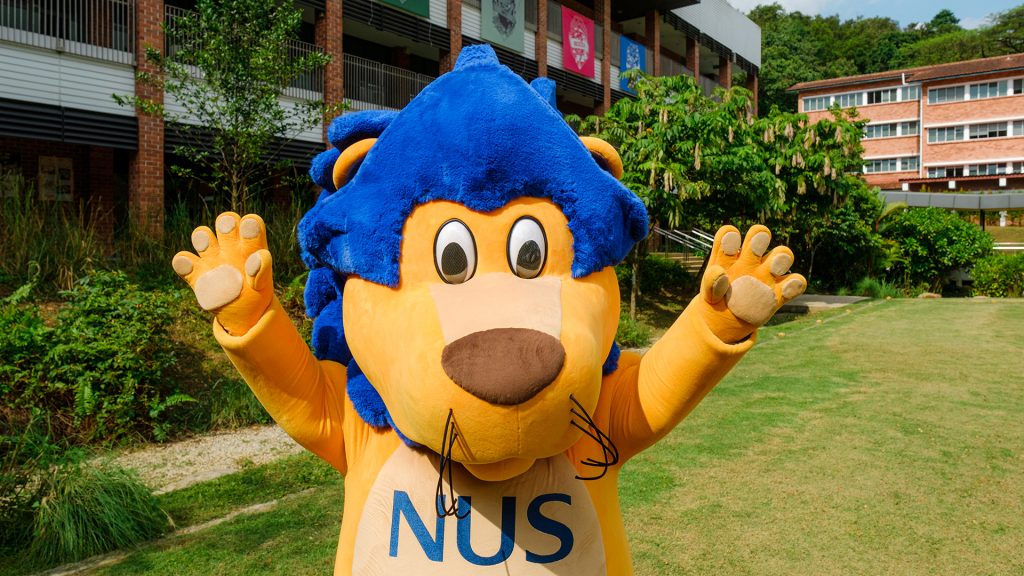
This story first appeared on NUSNews on 23 February 2022.
FASS Inspiring Mentor 2021 Award Winners Announced

The NUS Faculty of Arts and Social Sciences is proud to announce the winners of the 2021 FASS Inspiring Mentor Awards.
Congratulations to:
- Prof Jack Qiu Linchuan, Professor, Department of Communications and New Media
- Assoc Prof Loy Hui Chieh, Associate Professor, Department of Philosophy
- Assoc Prof Robin Loon Seong Yun, Associate Professor, Department of English Language and Literature
- Dr Michael Yoshitaka Erlewine, Assistant Professor, Department of English Language and Literature
- Dr Nina Laurel Powell, Senior Lecturer, Department of Psychology
The e-STEER Programme: A Passage to Sub-Saharan Africa
IN BRIEF | 4 min read
- Thanks to technology, in-depth experiences of faraway places are still possible despite COVID-19 slowing down international travel — as some 80 NUS students found out as participants of the latest, 'virtual', iteration of the NUS Study Trips for Engagement and EnRichment (STEER) programme travelled to Africa.

Thanks to technology, in-depth experiences of faraway places are still possible despite COVID-19 slowing down international travel – as some 80 NUS students found out. Participants of the latest iteration of the NUS Study Trips for Engagement and EnRichment (STEER) programme travelled to Africa, howbeit virtually.
STEER programmes are designed to familiarise students with the diverse socio-cultural-political-economic-business environments of fast-evolving region. Over the past decade, the NUS Global Relations Office (GRO) has organised a myriad of such programmes to countries and regions that are either undergoing institutional transformation, experiencing catch-up growth or have strengthened bilateral ties with Singapore and in the process, enhancing overseas career opportunities for our undergraduates.
However, with the onset of the pandemic, the STEER programme pivoted to a virtual environment, expanding its reach through a series of webinars and virtual lectures, e-networking sessions and vicarious cultural visits.
Held from 6 to 16 Dec 2021, the e-STEER programme focused on Sub-Saharan Africa, which includes countries such as Botswana, Ghana, Kenya, Nigeria, Rwanda and South Africa. The two-week programme engaged students with invaluable insights into the political history, economic and social development, management of natural resources, as well as the rich heritage and cultures of the region.
His Excellency Jean de Dieu Uwihanganye, High Commissioner of the Republic of Rwanda to Singapore, delivered an introduction to Rwanda, that gave the students a first look into this “land of a thousand hills”, rich in natural resources and biodiversity, which is also the most densely populated mainland African country.

Colonialism and slave trade are topics which are inevitable in the discussion of history and development of Africa, and students were deeply immersed in several lectures which enlightened them on the history of the slave trade, and its effects on African society and practices to this day. Professor Brian Farrell from the NUS Department of History presented an in-depth lesson on Africa, British Africa and the British Empire.
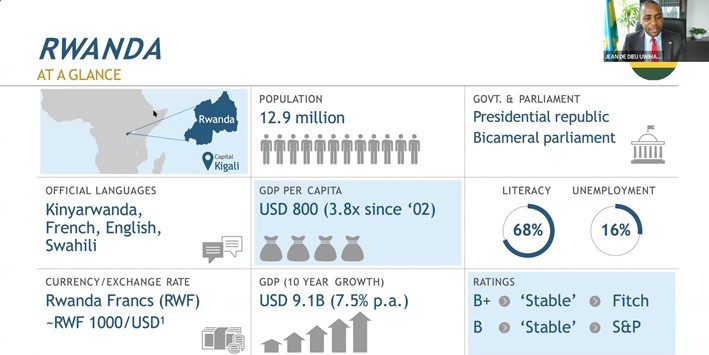
Dr Dorothy Takyiakwaa from the University of Cape Coast facilitated an enlightening lecture on the slave trade and slave castles. Her lecture was immediately followed by a virtual tour of the Cape Coast Castle, one of 40 slave castles built in West Africa used to hold slaves before they were loaded onto ships and sold in the Americas. Through the use of virtual reality (VR) headsets, students were able to view the dungeons at Cape Coast Castle, which were often the slaves’ last residence and final memory of Africa before leaving the continent through the ‘Door of No Return’.
Our students were enthused about the VR headsets used for the first-time in the e-STEER programme. Said Oh Jun Ning, Year 4, NUS Science student, “The sounds and sights were realistic, and it felt like we were exploring the place itself with a tour guide. Given that the entire programme was conducted online, the virtual tour was definitely a change of pace and scenery. It would be great if VR was to be integrated into future online programmes especially in the face of current COVID-19 restrictions.”
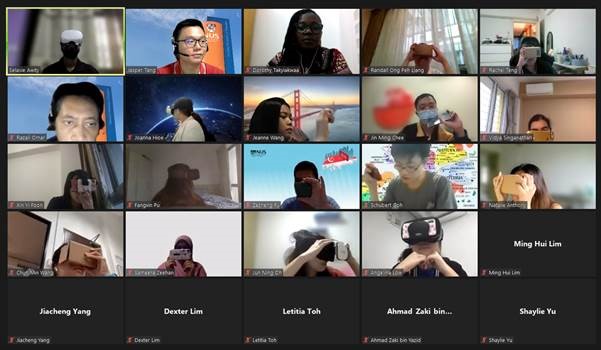
Norsheena Riyana, a Year 1 student from the NUS Department of Political Science, described the lectures on this topic as “different and personal”, as she “spoke with individuals whose ancestors were personally affected by the atrocities committed during colonisation, the transatlantic slave trade, and the 1994 Rwandan Genocide, instead of reading these accounts through academic articles and social media”. She also highlighted the virtual tour of the Cape Coast Castle as one of the sessions that she was most interested in, as “it was the closest experience to being physically there”.

A number of students among the participants this year had a keen interest in conservation and ecology, and the e-lectures delivered by representatives from the University of Rwanda and Rwanda Development Board further piqued their interest by delineating the broad considerations behind wildlife conservation in Rwanda, particularly on the population of endangered mountain gorillas which reside in Rwanda’s national parks.
The eye-opening sessions explained more on the costs and considerations behind biodiversity management in these precious land areas, and efforts to include and give back to the surrounding communities whose livelihoods are directly influenced by wildlife efforts and ecotourism to the national parks.
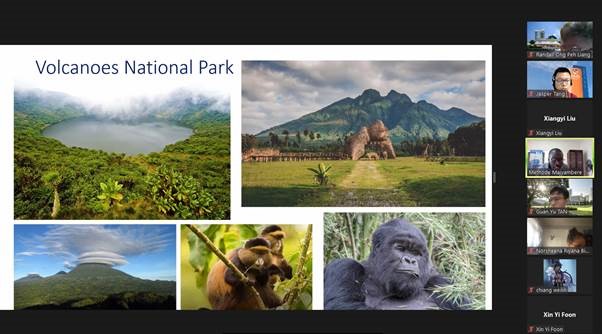
Joanna Hioe, a PhD Year 1 student from the NUS Department of Southeast Asian Studies, said, "The e-STEER Sub-Saharan Africa programme gave us the unique opportunity to survey the continent, with a panoramic view of its history, culture, economy, and geography, and literally savour it, with an audio-visual feast of its music and fashion, and tastes of its food. It was a rich buffet that left students of all majors spoiled for choice.
“The thoughtfully curated e-STEER programme opened my eyes to the plethora of ways that deep, meaningful inter-cultural and transformative encounters can still be facilitated through technology.”
Building FriendshipsThe NUS student participants also met and built friendships with peers from Zetech University (Kenya) and the University of Rwanda, through two networking sessions organised for cross-cultural sharing of Singapore and Kenyan/Rwanda cultures and way of life. Schubert Goh, Year 3 student from NUS Computing, also delivered a presentation that shared with the Kenyan and Rwandan students on Youth Culture in Singapore.

On the last two evenings of the programme, students tucked into a delectable meal set from Kafe Utu, an African café and lounge in Singapore, named for the Kiswahili word for “humanity”. Though dining individually at home, it was an experience shared virtually, in appreciation of a varied African cuisine and learning about the history and culture behind the menu.
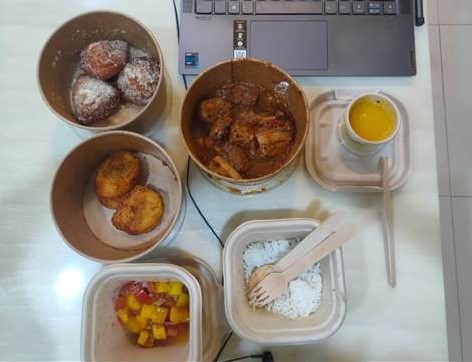
“We’re privileged and honoured to have partnered with many distinguished members of the diplomatic corps, government officials, academics, corporate professionals, entrepreneurs, and leaders of trade associations and chambers of commerce in delivering the STEER/e-STEER programmes,” said Mr Randall Ong, Associate Director at NUS GRO, who conceptualised the STEER programme from its onset.
“The feedback from participants has been overwhelmingly positive. We’re heartened that the sessions have facilitated tremendous educational value creation, such as in the analyses of social, environmental issues and business models, cross-cultural appreciation and professional networking opportunities for our students.”
Although the planning and implementation of overseas travel continues to be a challenge, NUS and GRO remain committed to providing our students with global opportunities for learning, albeit in alternative ways such as virtual immersions, to enhance the development of cultural understanding and skill sets in relating to a global economy.
This story first appeared on NUSNews on 7 January 2022.
Winners of AY2020-21 Faculty Teaching Excellence Awards Unveiled
 The NUS Faculty of Arts and Social Sciences is proud to announce the 37 winners of the Faculty Teaching Excellence Award for their work in AY2020‐21, 16 of which have also been nominated for the Annual Teaching Excellence Award(ATEA) and Annual Digital Education Award (ADEA).
The NUS Faculty of Arts and Social Sciences is proud to announce the 37 winners of the Faculty Teaching Excellence Award for their work in AY2020‐21, 16 of which have also been nominated for the Annual Teaching Excellence Award(ATEA) and Annual Digital Education Award (ADEA).
Special thanks are due to members of the Faculty Teaching Excellence Committee–Dr Susan Ang (English Language and Literature and Chair of FTEC), A/P Loy Hui Chieh (Philosophy; FASS Vice‐Dean), A/P Lim Wee Hun, Stephen (Psychology), Dr Gilbert Yeoh (English Language and Literature) and Mrs Chen Ing Ru (Centre for Language Studies)–for their efforts in shortlisting and nominating the winners.
|
NAME |
DEPARTMENT |
|
Mr Appriou Yannick Francois |
Centre for Language Studies |
|
Ms Baranska, Malwina |
Centre for Language Studies |
|
Ms Klayklueng, Sasiwimol |
Centre for Language Studies |
|
Ms Morita, Kazuko |
Centre for Language Studies |
|
Dr Chaidaroon Suwichit |
Communications and New Media |
|
Dr Hong Renyi |
Communications and New Media |
|
Dr Mitchell, Alexander Ian |
Communications and New Media |
|
Dr Shobha Avadhani |
Communications and New Media |
|
Mr Tan Kai En |
Communications and New Media |
|
Dr Timothy Wong Chong Ji |
Economics |
|
Dr Vu Thanh Hai |
Economics |
|
A/P Michelle M. Lazar |
English Language & Literature |
|
Dr Miguel Escobar Varela |
English Language & Literature |
|
A/P Starr Rebecca Lurie |
English Language & Literature |
|
A/P Thell Anne Marie |
English Language & Literature |
|
Dr Roy, Tania |
English Language & Literature |
|
A/P Chang Tou Chuang |
Geography |
|
A/P Daniel Adam Friess |
Geography |
|
Dr Gretchen Christina Coffman |
Geography |
|
Dr Kamalini Ramdas |
Geography |
|
Dr Kenney-Lazar Miles Richard |
Geography |
|
Dr Teo Sheng Kiat, Shaun |
Geography |
|
Dr Donna Maree Brunero |
History |
|
Dr Lawrence, Kelvin |
History |
|
Dr Sayaka Chatani |
History |
|
Dr Beddor, Robert Speeter |
Philosophy |
|
Prof Bain, William Ward |
Political Science |
|
Dr Dunya Deniz Lepori |
Political Science |
|
Dr Jia Lile |
Psychology |
|
Dr Nina Laurel Powell |
Psychology |
|
Dr Wong Shi Hui Sarah |
Psychology |
|
Dr Peace Wong Yuh Ju |
Social Work |
|
Dr Chua Hui Ching, Emily |
Sociology |
|
Dr Elliott Edward Prasse-Freeman |
Sociology |
|
Dr Jennifer Emily Estes |
Sociology |
|
Dr Noorman Abdullah |
Sociology |
|
Dr Radics, George Baylon |
Sociology |
Congratulations to them all!
FASS Announces New Additions to Leadership Team
IN BRIEF | 2 min read
The NUS Faculty of Arts and Social Sciences is pleased to announce recent new appointments to the Faculty's leadership team.
Three eminent members of the Faculty received new appointments to the Deanery at the beginning of this year:
- Professor Joseph Park (English Language and Literature)
Vice-Dean (Undergraduate Studies) - Dr Zhang Yang (Economics)
Associate Dean (Undergraduate Studies) - Dr Noorman Abdullah (Sociology)
Assistant Dean (External Relations and Student Life)
We wish them the very best with their new portfolios. Click here to visit the FASS Deanery page.




Looking to 2022: Celebrating the Year’s Three Anniversaries by Prof Tommy Koh
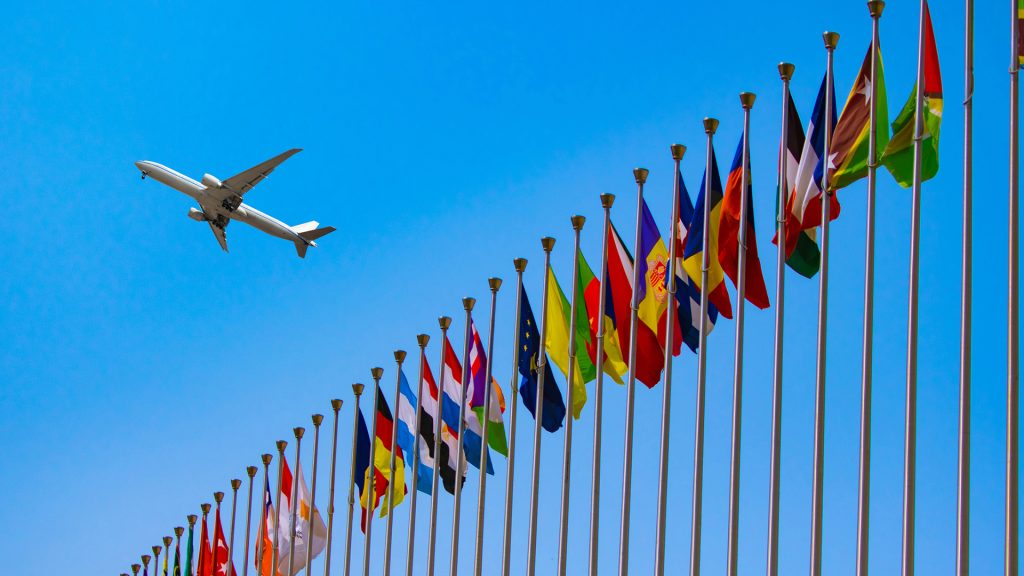
The last two years have brought untold pain, sorrow and destruction to the world. With vaccination and other preventive measures, I see light at the end of the tunnel. We need good news to restore our morale. I have therefore decided to write a positive essay about 2022. In 2022, we will celebrate the 40th anniversary of the UN Convention on the Law of the Sea, the 30th anniversary of the Forum of Small States and the 25th anniversary of the Asia-Europe Foundation.
UNCLOS at 40
The UN Convention on the Law of the Sea or UNCLOS, in short, was adopted in 1982, after nine years of negotiation. It came into force in 1994. It has 168 parties, including the European Union. There is a Singapore Connection to UNCLOS. In the final year of the conference, I was elected as its president.

Why is UNCLOS an important treaty?
It is an important treaty for several reasons.
First, the oceans cover 70 percent of the earth’s surface. It is a source of food for the people of the world. It is the highway for shipping and maritime trade. It functions as the blue lung of the planet. UNCLOS seeks to regulate all aspects of the uses of the oceans and their resources.
Second, UNCLOS has given the world clear legal rules on the maximum breadth of the Territorial Sea, the fishing rights of costal stress, special regimes of passage for ships and aircraft through and over international straits and archipelagos, etc.
Third, UNCLOS is a victory for international cooperation, for multilaterism and for the rule of law. Because of UNCLOS there is peace of sea.
FOSS at 30
The United Nations has 193 members. The majority of the members are small countries. The world favours the big and strong. Small countries often feel that they are being treated as second class citizens. A glaring sample of this inequality can be seen in the composition of the UN Security Council. The five permanent members, USA, China, Russia, France and UK are big countries.
In 1992, Singapore took an important initiative at the UN. It established the Forum of Small States. Any country whose population is below 10 million is eligible to join.
FOSS has 108 members. This is more than half the membership of the UN. Since every country has one vote at the UN, the combined voting power of FOSS gives it salience. Before FOSS, it was difficult for small countries to get elected to various UN bodies. It is less difficult now.
By joining forces, FOSS has empowered small countries in other ways. The big countries can longer afford to ignore the small countries. The senior officials of the various international organisations welcome opportunities to meet with FOSS. FOSS has amplified the voices of the small countries. It has also strengthened the negotiating leverage of small countries. We still live in an unequal world. FOSS has made it a little less unequal.
ASEF at 25
The second Prime Minister of Singapore, Mr Goh Chok Tong, is responsible for many important international initiatives. One of them is the Asia-Europe Meeting or ASEM. Mr Goh felt that it was strategically important to build a bridge linking Asia and Europe. He proposed a summit meeting between the leaders of Asia and Europe. This was held in Bangkok in 1996.
At the ASEM summit, in Bangkok, PM Goh proposed the establishment, in Singapore, of the Asia-Europe Foundation. The proposal was adopted by the summit. The objective of the foundation is to promote better mutual understanding between the people of Asia of Europe. We seek to achieve this objective by bringing together the students, youth, intellectuals, artists, parliamentarisms, think-tanks, universities, museums, etc. from the two regions.
I was appointed as the first executive director of ASEF. My deputy was from France. My other senior colleagues came from Germany, UK, and China. We were energized by our historic mission. I was in Europe almost every month, helping to organize inter-regional meetings or speaking to conferences. It was a very busy period of my life.
During my tenure, ASEF had 13 Asian members and 15 European members plus the European Commission. Today, ASEF has 21 Asian members and 30 European members. The substantial increase in its membership is one indication of the success of ASEF.
About the Author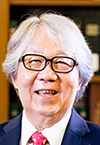 Professor Tommy Koh is Professor at NUS Law, and the Rector of NUS Tembusu College. He is also Ambassador-at-Large at Singapore’s Ministry of Foreign Affairs; Chairman of the Centre for International Law of NUS; and Special Advisor of the Institute of Policy Studies at NUS. A veteran diplomat and academic, Prof Koh’s former roles include being Dean of NUS Law (1971-1974), Singapore's Permanent Representative to the United Nations (1968-1971 and 1974-1984), and Singapore’s Chief Negotiator for the US-Singapore Free Trade Agreement (2000-2003).
Professor Tommy Koh is Professor at NUS Law, and the Rector of NUS Tembusu College. He is also Ambassador-at-Large at Singapore’s Ministry of Foreign Affairs; Chairman of the Centre for International Law of NUS; and Special Advisor of the Institute of Policy Studies at NUS. A veteran diplomat and academic, Prof Koh’s former roles include being Dean of NUS Law (1971-1974), Singapore's Permanent Representative to the United Nations (1968-1971 and 1974-1984), and Singapore’s Chief Negotiator for the US-Singapore Free Trade Agreement (2000-2003).
Looking to 2022 is a series of commentaries on what readers can expect in the new year. This is the first installment of the series.
NUS Bags Major PR Award for College of Humanities and Sciences Campaign

One year since the official inauguration of the NUS College of Humanities and Sciences (CHS), the publicity campaign for the new College has gained recognition at the recent Public Relations in the Service of Mankind (PRISM) Awards.
The University bagged a Distinction Award in the category “Outstanding Campaign by a Non-Government Organisation or Not-For-Profit Organisation” for the launch and publicity of the interdisciplinary College.
The award recognises NUS’ effective communications regarding the necessity of an interdisciplinary education to faculty members, prospective students and their parents, alumni, employers, and members of the public.
The campaign also underscored what CHS offers students in a world plagued by complex challenges that require integrated interdisciplinary approaches. The campaign included the launch event, student profiles, social media, and CHS collaterals and media assets in the form of CHS-specific infographics, news and FAQs.
The campaign also included a video series on interdisciplinarity, a podcast series by the teaching team of the common curriculum Humanities course, and stakeholder endorsement in the form of testimonials from students and alumni of NUS Faculty of Arts and Social Sciences (FASS) and the NUS Faculty of Science (FoS) who have pursued interdisciplinary studies. A successful admissions publicity campaign was run, including the 2021 NUS Open House which drummed up interest in the College with student and employer panels, small group tours, and student chat rooms.

The accolade from PRISM, which coincides with the one-year anniversary of the official inauguration of CHS, bears testament to the concerted effort on multiple fronts of the campaign by various stakeholders, including the Communications teams from FASS and FoS, the NUS Office of University Communications and communications agency AKA Asia.
“The award comes as a truly wonderful one-year anniversary gift to all our colleagues involved in the CHS campaign,” said NUS Chief Communications Officer Ms Ovidia Lim-Rajaram.
“It is gratifying to know that our efforts to kickstart a meaningful, groundbreaking programme at the College are paying off, and that the journey to promoting an interdisciplinary, 21st-century educational experience at NUS is off to a great start.”
Communications at CHS is co-led by Mr Nisar Keshvani, Associate Director for Strategic Outreach and Communications at FASS, and Ms Janice Quah, Associate Director for Corporate Communications at FoS.
“The campaign award, a result of the synergy and collaboration across diverse University faculties and departments, epitomises the spirit of interdisciplinarity that CHS values, and the idea of capitalising on each other’s strengths to achieve the best outcomes,” Mr Keshvani said.
Ms Quah added, “It has been a challenging journey but seeing our communications ideas collectively come to fruition is truly fulfilling! The validation of the hard work motivates us to continue raising the bar, to sustain the impactful profiling of CHS to students and stakeholders.”
Recognising the best in public relations
Celebrating 44 winners across 27 categories, the PRISM awards ceremony was held on 15 Dec by the Institute of Public Relations Singapore (IPRS), the only accrediting body for public relations practitioners in Singapore. The Guest of Honour was Mr Tan Kiat How, Minister of State at the Ministry of Communications and Information (MCI).
Acknowledging the challenges of a shifting communications landscape, Mr Tan said, “MCI recognises the importance of excellence in public relations and communications across all sectors of the economy.”
“The campaigns up for awards today show how all of you have worked around these challenges and continued to achieve excellent levels of reach and impact.”
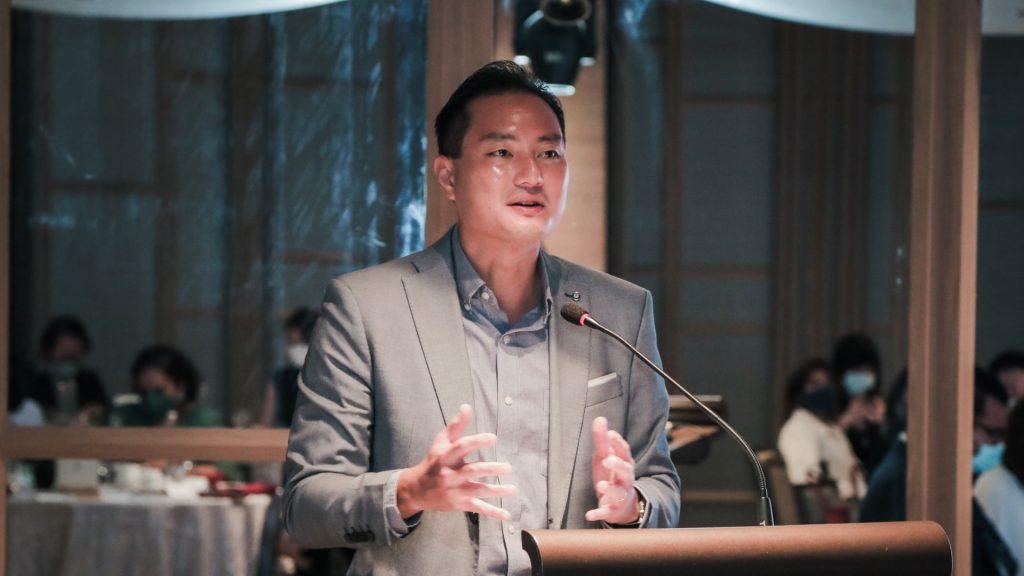
Held biennially since 1987, the PRISM Awards is one of the oldest and most prestigious awards in the industry, celebrating Singapore’s brightest stars in the communications and public relations industry. It is judged by a panel of established business leaders and senior practitioners, recognising and honouring organisations and individuals for excellence in public relations and communications.
Ms Koh Juat Muay, President of the IPRS Council 2021/2023 said, “The winning entries and the winners this year reveal a singular story – the resilience of our people, the ingenuity of the campaigns and strength of the organisations that continues to thrive in an evolving local and global communications landscape.”
“IPRS is privileged to hold PRISM Awards 2021 and share in the pride of profession demonstrated by our people and in the brilliance of their campaigns. Our winners truly embody the meaning of PRISM and that is Public Relations In the Service of Mankind,” she added.
This story first appeared in NUSNews on 21 December 2021.
An Interview with Emeritus Prof S. Vasoo and Assoc Prof Winston Goh on The Strange Start of Psychology at the National University of Singapore
The Strange Start of Psychology at the National University of Singapore (NUS Department of Psychology, 2021), showcases the history of the NUS Faculty of Arts and Social Sciences' Department of Psychology, Singapore's oldest psychology programme. The programme, which kicked off during the 86/87 academic year at the Department of Social Work (renamed the Department of Social Work and Psychology), became a department in 2005.
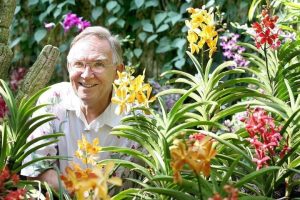
Author Dr John Michael Elliott (1945-2019), who was at the time a psychologist at the then Ministry of Social Affairs, joined the programme six weeks after it began and retired in 2018.
As the book explains, in Singapore, historically psychology was viewed more as clinical work that supported psychiatry, and mental health care was deprioritized. Instead, during the island's colonial era, patients requiring mental health treatment were institutionalized in The Insane Hospital, which commenced operations in 1841 with 30 beds. This hospital evolved into The Lunatic Asylum (1862, 100 beds), followed by The New Lunatic Asylum (1887, 300 beds), and then the Mental Hospital in 1928, which became Woodbridge Hospital in 1951.
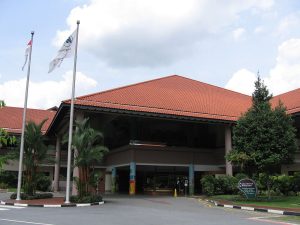
In 1993, Woodbridge Hospital moved to Buangkok Green, becoming the Institute of Mental Health's new inpatient facility.
There was a definite need for trained psychologists in Singapore, as well as a programme to train them, since, post-independence, all psychologists in the country completed their education abroad. When the NUS psychology programme got started in July 1986, however, the discipline was still often seen as non-Asian and more as medical training than a social sciences course, and also as a luxury in the realm of social work. The Department of Social Work was an ideal place for the new programme, Dr Elliott notes, as it would contribute to the department's own development, enabling it to offer an honours degree in social work and psychology.

The NUS psychology programme's initial cohort had 72 students and 1 staff and grew rapidly. There are currently around 900 students in the introductory psychology course and 220 honours graduates annually. At its inception 35 years ago the programme offered a three year general degree with a competitive fourth year honours degree. In 1989, 50 students received a general degree, 11 of whom went on to get an honours degree. Today, the department's own clinical psychology master's programme graduates approximately 15 annually, and psychology graduate students can also obtain a Master of Social Sciences or PhD.
The NUS Department of Psychology ranks 16 out of 303 on the Quacquarelli Symonds list and psychology is a well recognized and respected course of study in Singapore. Many graduates go on to engage in psychological work in the public sector, such as in Singapore's Ministries of Health, Defense, Home Affairs, and Social and Family Development. A number of graduates are also employed in private sector positions involving psychological work like human resource management and marketing, or in private practice in the fields of clinical, counselling, and industrial-organisational psychology, among others.

We discussed the The Strange Start of Psychology at the National University of Singapore, which has an online launch on Friday, 10th December at 11 am, with Associate Professor Winston D. Goh, the current NUS Department of Psychology Head, and Emeritus Professor S. Vasoo, who led the then NUS Department of Social Work and Psychology from 1987 to 1999.
 A/P Vasoo Q & A
A/P Vasoo Q & A
1. What were your most memorable experiences developing the new psychology programme during your term leading the NUS Department of Social Work and Psychology?
I have been teaching students and working with academic staff for about 50 years. In the course of these years, I always encouraged and advised them not to look back on events that had surpassed them. This is because memorable matters would not come back and one would not be able to deal with the bygones. No point spending time lamenting over things that have gone past as it can be emotionally costly and tiring. I always encourage students and academic staff to look ahead on events that will be forthcoming as these can be managed as they unfold and are within their control. I am of the opinion that various human issues that we can grasp at hand are largely solvable as long as we persistently tackle them with empathy. It is only with good empathy that we can have clearer insights to deal with human issues and relationships.
I recall that one of the challenging tasks that I had to deal with as the Head of the Department of Social Work and Psychology was to quickly recruit a group of Psychology academic staff to deliver the undergraduate psychology programme in 1986. I had selected staff with diverse psychology training such as a developmental psychologist, a cognitive psychologist, a social psychologist, an experimental psychologist, a clinical psychologist, and a psycholinguist. You can imagine with these varied backgrounds coming together to agree on a basic undergraduate curriculum was not easy. Each of them had different hobby horses to ride, which was understandable while mind-boggling, as there were protracted views within the group and at times heated arguments that I had to mediate. I brokered a deal as a non-partisan and drew a consensus among the different psychological academic personalities for the need to develop a top-notch undergraduate psychology programme based on the best psychology departments in the United Kingdom and United States. The foundation laid for the early phase of the psychology programme saw the fruition of some of our top psychology scholars in the Faculty of Arts and Social Sciences. I am indeed proud to witness that some of these accomplished scholars have become lead anchors of the NUS Department of Psychology and later appointed Heads. The nurturance of these top scholars have helped stabilize the psychology programme and provided succession of leadership. They also supported the Deanery of the Faculty of Arts and Social Sciences.
2. What can psychologists learn from social workers, and what can social workers learn from psychologists?

To put it simply, both psychology and social work are non-identical twin disciplines with each having to deal with human behaviour and social issues. As a psychologist, one has to understand human behaviour and the cause of such behaviour, and as a social worker, one has to understand the cause of social and human problems and then enable people to find ways to problem solve. Both disciplines deal with human and psychosocial issues, and human behaviour requires a multidisciplinary focus. I would say that no single discipline is adequate to solve human life course issues. I must add that a good psychologist will require social work lenses and a competent social worker needs to have helpful psychological lenses. As one will appreciate, we are all human beings and are ecologically bounded. Therefore both psychological and social work analyses are critical to better appreciate human behaviour and social interactions, and these can contribute to effective human and social problem solving.
3. What do you see as the most notable impacts in practice of social work and psychology in Singapore so far and in the future?

Psychology graduates as well as social work graduates are making robust contributions in public service, private enterprises, and non-governmental organisations. Psychologists hold highly respectable positions in areas such as clinical services, rehabilitation, health, human resources, education, the armed forces and the police, besides others. Increasingly, psychologists are needed to contribute psychological solutions to strengthen our psychological defences against various societal crises.
Likewise, social workers are also appointed in highly regarded positions in fields such as social services, rehabilitation, health, social research, counselling and mental health, education, the armed forces, and childcare, among others. Both psychologists and social workers have so far given valuable suggestions and inputs to policy changes to the care and protection of children, youth, and women, and in the support of the vulnerable and the promotion of inclusiveness of people with special needs.
Singapore like the rest of the world will be confronted with serious social and ecological changes, including the consequences of unabated climate change. In view of these changing scenarios, our future psychologists will have to be equipped with psychological skills in assessing the impact of human behaviour on mitigating issues related to the environment and climate change as well in order to have good insight into the social and psychological consequences of an ageing Singapore community. Trainee social workers can be better equipped with social analytical skills, which will make them more versatile in predicting specific vulnerable sectors of the community. Thereby, the future social workers can enhance their community problem solving capacity by building more support networks to build a socially healthy community. Specifically, more attention can be paid by both social workers and psychologists to deal with the social and psychological implications of the growing social divide between the haves and have-nots, and find more innovative ways to deliver services to enable the less well-off to move up.
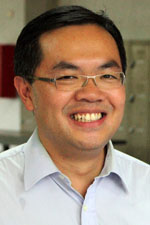 A/P Goh Q & A
A/P Goh Q & A
1. What are some of your fondest memories of Dr John Elliott, first as a teacher, and later as a colleague?
John encouraged critical thinking and we always had very illuminating discussions during his tutorials (see photo on page 28); of course, tutorials at that time only had between 5 and 7 students, so very difficult to hide! He was quite a tough marker though - never got an A from him for my term papers; but then again, As were given out very sparingly during that period (and there were no CAs at that time; the term paper grades were not counted). As a colleague, he was always willing to give advice to young hires, and his experience helped me immensely in the crafting of exam questions when I first started helming my own courses. I also remember he was very particular in signing or agreeing to legal documents - he once refused to upload materials into IVLE (the forerunner of LumiNUS) because he felt NUS did not provide enough protection for staff.
2. What motivated you to study psychology at NUS as an honours and then Masters student, and what prompted you to return to the department to teach and carry out research projects?
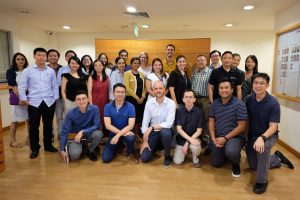 I was in the pre-med programme in junior college, so the path seemed straightforward for me. But I started reading about psychology as a course in various government information booklets and thought this was more interesting than medicine - I also didn't do well at the A levels, so perhaps this was fate telling me to take another path. However, this meant you had to go overseas as there was no psychology programme offered locally and my parents could not afford an overseas education. So when I was accepted in FASS, I was set to major in the closest one at the time - Sociology. I didn't start right away as I had to serve National Service; and in my second year of NS, I found out that NUS had started a psychology programme (again, fate may have been looking out for me!). Fortunately, I did well enough in the aptitude test (required then) to be allowed to major in Psychology. Everyone was hoping to do Honours, and at the time, you had to be invited, so I was elated when the Department of Social Work and Psychology offered me Honours, no motivation required. As for the Masters, I worked as an RA after completing my Honours, so I wanted to see if a research and academic career appealed to me, and decided to do my Masters while I was a TA for the Department. After that, NUS funded my PhD overseas on a staff development scheme, so I was obligated to return to serve a bond. In a sense, NUS Psychology has been my home since I started as an undergrad student, for I never left!
I was in the pre-med programme in junior college, so the path seemed straightforward for me. But I started reading about psychology as a course in various government information booklets and thought this was more interesting than medicine - I also didn't do well at the A levels, so perhaps this was fate telling me to take another path. However, this meant you had to go overseas as there was no psychology programme offered locally and my parents could not afford an overseas education. So when I was accepted in FASS, I was set to major in the closest one at the time - Sociology. I didn't start right away as I had to serve National Service; and in my second year of NS, I found out that NUS had started a psychology programme (again, fate may have been looking out for me!). Fortunately, I did well enough in the aptitude test (required then) to be allowed to major in Psychology. Everyone was hoping to do Honours, and at the time, you had to be invited, so I was elated when the Department of Social Work and Psychology offered me Honours, no motivation required. As for the Masters, I worked as an RA after completing my Honours, so I wanted to see if a research and academic career appealed to me, and decided to do my Masters while I was a TA for the Department. After that, NUS funded my PhD overseas on a staff development scheme, so I was obligated to return to serve a bond. In a sense, NUS Psychology has been my home since I started as an undergrad student, for I never left!
3. What future plans are in the works for NUS Psychology and how do they connect to the need for scholars and practitioners of the discipline in Singapore and the region?

Top psychology departments in the world are very well resourced with research spaces, laboratories, and facilities; so we hope to move in that direction and provide all of our research-active staff dedicated lab spaces to do research that will benefit Singapore and the discipline in general. We will also need to see how many more students (we have always been one of the more in-demand majors since inception) will want to be Psychology majors with the advent of the College of Humanities and Sciences, and perhaps develop various teaching innovations to serve an even more expanded student body (the days of 5-7 pax tutorials, or a 10-student Honours cohort in my year, are long gone). But we have very good educators in the department, so I am not worried about that. Our Clinical Psychology Masters programme is also in very high demand, given the focus on mental health needs nowadays. So we will need to see how we can support training for manpower needs in the public and private sectors in terms of workshops for associate psychologists, in additional to training people to be professional clinical psychologists.
Thank you very much for your time and answers, Prof Vasoo and A/P Goh! Readers can learn more about the history of the NUS Department of Psychology here. Catch the book launch on Friday December 10th at 11 AM by registering via Zoom.
Largest Cohort of Outstanding Alumni Honoured at NUS Alumni Awards 2021
IN BRIEF | 4 min read
- 40 exceptional individuals were recognised at the NUS Alumni Awards 2021, making this the largest cohort of trailblazers honoured in a single year since the awards were introduced in 2005. Organised by the NUS Office of Alumni Relations, this year’s awards was hosted in two ceremonies last week.
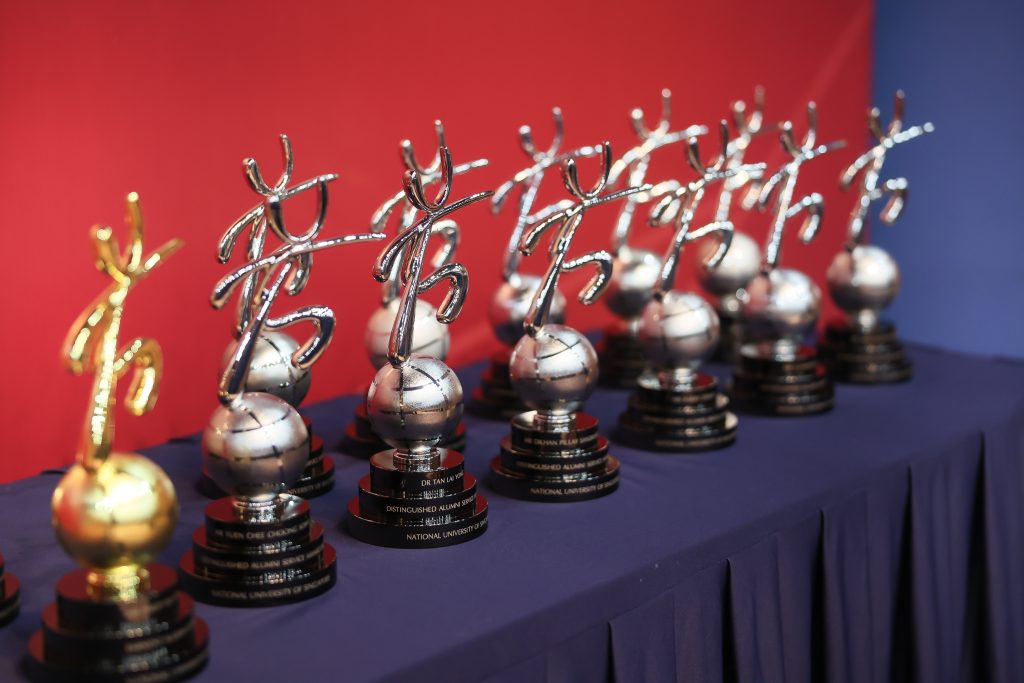
Held in two ceremonies on 3 and 5 November 2021, the NUS Alumni Awards this year are honouring the achievements of 40 outstanding alumni – 32 individuals and four groups of two – who have distinguished themselves through significant and impactful contributions to Singapore and the larger community. This is the largest cohort of trailblazers honoured in a single year since the awards were introduced in 2005.
Eminent Alumni Award
The University conferred the Eminent Alumni Award on three NUS alumni who have distinguished themselves nationally or globally for their exceptional and sustained contributions and achievements – Ambassador-at-Large Professor Chan Heng Chee, first-generation leader Mr Ong Pang Boon, and former top civil servant Mr Philip Yeo.

Professor Chan Heng Chee, Ambassador-at-Large at the Ministry of Foreign Affairs, was the first woman to graduate with First Class Honours in Political Science from the then University of Singapore (US) in 1964. Prof Chan began her diplomatic career in 1989 as Singapore’s first permanent representative to the United Nations. In 1996, she was appointed Singapore’s, and East Asia’s, first female ambassador to the United States. She also represented Singapore in Washington between 1996 and 2012, making her one of the country’s longest serving diplomats. She is currently a member of the NUS Board of Trustees.
Former Minister Mr Ong Pang Boon is one of the pioneer generation of leaders who helped lay the foundations for a stable and successful Singapore. In a political career spanning 29 years, he served as Minister in the Home Affairs, Education, Labour and Environment ministries. For his sterling contributions to the government and the nation, Mr Ong was conferred the Order of Nila Utama (First Class) in 1990.
Mr Philip Yeo is well known for his transformative contributions to Singapore’s military, economic and biomedical fields. After three decades of illustrious service in the Singapore Administrative Service from 1970 to 1999, Mr Yeo chaired a number of public and private sector organisations including the Singapore Economic Development Board, the National Computer Board (now Infocomm Media Development Authority), the Agency for Science, Technology and Research (A*STAR), and the Standards, Productivity and Innovation Board (SPRING Singapore).

Distinguished Alumni Service Award
Twelve alumni were recognised with the Distinguished Alumni Service Award for their impact in their respective fields as well as excellent and sustained service rendered to NUS, its predecessor institutions and the community. They are:
- Mr Abdullah Bin Tarmugi, Permanent Council Member on the Presidential Council on Minority Rights, former Minister for Community Development, and former NUS Board of Trustees Member;
- Ms Aw Kah Peng, Chairman, Shell Companies in Singapore;
- Ms Jocelyn Chng Yee Kwang, Managing Director, Sin Hwa Dee, CEO and Co-Founder, JR Group, and former Member of the NUS Alumni Advisory Board;
- Mr S Chandra Das, Non-Resident High Commissioner to Sri Lanka, and former Member of Parliament;
- Mr Barry Desker, Former Non-Resident Ambassador to the Holy See and the Kingdom of Spain;
- Minister Desmond Lee Ti-Seng, Minister for National Development;
- Dr Lee Tzu Pheng, Award-winning poet and literary pioneer, and winner of the Cultural Medallion for Literature;
- Professor Leo Yee Sin, Executive Director, National Centre for Infectious Diseases;
- Mr Dilhan Pillay Sandrasegara, CEO, Temasek Holdings (Private) Limited and CEO, Temasek International;
- Mr Jack Sim Juek Wah, Founder, World Toilet Organisation;
- Dr Tan Lai Yong, Associate Professor, College of Alice & Peter Tan, NUS; and
- Mr Sonny Yuen Chee Choong, Managing Director, JonDavidson Private Limited.
Outstanding Young Alumni Award
Seventeen young alumni also received awards for their achievements which have distinguished them in their chosen field. They are:
- Ms Annie An Dongmei, Solutions Architect, Amazon Web Services;
- Mr Laurence Putra Franslay, Winner of the President’s Volunteerism & Philanthropy Awards 2020;
- Dr Sharon Heng Ling Zhi, Ophthalmic surgeon at Moorfields Eye Hospital and Chairperson, NUS Alumni London Chapter;
- Mr Lim Wei Jie, Co-Founder and Director, Foreword Coffee Roasters;
- Mr David Low Jia Wei, Co-Founder and Chief Data Scientist, Pand.ai;
- Dr Mohammad Hossein Davood Abadi Farahani, Founder, CEO and CTO, SEPPURE;
- Mr Muhammad Ibnur Rashad Bin Zainal Abidin, Founder and Chief Innovation Officer, Ground-Up Innovation Labs for Development (GUILD);
- Mr Ow Tai Zhi, Co-Founder and Chief Investment Officer, AutoWealth Singapore, and Member of the NUS Alumni Advisory Board;
- Mr Rameez Ansar, Co-Founder, Circles.Life;
- Ms Carrie Tan Huimin, Member of Parliament and Founder, Daughters of Tomorrow;
- Ms Audrey Joy Tan Yan Xi, Chief Dreams Architect and Co-Founder, PlayMoolah;
- Dr Andy Tay Kah Ping, NUS Presidential Young Professor;
- Mr Aseem Kumar Thakur, Co-Founder, GIVE.asia, and Founder and CEO, Aseemai;
- Ms Tin Pei Ling, Member of Parliament and CEO, Business China;
- Mr Wong Kah Chun, Chief Conductor, Nuremberg Symphony Orchestra, Germany;
- Ms Janice Wong Huixian, Chief Artist, Janice Wong Singapore and Owner of 2am:dessertbar; and
- Dr Zhou Lihan, Co-Founder and CEO, MiRXES.
Team (Alumni) Award
The accolade was accorded to four two-member alumni teams who have collectively distinguished themselves in their chosen fields:
- Mr Nicholas Ooi Hsien Loong and Ms Janelle Lee Jiaxin, Co-Founders, bantu;
- Dr Shi Jiahai and Dr Le Thi Nguyet Minh, Co-Founders, Carmine Therapeutics;
- Mr Stefen Chow and Ms Lin Huiyi, Co-Founders, Chow and Lin; and
- Mr Henry Chan Hian Yi and Mr Joel Leong Yong Siang, Co-Founders, ShopBack.

NUS President Professor Tan Eng Chye said, “NUS is delighted to honour 40 outstanding alumni and teams – the biggest cohort of recipients since the inception of the awards is testament to the high calibre of alumni who come from diverse backgrounds – from healthcare, civil service, finance, to the arts. Their life experiences, trailblazing work and achievements inspire us to continue nurturing generations of changemakers who exemplify the NUS values of innovation, resilience, excellence, respect and integrity.
“It is their unending spirit of determination, commitment and dedication to improving the lives of communities locally and beyond, that makes us immensely proud to call them NUS alumni. As we celebrate the remarkable contributions of our alumni, NUS remains committed to creating the best environment for exceptional and inspiring individuals to do the best work and unlock their true potential.”
Now in its ninth edition, the biennial NUS Alumni Awards was established on the occasion of NUS’ Centennial Celebrations in 2005 to honour alumni who have distinguished themselves through significant and impactful contributions to their alma mater, society and the world.
This story first appeared in NUSnews on 3 November 2021.
Is Change in Singapore Too Fast, Too Furious?
IN BRIEF | 3 min read
- As part of the NUS Students’ Political Association’s (NUSPA) 45th anniversary, the association published "On The Road: A Collection of Essays and Articles From NUSPA Publications". The book highlights Singapore’s major transformations in its political, societal and economic landscape through 39 essays and interviews from the 1980s till today.
- At the book event, Guest of Honour, Mr Alvin Tan, former Facebook Head of Public Policy, and Trust & Safety, who is now Singapore’s Minister of State for Culture, Community and Youth, and Trade and Industry, touched on crises through the decades that effect change. “You have the Savings and Loan Crisis, Asian Financial Crisis, Gulf War Crisis, Dot-com Crisis, September 11, SARS, Global Financial Crisis,” he noted in his opening speech.
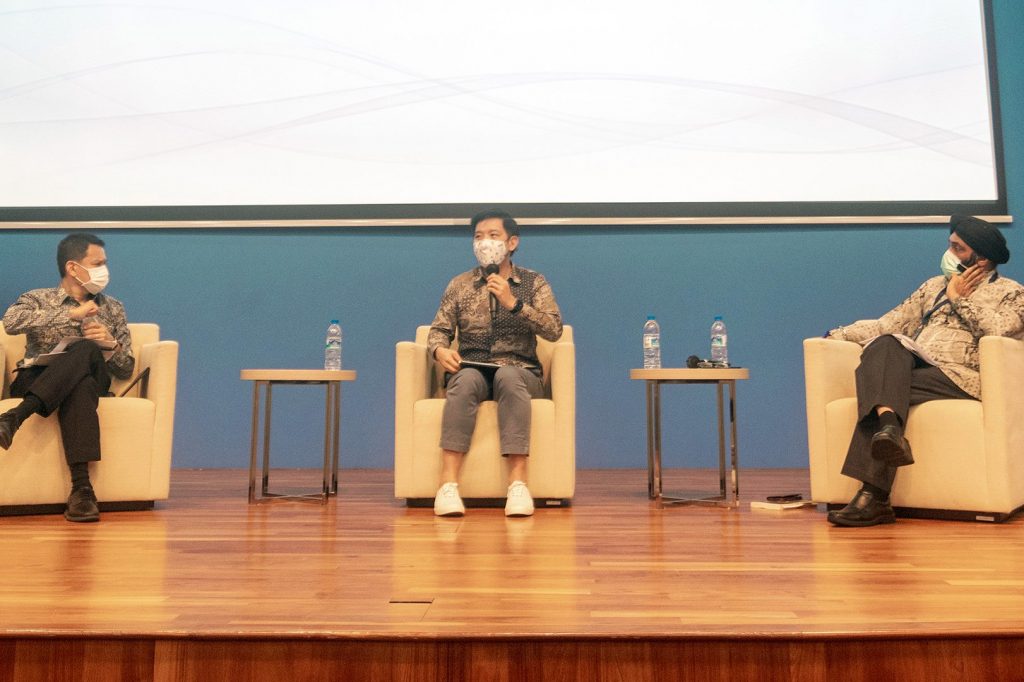
At the Facebook head office in Silicon Valley, which used to be the premises for the now-defunct American technology company Sun Microsystems, the Sun logo is still kept on the glass facades.
It serves as a reminder to Facebook employees not to take their success for granted, shared Mr Alvin Tan, former Facebook Head of Public Policy, and Trust & Safety, who is now Singapore’s Minister of State for Culture, Community and Youth, and Trade and Industry.
To stay at the top of the game requires constant change. But the issue is how fast and how much to change – the central theme at a panel discussion during the launch of a book to commemorate the NUS Students’ Political Association’s (NUSPA) 45th anniversary.
Tracing the world history since NUSPA was founded in 1976, Mr Tan, who was Guest of Honour at the event on 30 Sep, highlighted pivotal global events such as the Iranian Revolution, the fall of the Berlin Wall, and the rapid rise of China.
He also touched on crises through the decades that effect change. “You have the Savings and Loan Crisis, Asian Financial Crisis, Gulf War Crisis, Dot-com Crisis, September 11, SARS, Global Financial Crisis,” he noted in his opening speech.
All these have shaped the global landscape, which also impacts Singapore. Some of these changes are captured in the association’s new book, On The Road: A Collection of Essays and Articles From NUSPA Publications.
The book highlights Singapore’s major transformations in its political, societal and economic landscape through 39 essays and interviews from the 1980s till today.
It revealed that some topics discussed decades ago – such as US-China relations and the use of Singapore’s reserves – remain relevant today. Others, such as social media and COVID-19, illustrate how the world is changing. As NUS President Professor Tan Eng Chye noted in his foreword to the book, Singapore needs to contend with a landscape characterised by new, complex, and urgent challenges.
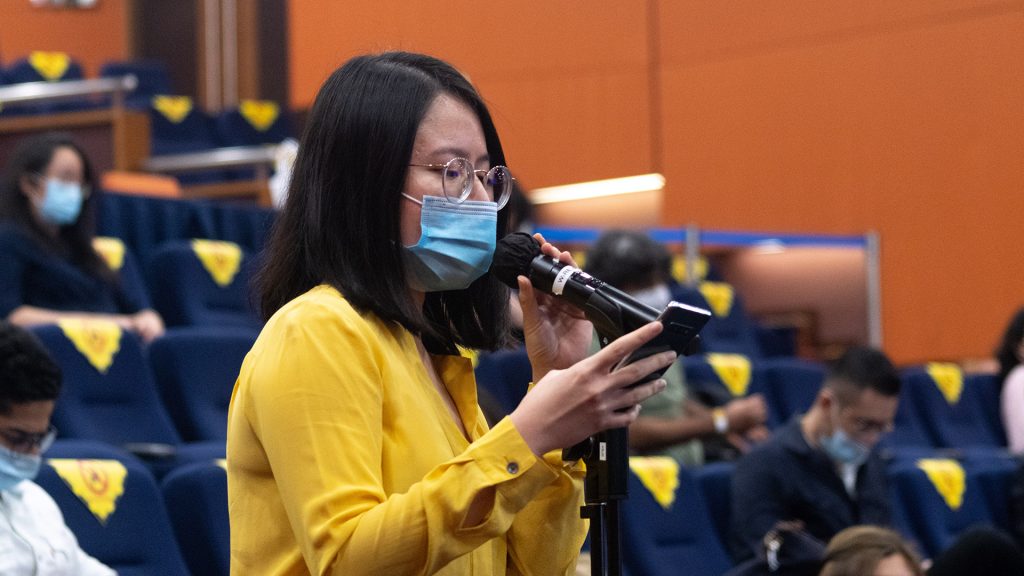
Change, or be “eaten”
In line with the theme of the panel discussion, a question was posed: Is the pace of change in Singapore too fast, and can we afford to slow down?
This was asked by panel moderator, Associate Professor Ho Han Kiat, NUS Dean of Students, to the audience at the Shaw Alumni Foundation House auditorium.
Most disagreed with the statement by a show of hands, as they felt comfortable with the pace of change. Mr Alvin Tan shared that it is crucial for Singapore to always keep up with change as “the world is not standing still” – observations he made from his time in the private sector.
Before entering politics in 2020, the 41-year-old had stints at tech companies LinkedIn and Facebook, investment bank Goldman Sachs, and the United Nations.
“In the corporate sector, if you don’t move, you get “eaten”,” he said, adding that the Ministry of Trade and Industry is always mulling over which investments to bring in.
“If we were to slow down, these investments would go somewhere else.”
Change, with compassion
But do Singaporeans have that resilience to cope with rapid economic, societal and technological changes?
It was the question issued by the other panellist, Associate Professor Bilveer Singh, Deputy Head of the Department of Political Science at the NUS Faculty of Arts and Social Sciences. He cited a personal example as an illustration.
“I’m very uncomfortable with the latest technologies. Whenever my laptop collapses or my Zoom goes haywire, I’m in trouble,” he said, noting that society should be cognisant of those not able to catch up as the country embarks on change.
His remarks sparked a discussion on “safety nets”, especially during a pandemic. In response, Mr Tan listed various government schemes: the Pioneer Generation Package that aids seniors with healthcare costs, the COVID-19 Recovery Grant that provides temporary financial support for workers affected by the pandemic, as well as home ownership and re-skilling opportunities.
Assoc Prof Singh agreed that COVID-19 has reinforced Singapore’s culture of not leaving anyone behind. “This idea of a safety net is increasingly being institutionalised and we are maturing and moving forward as a rich state, but also a caring society,” he said.

Change, with engagement
The panel then turned to the topic of youth engagement, and on how to tap the enthusiasm of youth for positive change.
Assoc Prof Ho agreed that youthful energy is one constant that has remained through the years, citing essays in the book written by passionate individuals in their early 20s.
Mr Tan could relate to such youthful exuberance. He recalled taking part in protests as an economics undergraduate at the University of Sydney. “I remember carrying placards and thinking ‘This is fun!’” he said to laughter in the audience.
As for the book On The Road, it reflects the hopes and thoughts of Singapore’s youth through the decades.
“Forty-five years on, both society and NUSPA remain on the road,” said Mr Michael Zhou, co-editor of the book and immediate past president of NUSPA. “This book marks not the end but the beginning of many more journeys to come.”
This story first appeared on NUSnews on 11 October 2021.
NUS Faculty of Arts and Social Sciences 18th Dean Takes Office
IN BRIEF | 2 min read
-
Dean of the Faculty of Arts and Social Sciences, Professor Lionel Wee, and other members of the Deanery take on their leadership roles today.
Professor Lionel Wee has assumed the position of Dean of the NUS Faculty of Arts and Social Sciences (FASS) and Co-Dean of the College of Humanities and Sciences (CHS) as of today, Friday, 1 October 2021. Prof Wee takes over the helm from Professor Robbie Goh, who is now the Provost of the Singapore University of Social Sciences.
Before becoming FASS' 18th Dean, Prof Wee was the Faculty’s Vice Dean of Research from 2014 till 30 September 2021 and is a Professor of Linguistics with the Department of English Language and Literature. He was also the Head of the Department of English Language and Literature from 2010 to 2014 and is a Provost's Chair Professor of Linguistics with the Department of English Language and Literature.
“It is an honour to be given the opportunity to helm the Faculty of Arts and Social Sciences. The Faculty has achieved much since its founding nearly a century ago, continually evolving to anticipate and address the needs and challenges of a changing society," said Professor Wee. "Together with the Deanery, colleagues, and students of the FASS, I am confident that we will continue to make breakthroughs in both education and research. While these benchmarks are important, diversity and inclusion are priorities for me, and essential pillars of every organisation. My plan is to further emphasise and ensure our staff and students feel empowered and safe in the Faculty in the coming years."

New Appointments to the Strong Leadership
Beginning their new roles with the FASS Deanery today are:
- Associate Professor Elaine Ho (Geography) as Vice Dean (Research). She was previously Assistant Dean (Research)
- Associate Professor Elmie Nekmat (Communications and New Media) as Assistant Dean (Research)
The following members of the Deanery will continue to serve in their respective positions:
- Associate Professor Melvin Yap, Vice Dean (Undergraduate Studies)
- Associate Professor Valerie Wee, Vice Dean (Undergraduate Studies)
- Associate Professor Bruce Lockhart, Vice Dean (Graduate Studies)
- Professor Chen Yi-Chun, Vice Dean (International Relations and Special Duties)
- Associate Professor Loy Hui Chieh, Vice Dean (External Relations and Student Life)
- Mr Mark Teng, Director of Administration
- Associate Professor Sidharthan Maunaguru, Assistant Dean (Undergraduate Studies)
- Dr Zhang Yang, Assistant Dean (Undergraduate Studies)
- Dr Jinna Tay, Assistant Dean (Undergraduate Studies) – recently appointed to the Deanery on 1 July 2021.
- Associate Professor Nicholas Hon, Assistant Dean (External Relations and Student Life)
Book on History of Kampong Gelam Clinches NUS Singapore History Prize
IN BRIEF | 5 min read
-
Winning work challenges collective notions of Singapore Malay history and shines spotlight on Singapore’s cosmopolitan and dynamic economic, political and social history over the last two centuries.
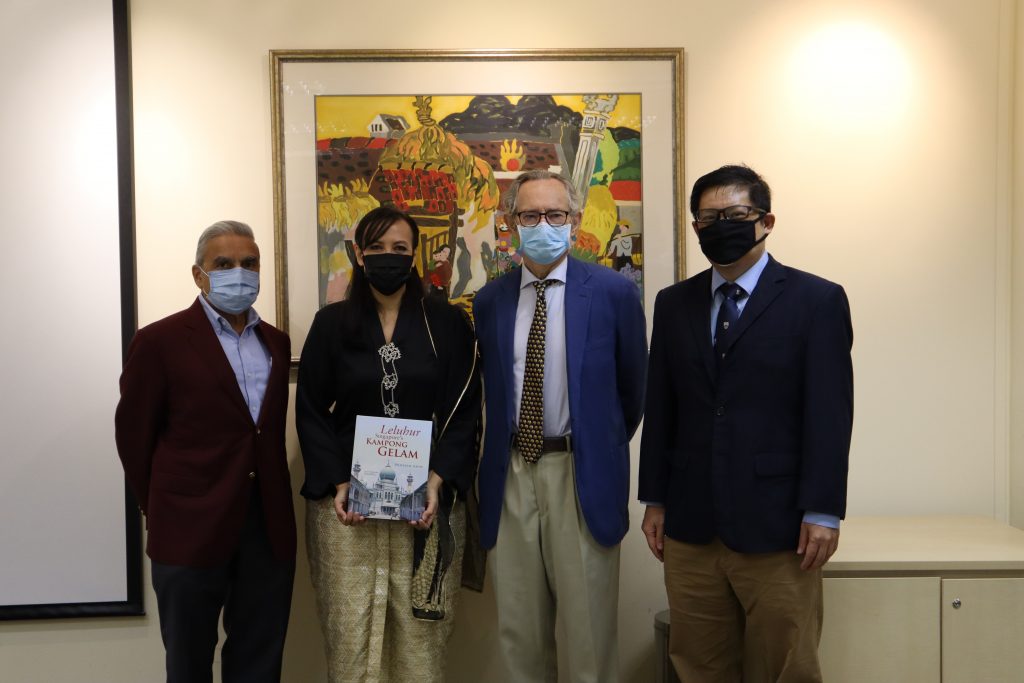
Entrepreneur and award-winning author Ms Hidayah Amin, whose work, Leluhur: Singapore’s Kampong Gelam (Helang Books, 2019), illuminates the history of one of the oldest continuously inhabited areas of Singapore, has been awarded the 2021 NUS Singapore History Prize. Ms Hidayah, who is also a NUS Faculty of Arts and Social Sciences (FASS) alumna (Political Science and European Studies, '01), will receive a cash award of S$50,000.
The announcement of this year's award recipient was made at a press conference today (Thursday, 9 September 2021) at the FASS Dean's Office.
Created in 2014 in support of the national SG50 programme to celebrate the 50th anniversary of Singapore’s independence, the NUS Singapore History Prize is awarded to an outstanding publication that has made a lasting impact on our understanding of the history of Singapore, and that is accessible to a wide audience of specialist and non-specialist readers.
A five-member Jury Panel chaired by Mr Kishore Mahbubani, Distinguished Fellow at the NUS Asia Research Institute, unanimously selected Leluhur: Singapore’s Kampong Gelam, the work of Ms Hidayah, as the winner of the 2021 NUS Singapore History Prize. Ms Hidayah’s work was among six which was shortlisted, out of 31 nominated works authored by local and international scholars. The other Jury Panel members are: novelist Dr Meira Chand; economist Dr Lam San Ling; historian Professor Peter Coclanis; and archaeologist Emeritus Professor John Miksic from the Department of Southeast Asian Studies at the NUS Faculty of Arts and Social Sciences.
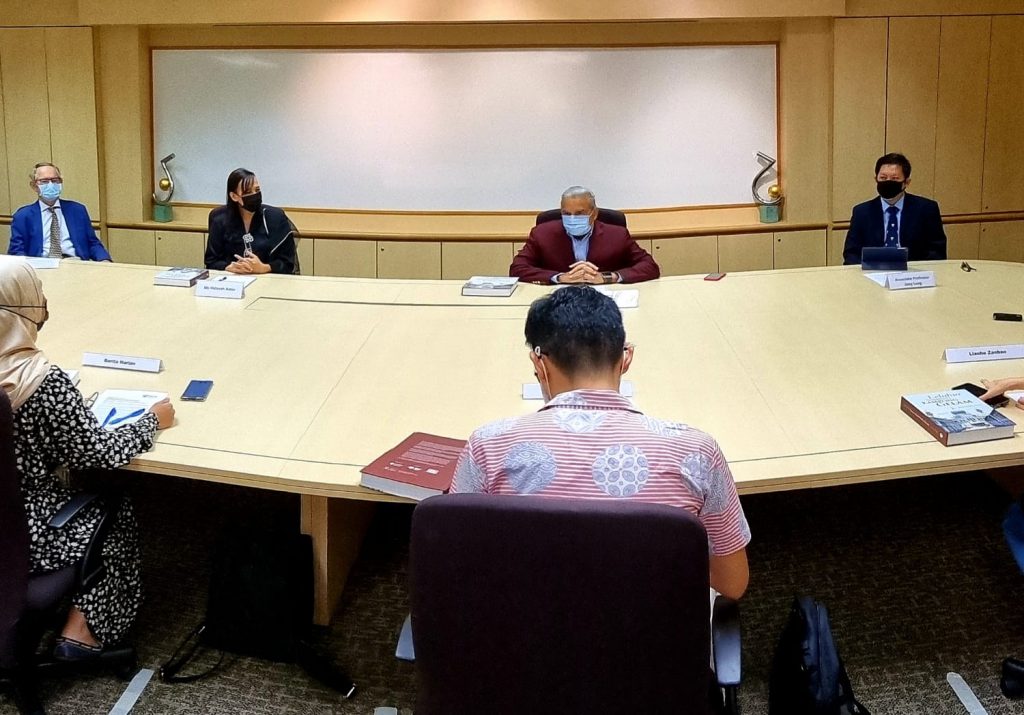
The five books that were shortlisted alongside the winning publication are:
- Kamaladevi Aravindan, Sembawang: A Novel (Marshall Cavendish, 2020);
- Timothy P Barnard, Imperial Creatures: Humans and Other Animals in Colonial Singapore, 1819-1942 (NUS Press, 2019);
- Kwa Chong Guan, Tan Tai Yong, Peter Borschberg, Derek Heng, Seven Hundred Years: A History of Singapore (Marshall Cavendish Edition and National Library Board, Singapore, 2019);
- Jeremy Tiang, State of Emergency (Epigram Books, 2017); and
- Wang Gungwu, Margaret Wang, Home is Where We Are (NUS Press, 2020).
Mr Mahbubani, Chair of the NUS Singapore History Prize Jury Panel, said: “When I grew up as a child in Singapore, I was taught that there was only a sleepy fishing village in Singapore before Raffles came. Hidayah’s book brilliantly throws new light on the rich Malay heritage of Singapore. It describes how Singapore was a key hub in the Malay world, even prior to Raffles' arrival, and how Kampong Gelam became its crux. In a volume packed with fascinating photographs and rich anecdotes, Hidayah has made an important new contribution to our understanding of Singapore’s history. She fully deserves the NUS Singapore History Prize.”
Leluhur: Singapore’s Kampong Gelam
Helang Books published Leluhur: Singapore’s Kampong Gelam in 2019. The book is a history of Kampong Gelam, named after the Gelam tree which once grew in abundance in the area. Once the centre of trade and commerce connecting Singapore to the rest of the Malay Archipelago, Kampong Gelam served as a religious, intellectual, and social hub for the Malays in Singapore. In 1989, the Singapore government gazetted Kampong Gelam and accorded it the status of a heritage district. At the heart of it all, Kampong Gelam was home to modern Singapore’s pioneers, entrepreneurs, craftsmen, and residents including the author, Hidayah, who was born in Gedung Kuning (Yellow Mansion).

Ms Hidayah presents the history of Kampong Gelam in the context of changes to Singapore’s economic, political, and social history over the last 200 years. Few works of this type have been written. She tells the story of the evolution of the neighbourhood, including the history of its inhabitants, many of whom were non-Malays. Her study offers new insight into the district, and helps readers appreciate the complex history of Singapore and its connections to other parts of the world.
Commenting on her win, Ms Hidayah said, “I am deeply touched and honoured that my book Leluhur: Singapore’s Kampong Gelam has been selected as the winner of the NUS Singapore History Prize 2021. This book is not only about the historical narratives of Kampong Gelam. It highlights a different perspective as to what a kampong is and illuminates the spirit embodied in the local commune. It not only provides a better understanding of our past, but also pays tribute to Kampong Gelam’s significance and contribution to Singapore’s history, as well as its importance within the Southeast Asian region.”
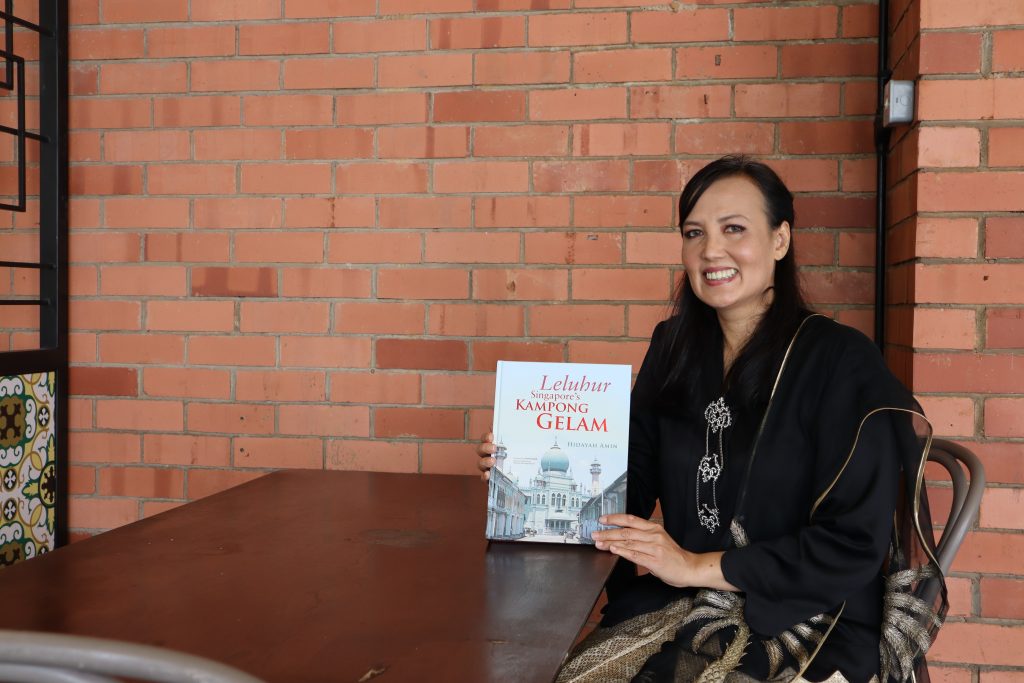
“‘If you don’t write your story, someone else will write it for you.’ My late mother’s simple yet powerful words made me look at history, a subject I was least interested in at school, in a different light. History, essentially, is STORY – his, hers, ours. Learning the story of people, places, countries, is akin to understanding humanity, and striving to become better versions of ourselves. I hope that the future generation of Singaporeans will be among those who remember their roots, their story, their leluhur,” added Ms Hidayah.
Please refer to the Annex for the citation on the winning work by Hidayah Amin.
About Hidayah Amin
Hidayah Amin (also known as Cik Idah) is a daughter of Kampong Gelam, Singapore. She was born in Gedung Kuning, the Yellow Mansion. She is the first Malay Girl Guide to receive the President’s Guide Award in 1989. Educated in Singapore, France, the USA, and England, Ms Hidayah graduated from NUS majoring in Political Science and European Studies, and received her master’s degrees from the University of Cambridge and Lehigh University where she was a Fulbright Scholar. The spirited and passionate entrepreneur is also an award-winning author who has written eight non-fiction books and eight children’s books since 2010. Ms Hidayah actively volunteers in community and humanitarian projects in Singapore and overseas. The NUS Singapore History Prize
Mooted by Mr Mahbubani, the NUS Singapore History Prize aims to stimulate an engagement with Singapore’s history broadly understood (this might include pre-1819) and works dealing with Singapore’s place in the world. Another purpose is to make the complexities and nuances of Singapore’s history more accessible to non-academic audiences and to cast a wide net for consideration of works that deal with history. At the same time, the Prize hopes to generate a greater understanding among Singaporean citizens of their own unique history.
The Prize is an open global competition and is administered by the Department of History at the NUS Faculty of Arts and Social Sciences. The 2021 Prize was open to works in English (written or translated) published from January 2017 to 30 May 2021. Non-fiction and fiction works were eligible for the Prize. Other creative works that have clear historical themes could also be submitted. Book-length works that were either authored or co-authored, and addressed any time period, theme, or field of Singaporean history, or included a substantial aspect of Singaporean history as part of a wider story were eligible.
The Prize is awarded every three years and the author of the winning publication will receive a cash award of S$50,000.
The inaugural Prize was awarded on 11 January 2018 to Professor John Miksic, whose work Singapore and the Silk Road of the Sea, 1300 – 1800 provides detailed archaeological evidence that Singapore’s story began more than 700 years ago.
Enquiries about the next round of the NUS Singapore History Prize, which will open for nominations in due course, and be awarded in 2024, should be addressed to hisprize@nus.edu.sg.
New NUS Dean of Arts and Social Sciences Appointed
IN BRIEF | 5 min read
-
Professor Lionel Wee will be appointed the new dean of the NUS Faculty of Arts and Social Sciences (FASS) and co-dean of the College of Humanities and Sciences from 1 October 2021.
-
Prof Goh, who has served as the Dean since 2017, will be taking a leave of absence from the University, but will continue to contribute in the Singapore education sector as the new Provost at the Singapore University of Social Sciences from 1 October 2021.
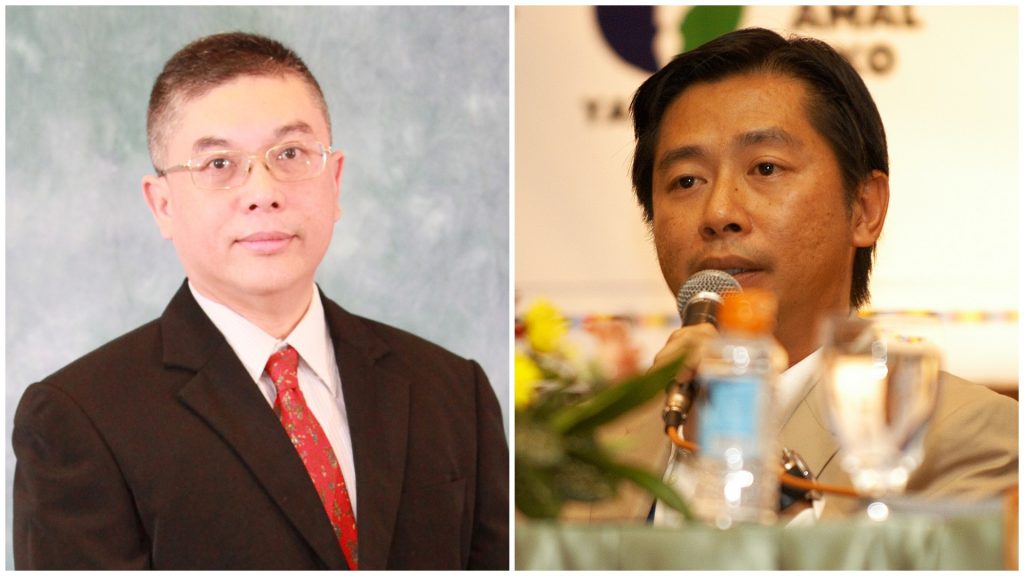
The University today announced the appointment of Professor Lionel Wee as the new Dean of its Faculty of Arts and Social Sciences (FASS) and Co-Dean of the College of Humanities and Sciences. Prof Wee will take over the helm from Prof Robbie Goh as the Faculty’s 18th Dean from 1 October 2021.
Currently FASS Vice Dean of Research and Professor of Linguistics in the Department of English Language and Literature, Prof Wee was appointed Provost’s Chair Professor in July 2017 for his outstanding scholarly achievements.
After graduating from NUS in 1988 with a Bachelor of Arts (First Class Honours) degree majoring in English Language and Sociology, Prof Wee embarked on an academic career, joining the University as a Teaching Assistant with the Department of English Language and Literature. He was awarded the NUS Overseas Graduate Scholarship where he pursued his PhD in Linguistics at the University of California, Berkeley. Prof Wee was appointed as a Lecturer upon his return to Singapore in 1995, and rose the ranks to full Professorship in 2012.
“NUS is pleased that after a rigorous global search, Prof Lionel Wee has been selected to be the next Dean. He is passionate about high quality education and research, and has an excellent understanding of FASS and the University, having served in numerous leadership roles at the department, faculty and university-levels. I am confident that he will bring the Faculty to new heights of international excellence,” said NUS President Professor Tan Eng Chye.
Besides serving as Vice Dean of Research at FASS from 2014 to present, Prof Wee was also the Head of the Department of English Language and Literature from 2010 to 2014. He had also contributed on various committees such as Chair of the FASS Faculty Promotion & Tenure Committee II, Chair of the University Mid-Term Advisory Report Committee, and Member of the University Promotion and Tenure Committee. In recognition of his dedicated service and contributions to NUS and education in Singapore, Prof Wee was awarded the National Day Awards Public Administration Medal (Bronze) in 2020 and the Long Service Medal in 2018.
“I am excited and honoured to be given this opportunity to lead my alma mater as its next Dean. Having spent more than three decades at FASS, both as a student and a faculty member, I have experienced firsthand the selfless commitment of my colleagues and impressive insights our students bring to the study of the arts, humanities and social sciences. I am confident that together, we can continue to make significant contributions to society while enhancing our Faculty’s standing as one of the leading humanities and social sciences faculties in the world,” said Prof Wee.
Besides his passion in linguistics, Prof Wee feels very strongly about animal welfare and is also very much an avid city traveller, although the pandemic has put quite a damper on travel in the past year or so. He also enjoys the cafes, a habit which he picked up during his time as a graduate student in Berkeley. Students and colleagues at FASS may have many a times seen Prof Wee deep in thought at the cafes across the NUS campus. He is very much focused in developing a particular idea or argument once he is seated down and would need to walk around before he can move on to another new idea.
Prof Wee has published widely in international and local journals, and also sits on the editorial boards of a number of academic journals and publications, including Applied Linguistics, English World-Wide, Multilingual Margins, The Journal of Asian Linguistic Anthropology, the “Cambridge Elements: World Englishes” book series, and the “Multilingualisms and Diversities in Education” book series. He is a well-respected scholar with research interests in the areas of language policy (especially in Southeast Asia), the grammar of Singapore English, metaphorical discourse, and general issues in sociolinguistics and pragmatics.
Prof Goh, who has served as the Dean since 2017, will be taking a leave of absence from the University. However, he will continue to contribute in the Singapore education sector as the new Provost at the Singapore University of Social Sciences from 1 October 2021.
Prof Goh said, “It has been a privilege and honour to serve as Dean of one of Singapore’s largest and most historied Faculties. I am grateful to my talented colleagues for all their hard work. I believe that together, we have brought the Faculty to new heights of excellence in teaching, research and service. I look forward to the work of creating new programmes and nurturing talent in my next role as Provost of the Singapore University of Social Sciences, and hope that I will also be able to forge new ties and collaborations between the two universities."
Having spent more than three decades at the University, Prof Goh has taken on numerous administrative and leadership roles outside of the Faculty. He was Deputy Director of the NUS Centre For the Arts from 1996 to 1999, and Deputy Director of the Asia Research Institute from 2008 to 2010.
“On behalf of the University, I would like to express my heartfelt appreciation to Professor Robbie Goh for his dedication and strong stewardship in leading NUS FASS. Under his visionary leadership, the Faculty has made significant contributions to the advancement of education and research in the humanities and social sciences. During his leadership, the FASS 2.0 Industry Tracks programme was started to enhance the employability of its graduates. New multidisciplinary initiatives such as the Philosophy, Politics & Economics programme were also established. The Faculty has also expanded collaborations with industry and further strengthened its high international reputation,” added Prof Tan.
This story first appeared on NUSnews on 13 August 2021. The full press release is here, and Professor Lionel Wee's biography is here.
From Careers for a Lifetime, to a Lifetime of Careers
IN BRIEF | 5 min read
-
The top skills desired by employers will include critical thinking, analysis, problem-solving and self-management skills such as active learning, resilience, stress tolerance and flexibility.
What does the future of work look like? In this evolving world, new occupations and roles which did not previously exist continue to emerge, while certain traditional skills and jobs continue to become obsolete.
The World Economic Forum’s (WEF) The Future of Jobs Report 2020 (October 2020) highlighted a few key trends.
First, technological adoption of cloud computing, Big Data and e-commerce in many businesses will accelerate the transformation of jobs, skills and entire industry value chains. 85 million jobs are expected to be displaced by a shift in division of labour from humans to machines by 2025, while 97 million new roles may emerge.
Second, online learning and training boomed during the pandemic. The shift was a watershed moment, and there is no turning back for many industries. The pandemic also brought into sharper focus the importance of lifelong learning, with more employees upskilling and reskilling to stay relevant in the volatile job market. More workers are now pursuing personal and professional development, especially in digital skills.
Last but not least, the top skills desired by employers will include critical thinking, analysis, problem-solving and self-management skills such as active learning, resilience, stress tolerance and flexibility.

What skills do employers seek?
Many of these in-demand skills highlighted in WEF’s report corroborate CFG’s Industry Insights Survey (2020). Drawing on insights from career events, industry surveys and engagements, CFG’s survey cited a similar list of soft skills that are becoming increasingly imperative at the workplace.
These are abilities learnt through life experiences that are impervious to change, and relevant across all professions and workplaces. They are attributes we take with us when we embark on job pathways in the New Normal - which are shifting from one defined career over a lifetime, to a series of dynamic and rapidly changing careers.
Our survey clusters these abilities into two main categories: Personal Qualities and Workplace Traits.
Personal qualities
Many employers are looking for individual cognitive abilities such as problem-solving, learning agility and pattern-recognition. They are also seeking graduates who are equipped with design and computational thinking, as well as proficiency in quantitative analysis.
They want graduates who are able to look at problems from different perspectives, to solve complex problems in real-world environments. For example, can a customer service issue be resolved with a combination of user interface design changes, IT infrastructure automation and manpower staffing? What are consumer consumption patterns and behaviours telling us?
Employers also seek character traits such as curiosity, resilience, empathy, proactivity, leadership and adaptability. These traits are predictors of future potential, and potentially determine career longevity and progression. For example, are you curious to learn what other teams or functions are doing beyond your job scope and discover potential synergies? Are you adaptable to changes in your project scope, and possess a “can-do” attitude in the face of obstacles?
Workplace traits
Besides personal qualities, employers are also looking for graduates who possess certain desirable workplace traits. These include good communication and presentation skills, cultural sensitivity and a global mindset. Graduates with business acumen, who are able to influence and negotiate, and are competent in managing different teams and projects, are much sought after.
These attributes mirror the realities of the modern workplace, where teams and projects are becoming more diverse, cross-functional, cross-cultural and business-driven. For example, can you work with a diverse team of colleagues towards achieving a common objective? Can you visualise your organisation’s business potential in an overseas market or a new customer segment?
The call to CHS students
In CHS, you will acquire interdisciplinary knowledge and skills by learning how to draw connections, links and insights across diverse disciplines. It is this important foundation of interdisciplinarity that will better prepare our students to become problem-solvers in an uncertain world beyond the pandemic.
Even as the pandemic has accelerated digital transformation, data is now the new asset that enables businesses to enhance efficiency and augment the ability of their teams to deliver greater value. CHS will focus on competencies like data literacy and design thinking, skills that are now in high demand by industries seeking to unlock value from Big Data.
Beyond academics, internships are one of the best ways to hone workplace experience. When you are on vacation, aim for at least two (if not more) internships, preferably one with an overseas employer. Immerse yourself in co-curricular activities, which provide hands-on opportunities to gain skills such as leadership, teamwork and project management. These experiences in your resume and portfolio will place you in a better stead with employers.

Enhancing employability, preparing for careers
CHS students will have a dedicated Career Advisor, who will guide you through the process of developing a personal career plan. You will be pre-assigned a career preparation course, Career Compass, closely following CFG’s four-year Career Readiness Roadmap which provides a formal framework for your career planning during your undergraduate journey.
You will be enrolled in Career Catalyst, a foundational freshmen course that identifies your core strengths and enhances your profile towards securing an internship. As you progress to Years Two/Three and your final year, you can also sign up for our Career Booster workshops or Career Advancement Webinar Series (CAWS).
Article contributed by the Centre for Future-ready Graduates (Ms Joan Tay, Director and Career Advisors Mr Ryan Ang and Mr Ng Buck Seng)
This story first appeared on CHS on 29 July 2021.
NUS CHS Case Competition: Driving EV Adoption in Singapore
IN BRIEF | 1 min read
- The just-released problem statement for NUS CHS' inaugural Case Competition – Encouraging electric vehicle (EV) ownership in Singapore – is an important real-world topic of especial relevance to us all, as the nation is driving toward a future of electric mobility that is essential to the Singapore Green Plan 2030.

Are you interested in translating your innovations to reality by applying interdisciplinary knowledge and skills?This is now possible with the inaugural College of Humanities and Sciences (CHS) Case Competition, launched on 26 July.
The competition is specially designed for NUS students, and enables participants to synthesise ideas and perspectives from different disciplines to solve complex, real-world challenges.
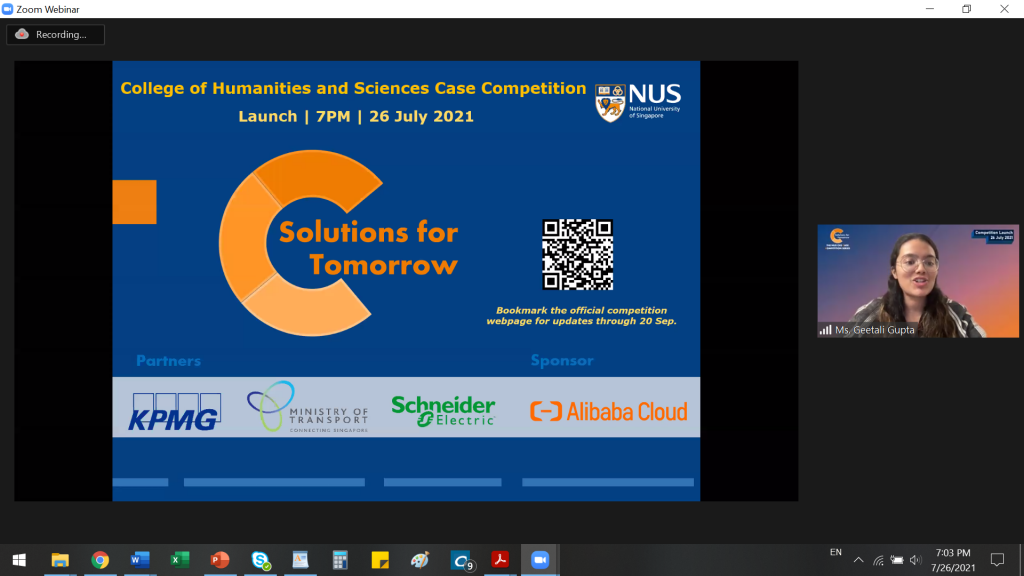
The competition themes, “Sustainability” and “Technology and Us”, are highly topical today. The problem statement - Encouraging electric vehicle (EV) ownership in Singapore - is an important real-world topic, even as Singapore ushers in a future of electric mobility as a key piece of the puzzle in the Singapore Green Plan 2030.
At the virtual launch, our competition partners - the Ministry of Transport, KPMG and Schneider Electric - discussed plans by the Singapore government to usher in the future of EV, Schneider Electric’s vision of a 100% electric mobility future with net-zero carbon emissions and upcoming trends in mobility solutions identified by the advisory arm of KPMG.
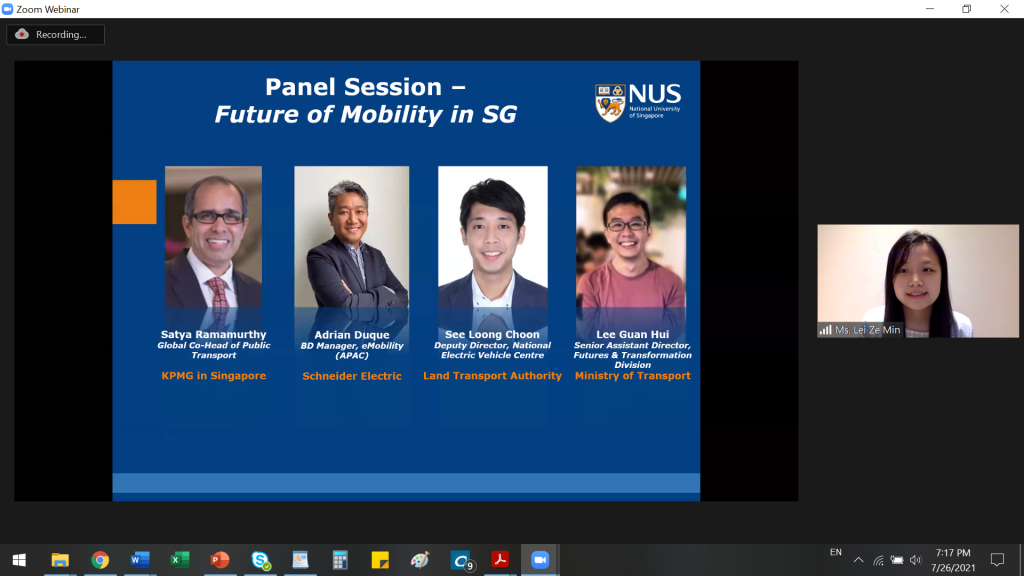
Participants will have the opportunity to attend mid-term workshops in mid-August, which provide important domain knowledge, including engineering and design, and communications skills.
The project submissions will be judged in the final round of the competition on 20 September by representatives from our competition partners. They will also be sharing their EV domain expertise with the participating teams throughout the competition.
The launch was attended by more than 100 participating teams (close to 200 individual attendees) from across NUS.
Find out more about the competition here and read the problem statement here.
Strong Interest in Interdisciplinary Learning With High Acceptance Rates
IN BRIEF | 5 min read
-
NUS President Professor Tan Eng Chye discusses the University’s recent interdisciplinary initiatives – the setting up of the College of Humanities and Sciences (CHS) and the new Common Curriculum for the Faculty of Engineering and the School of Design and Environment – and the importance of lifelong learning in ensuring that students are adaptable and future-ready.
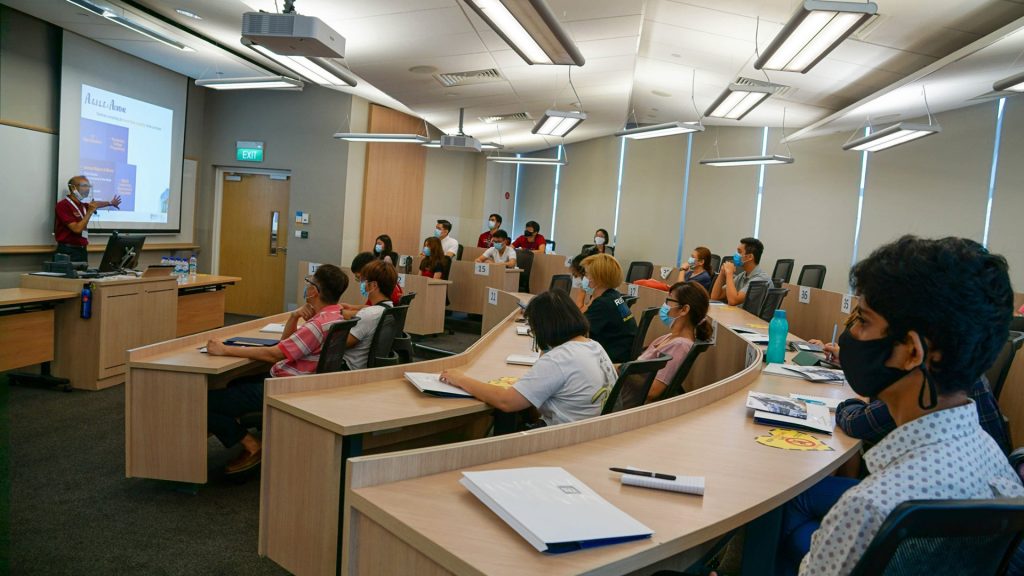
In today’s volatile, uncertain, complex and ambiguous (VUCA) world, staying stagnant is never an option. Now, more than ever, universities have to prepare students to thrive in a fast-changing and unpredictable post-COVID reality through an interdisciplinary education.
Just ask the incoming batch of freshmen, who have given a thumbs-up to the University’s recent interdisciplinary initiatives – specifically, the setting up of the College of Humanities and Sciences (CHS), and the new Common Curriculum for the Faculty of Engineering and the School of Design and Environment.
During the admissions exercise this year, 71 per cent of those who had applied to these programmes as the first choice accepted the offer. Among the incoming batch of freshmen, over 4,000 will be exposed to an interdisciplinary education. By August 2022, NUS hopes to push this number to more than 6,000.
“We are quite heartened that the applicants have responded very well,” said NUS President Professor Tan Eng Chye, as he spoke on the new changes in NUS’ curriculum. “They are receptive to the flexibility that they will have. No more are you confined to one discipline.”
Prof Tan noted that the world faces many wicked problems that cannot be solved with only one discipline.
He cited COVID-19 as a wicked problem, requiring more than just medical sciences to solve. “Even with the right medical knowledge, many countries had difficulties handling COVID-19 and its spread,” he noted.
The pandemic, in fact, prompted NUS to ramp up efforts in remodelling its educational philosophy and pedagogies to prepare its graduates for this dynamic reality.
At the centre of these reforms is the push for lifelong learning, as well as the shift towards interdisciplinary education to ensure students are adaptable and future-ready.
A lifetime of learning
While universities used to prepare their graduates for a single job, this approach is fast becoming obsolete. Today, graduates will change jobs at least 10 times over the course of their lifetime.
In line with this trend, NUS has been future-proofing its education to prepare students for lifelong learning.
“A student’s enrolment is valid for 20 years from the point they enter the university,” Prof Tan explained. “We want to remove the conception that university is only for four years. You can always come back to (NUS) to learn new skills and knowledge.”
For instance, the NUS Lifelong Learners (L3) programme upskills alumni through a wide array of skill-based, industry-relevant courses, carefully tailored to focus on emerging skills identified under SkillsFuture such as data analytics or digital literacy.
The process of returning to NUS for further studies is also made seamless. If a student does not complete a second major or degree in their initial four years, they are welcome to return to the university to read the necessary remaining courses even after graduation.
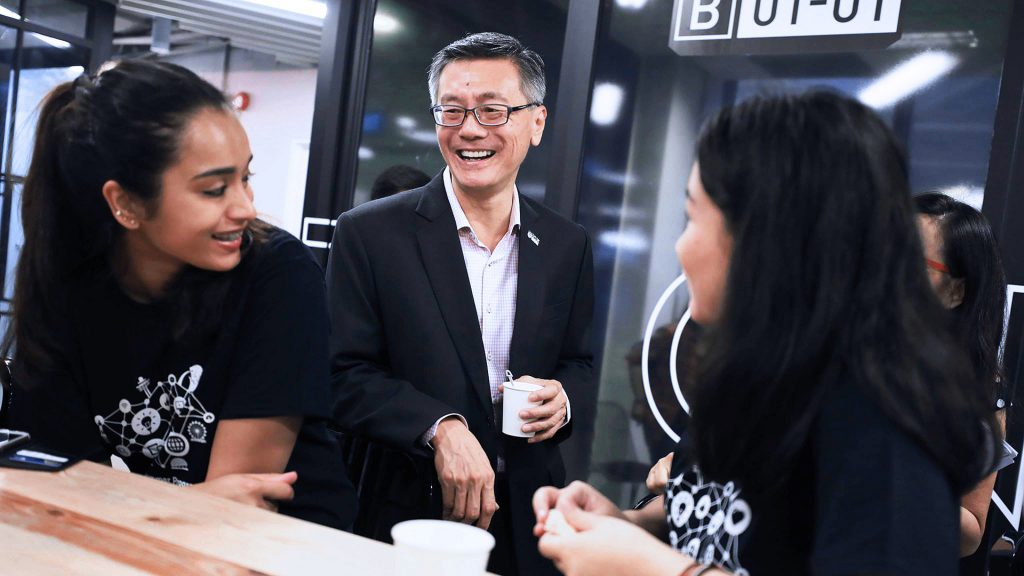
Towards interdisciplinary learning
Recognising the benefits of interdisciplinary learning, NUS is rolling this out to more students.
This started with the launch of CHS, which brings together the Faculty of Arts and Social Sciences and the Faculty of Science.
In the upcoming semester, CHS will admit 2,200 students and they will take a new Common Curriculum within their first three semesters – consisting of integrated courses with a problem-based pedagogy.
Similarly, a Common Curriculum has been introduced for the Faculty of Engineering and the School of Design and Environment to encourage knowledge transfer between the two complementary disciplines.
For instance, NUS’ very own net-zero energy building at SDE4 is a product of melding both architecture and engineering – the first of its kind in Singapore.
“The building’s beautiful architectural design alone doesn’t contribute to it being net-zero energy. What you have is a lot of deep engineering work embedded into it. It shows that architects have to work very closely with engineers in order to achieve this,” explained Prof Tan.
With interdisciplinary learning, the proportion of Unrestricted Elective courses a student can take has also been increased to up to 30 per cent, encouraging students to have two or more specialisations.
In the four faculties that now have an interdisciplinary common curriculum, this works out to more than 700 possible double major pairings, 1,700 major-minor pairings, and 100,000 major with double minor combinations.
Expanding choices for students
Ultimately, these educational innovations create greater flexibility for students to curate their own curriculum.
They will no longer have to make an immediate commitment to a single discipline. Instead, they are given time to decide on their academic calling through the common curriculum.
These efforts are central to NUS’ flagship role as a creator, integrator and propagator of knowledge.
Looking ahead, the structural barriers between faculties will further dissolve, allowing students to build even broader connections between disciplines.
“Right now, we have 70 majors and 80 minors, but we may actually have more as we go along. We start with a minor. If there’s enough interest, we push it to a second or full major. The possibilities are endless especially as we move online,” said Prof Tan.
This story first appeared on NUSnews on 26 July 2021.
Creating New Internship Opportunities: Engaging Employers to See Value in Humanities and Social Sciences
IN BRIEF | 4 min read
-
Mr Jonathan Sim, instructor from the Department of Philosophy, describes how he engaged with local employers to open internship opportunities to humanities and social sciences students who would not previously have been considered.

Humanities and social science majors are frequently misunderstood, in Singapore as in many other parts of the world. The value of their education is regularly questioned, and many employers are unaware of the value such majors can bring to the table. They prefer to hire graduates with more explicitly “practical” degrees for jobs that humanities and social sciences students could excel in.
As a result, humanities and social sciences students are not typically considered for many organisations and roles, despite offering relevant and useful skills.
So when developing an internship course, I began reaching out to organisations to create internship opportunities in such roles, to boost receptivity to hiring students from these disciplines. This enabled potential employers to better understand how students in subjects they might have previously overlooked can fill gaps in their talent pool.
Compounding the issue is that many humanities and social sciences students are unaware of the diversity of careers available to them and tend to limit themselves to roles stereotypical of their majors. There is a good reason for this. When these students apply for non-stereotypical roles, they are often turned down due to having an “impractical” major.
I regularly hear employers and people in the corporate sector lamenting the lack of creativity and critical-thinking and communication skills in their industries. These key capabilities are needed to challenge assumptions, innovate and improve processes within organisations. Employers’ lack of awareness of the value of humanities and social sciences is preventing them considering this potential talent pool.
Starting an internship course
I teach a course on data analysis and philosophical reasoning to hundreds of students each semester. With so many students under my charge, I was inspired by the idea that education is more than just about imparting knowledge. Rather, it is about facilitating growth in one’s students by providing them with opportunities for challenge and development.
As a result, I decided it would be worthwhile to experiment with an internship course where I approach employers, explain the value my students can bring to their organisation and ask them to offer temporary roles not typically filled by humanities and social sciences majors. A model designed to be mutually beneficial to both employers and students.
Here are my key lessons in how to do this:
Start by approaching contacts working in human resources (HR) and ask them to link you up with senior management or with department heads of your target companies. I initially spoke to friends in HR and some of them linked me up with HR professionals from other organisations.
Provide reassurance that you will be guiding and mentoring the students throughout the programme. My credentials as a university educator meant employers were generally open to exploring this strategic partnership.
Prepare and present a pitch clearly describing what value and skills your students can bring to the companies where you wish to secure internships. I explained how my students were excellent in data analytics, coding and problem-solving, and their training in humanities and social sciences meant they could bring unique perspectives thanks to creativity and critical thinking. Having worked with the students for one semester already, I could also vouch for their character, including attributes such as work attitude, independence and willingness to learn.
Discuss the job scope and be honest and realistic about what your students can and cannot do. I helped advise the hiring managers on my students’ capabilities, based on what I had taught them, and sometimes this meant suggesting new items in the job scope that the organisation may not have considered.
Invite students to apply for the roles available by submitting their CVs, then interview shortlisted candidates. I found interviews useful to get a better understanding of what students wanted to do and what they hoped to achieve during the internship. The application process also provided an opportunity to work with students to improve their CVs and interview skills before they spoke to employers.
Try to match students with internship roles that will best suit their personality, skills and career aspirations.
During the internships, check in on students regularly and ask them to share any challenges, so you can help them troubleshoot any issues. My role was more like an adviser pointing them to resources or giving life advice on how to handle novel social or professional situations.
Ask the students to write reflections centred on how their training in humanities and social sciences can be applied to the work they do as an intern. This helped me gauge the extent of their learning but also nudged students towards deeper reflection on their discipline to see its value and relevance in the work they did. It was very eye-opening to see concrete examples of how students found connections and applications between their studies and their work.
Benefits to organisations and students
These collaborations have proven mutually beneficial. They allow participating organisations to develop strategic partnerships with the university, helping employer branding and making it easier for them to attract talent.
At the same time, the student interns become living proof to employers that their major makes them as good as, if not better than, some students from more “practical” disciplines. The internships help inform humanities and social sciences students that they can take on roles they never thought were open to them.
We have completed one round of internships with organisations such as Henkel, a German multinational chemical and consumer goods company, and Azendian, a local AI data analytics start-up.
Students were pleased with the chance to take up roles they would not have ordinarily pursued, or been given a chance to try, in areas such as supply chain and logistics management, database management and data analytics for marketing. The internships provided profound insights on how they can apply the skills from their majors in ways that allow them to craft a niche in such roles.
The first round of placements seems to have persuaded employers to be more receptive when it comes to hiring humanities and social sciences students, as they have asked for more interns in subsequent iterations.
This is just the beginning, and there is a lot more that we can achieve in our capacity as university faculty by engaging with local organisations and employers. We can work to create more internship opportunities and help employers better understand the capabilities of our students across multiple disciplines here in Singapore and further afield.
This story first appeared on Times Higher Education on 21 June 2021.
Commencement 2021: Special Message of Congratulations to the Classes of 2020 and 2021!
IN BRIEF | 3 min watch
-
FASS Faculty and students congratulate the Classes of 2020 and 2021 and wish them all the best as they go out to change the world for the better!
“We believe in you. I believe in you. Go out there, do us proud. Make the world a better place.” — Associate Professor Loy Hui Chieh, FASS Vice Dean of External Relations and Student Life FASS, joint committee member of the NUS Philosophy, Politics, and Economics (PPE) programme, and also Faculty member of staff at the NUS Department of Philosophy.
Faculty and students talk about what life has been for them this past year, what they miss about campus life, and extend words of advice and congratulations to the graduating Classes of 2020 and 2021.
This video features Assoc Prof Loy and Dr Lohsnah Jeevanandam, Senior Lecturer, NUS Department of Psychology, as well as students from the graduating Classes of 2020 and 2021: Alvarez Brielle Clavel ('20); Somesh s/o Sailesh ('20); Douglas Ong ('20), Christina Chen (Doctoral Class of '20); Ng Qian Qian ('21); and, Lai Wei Na ('21).
Meet the Neighbours: The Seven Animals You’ll Spot in NUS
IN BRIEF | 5 min read
-
NUS is not only a second home for staff and students, but also a place for a wide range of biodiversity to call home. Mr Athanasius Koh, a management trainee with the NUS Faculty of Arts and Social Sciences (FASS) and FASS Political Science alumnus ('21) tells us about the interesting animals he has spotted around campus.
Beyond the lecture theatres, classrooms and student hangout spots, it is hard to miss the lush greenery that surrounds NUS. This has made the campus environs not only a second home for staff and students, but also a place for a wide range of biodiversity to call home.
These habitats are here to stay too. Emphasising NUS’ commitment to preserving its rich biodiversity, fighting climate change and being an environmentally responsible campus, the “Planting 10,000 Trees” initiative launched by NUS President Professor Tan Eng Chye in 2018 saw 500 mature trees planted throughout the campus, as well as 9,500 saplings nurtured in the NUS nursery. In addition, a strict policy to protect existing trees was also implemented.
Mr Athanasius Koh, a management trainee with the NUS Faculty of Arts and Social Sciences (FASS) Corporate Communications team for the past six months, and avid nature photographer, takes regular photo walks exploring these habitats. Mr Koh, who is also from the FASS Class of 2021, shares about the interesting animals he has spotted along the way.
Collared Kingfisher (Todiramphus chloris)
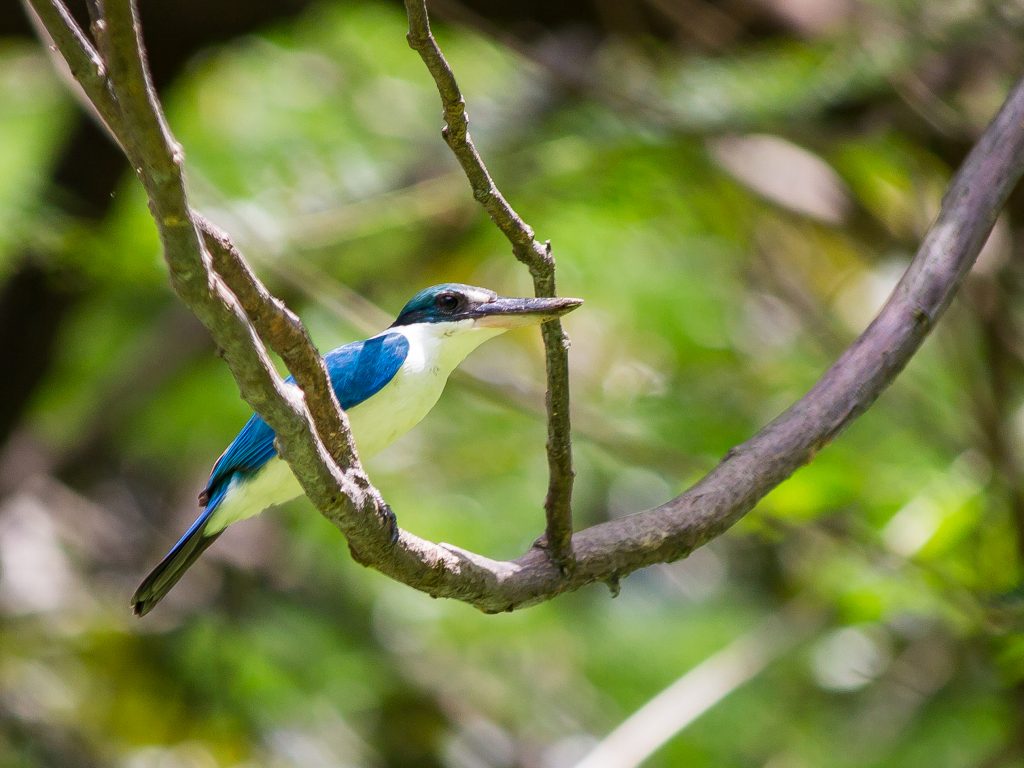 A collared kingfisher perched on a tree at AS8. (Photo: Mr Athanasius Koh)
A collared kingfisher perched on a tree at AS8. (Photo: Mr Athanasius Koh)
Dressed in beautiful blue feathers and a broad white “collar” around its neck, the collared kingfisher is a vocal bird spotted about campus with its series of harsh “kee-kee” notes, described by some as a maniacal laugh.
The collared kingfisher has also been quite the icon in Singapore’s history, gracing not only stamps but even the now decommissioned $10 note as part of The Bird Series Currency Notes from 1976 to 1984.
Look out for the collared kingfisher’s outstanding blue plumage as it rests atop trees and lamp posts. This sharply dressed celebrity is an easy spot around FASS and NUS Faculty of Engineering.
Red Junglefowl (Gallus gallus)
 Male red junglefowls proudly flaunt their dark green tail feathers and black primary feathers. (Photo: Mr Athanasius Koh)
Male red junglefowls proudly flaunt their dark green tail feathers and black primary feathers. (Photo: Mr Athanasius Koh)
Even if you have never personally caught sight of the resident FASS red junglefowl, you are more than likely to have heard its signature “cock-a-doodle-doo” around the faculty. Often confused for the domestic chicken, the red junglefowl is in fact its wild ancestor.
According to a study led by NUS ornithologist Associate Professor Frank Rheindt, the red junglefowl can be quite easily distinguished from the domestic chicken. Male red junglefowls proudly flaunt their dark green tail feathers and black primary feathers while females have distinguishing grey legs and sport black primary feathers.
While it remains a mystery why it crosses the road, the red junglefowl and its loud presence has certainly captured the attention of students and staff alike.
Plantain Squirrel (Callosciurus notatus)
 A plantain squirrel resting on a tree behind AS4. (Photo: Mr Athanasius Koh)
A plantain squirrel resting on a tree behind AS4. (Photo: Mr Athanasius Koh)
Scurrying and leaping from tree to tree, the plantain squirrel is an adorable sight if you are lucky to observe one at rest or enjoying its meal. This active animal is one of the most common mammals in Singapore and can be identified by distinctive black and white stripes on the sides of its body and its long bushy tail.
These physical features might have you thinking what a beautiful squirrel it is, and you are not alone! In fact, Callosciurus, the plantain squirrel’s taxonomic group, translates to “beautiful squirrel”.
Blink and you just might miss this nimble creature, but the plantain squirrel can be commonly found on the trees around NUS such as at the NUS Faculty of Science. Listen out for the rustling of leaves and you just might come face-to-face with this lovable rodent.
Rose-Ringed Parakeet (Psittacula krameri)
 A rose-ringed parakeet perches on a branch after breakfast along the AS6-AS8 walkway. (Photo: Mr Athanasius Koh)
A rose-ringed parakeet perches on a branch after breakfast along the AS6-AS8 walkway. (Photo: Mr Athanasius Koh)
Often moving in flocks and squawking in unison, the rose-ringed parakeet is a loud presence in NUS. Sporting a bright green plumage, orange beak and blue-tipped tail, males also have an added pink collar around their neck in their third year.
The rose-ringed parakeet was introduced to our green spaces as escaped pets. Native to the Indian subcontinent and northern Southeast Asia, it is a resilient bird that has thrived even in locations as far as Europe!
A bird that you might hear before you see, the rose-ringed parakeet has been spotted on sunny mornings at FASS’ Lovers’ Park and along the walkway between Blocks AS6 and AS8 grabbing its breakfast.
Yellow-vented Bulbul (Pycnonotus goiavier)
 The Yellow-vented Bulbul is easily distinguishable from its black eye-mask, olive-brown back and yellow undertail (Photo: Mr Athanasius Koh)
The Yellow-vented Bulbul is easily distinguishable from its black eye-mask, olive-brown back and yellow undertail (Photo: Mr Athanasius Koh)
One of the most common birds in Singapore’s many green spaces besides the mynah, the yellow-vented bulbul is an easy spot with its black eye-mask, olive-brown back and wings and most strikingly, yellow undertail.
An unfussy fellow, the yellow-vented bulbul has been observed to feed on a variety of small fruits and insects. In addition, it can sometimes be seen carrying strips of man-made waste like plastic bags and tissue paper to be used as nesting material. You might have heard its distinct chirps before, without knowing that it was the yellow-vented bulbul, but now you can keep an eye out for them too! Spot them in shrubs and trees around campus, such as the patch of greenery right outside NUS Press at Block AS3.
Changeable Lizard (Calotes versicolor)
 Adult male changeable lizards develop an orange-coloured head and black patches over their cheeks during the mating season (Photo: Mr Athanasius Koh)
Adult male changeable lizards develop an orange-coloured head and black patches over their cheeks during the mating season (Photo: Mr Athanasius Koh)
Often mistaken for the chameleon, the changeable lizard definitely is not one at all, but that does not stop it from changing its colours when it needs to! Usually brownish to greenish yellow with faint stripes along its body, adult males develop an orange-coloured head and black patches over their cheeks during the mating season.
As common as this rapid reptile is, you might be surprised to know that it is not native to Singapore. It is believed that it was accidentally introduced in the 1980s and has since populated in numbers, aggressively displacing the native green crested lizard (Bronchocela cristatella).
While the changeable lizard is somewhat adept at camouflaging, its timid nature means that you are more likely to find it scurrying away the moment there is a slightest disturbance, rustling up the grass. They can be seen all around campus such as at the FASS Fragrant Plant Garden or outside The Deck.
Oriental Pied Hornbill (Anthracoceros albirostris)
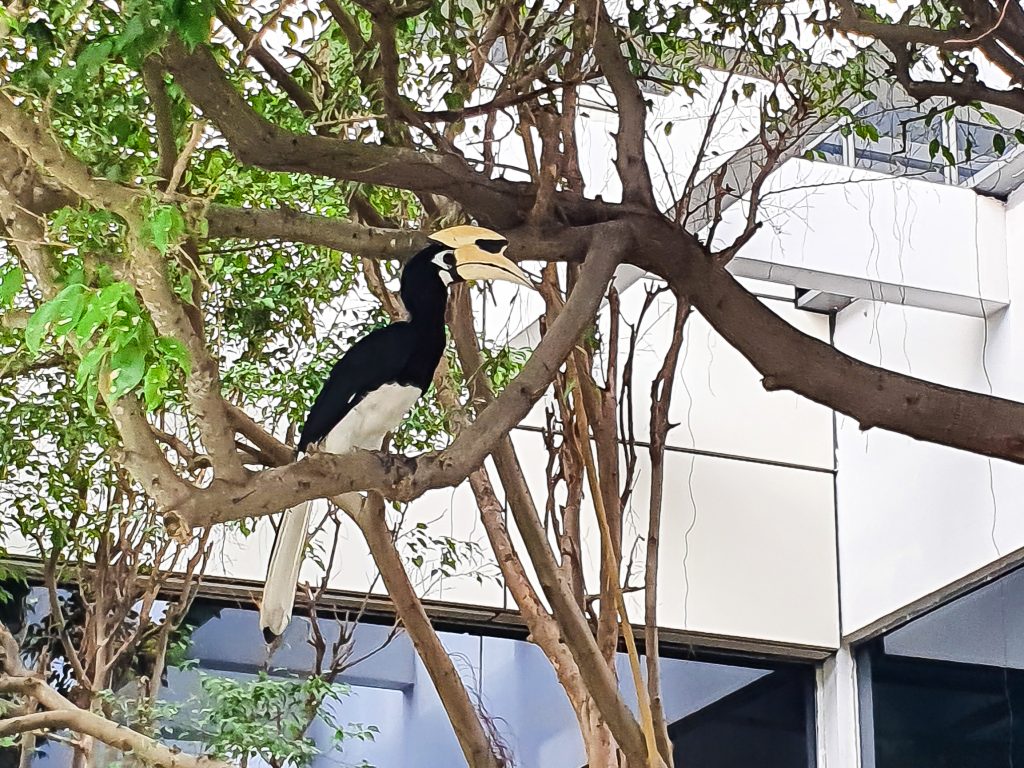 An oriental pied hornbill perches on a tree outside of AS7, Shaw Foundation Building. (Photo: Mr Athanasius Koh)
An oriental pied hornbill perches on a tree outside of AS7, Shaw Foundation Building. (Photo: Mr Athanasius Koh)
The oriental pied hornbill has certainly made an impactful comeback to Singapore’s shores. Once thought to be locally extinct, the large bird can be identified by its casque atop its beak as well as its black and white plumage.
Along with other “celebrity wildlife” like the otters in Singapore, the oriental pied hornbills’ return to the mainland can be largely attributed to conservation efforts by the National Parks Board, Wildlife Reserves Singapore and the local research community. These efforts include providing sufficient mature trees for hornbills that favour nesting in tree holes.
Spotted across a number of locations in Singapore, NUS is no exception. It has been spotted in University Town and around FASS Block AS1 as well as the trees outside AS7, Shaw Foundation Building.
Now that you have met some of the interesting wildlife that have called NUS their home, be sure to keep an eye out for our neighbours in nature between classes! Do appreciate them from a safe distance and refrain from feeding them.
This story first appeared on NUSnews on 17 June 2021.
NUS CHS Case Competition: Solutions for Tomorrow
IN BRIEF | 1 min read
- The NUS College of Humanities and Sciences has launched the Case Competition Series. Register your interest now!
 The NUS College of Humanities and Sciences has launched the Case Competition Series, which seeks to encourage undergraduate and post graduate students to apply their curriculum learning to tackle complex real-world challenges that require interdisciplinary approaches to their solution. The students, who are expected to work in teams comprising members from across different disciplines, will be presented with a complex problem (to be shared at the start of the competition in late July), and given four weeks to build their cases in consultation with participating industry and Faculty advisers before their presentation for the first round of judging. Scan the QR code below or just click here to register your interest as team leader for this competition now. More details will be released to participants next month.
The NUS College of Humanities and Sciences has launched the Case Competition Series, which seeks to encourage undergraduate and post graduate students to apply their curriculum learning to tackle complex real-world challenges that require interdisciplinary approaches to their solution. The students, who are expected to work in teams comprising members from across different disciplines, will be presented with a complex problem (to be shared at the start of the competition in late July), and given four weeks to build their cases in consultation with participating industry and Faculty advisers before their presentation for the first round of judging. Scan the QR code below or just click here to register your interest as team leader for this competition now. More details will be released to participants next month.
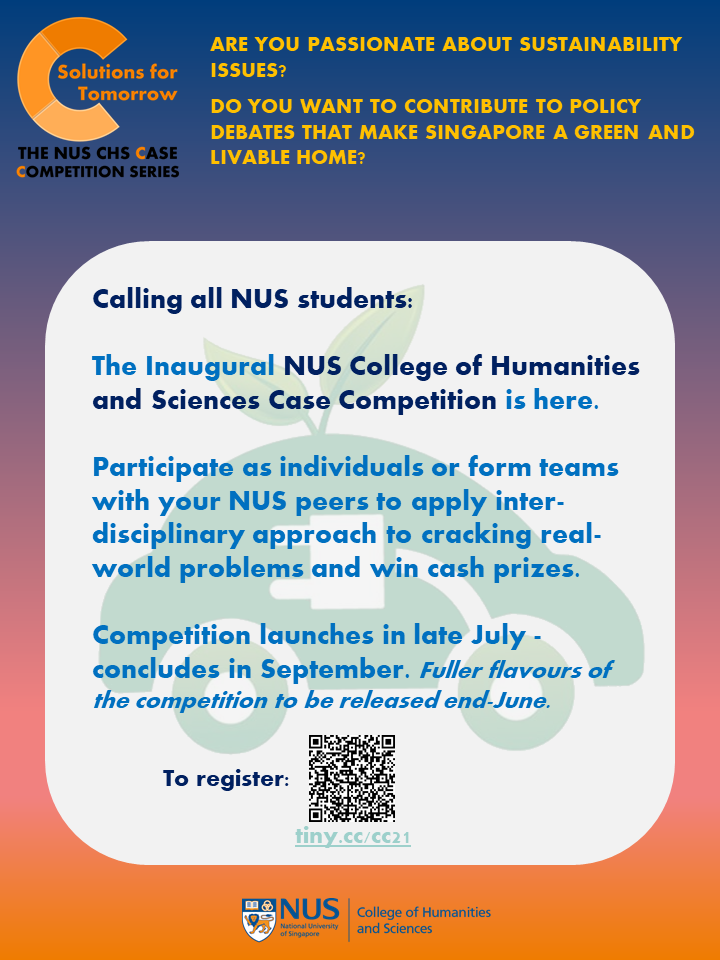
ISA Diplomatic Studies Section Article Prize for 2021
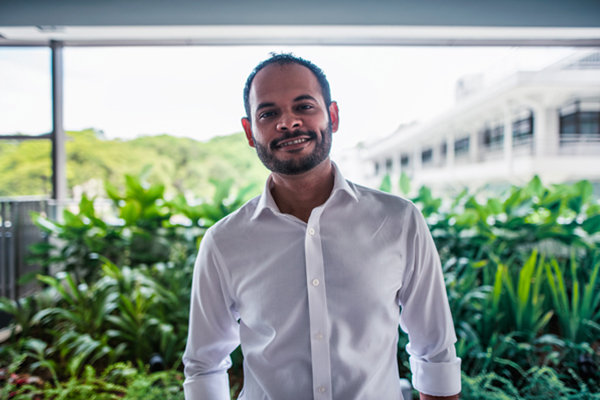
We would like to congratulate Assistant Professor Deepak Nair from the Department of Political Science on winning the the award "ISA Diplomatic Studies Section Article prize" for an article published in International Political Sociology titled "Sociability in International Politics: Golf and ASEAN's Cold War Diplomacy."
The ISA Diplomatic Studies Section Article prize "is presented to the author(s) of the article that best advances the theoretical and empirical study of diplomacy."
Details of this award and past recipients:
The article has been ungated by IPS and is available here https://academic.oup.com/ips/article/14/2/196/5571378
Honouring five outstanding alumni from Arts and Social Sciences
IN BRIEF | 3 min read
- Five exceptional NUS Faculty of Arts and Social Sciences (FASS) alumni from diverse backgrounds were lauded at the annual FASS Distinguished Arts and Social Sciences Alumni Awards 2020 in a simple presentation ceremony on 30 April at Swissotel The Stamford.
 (From left to right): FASS alumni Mr Yatiman Yusof, Mr Niam Chiang Meng, Ms Lim Sau Hoong, Mr Ravi Menon and Dr Liang Wern Fook have made singular contributions to the areas of the arts, education, media, finance, policy and community development.
(From left to right): FASS alumni Mr Yatiman Yusof, Mr Niam Chiang Meng, Ms Lim Sau Hoong, Mr Ravi Menon and Dr Liang Wern Fook have made singular contributions to the areas of the arts, education, media, finance, policy and community development.
Five exceptional NUS Faculty of Arts and Social Sciences (FASS) alumni from diverse backgrounds were lauded at the annual FASS Distinguished Arts and Social Sciences Alumni Awards 2020 in a simple presentation ceremony on 30 April at Swissotel The Stamford.
All have left their distinct mark in the wide-ranging fields that they serve. They are namely:
- Mr Yatiman Yusof (Geography and Malay Studies, ’72), Non-Resident High Commissioner of Singapore to Kenya
- Mr Niam Chiang Meng (Economics, ’83), Chairman of the Maritime and Port Authority of Singapore (MPA)
- Ms Lim Sau Hoong (Chinese Studies, ’83), Founder, Former CEO and Executive Creative Director of advertising agency 10AM Communications
- Mr Ravi Menon (Economics, ’87), Managing Director of the Monetary Authority of Singapore (MAS)
- Dr Liang Wern Fook (Chinese Studies, ’89 and Master of Arts, ’92), Writer, musician and educator
Congratulating the award recipients, FASS Dean Professor Robbie Goh said, “Ms Lim Sau Hoong, Dr Liang Wern Fook, Mr Ravi Menon, Mr Niam Chiang Meng and Mr Yatiman Yusof, have made singular contributions to the arts, education, media, finance, policy and community development. Not only do their wide-ranging achievements bring pride to the FASS family, but I believe that it also attests to the disciplinary range, intellectual curiosity and critical thinking that are the hallmarks of the FASS educational experience.”
This disciplinary diversity, Prof Goh elaborated, would soon be enhanced by FASS’ partnership with the NUS Faculty of Science in the NUS College of Humanities and Sciences (CHS) where students would be able to choose any major that is offered by both faculties. He added that this would be a major boost to FASS students’ educational experience as “the CHS common curriculum will prepare students for a disruptive world – by giving them a compulsory grounding in essential skills such as writing and communication, data literacy, digital literacy, design thinking and AI.”
Our alumni and their contributions
 Present at the ceremony were (clockwise from top left): FASS Dean Prof Robbie Goh; Mr Menon; Dr Liang; Mr Bernard Toh, Director of NUS Alumni Relations; Mr Niam; Ms Lim; Mr Yatiman; and NUS President Prof Tan Eng Chye.
Present at the ceremony were (clockwise from top left): FASS Dean Prof Robbie Goh; Mr Menon; Dr Liang; Mr Bernard Toh, Director of NUS Alumni Relations; Mr Niam; Ms Lim; Mr Yatiman; and NUS President Prof Tan Eng Chye.
A teacher and a journalist early on in his career, Mr Yatiman served key government appointments including as a Member of Parliament and Senior Parliamentary Secretary of the Ministry of Foreign Affairs and the then-Ministry of Information and the Arts, before his retirement in 2006. In addition to being Singapore’s non-resident envoy to Kenya, Mr Yatiman is a Board Member of the Singapore Press Holdings Foundation and the Chairman of the Malay Language Council of Advisors.
Contributing extensively to the public sector too was Mr Niam who served in the Ministries of Finance, Trade and Industry, Health, Law, and Information, Communications and the Arts – including Permanent Secretary appointments in several of these Ministries. He also served at the National Population and Talent Division, and the National Climate Change Secretariat. Aside from his current MPA chairmanship, Mr Niam is also the Chairman of Gardens by the Bay Pte Ltd and MediaCorp Pte Ltd.
A heavyweight in the media, marketing, and advertising industry, Ms Lim’s creative leadership of 10AM Communications has garnered over 300 prestigious global awards including The One Show, the Clio Awards, and the Communication Arts. Identified for her unique creative talent, Ms Lim was Visual Advisor to the Planning Committee for the 2008 Beijing Olympics’ Opening Ceremony and headed the Shanghai World Expo 2010 Singapore Pavilion Advisory Panel. In 2007, Ms Lim was awarded the President’s Design Award and was named Designer of The Year for her extensive contributions to media, marketing and culture in Singapore.
Prior to his appointment at MAS, Mr Menon served as Permanent Secretary at the Ministry of Trade and Industry, and Deputy Secretary at the Ministry of Finance. A recipient of the Singapore Government’s Meritorious Service Medal and Public Administration (Gold) Medal, he has served on boards in the public, private, and people sectors. He is currently Chairman of the Institute of Banking and Finance, and serves on the Board of Trustees of the Singapore Indian Development Association.
A singer-songwriter, poet and academic in Chinese literature and language, Dr Liang is a respected cultural figure and pioneer of Xinyao – a movement of locally composed Mandarin pop songs from the 1980s. To date, Dr Liang is the only artist who has received the National Arts Council’s Young Artist Award (Literature) and the prestigious Cultural Medallion (Music) across different art genres. He was also honoured recently with the Singapore Chinese Cultural Contribution Award for his outstanding contribution to the promotion, enrichment and development of Chinese Singaporean culture. His canon of work includes over 15 publications of literature, more than 200 songs, and two Mandarin musicals – a number of his most important works were written and composed during his university days.
On receiving the awards
Also present at the event was NUS President Professor Tan Eng Chye who presented the awards to the five alumni. Invited guests were also treated to videos of the award recipients who shared about their university days in FASS and their career highlights.
Recalling the moment he received news of the award, Mr Yatiman humbly shared, “To be frank, I’m quite surprised when I was told about it. And I thought there are hundreds, if not thousands of people who are more suitable to receive this award. I’m just a small worker in the community, not doing much in my lifetime. I think there are many others. So, for those who’ve been working hard for the good of the community, I take this award as recognition of their effort too.”
Mr Niam recalled some of his best memories were during university days where he learnt a lot about networking and life skills. It was also where he found his life partner. He said, “It is a privilege to be given this award. I would like to thank NUS and the organising committee for bestowing this honour on me and the other recipients…it means a great deal.”
 Taking the form of a rising star, the alumni award represents the inspiration these individuals bring to society through their brilliant contributions towards the Faculty, University and Singapore.
Taking the form of a rising star, the alumni award represents the inspiration these individuals bring to society through their brilliant contributions towards the Faculty, University and Singapore.
Established in 2015, the Awards recognise individuals for their distinguished scholarship and outstanding service to the Faculty, the University and Singapore. These outstanding recipients have made significant impact in various fields locally and internationally, which has contributed to the betterment and promotion of the arts and social sciences.
Previous recipients of the Awards include luminaries such as former President Mr S R Nathan, Emeritus Senior Minister and former Prime Minister Mr Goh Chok Tong, former United Nations Under-Secretary General Dr Noeleen Heyzer; Permanent Member of the Presidential Council for Minority Rights Mr Abdullah Tarmugi; and Executive Chairman of Banyan Tree Holdings Limited Mr Ho Kwon Ping.
Click here for more details on this year’s award recipients.
This story first appeared on NUSnews on 6 May 2021.
Singapore through the years: A digital cartographic record
IN BRIEF | 3 min read
- Professor Taylor and Associate Professor Feng Chen-Chieh, along with their department colleagues at NUS Geography, created Historical Maps of Singapore, an online resource hosted by NUS Libraries that provides a series of maps of different scales dating from 1846 to 2010.
 A plan of Singapore town and the adjoining districts produced by John Turnbull Thomson, a Government Surveyor, and published by J.M. Richardson in London in 1846.
A plan of Singapore town and the adjoining districts produced by John Turnbull Thomson, a Government Surveyor, and published by J.M. Richardson in London in 1846.
From quiet colonial backwater to thriving city-state, Singapore has undergone rapid transformation over the last 200 years or so.
If you are interested in finding out how the Central Business District has developed since the 1828 Jackson Plan or have a general interest in the country’s ever-changing landscape, do check out Historical Maps of Singapore, an online resource created by NUS Geography and hosted by NUS Libraries.
Historical Maps of Singapore provides a series of maps of different scales dating from 1846 to 2010. The maps have been carefully converted to a digital format and georeferenced to facilitate cross-comparison.
The work was funded through a Strategic Initiative award from NUS, and both the Singapore Land Authority and Ministry of Defence kindly provided permission for the maps to be made available online.
NUS Geography faculty members who worked on the project included the Head of Department Professor David Taylor, as well as Associate Professor Feng Chen-Chieh.
“Maps are extremely important resources, and not only for geographers. Maps are time-stamped windows not only on the ever-changing landscapes they represent in reduced form but also on the minds and values of the map-makers and those who they thought might be interested in the results of their endeavours,” said Prof Taylor.
“For example, the 1873 map shows the locations of 29 police stations, but only one hospital ~ was crime really a much greater concern than health in late 19th century Singapore? Making the maps available in digital form opens them to a wider audience and to new forms of analysis.”
 (From left to right) The changing landscape of the Telok Ayer Basin from 1860 to 1993.
(From left to right) The changing landscape of the Telok Ayer Basin from 1860 to 1993.
The online resource is being used in teaching by NUS Geography, and has proved particularly valuable during the COVID-19 pandemic when teaching was moved largely online.
The digitised maps have also been used in research. For example, geographers have used the maps as a basis for plotting changes in Singapore’s coastline and the extent to which coastal habitats such as mangrove forests have been lost, while researchers at NUS Chinese Studies have plotted changes in the locations of Chinese temples and kampungs – and in some cases their disappearances.
The Historical Maps of Singapore web-based resource has been made as straightforward as possible to use. Once on the website, users may select the maps that they are interested in and zoom in and out, revealing higher or lower levels of detail. They can also arrange several maps on top of one another as layers, and search for common features on the different maps. Layer swipes can also be done to compare different maps.
Clicking on the metadata, one can also view a description of the map, provenance and citation. These maps can be exported and viewed in Google Earth, QGIS or ArcGIS as layers. These features provide researchers and students from a range of disciplines with the analytical and visualisation tools needed to carry out more detailed studies of the digitised maps.
 Users may swipe to compare the maps over different years.
Users may swipe to compare the maps over different years.
Prof Taylor added, “The popularity of the Historical Maps of Singapore web-based resource has not surprised me. Singapore has changed so much in a relatively short period of time.
“Maps are one way of capturing and evaluating those changes. But they are capable of providing much more than a simple record of change. I hope that we are able to add to the current collection of digitised maps and associated resources in the coming years as we move increasingly into an era where geospatial information underpins so much of what we do and who we are”.
This story first appeared on NUSnews on 22 April 2021.
#DiscoverFASS@CHS 2021 | Sign Up for Masterclasses, Learn All About Our Majors
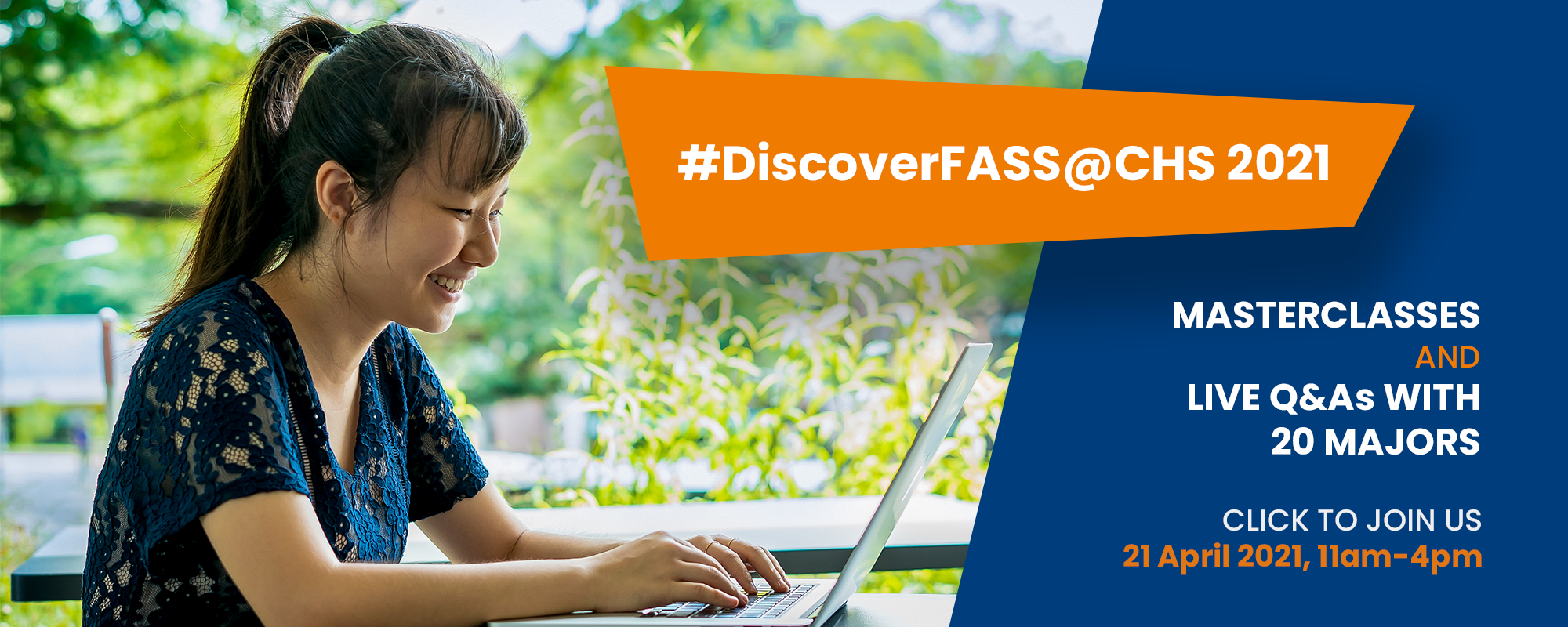
As part of the #DiscoverFASS@CHS campaign leading up to our Open House in May this year, we are holding 'live' Masterclasses presented by three of our award-winning Faculty members, and our Departments are hosting 'live' Q&A sessions for prospective students. These are opportunities not to be missed if you wish to know all you need to know about classes here and the myriad programmes available to you if you are a part of the FASS community. Masterclasses by Award-Winning Faculty
Experience lessons led by our dynamic faculty members.  Roasted Fetuses and Corpse Magic: An Introduction to Supernaturalism in Southeast Asia
Roasted Fetuses and Corpse Magic: An Introduction to Supernaturalism in Southeast Asia
Presented by Associate Professor Irving Johnson, Department of Southeast Asian Studies
The class aims to foreground the fascinating world of beliefs in supernaturalism that pervade Southeast Asian lives. Many of us enjoy telling and listening to creepy stories, watching horror movies on Netflix or dabbling in the esoteric. In this masterclass, we will look at some of the beliefs that structure constructions of the supernatural in modern Southeast Asia. The class revolves around a series of interrelated questions that seek to discover commonalities in popular belief systems and their prominence in the region, linking supernaturalism to larger issues of power, gender and politics. 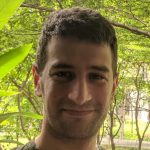 Evidence and Promise Making
Evidence and Promise Making
Presented by Assistant Professor Zachary Barnett, Department of Philosophy
Promise-making is an important part of life. We make promises to our friends, families, and significant others, and they make promises to us. We will look at a puzzle that arises when we think about "promising against the odds": How should I feel about making a promise, if I know that most of the people in my exact situation end up breaking that promise? For example, suppose that I promise to quit smoking cigarettes. At the same time, I know that most people who sincerely promise to quit smoking do not actually succeed on their first attempt. Should I believe that I will be the exception to the rule? If not, am I justified in making the promise in the first place? And if I do make the promise, should my friends and family believe me? These questions arise in many different contexts, ranging from the superficial to the serious, involving addiction or relationships. 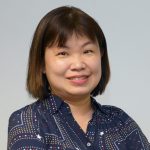 Making Sense of Self-Awareness and What That May Mean
Making Sense of Self-Awareness and What That May Mean
Presented by Dr Peace Wong Yuh Ju, Department of Social Work
In this talk, Dr Wong will attempt to broaden our understanding about ‘self’ and what that may mean to us. It is not uncommon for students in wanting to gain greater self-awareness with the attempt to learn more about one’s beliefs/feelings in relation to the observed world around us. Yet, how do we deepen our understanding of ‘self’, given that we are both familiar with who we are, and yet at times finding ourselves baffled by our reactions, and wondered why we respond in a certain manner? We will briefly discuss the various influences that may impact our values and beliefs, as well as consider what knowing your ‘self’ may mean to you.
To register for Masterclasses, click here.
Live Q&As with our Departments
Meet key Faculty and student representatives of every FASS Department and major programme in their respective Zoom meeting rooms and ask them specific questions about the requirements, content and value of the programmes they offer.
Department of Chinese Studies
The Chinese Studies Department provides training in diverse areas of Chinese Studies and Chinese Language, with the aim of preparing students for employment in a wide range of sectors. Graduates are offered career opportunities as professionals in the educational and business sectors, academia, the translation service industry and the mass media.
Join the Department's #DiscoverFASS@CHS 2021 'Live' Q&A session on 21 April (2-4 pm) here.
In the meantime, visit the College of Humanities Programmes page for more details on what this Department offers.
Department of Communications and New Media
Communications and New Media (CNM) at the National University of Singapore is the only Department in Southeast Asia that offers media studies, interactive media design, cultural studies, and communication management with a focus on new media.
Join the Department's #DiscoverFASS@CHS 2021 'Live' Q&A session on 21 April (2-4 pm) here.
In the meantime, visit the College of Humanities Programmes page for more details on the programmes offered by this Department.
Department of Economics
The Department of Economics has an established reputation as one of the largest and leading departments of Economics in the Asia-Pacific region. Faculty members’ research areas span a wide range of economic fields, with strength in the core areas of microeconomics, macroeconomics and econometrics, as well as in particular fields such as game theory and industrial organization, labor economics, education, financial economics, and growth theory and development with special reference to Asia.
The Department's #DiscoverFASS@CHS 2021 'Live' Q&A session on 21 April (2-4 pm) here. This session includes discussion of the Data Science and Economics Cross-Disciplinary Programme (DSE-XDP).
In the meantime, visit the College of Humanities Programmes page for more details on the programmes offered by this Department.
Department of English Language, Literature and Theatre Studies
The Department of English Language, Literature and Theatre Studies houses three undergraduate majors and three graduate programmes. The English Language major offers an education in linguistics, the study of human language. The undergraduate programme in English Literature is designed to provide a broad foundation in reading and analysing texts of all kinds. And, the Theatre Studies curriculum delivers education in all areas of theatre and performance history, production and interpretation.
The Department's #DiscoverFASS@CHS 2021 'Live' Q&A session on 21 April (2-4 pm) here.
In the meantime, visit the College of Humanities Programmes page for more details on the programmes offered by this Department.
Department of Geography
courses in the Department of Geography are organized along four areas of enquiry: environmental processes and change; global political economy; society and culture; and regional specializations (with a focus on Asia). The Department also offers a Field Studies course in which students travel to countries in the region such as Thailand and Malaysia where they conduct field work and collect research material over a 3-5 week period. Home-stays and visits to local universities and key sites of interest are part of the overseas learning experience it delivers.
The Department's #DiscoverFASS@CHS 2021 'Live' Q&A session on 21 April (2-4 pm) here. This session includes discussion of the Bachelor of Environmental Studies Programme (BES-XDP).
In the meantime, visit the College of Humanities Programmes page for more details on the programmes offered by this Department.
Department of History
The Department of History offers training at undergraduate and graduate levels, and its teaching and research expertise lies primarily in the history of Southeast and East Asia, but there is strong selection of course offerings in European, American, and military history, as well as the history of art, business, religion, science and technology.
The Department's #DiscoverFASS@CHS 2021 'Live' Q&A session on 21 April (2-4 pm) here.
In the meantime, visit the College of Humanities Programmes page for more details on the programmes offered by this Department.
Department of Japanese Studies
Founded in 1981, the Department of Japanese Studies is one of the largest area studies departments devoted to the study of Japan in the Asia-Pacific region, and offers BA, MA and PhD degrees in Japanese Studies taught by specialists with qualifications from leading universities around the world.
The Department's #DiscoverFASS@CHS 2021 'Live' Q&A session on 21 April (2-4 pm) here.
In the meantime, visit the College of Humanities Programmes page for more details on the programmes offered by this Department.
Department of Malay Studies
The Department of Malay Studies actively engages in research on a wide range of issues concerning the Malay world from a multi-disciplinary perspective, promotes exchanges with centres of Malay studies worldwide, and encourages the development of new and alternative approaches to the understanding of Malay history, economy, politics, society and culture.
The Department's #DiscoverFASS@CHS 2021 'Live' Q&A session on 21 April (2-4 pm) here.
In the meantime, visit the College of Humanities Programmes page for more details on the programmes offered by this Department.
Department of Philosophy
The Department of Philosophy is one of Asia’s leading centres for philosophical education and research. It is the top English-language philosophy program in Asia, and the inaugural Asian member of the Australasian Association of Philosophy. The faculty members have a broad range of interests spanning diverse philosophical traditions, offer a philosophical education spanning diverse philosophical traditions.
The Department's #DiscoverFASS@CHS 2021 'Live' Q&A session on 21 April (2-4 pm) here. This session will also include discussion of the Philosophy, Politics, and Economics Cross-Disciplinary Programme (PPE-XDP).
In the meantime, visit the College of Humanities Programmes page for more details on the programmes offered by this Department.
Department of Political Science
The Department of Political Science offers courses in comparative politics, international relations, political theory, and public administration. It also houses the Global Studies Programme, a new, multidisciplinary field of inquiry that examines the processes and effects of globalisation across political, economic, social and cultural domains around the world.
The Department's #DiscoverFASS@CHS 2021 'Live' Q&A session on 21 April (2-4 pm) here. This session includes discussion of the Global Studies Programme.
In the meantime, visit the College of Humanities Programmes page for more details on the programmes offered by this Department.
Department of Psychology
The Psychology programme at NUS aims to equip students with knowledge in the key areas of psychology (such as human biological processes, developmental processes, social processes, cognitive processes, mental health and adjustment of individuals) as well as an understanding of the applications of psychology. It also develops skills for undertaking studies of behaviour, including statistical skills and the use of computers for data analyses.
The Department's #DiscoverFASS@CHS 2021 'Live' Q&A session on 21 April (2-4 pm) here.
In the meantime, visit the College of Humanities Programmes page for more details on the programmes offered by this Department.
Department of Social Work
The main objective of the undergraduate General and Honours degree programme offered by the Department of Social Work is to equip its graduates for entry into the social work profession at the direct-service level. Students are exposed to social service visits, skills laboratory training, fieldwork placements and course projects, among other applied learning methods.
Go to this Department's #DiscoverFASS@CHS 2021 'Live' Q&A session on 21 April (2-4 pm) here.
In the meantime, visit the College of Humanities Programmes page for more details on the programmes offered by this Department.
Department of Sociology
The Department of Sociology is a diverse, dynamic and innovative research and teaching unit with strong expertise in research on Southeast Asia, East Asia and South Asia as well as on Singapore society. One of the largest Sociology departments in the world, it offers comprehensive undergraduate, honours and graduate programmes, led by a group of dedicated and creative researchers and educators.
The Department's #DiscoverFASS@CHS 2021 'Live' Q&A session on 21 April (2-4 pm) here.
In the meantime, visit the College of Humanities Programmes page for more details on the programmes offered by this Department.
South Asian Studies Programme
South Asian Studies, as offered by the South Asian Studies Programme (SASP), focuses on the region comprising India, Pakistan, Bangladesh, Sri Lanka, Nepal, Bhutan and the Maldives. At the undergraduate level, students are offered a range of courses in economics, religious and cultural studies, history, international relations, philosophy, politics and gender studies. The aim is to provide graduates of the programme with a broad understanding of the region from different points of view - knowledge that will be useful in dealing with this changing region in the 21st century.
The Department's #DiscoverFASS@CHS 2021 'Live' Q&A session on 21 April (2-4 pm) here.
In the meantime, visit the College of Humanities Programmes page for more details on the programmes offered by this Department.
Department of Southeast Asian Studies
The Department of Southeast Asian Studies is located in the Asian Studies Division of the Faculty of Arts and Social Sciences, and offers distinctive programmes for anyone interested in studying Southeast Asia, from the undergraduate to the PhD level.
The Department's #DiscoverFASS@CHS 2021 'Live' Q&A session on 21 April (2-4 pm) here.
In the meantime, visit the College of Humanities Programmes page for more details on the programmes offered by this Department.
Centre for Language Studies
The Centre for Language Studies was established in 2001 to serve the foreign language needs of the Faculty of Arts and Social Sciences and has today over 80 full-time and part-time faculty members. It teaches thirteen different languages - Arabic, Bahasa Indonesia, Chinese, French, German, Hindi, Japanese, Korean, Malay, Spanish, Tamil, Thai and Vietnamese - to app. over 3,300 students per semester and thus helps them acquire a very valuable economic and social resource in today's world of growing globalisation and internationalisation.
The Department's #DiscoverFASS@CHS 2021 'Live' Q&A session on 21 April (2-4 pm) here.
In the meantime, visit the College of Humanities Programmes page for more details on the programmes offered by this Department.
Finding Hope for a Generation of Crises
IN BRIEF | 5 min read
- Ng Chia Wee, third-year student at the Faculty of Arts and Social Sciences, NUS College of Humanities and Sciences, majoring in Philosophy, Politics, and Economics (PPE), says the youth must adopt a new attitude with three new key shifts to get through the bad time coming their way.
Click through to read this article.
The Sunday Times, 21 March 2021, Views, pA23
This story first appeared in NUSnews on 21 March 2021.
Nine new Nominated MPs to be appointed from Jan 21
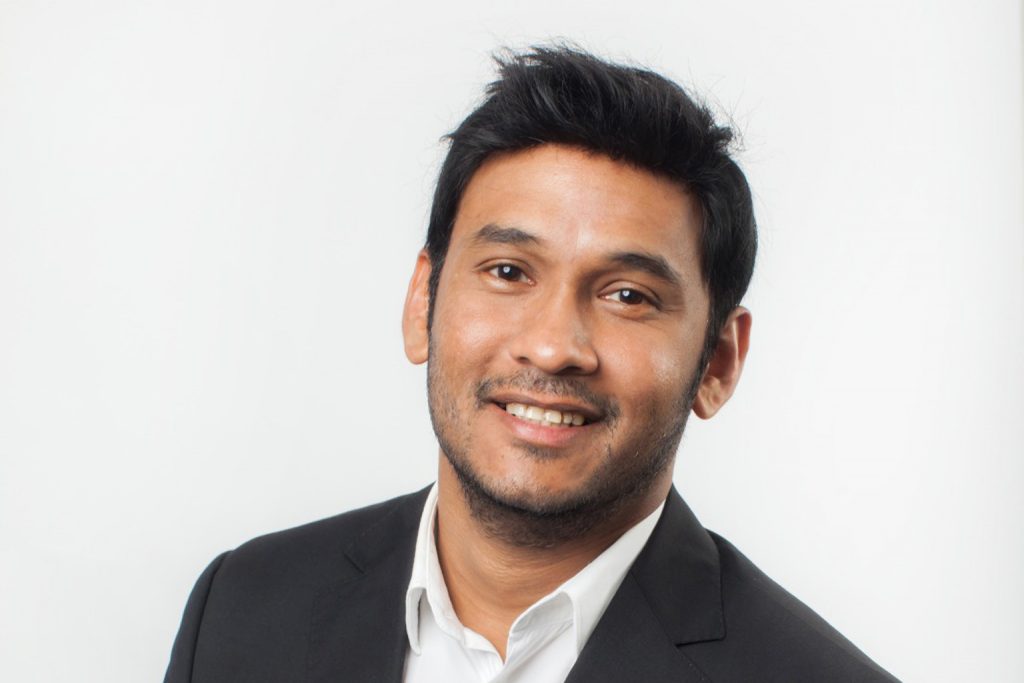
Mr Thomas is a partner at law firm Tang Thomas and director of TwinRock, a security agency. He is currently serving as president of the Security Association Singapore (SAS). During his tenure as SAS president, the association was recognised by the labour movement for its contributions to workers when it received two May Day Awards (Partner of Labour Movement) in 2018.
He also serves as a volunteer lawyer under the Law Society’s Criminal Legal Aid Scheme. As chairman of the NUS Political Science Department’s Singapore Forum on Politics and Policy, Mr Thomas contributed in encouraging dialogue and engagement with policymakers.
Source: https://www.straitstimes.com/singapore/nine-new-nominated-mps-to-be-appointed-from-jan-21
Best Article in EJIR Prize 2020

Assistant Professor Deepak Nair from the Department of Political Science is the joint winner of the Best Article Prize in the European Journal of International Relations (EJIR) for 2020. The prize was awarded for his article “Saving Face in Diplomacy: A Political Sociology of Face-to-Face Interactions in ASEAN.”
EJIR is the flagship journal of the European International Studies Association (EISA) and the ECPR Standing Group on International Relations (SGIR).
The Prize Committee noted in its statement: "Deepak Nair’s article makes an important contribution by offering an original analysis of the genesis and effect of practices of ‘face-saving’ in diplomatic interactions within ASEAN. Rejecting an essentialist and orientalist account, Nair persuasively presents a reading of face-saving as a social code originating in the conservative stance among ASEAN’s founding members. The committee was impressed by the reflexive, skilful and rigorous research grounded in social theory, extensive ethnographic fieldwork and an interpretivist method of immersion. Nair’s attention to historical context and his systematic and nuanced observation of practices in both formal and informal settings not only allows him to present a rich empirical picture and pervasive nature of this diplomatic habitus; it also directs attention to the power of this social code within a community of practice, providing impetus for new research."
The article has been made available open-access and can be viewed here:
https://journals.sagepub.com/doi/full/10.1177/1354066118822117
BRICS and the Global Economy
http://empowers.nus.edu.sg/events/program.html
Date: 2-3 March 2017
Time: 9.00am to 5.00pm (please refer to the schedule in the website for more details)
Venue: Evans Room, NUSS Kent Ridge Guild House, National University of Singapore, 9 Kent Ridge Drive, Singapore 119241
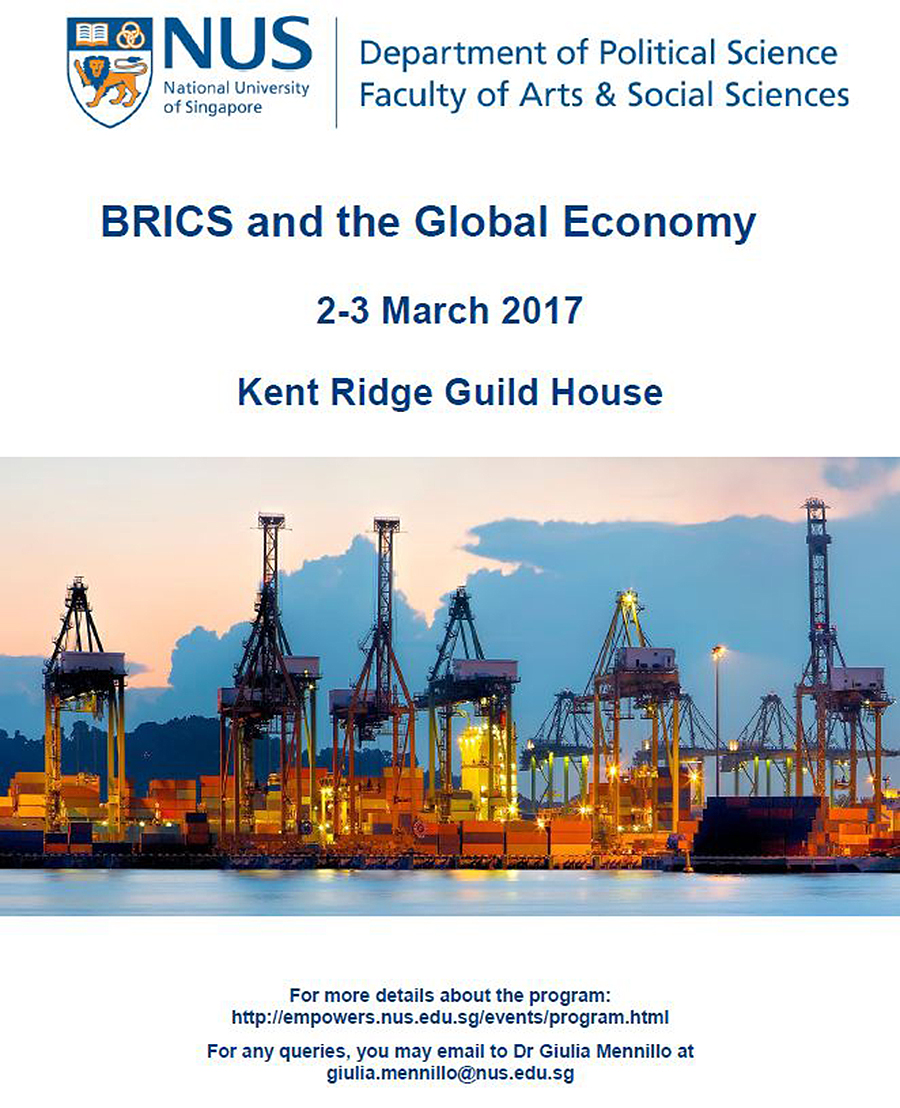
Residential Colleges Teaching Awards AY2015/2016
Since 2013, the Residential Colleges Teaching Excellence Awards have been awarded to outstanding faculty members for their exceptional work as facilitators of high quality teaching in the living and learning setting. As a sign of how the teaching and learning landscape has evolved in the RCs, and how teaching excellence has diversified, this year saw the introduction of 2 new award categories to the RC teaching awards: the Residential Colleges Teaching Commendation, which serves to encourage faculty members who have demonstrated a good understanding and application of residential college teaching; and the Residential Colleges Teaching Excellence Award Honour Roll, which acknowledges the consistent excellent work of faculty who have won the RC Teaching Excellence Award three times.
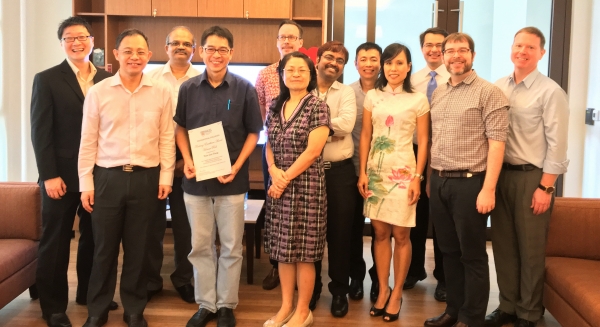
The Residential Colleges Teaching Awards ceremony was held on 25 Jan 2017 at Residential College 4, with Vice Provost Prof Bernard Tan (front row, first from the left), presenting the awards to the winners.
Winners of the AY2015/2016 Residential Colleges Teaching Awards:
Residential Colleges Teaching Excellence Award Honour Roll
- Dr Tan Lai Yong (College of Alice & Peter Tan)
Residential Colleges Teaching Excellence Award
- Dr Naviyn Prabhu Balakrishnan (Residential College 4)
- Dr Connor Clive Graham (Tembusu College)
- Dr Adam Staley Groves (Tembusu College)
- Dr Jew Yun Hsien, Daniel (College of Alice & Peter Tan)
- Dr Lai Chiu Yun, Joelle (College of Alice & Peter Tan and Lee Kong Chian Natural History Museum)
- Dr Pang Tze Lin Kelvin (Tembusu College)
- Dr Tan Yuen Ling Lynette (Centre for English Language Communication)
- Dr Walter Patrick Wade (Centre for English Language Communication)
- A/P Reuben Wong (College of Alice & Peter Tan and Department of Political Science)
Residential Colleges Teaching Commendation
- Dr Patrick Bernard Gallo (Centre for English Language Communication)
- A/P Sekhar Narayana Kondepudi (Residential College 4 and Department of Building)
- Dr Kevin McGahan (College of Alice & Peter Tan and Department of Political Science)
Citations for each award winner are available here.
FASS Class Champions / Ambassadors 2017
The FASS Class Champions/Ambassadors 2017 from the Political Science Class of 2017 are: Eng Yu Fan, Ho Hui Jun, Kimberly Peh Zi En and Fan Tai Soon!
Please give them your full support during the Commencement Class Giving Campaign 2017 and for future PS Alumni Activities!
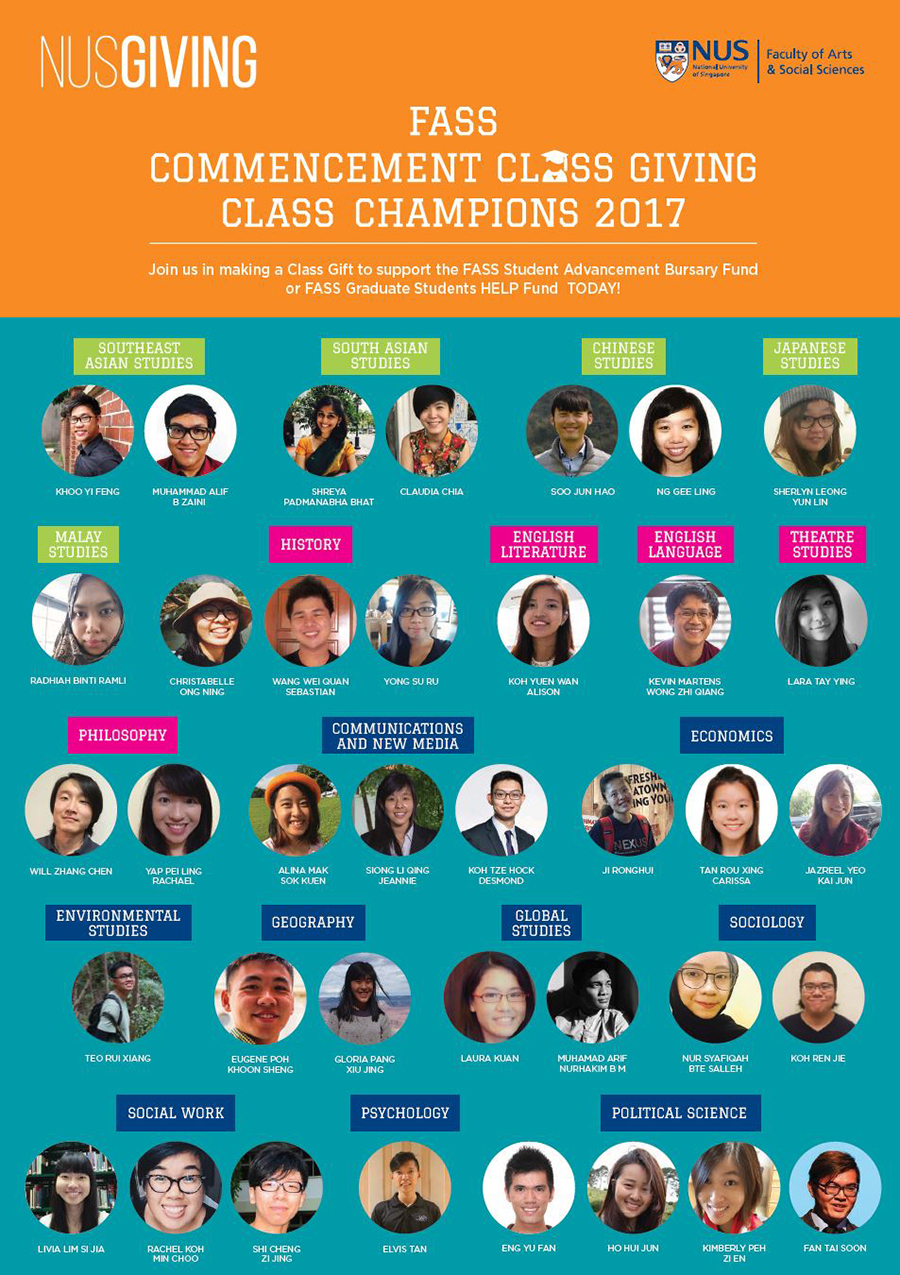
Methods School
Join us in 2016 for rigorous training in social science research methods and truly global networking opportunities. Acquire cutting-edge quantitative, qualitative, and formal methods skills, meet future collaborators and co-authors, and make new friends with similar research interests from all over the Asia-Pacific, the U.S., Europe, and beyond.
Visit the IPSA-NUS Summer School 2016 website at https://fass.nus.edu.sg/methods-school/.
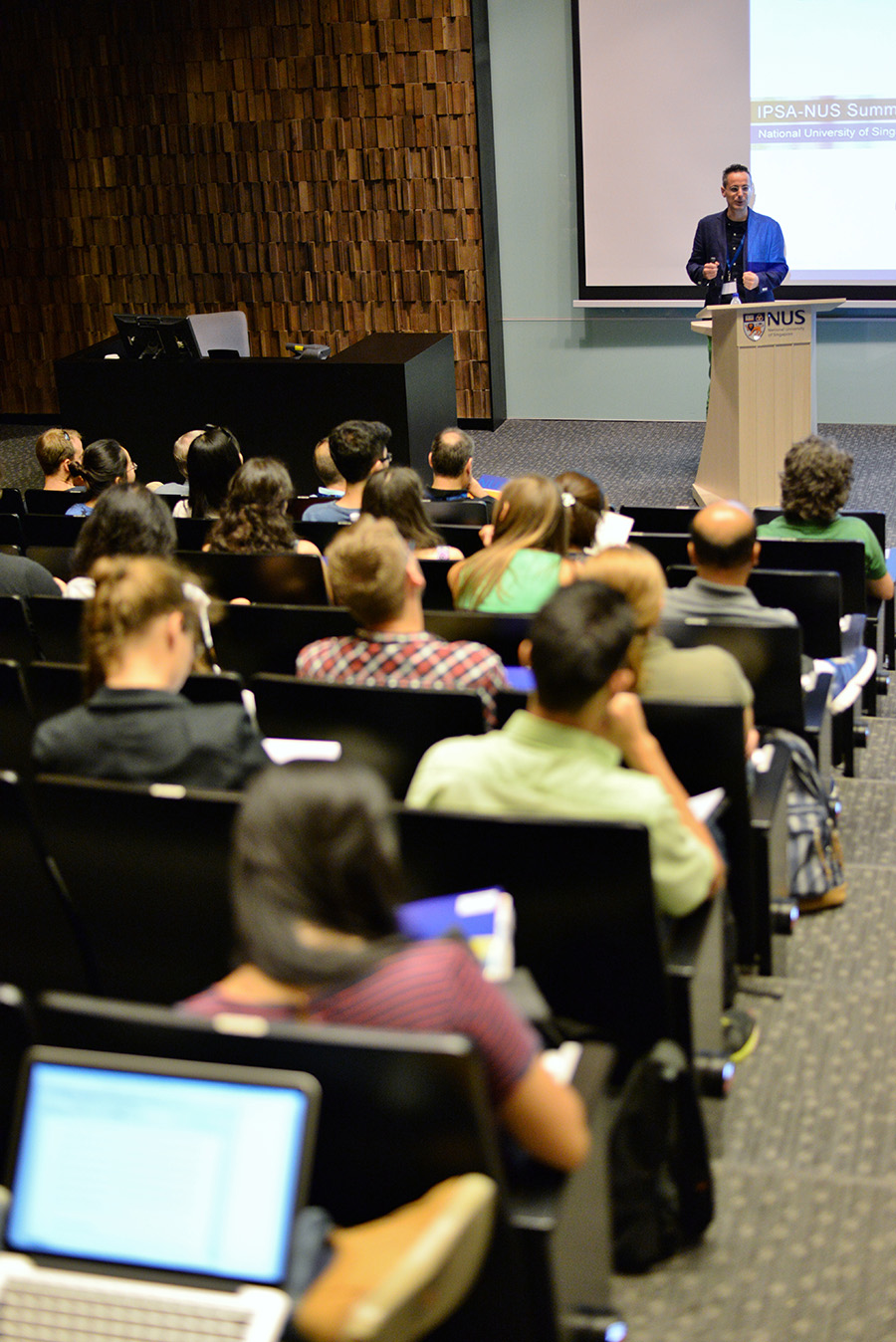
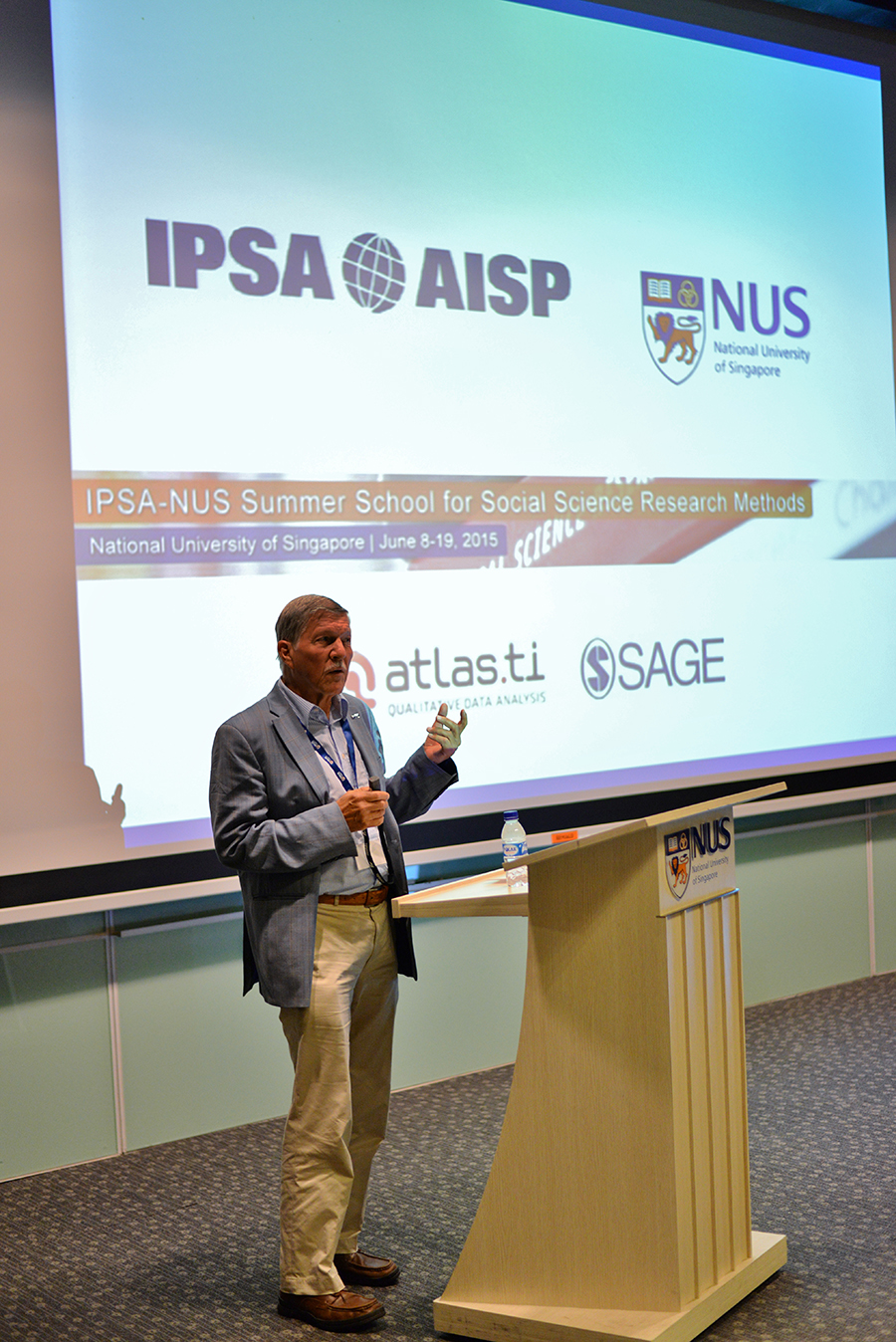
Global Studies
The Global Studies Programme is housed in the Department of Political Science. Global Studies is a new, multidisciplinary field of inquiry that examines the processes and effects of globalisation across political, economic, social, and cultural domains around the world. The field builds on social science concepts and area studies expertise and focuses especially on problems of profound public policy significance.
Visit the Global Studies website at http://www.fas.nus.edu.sg/globalstudies/
Seminars
Join us for our regular department seminars hosting top scholars from around the world and showcasing our department's cutting-edge research.
Singapore Security Dialogue 2016
*Pictures from the event are uploaded! Check out our gallery!
Media Report from the Singapore Security Dialogue held on 14th November 2016
Today Newspaper: "Substantial Support for ISA in S'pore, says Shanmugam"
There is substantial support for the Internal Security Act (ISA) in Singapore, with the public generally seeing the regional security context and understanding the government’s use of it, said Law and Home Affairs Minister K Shanmugam at a dialogue on Monday (Nov 14). “I believe support for the ISA, if anything, has increased,” he said, at a dialogue organised by the National University of Singapore (NUS) Political Science Alumni Association and security services firm TwinRock Global. He was responding to a question from a political science student on whether a shift towards liberal values — including calls to abolish the ISA on the basis of human rights — would affect the Government’s ability to clamp down on divisive rhetoric.
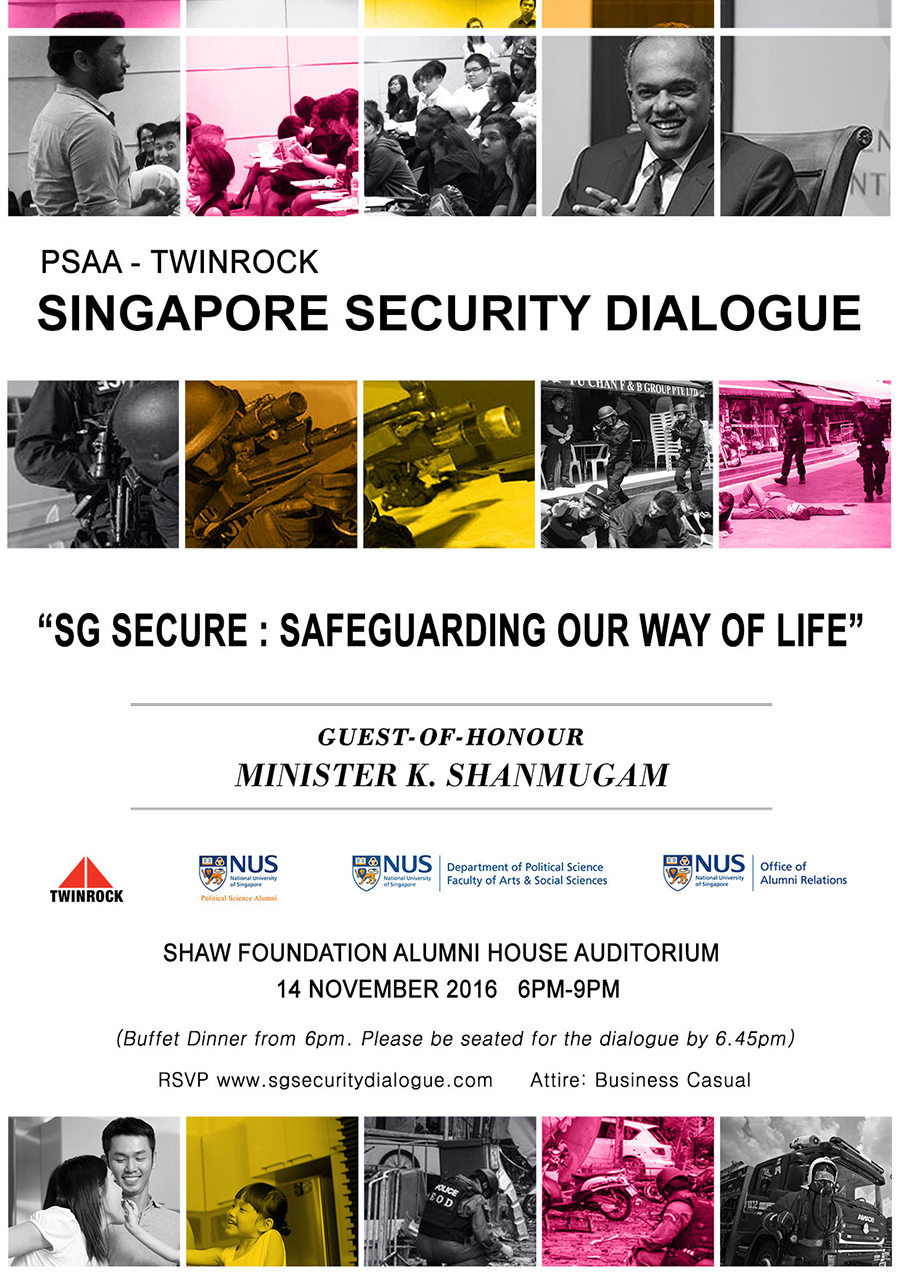
The National Interest website - "ISIS Can be Contained" - written by our PhD Candidate, Hamoon Khelgaht Doost and PS Alumni (Class of 2016), Matthew Koo
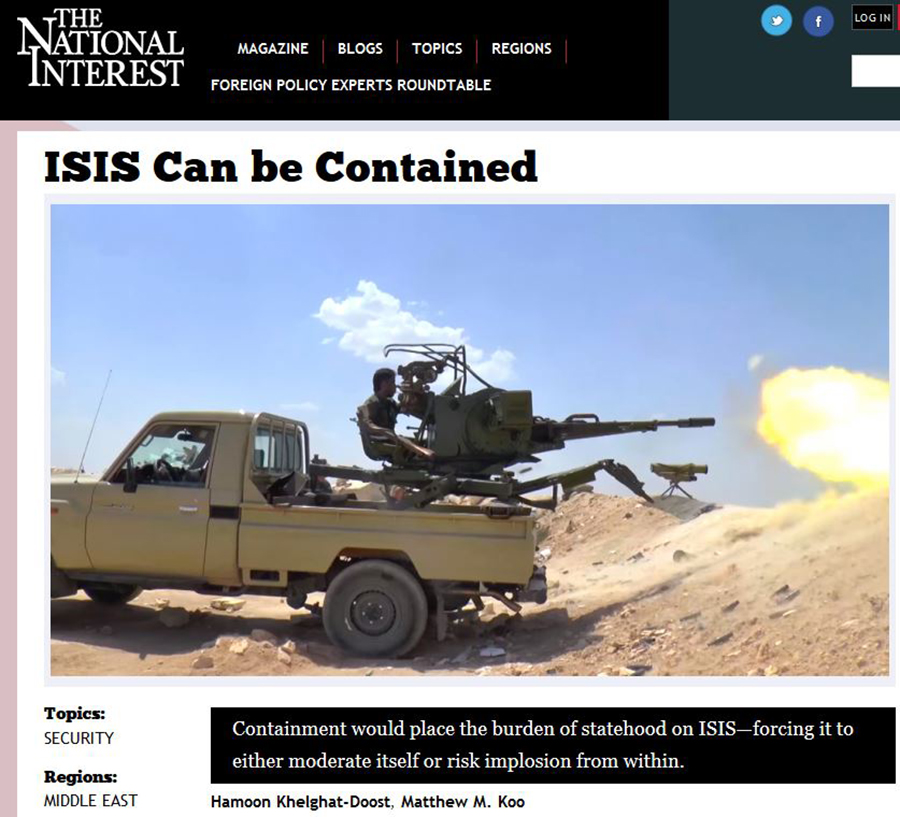
Our PhD Candidate, Hamoon Khelgaht Doost and PS Alumni (Class of 2016), Matthew Koo has written an article "ISIS Can be Contained" on the "The National Interest" website.
Do check out this link for the article! http://nationalinterest.org/feature/why-isis-can-be-contained-18304
Faculty Teaching Excellence Awards (FTEA) 2016
Congratulations to our Political Science colleagues on their achievements in teaching!
http://blog.nus.edu.sg/fassnews/2016/11/02/faculty-teaching-excellence-awards-ftea-2016/
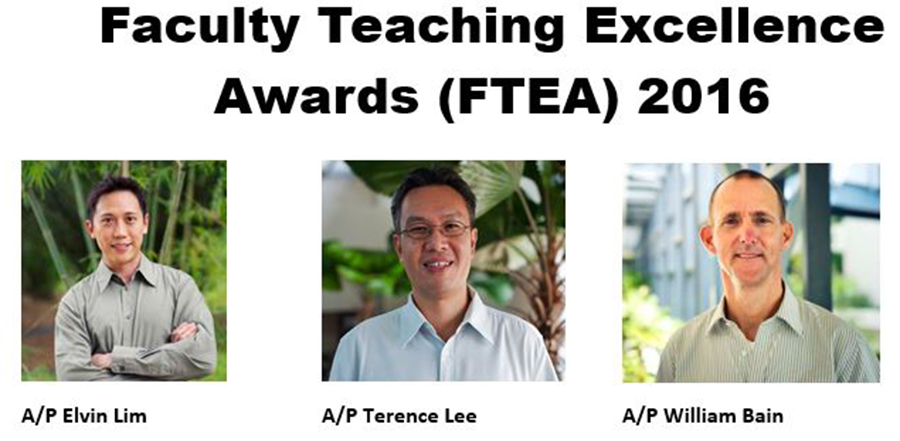
In Conversation with Minister Ong Ye Kung "Jobs, Economy and I"
The Dialogue Highlights video and photo gallery is out! Click on the title above for to assess the video and photo gallery.
